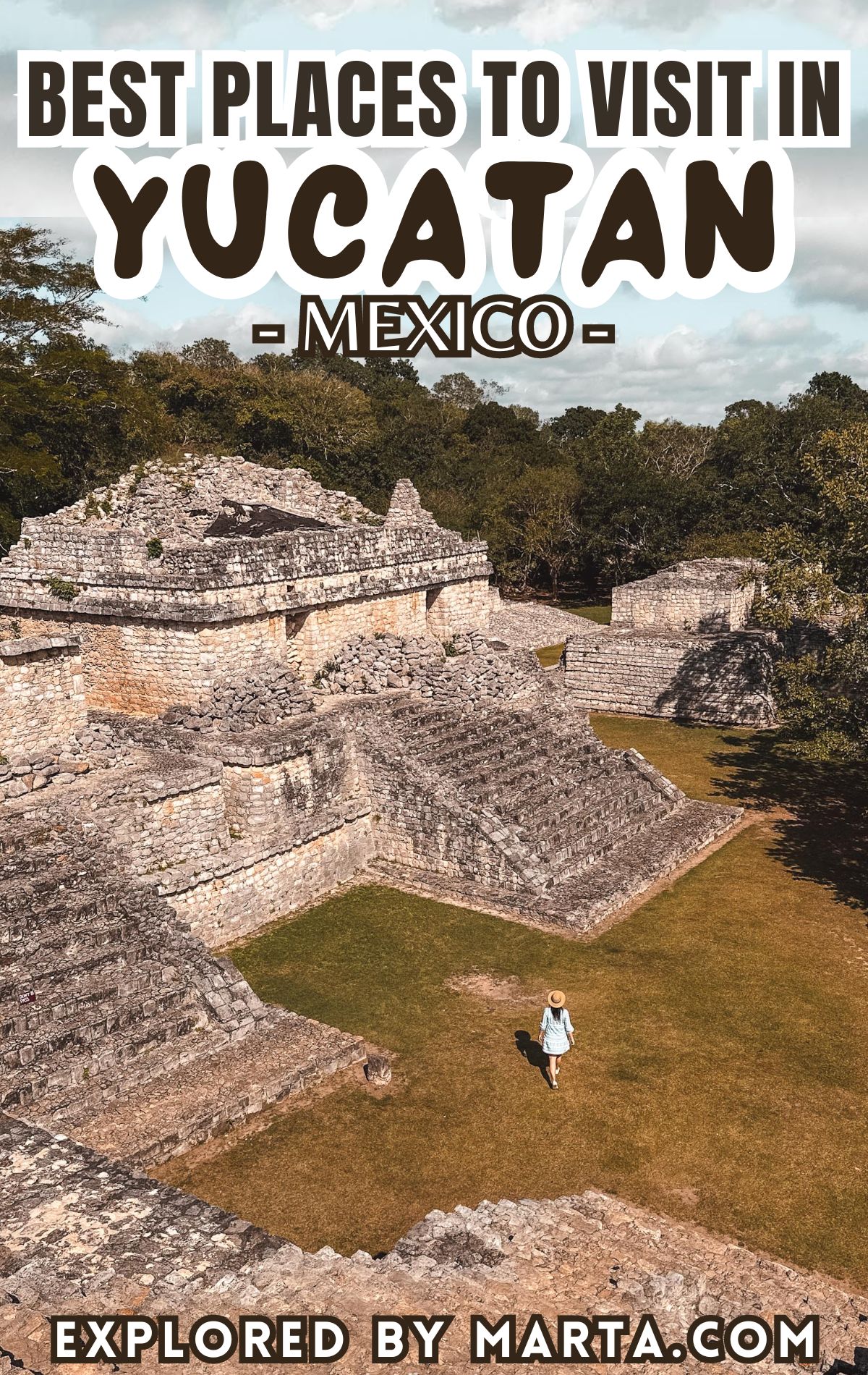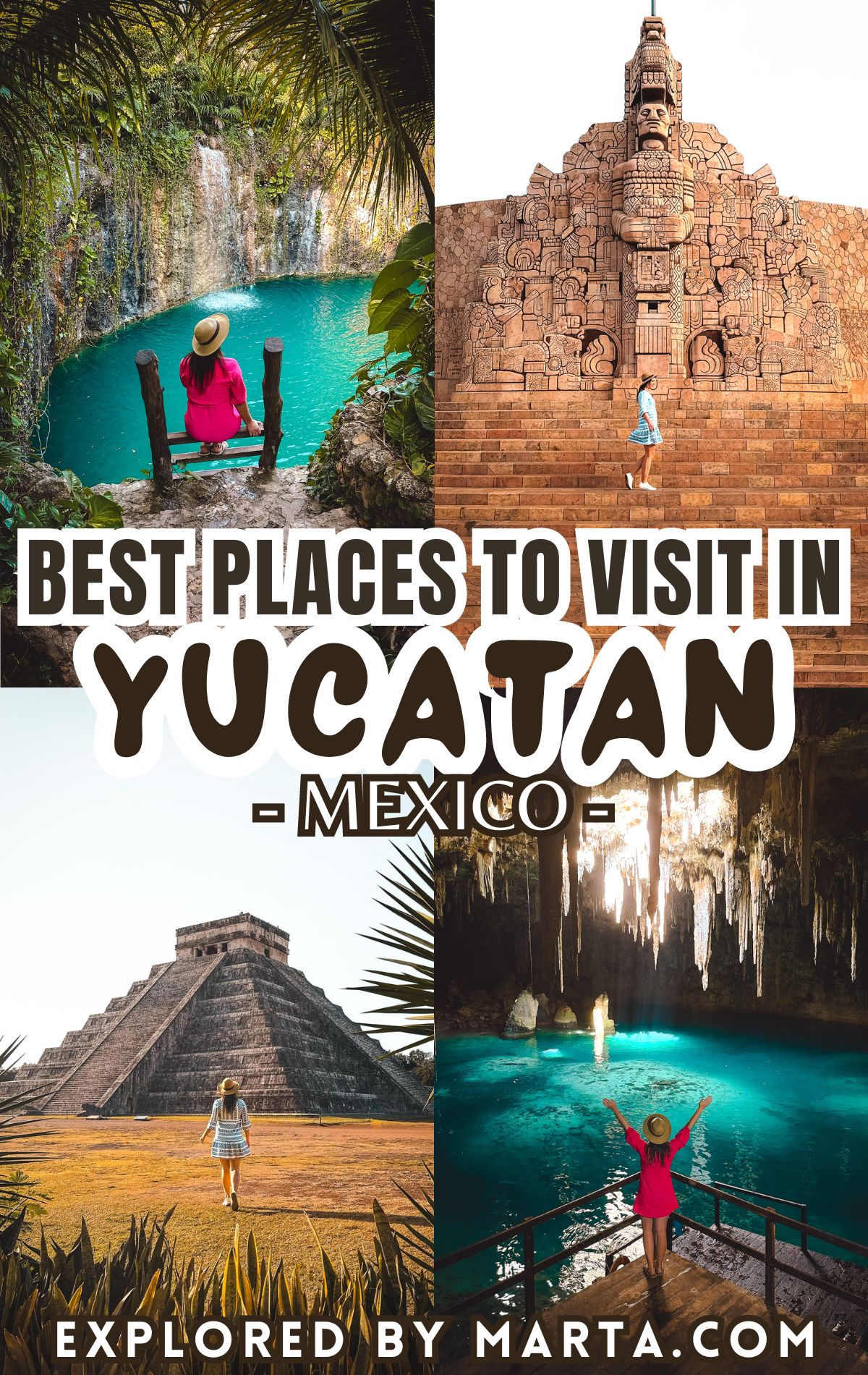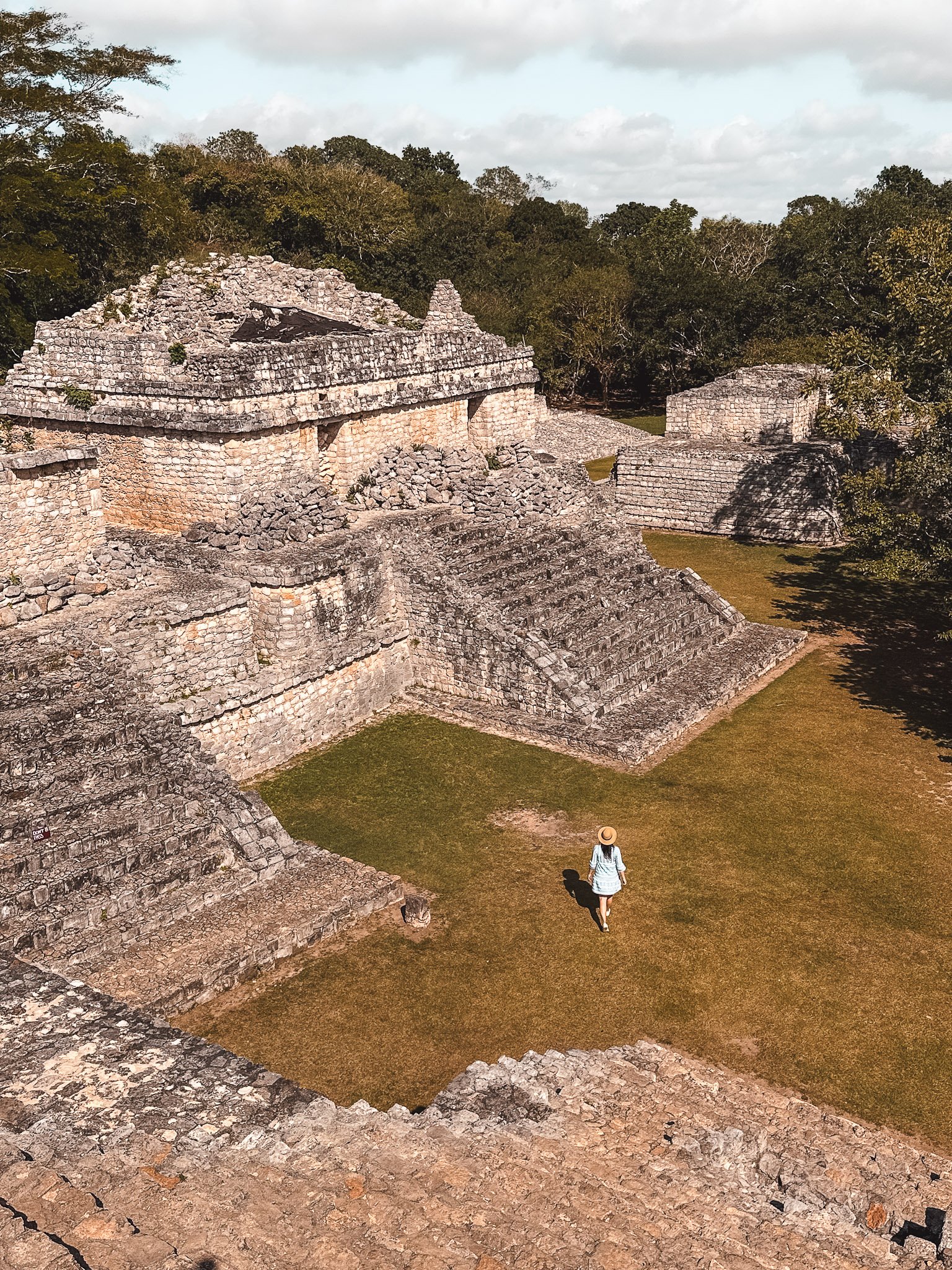27 best places to visit in the Yucatan Peninsula, Mexico
This post may contain affiliate links. If you use these links to buy something I may earn a small commission at no extra cost to you! Thank you for your support!
Let’s discover the best places to visit in the Yucatan peninsula, Mexico! After spending three months traveling around this part of Mexico and exploring every corner of this ancient land of Maya, here are my top places we visited!
From the unique underground cenotes to ancient Mayan cities in the jungle, from vibrant colonial towns and turquoise white-sand beaches – you can find it all in the tropical land of Mexico’s Yucatan peninsula!
In this blog post, you will find all the best places to visit in the Yucatan Peninsula with descriptions, photos, and locations on the map. Trust me – there is something for every type of traveler! Happy exploring!
Read more » 21 cool hidden gems in the Yucatan Peninsula, Mexico
1. Tulum – the tropical jewel of Riviera Maya


Tulum is a standout destination in Mexico’s Riviera Maya and one of the best places to visit in the Yucatan Peninsula. The town attracts visitors with its white-sand beaches, turquoise waters, and iconic ancient Mayan ruins perched on cliff tops.
Some of the top things to do in Tulum include exploring nearby cenotes, visiting the iconic Ven a la Luz sculpture park, enjoying the tropical beaches, trying street food at Parque Dos Aguas, and admiring street art.


Although opinions vary and some travelers criticize Tulum as overly touristy and expensive, there are some things about Tulum that you simply won’t find anywhere else around the Yucatan Peninsula.
Tulum captivates with its unique blend of natural beauty, history, and bohemian charm. A walk through the Tulum Hotel Zone is like visiting an exhibition with restaurants, hotels, and beach clubs competing for the most unique and creative entrances.


Tulum is also known for one of the best-preserved coastal Maya sites – the Tulum Archaeological Zone. The ruins are perched on a cliff overlooking the Caribbean Sea. Did you know that the name Tulum means ‘a wall’ in Mayan?
Another advantage for Tulum is cenotes – the perfect escape when the beach is covered with sargassum sea algae! Tulum boasts many famous cenotes just a couple of minutes’ drive from the downtown.


Despite its popularity, there are also plenty of places to eat authentic Mexican food so don’t forget to hunt down the best tacos in Tulum along with tortas, quesabirrias, guacamole, marquesitas, and more.
Even if you don’t stay at the Tulum Hotel Zone, I recommend taking a walk along the road there and checking out all the incredible hotel entrances, many of them known as famous Instagram spots in Tulum. Big respect for the artists!
Location: Tulum
2. Chichén Itzá Archaeological Zone
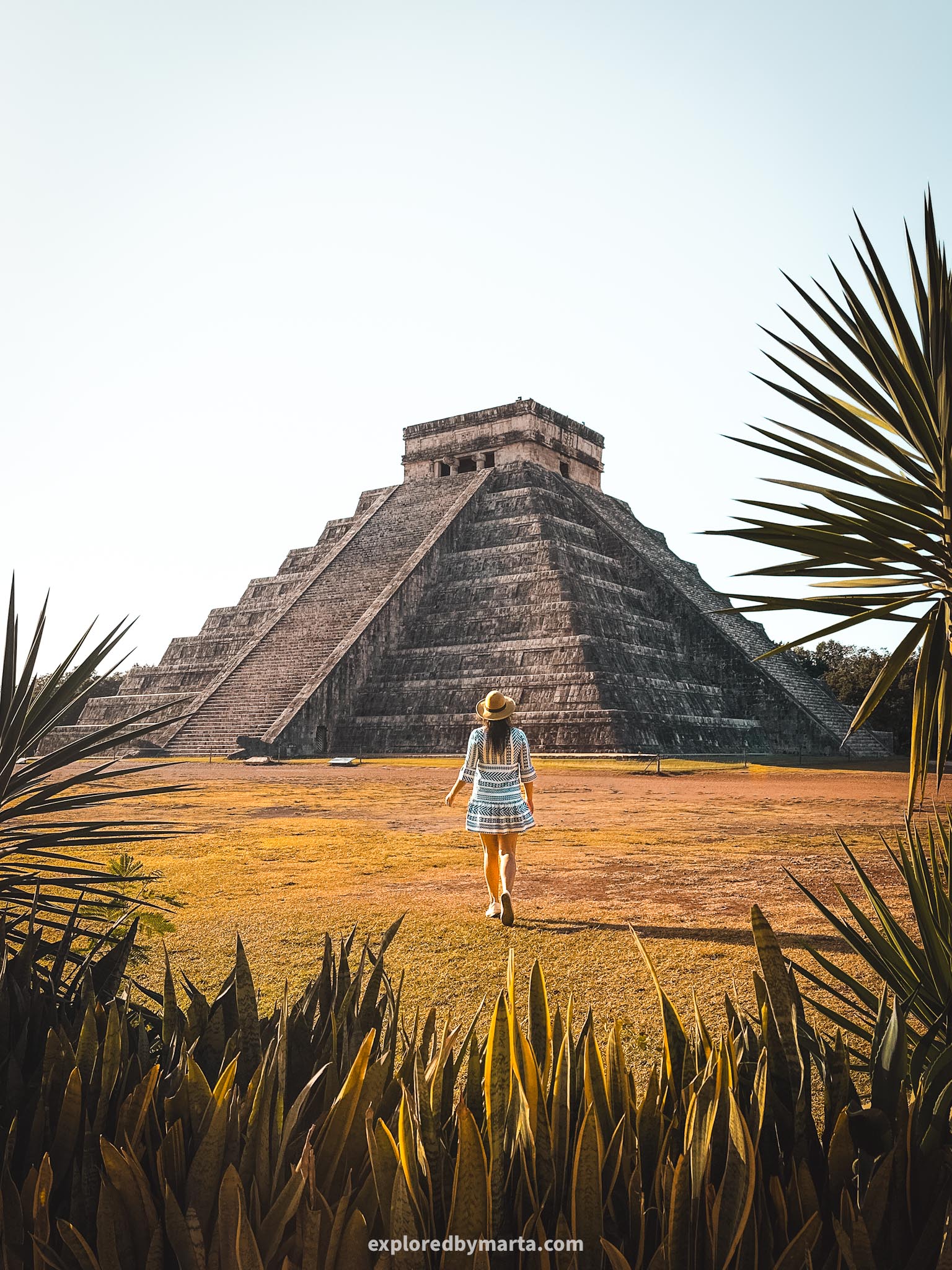
Chichen Itzá is the most famous of all the best Mayan archaeological sites in the Yucatán and it is one of the most visited places in Mexico. It was also declared a UNESCO World Heritage Site and voted among the New 7 Wonders of the World.
This place has to be on your shortlist of the best places to visit in the Yucatan Peninsula!
What is now a popular tourist destination, historically was one of the largest Mayan cities dating back to 600 AD. It existed as a major regional center for many centuries until its decline by the 12th century.
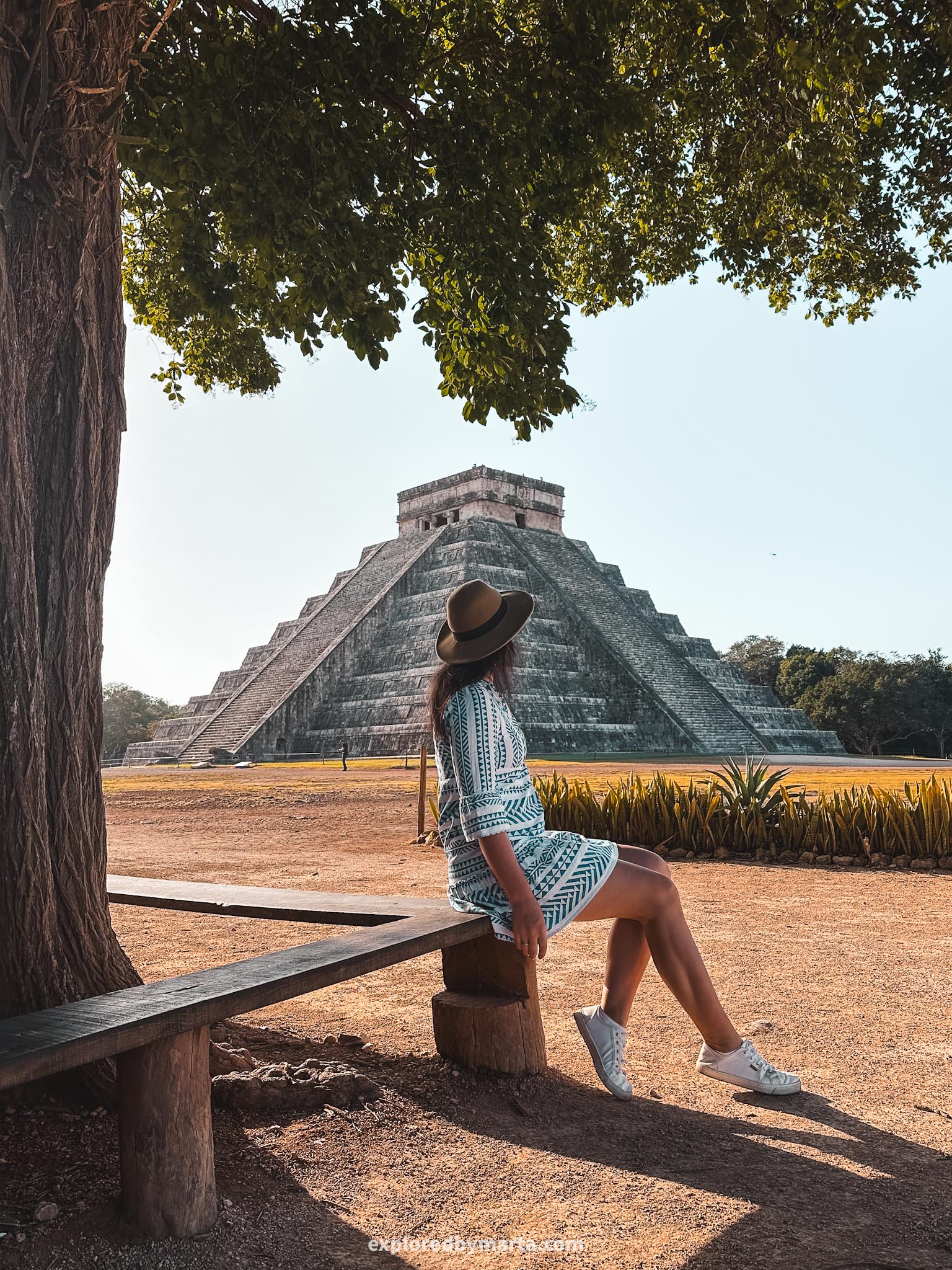
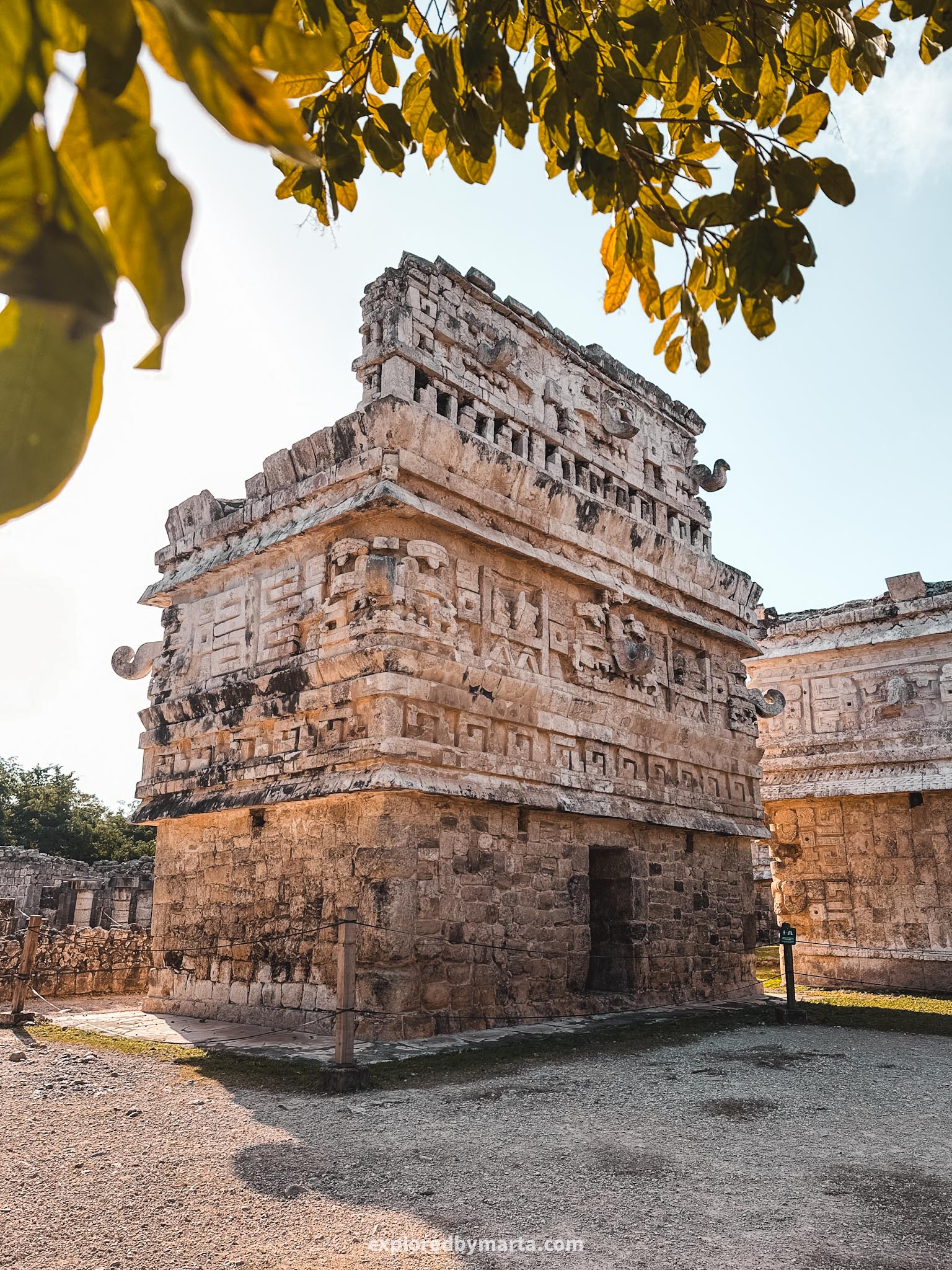
Chichén Itzá archaeological zone consists of multiple temples, pyramids, structures, and even a sacred cenote (cenote sagrado) where Mayans deposited valuables and gifts including human sacrifices as a form of sacrifice to their rain god Chaac.
The most famous structure is the great El Castillo pyramid (the castle) which is also known as the Temple of Kukulcan. The pyramid with the temple on top of it is 30 meters high and was built sometime between the 8th and 12th centuries.
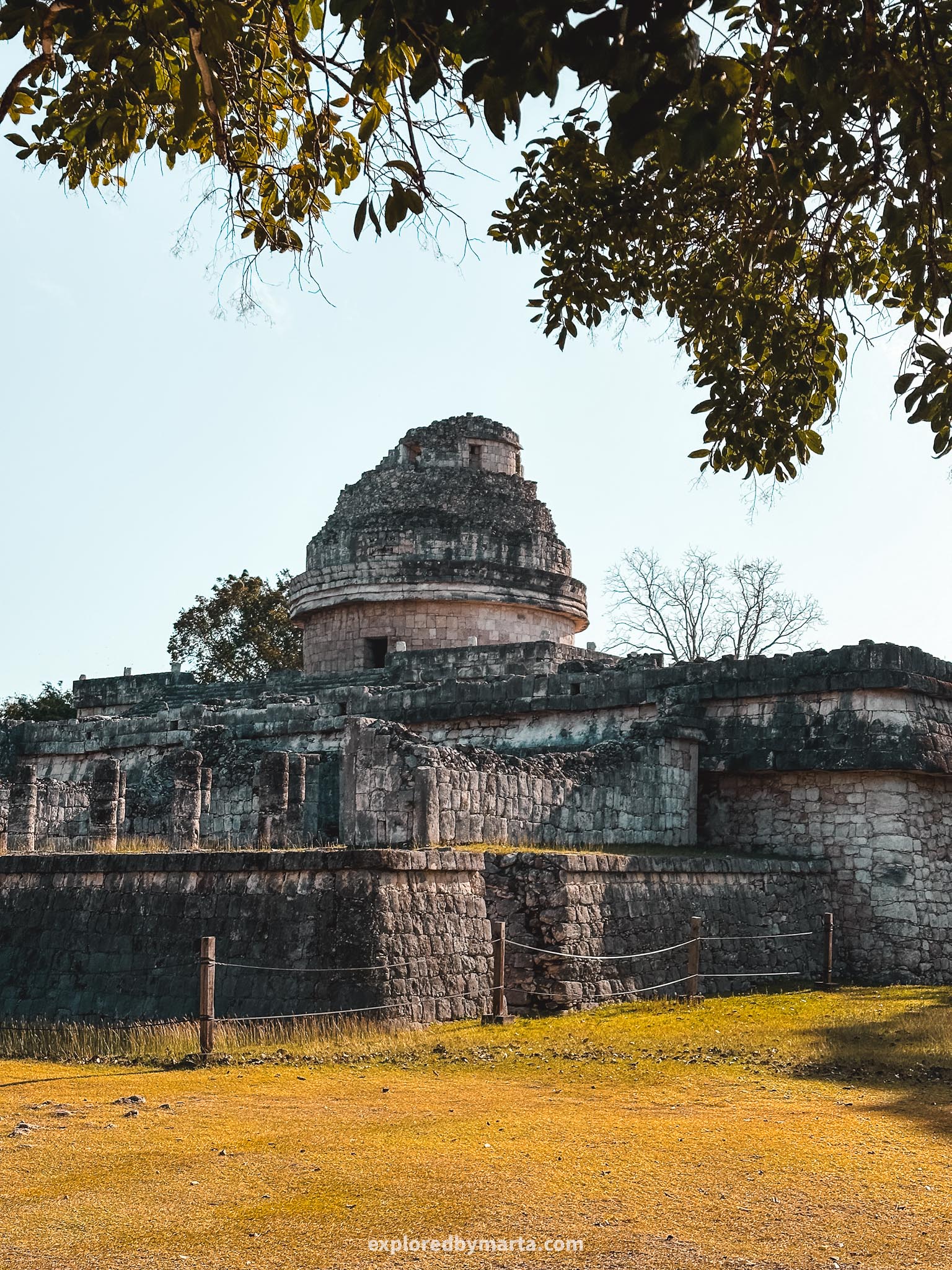
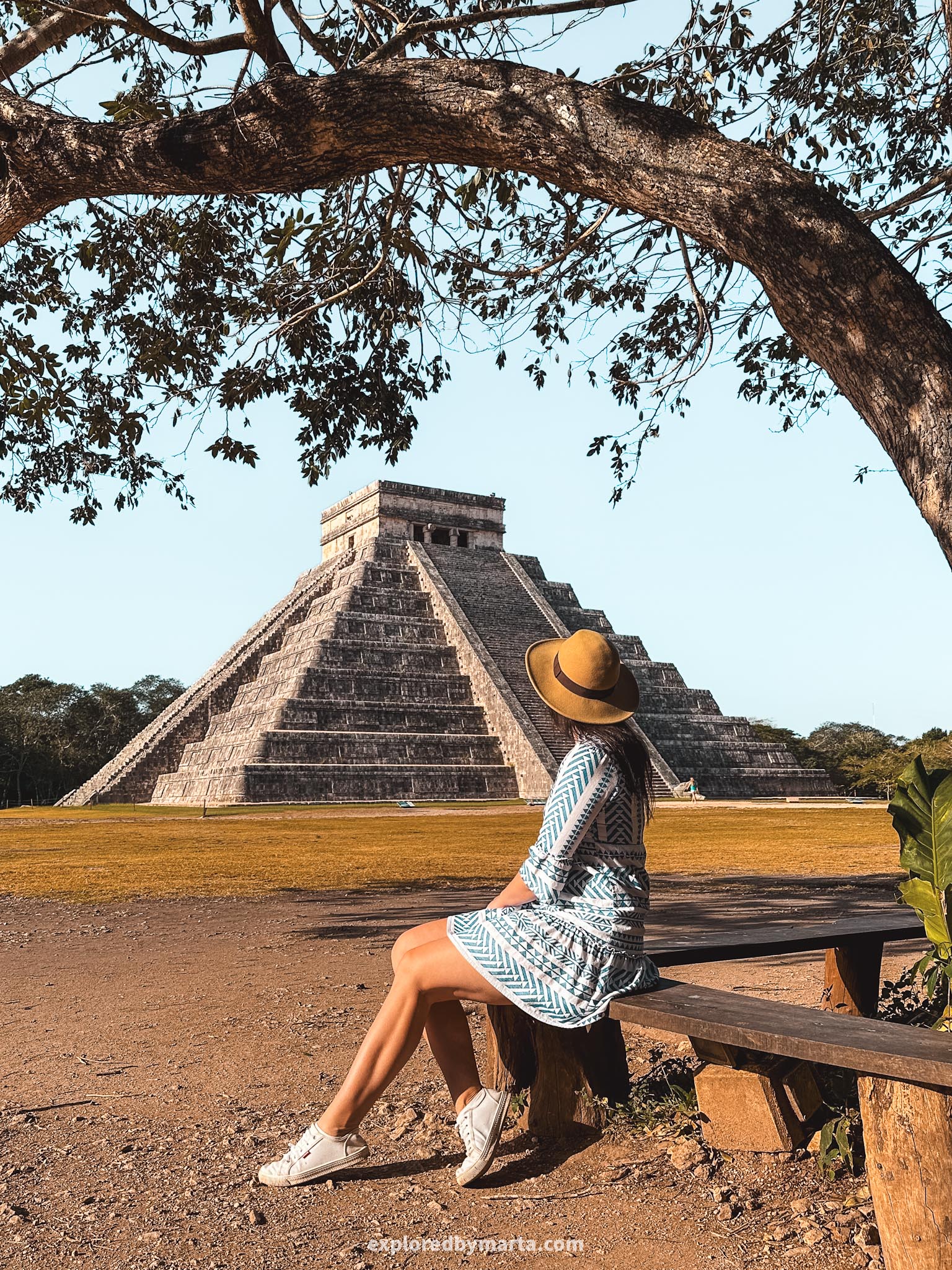
Interestingly, when you clap your hands in front of the staircase of the pyramid, the echo of the sound mimics the voice of the quetzal bird. The same effect happens at another large pyramid in the Yucatán Peninsula – Uxmal.
Visiting the Chichen Itza pyramid site is one of the bucket list things to do in the Yucatán Peninsula, Mexico. And, obviously, this place gets super crowded so I recommend arriving first thing in the morning.
Location: Chichén Itzá
3. Cenote Suytun
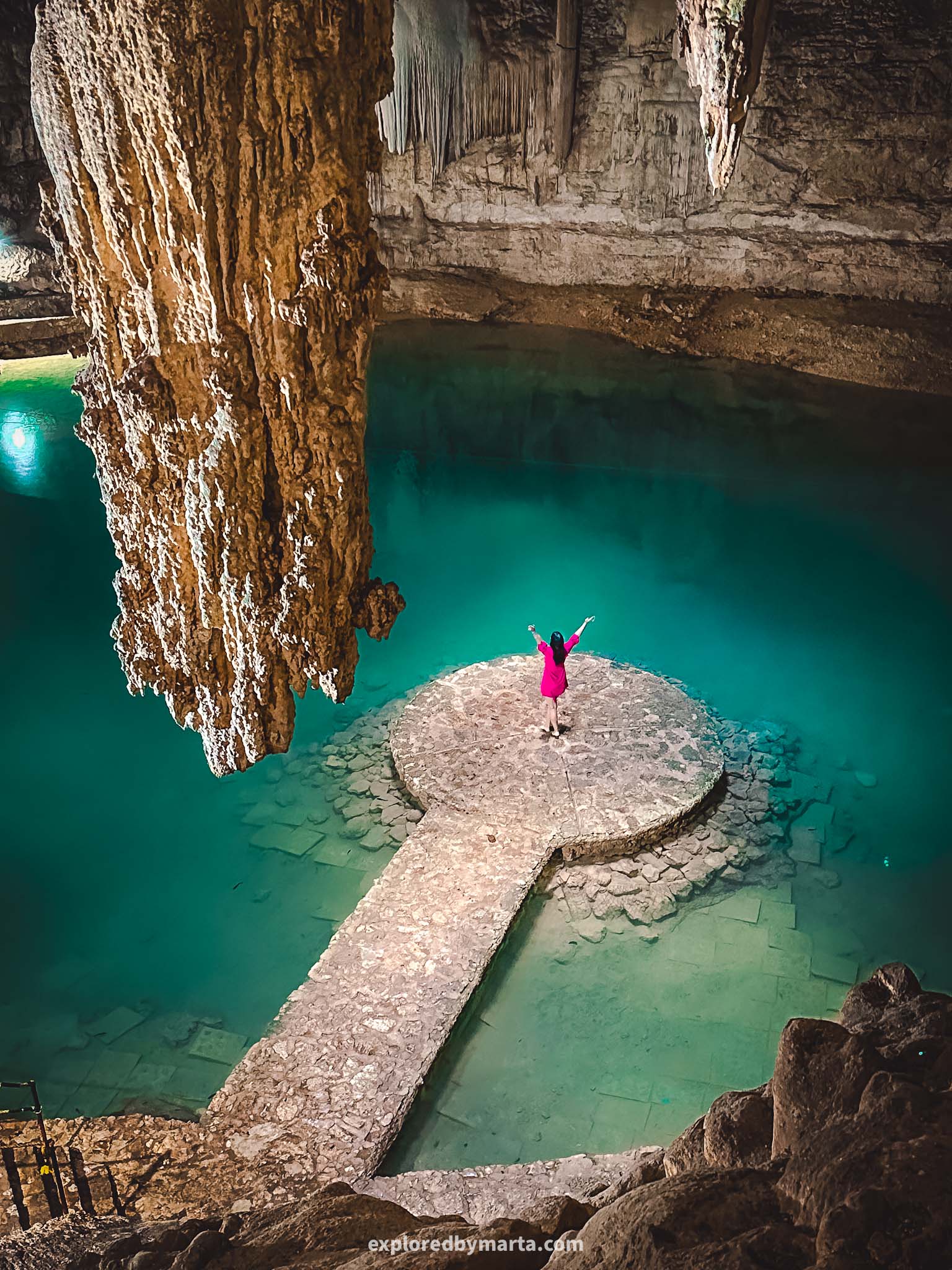
Visiting cenotes – natural sinkholes in the ground – while traveling around the Yucatan peninsula is one of the bucket list things to do. And Cenote Suytun is one of the most famous cenotes you will find.
Often regarded as one of the most beautiful cenotes in the Yucatan, it is known for its unique stone pathway leading into the middle of the underground lake with a hole in the ceiling right above it.
If you time it right, there will be a light beam shining through the hole and illuminating the whole place. But for a crowd-free experience go there in the morning!
Tip! We visited this cenote on March 9th and the stone platform was dry. However, the water level can be higher or completely cover the platform after rainy periods. The best way to make sure how it looks is by checking recent reviews on Google Maps.
Location: Cenote Suytun
4. Capital of the state of Yucatán – Merida
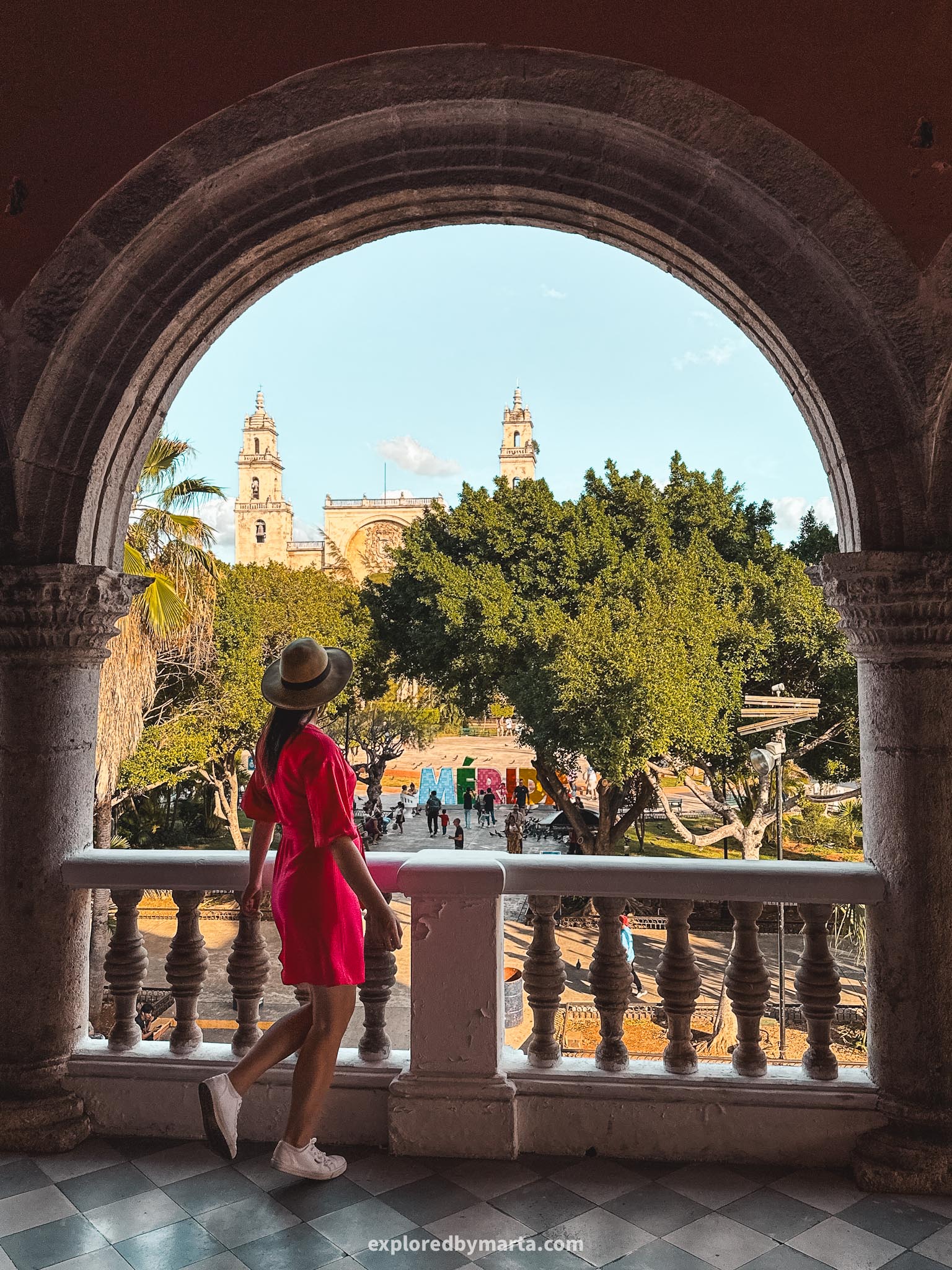
Founded in the 16th century, Merida, or the White City, serves as the capital of the state of Yucatán. It was also the first American Capital of Culture and is home to the oldest cathedral in mainland Americas!
Honestly, Merida has to be one of the most interesting destinations in the Yucatan peninsula with its rich architecture, history, and food scene. I’d recommend staying there for two full days if possible. See all the things to do in Merida here!
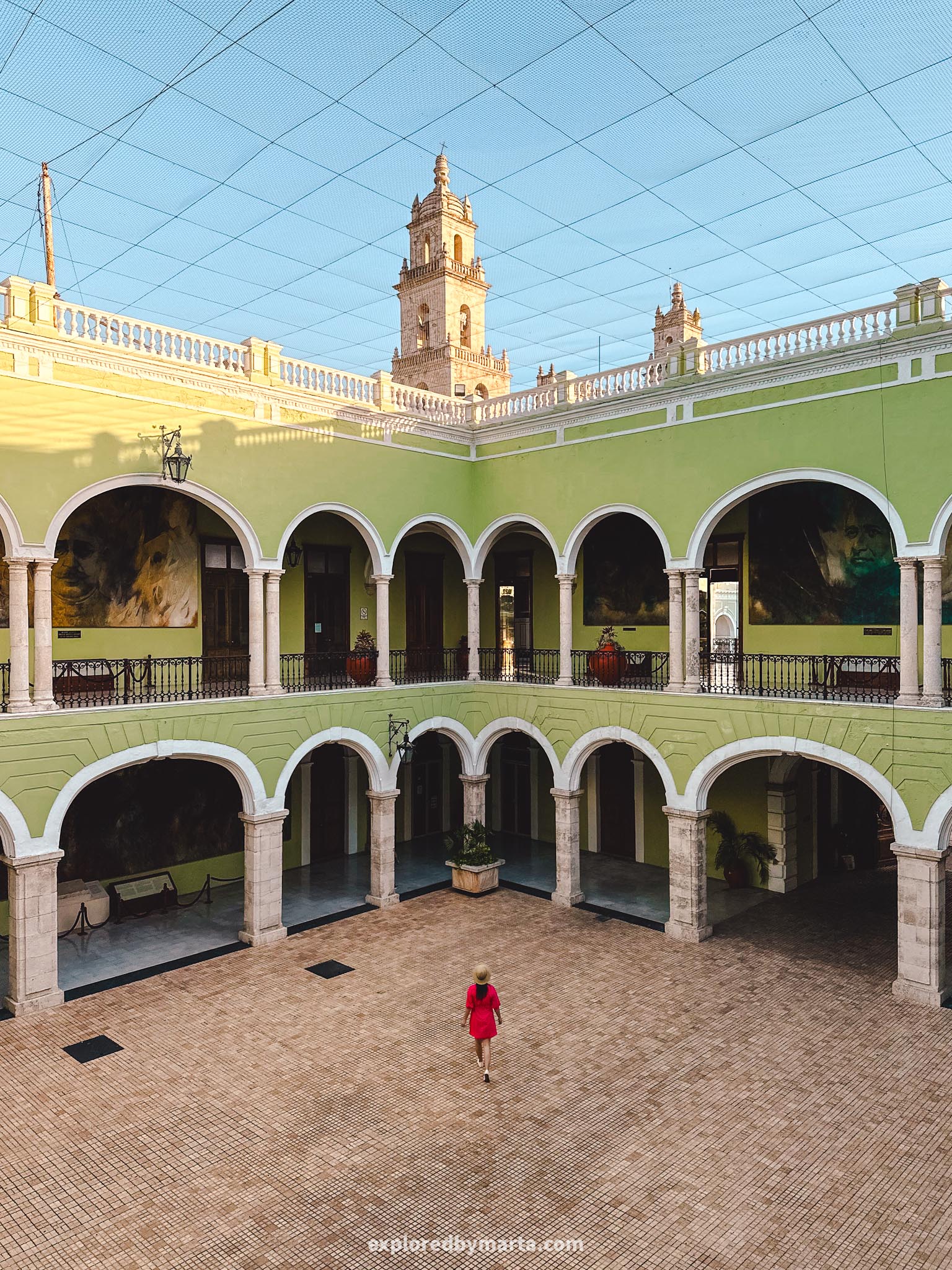
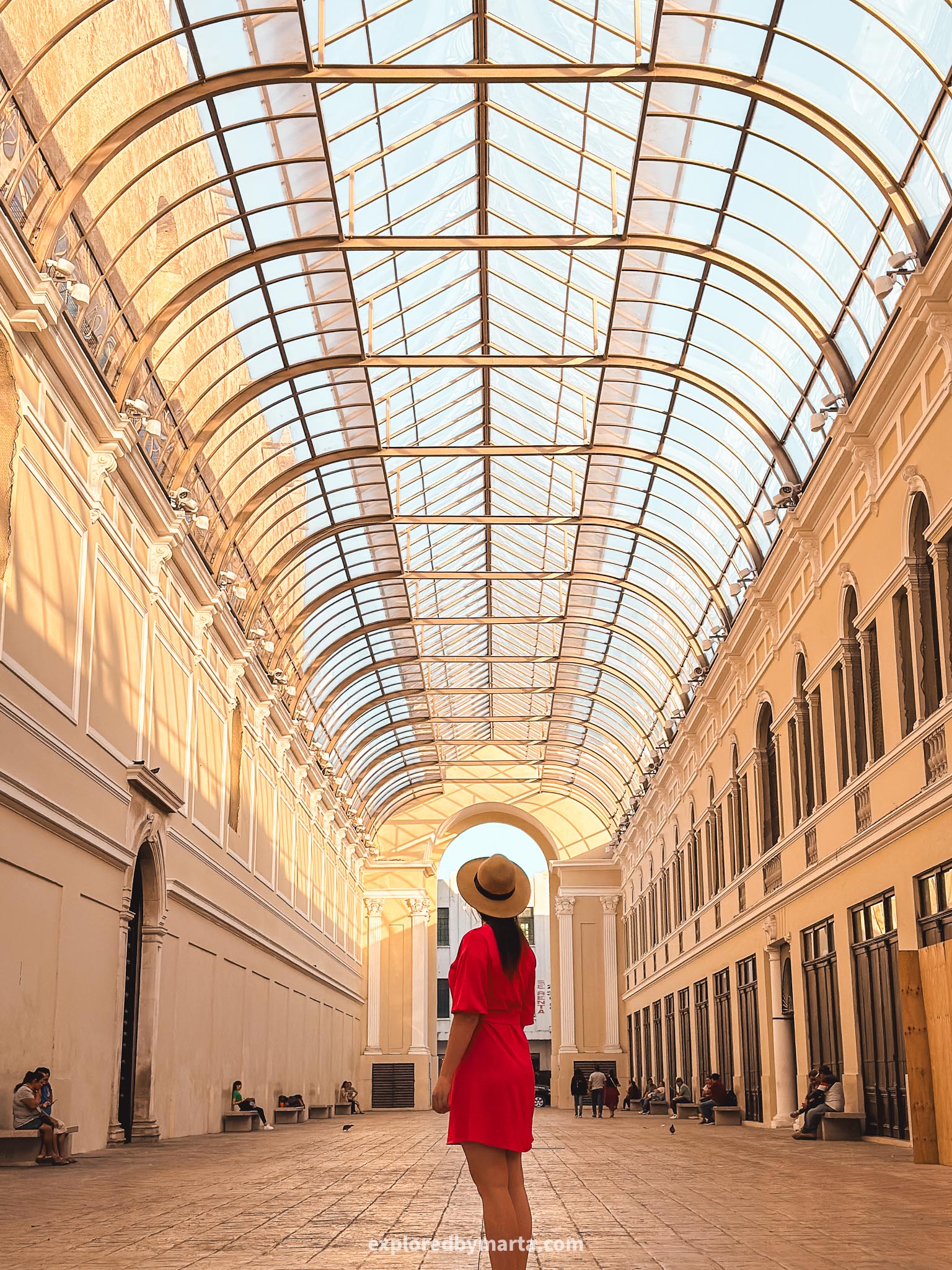
Merida is the perfect place to explore the Mayan culture, local Mexican lifestyle as well as colonial history through archaeological zones, food, local markets, and diverse architecture in and around the city.
The number one must-visit place in Merida is Plaza Grande or the main square that hosts special events like the popular Mayan ball game ‘Pok Ta Pok’ which you can see every Saturday around 8 PM for free.
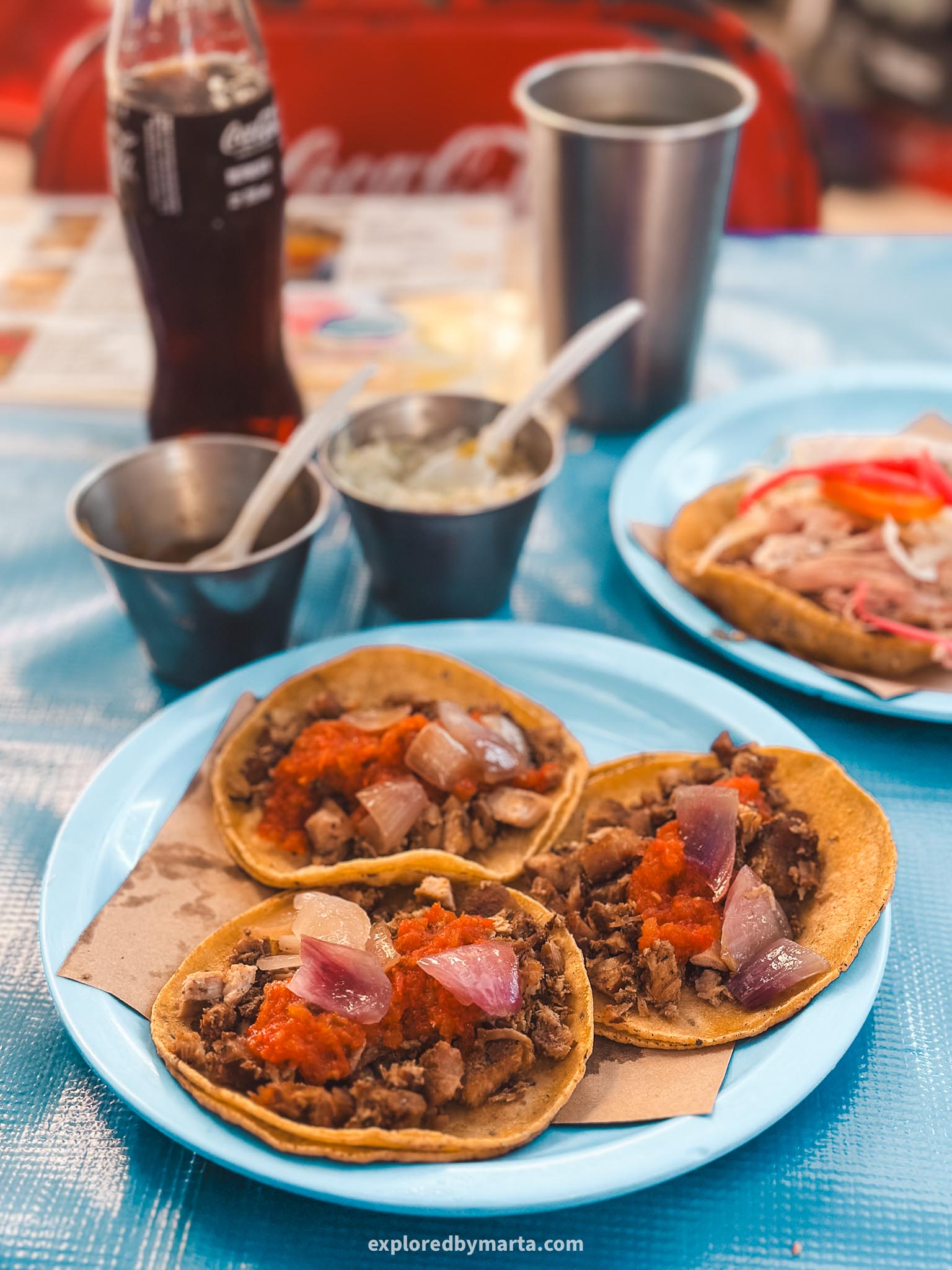
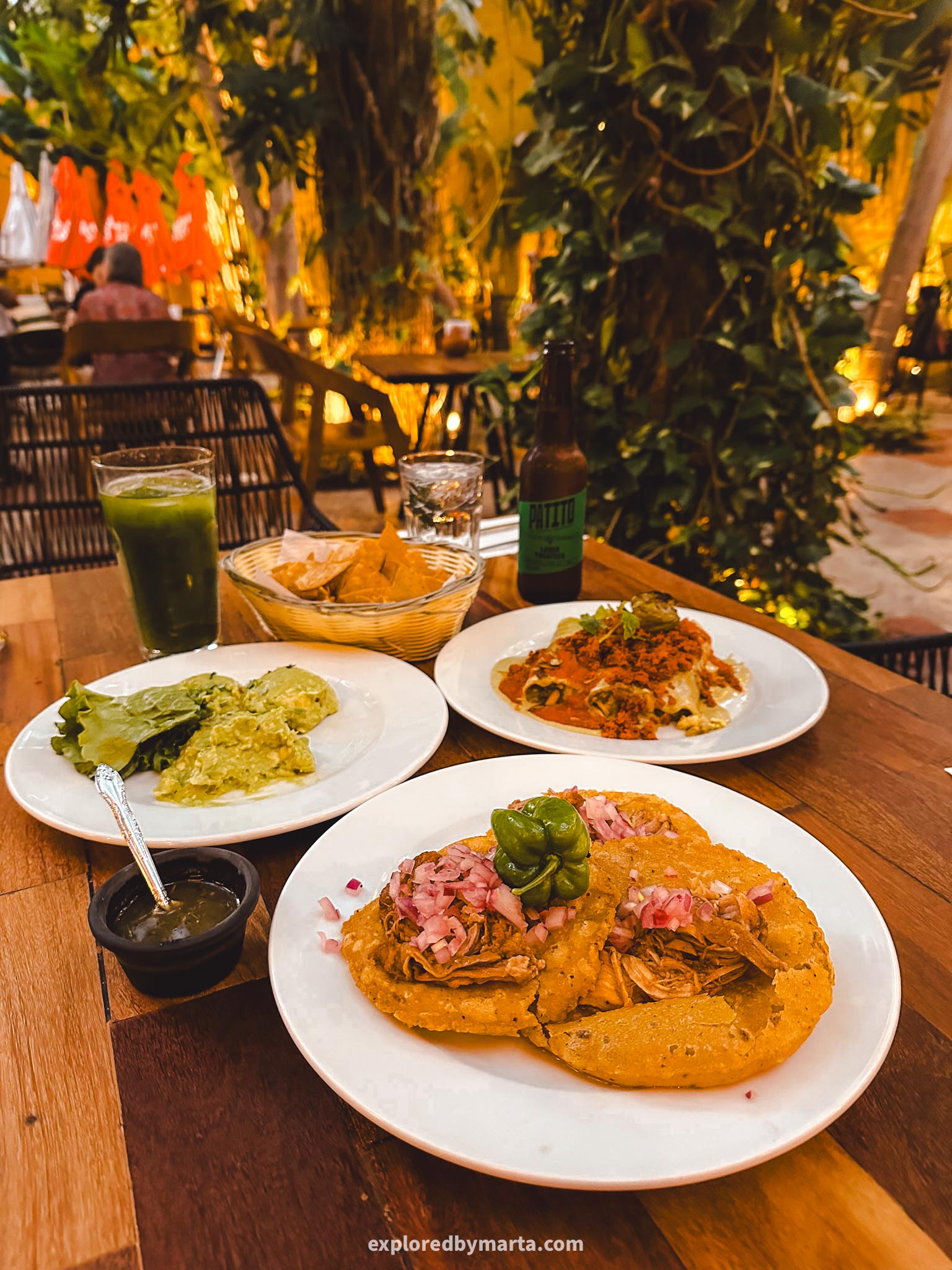
Lined around the square are the best places to visit in Merida – the Cathedral of Mérida, the Pasaje de La Revolución, the red Palacio Municipal de Mérida, the green palace – Palacio de Gobierno, and Museo Casa Montejo – house of the founder of Merida!
Merida is also a hub of Mayan gastronomy and Mexican cuisine. You must stop by some taco places like Taqueria La Lupita and Manjar Blanco – taco spots that were featured on Netflix’s Taco Chronicles.
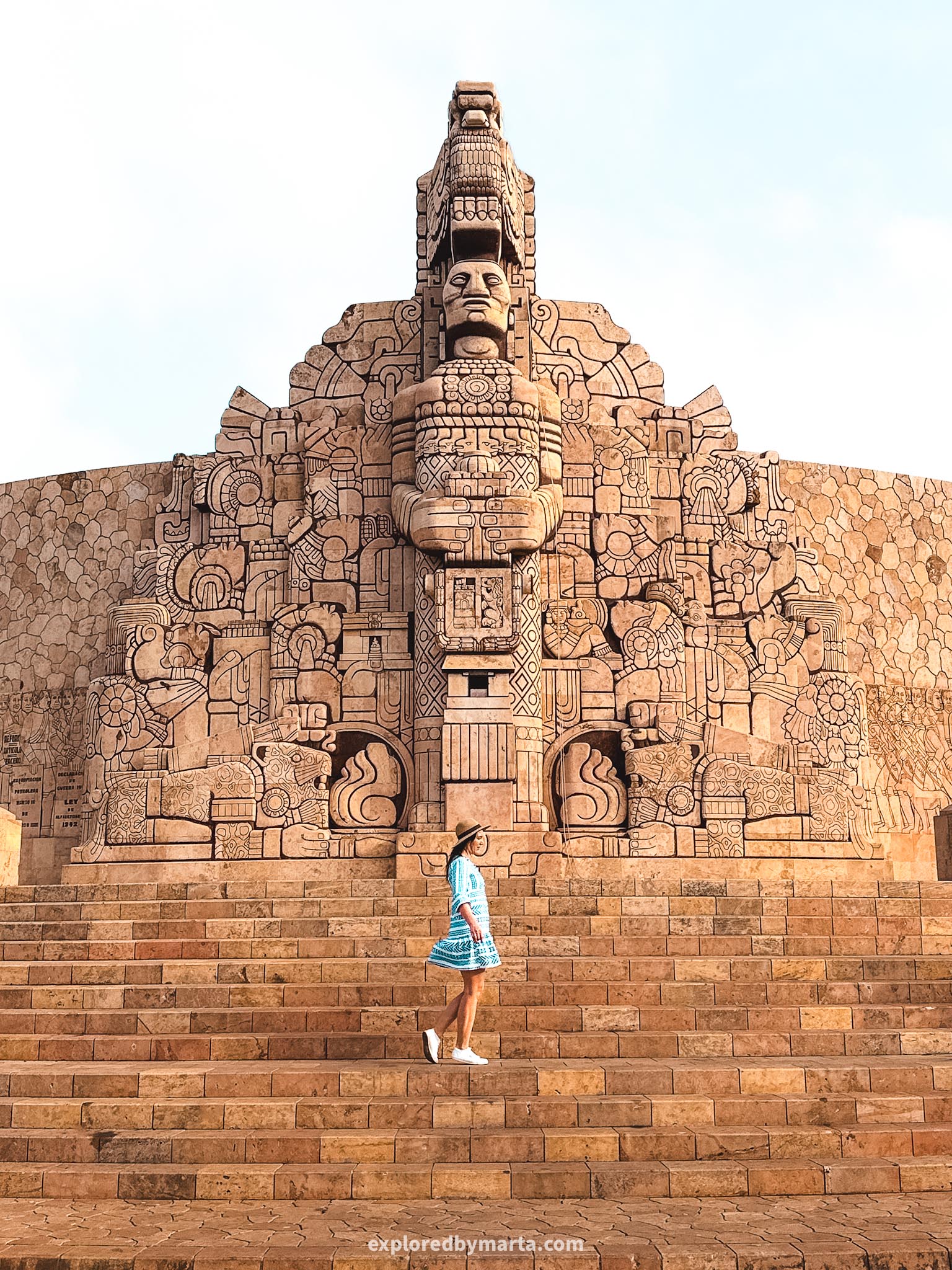
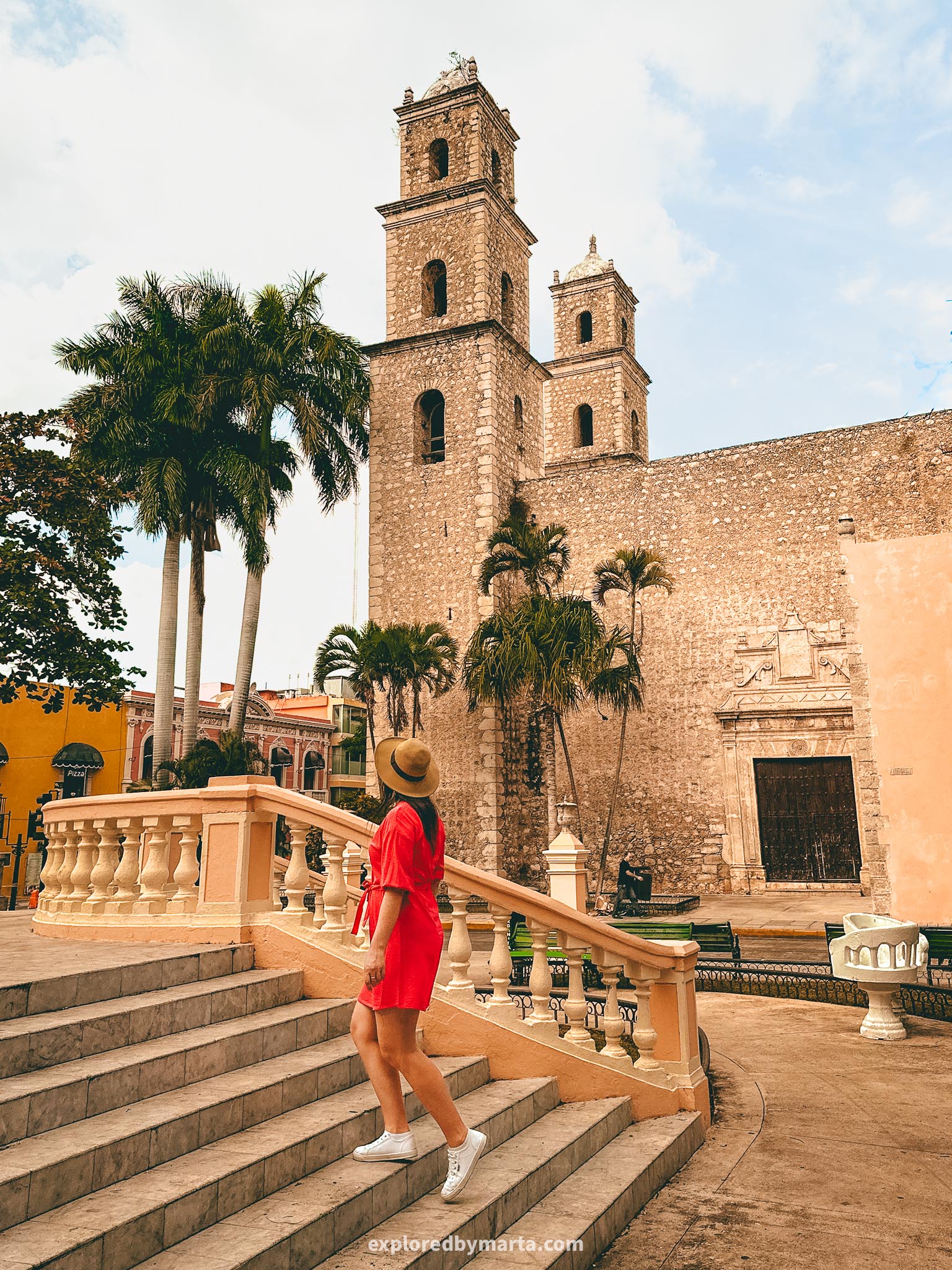
As for gastronomy, you have to try Mayan dishes at either one of the best restaurants – La Chaya Maya or at the Museum of Yucateca Gastronomy which is a restaurant with a small exhibition. Try dishes like salbutes, sopa de lima, or pollo pibil!
As you wander the historic center, spot some of the remaining historic arches, enjoy the smells and flavors at Mercado San Benito, and see some of Merida’s photo-perfect parks like Parque de los Hidalgos or Parque de Santa Lucia with its ‘Sillas Tu y Yo’ chairs!
If you really want to stretch your legs go to the famous Paseo de Montejo and walk down the French-inspired Montejo Walkway with its splendor of 19th-century colonial architecture until you reach Monumento a La Patria – one of Merida’s landmarks!
Location: Plaza Grande of Merida
5. Uxmal Archaeological Zone and Ruta Puuc
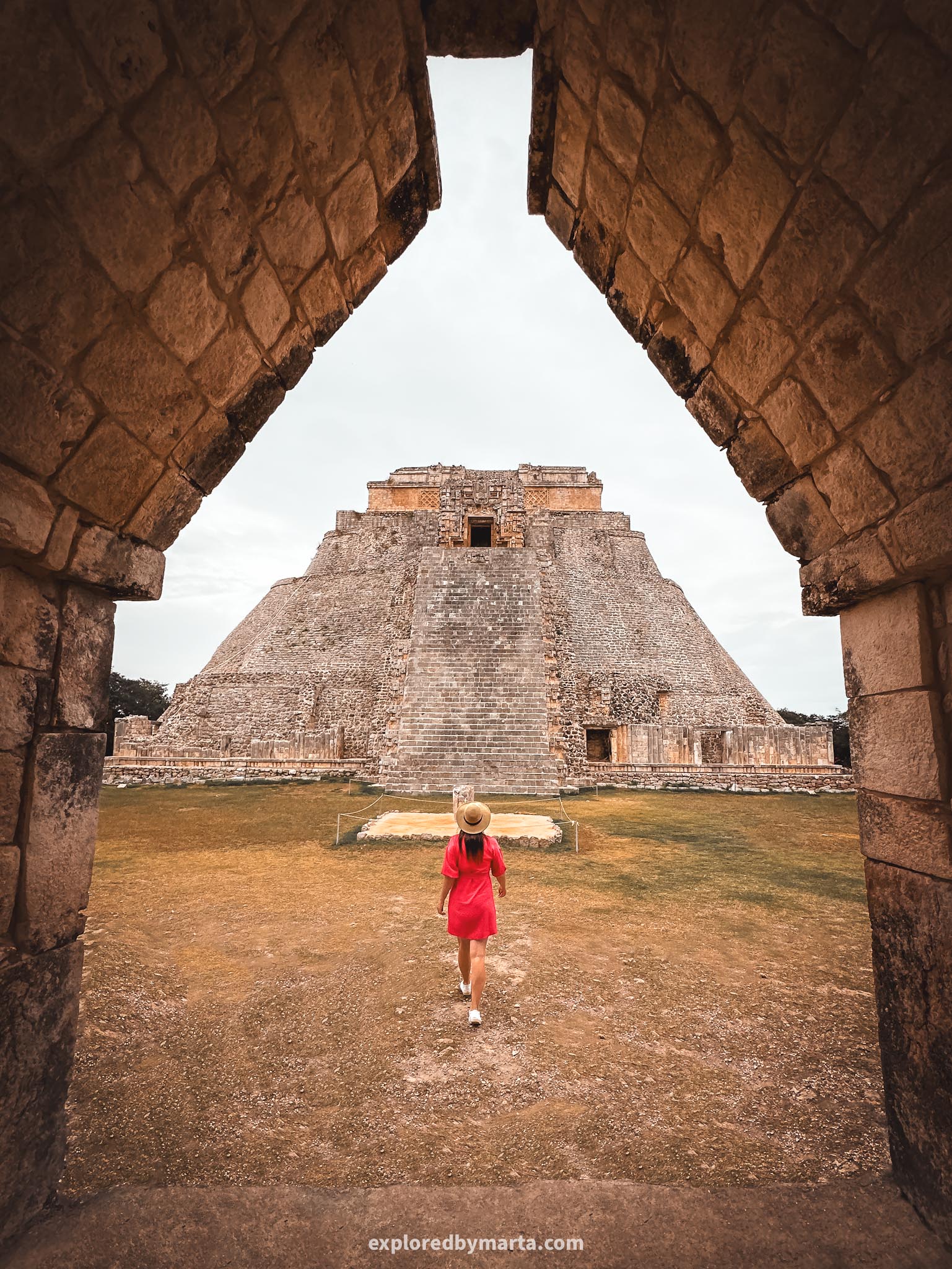
If you decide to stay longer in the capital of Yucatan, there is a must-do day trip from Merida you have to do while there – just a 1-hour drive South of Merida is a group of five different Mayan archaeological zones called the Ruta Puuc route.
Why Ruta Puuc? Ruta Puuc is a group of special Mayan ruins in Yucatán featuring the Puuc architectural style. Puuc means ‘hills’ in the Mayan language and is also the name of the region South of Merida where all these ruins are located.
The most famous one is Uxmal which is often regarded as more beautiful than Chichen Itza. Visiting all sites will take the whole day. We drove Ruta Puuc with our rental car starting early at 8 AM and finishing back in Merida around 3 PM.
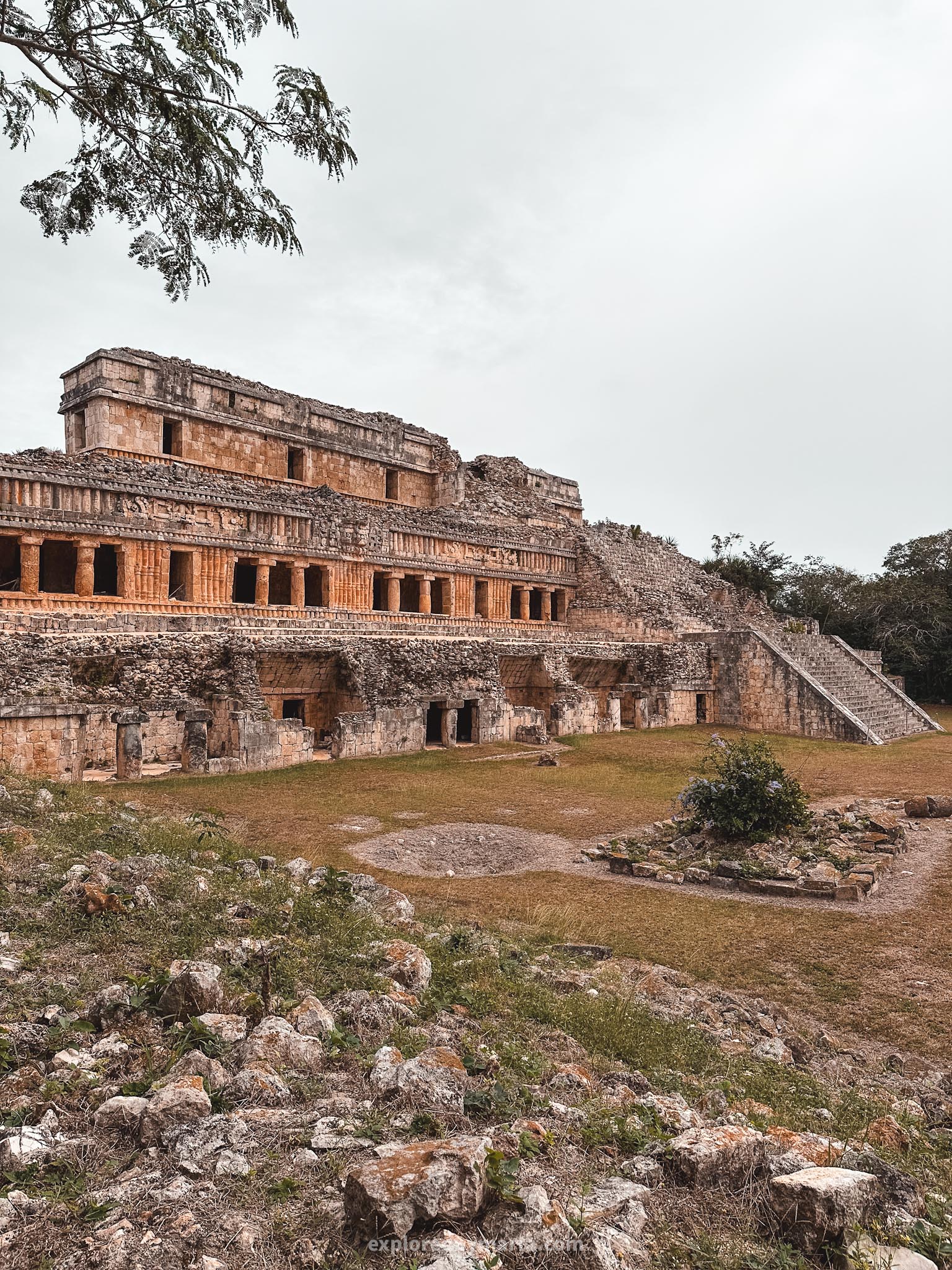
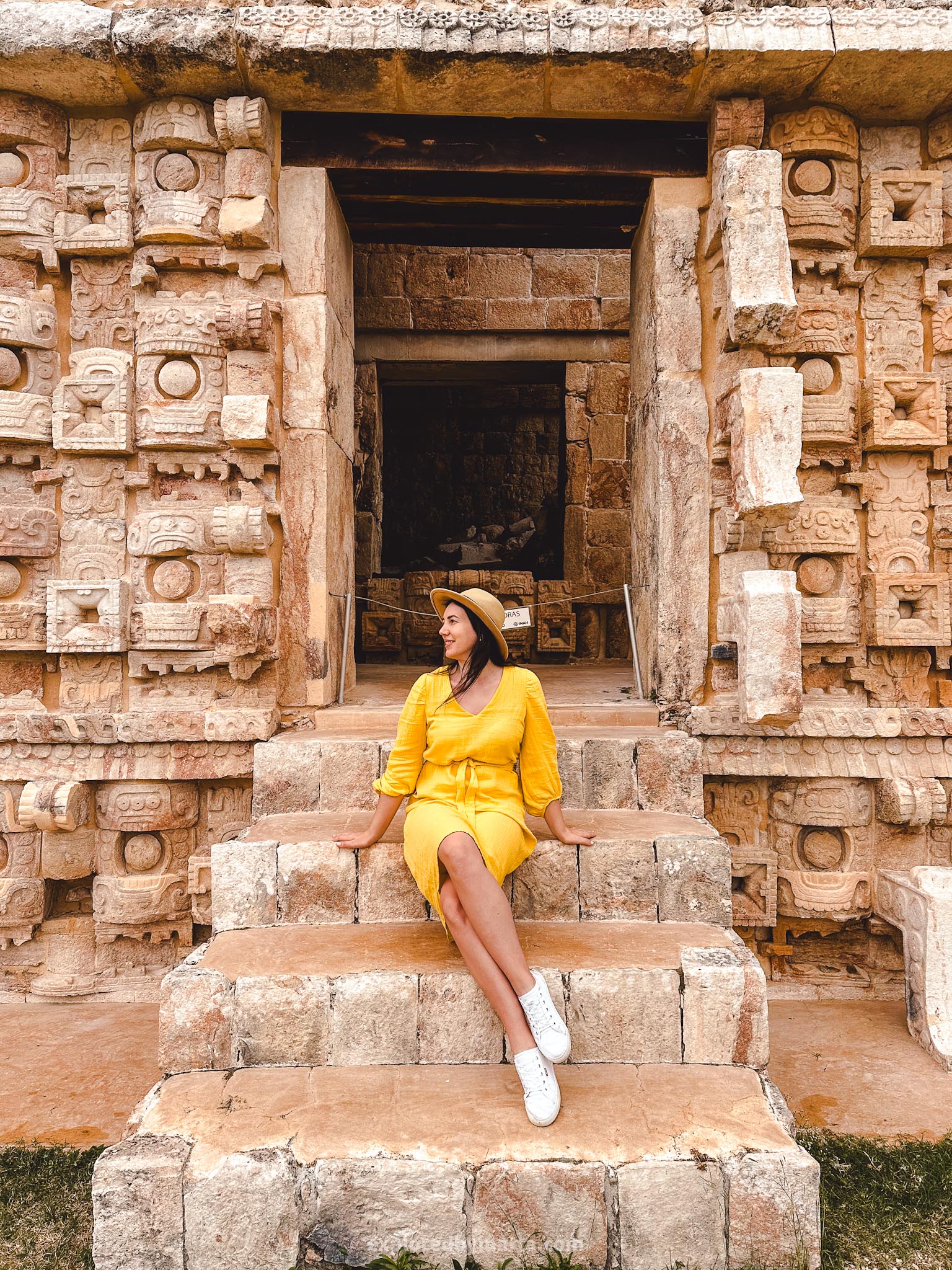
Puuc architecture usually displays stone mosaics, geometrical elements, and elaborate sculptures e.g. it often features masks of the long-nosed rain god Chaac. It also features stone arches in unique shapes (see the frame in the first photo).
Uxmal with its famous Pyramid of the Magician is amongst the most impressive Mayan ruins in Mexico. The whole archaeological zone is listed as a UNESCO World Heritage Site due to its significance.
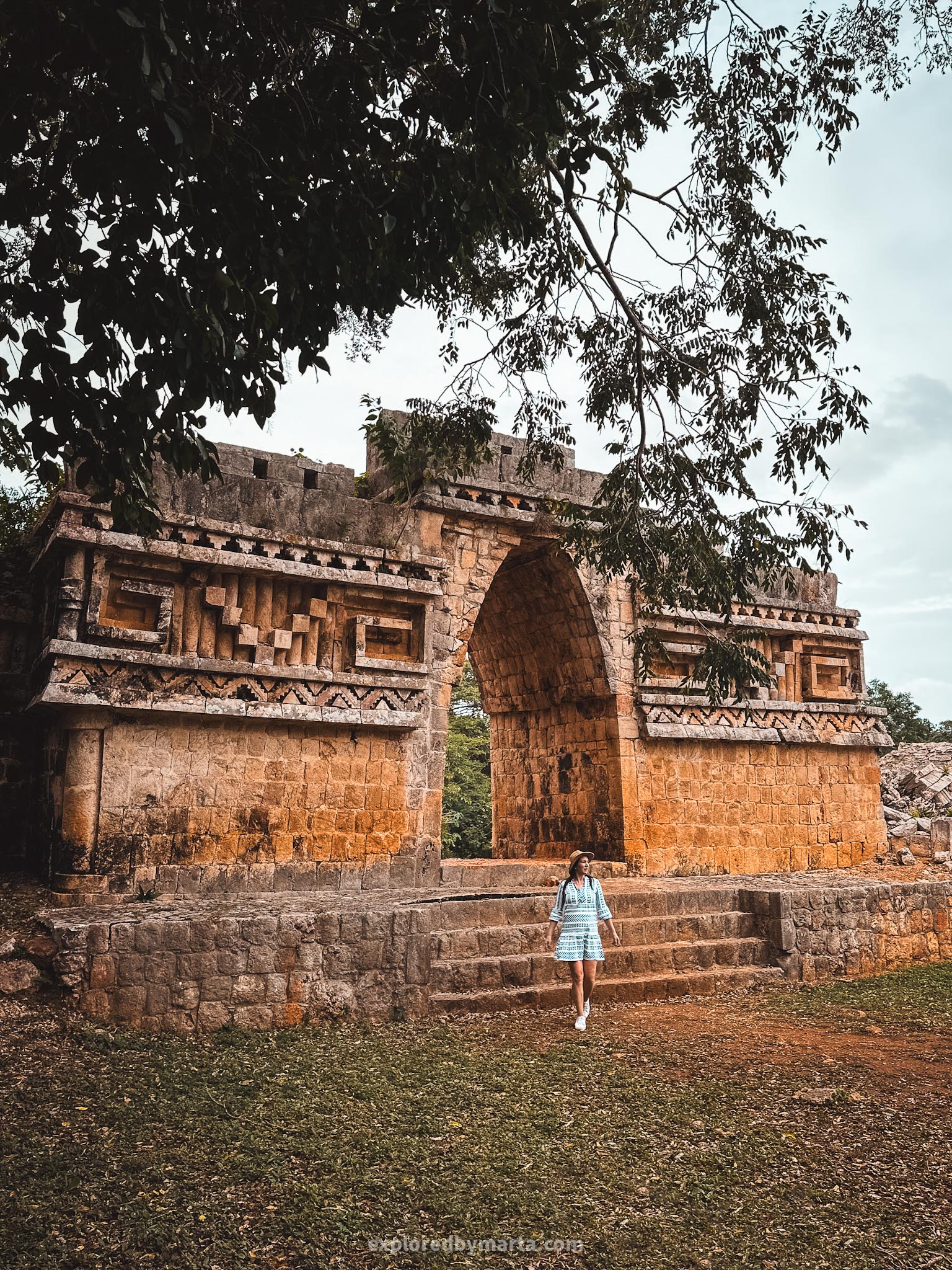
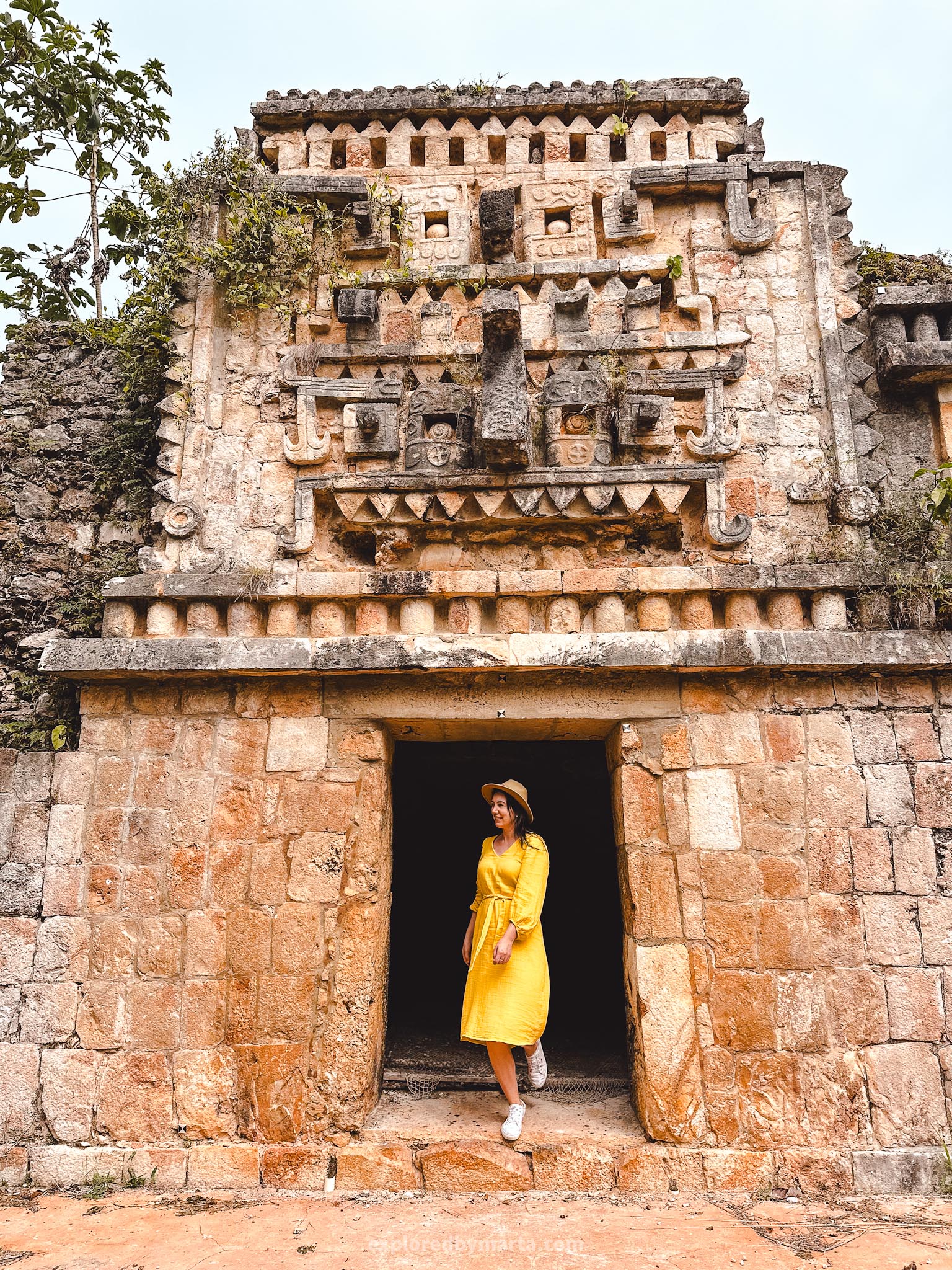
Other archaeological zones along Ruta Puuc include the archaeological zone of Kabah, the archaeological zone of Sayil, the archaeological zone of Xlapak, and the archaeological zone of Labná (my favorite after Uxmal).
If you only have time for only one place, then go to Uxmal which is one of the most incredible Mayan ruins in the Yucatán Peninsula. If you have to skip some of those places, I’d choose Xlapak and Sayil as my least favorite of all.
Location: Uxmal – Kabah – Sayil – Xlapak – Labná
6. Cenote Ik Kil
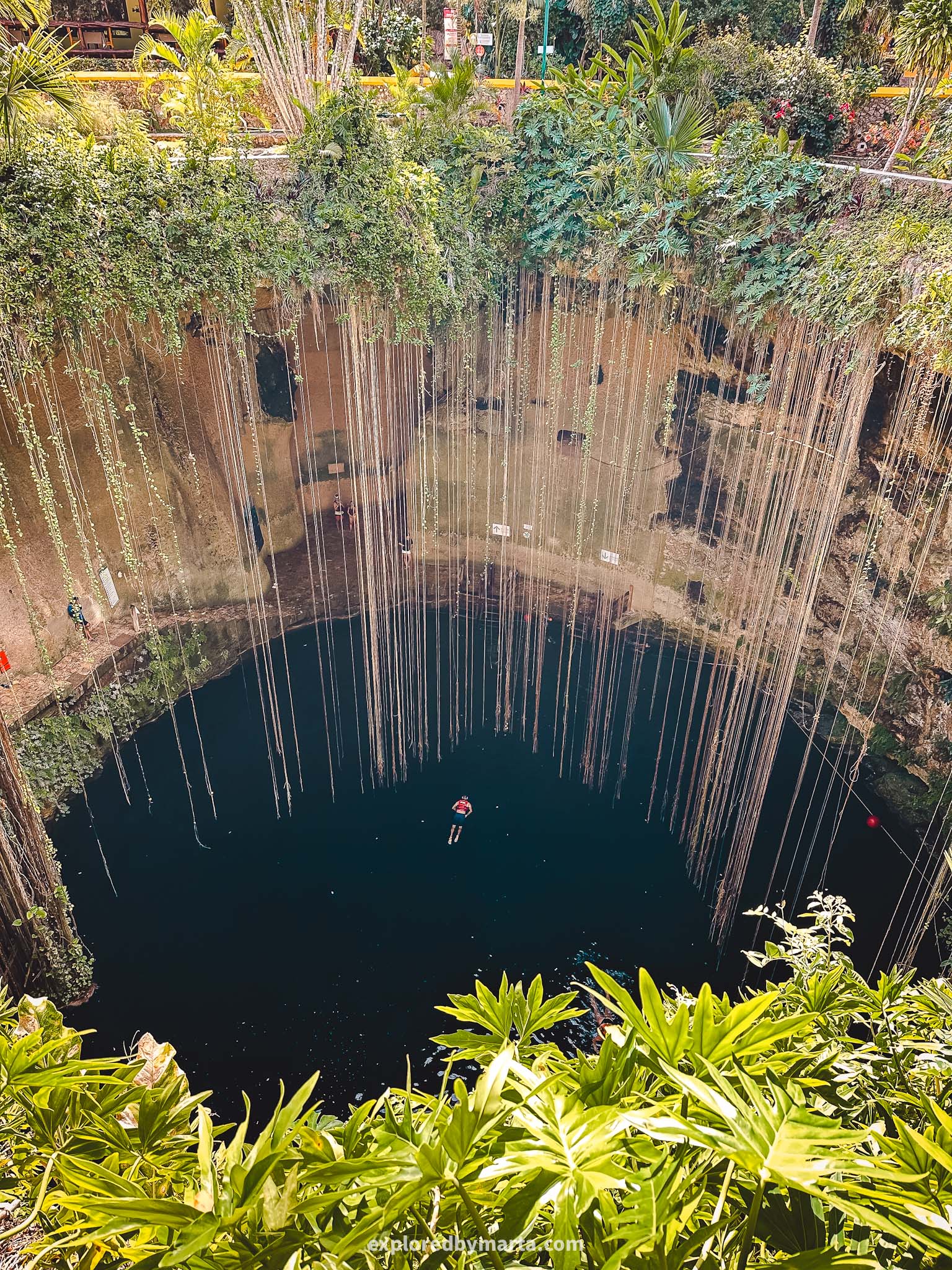
Cenote Ik Kil is one of the most beautiful places in the Yucatan peninsula and a visit to this place is often combined with visiting Chichen Itza – both sites are located just 5 kilometers (3 miles) apart.
This cylindrical cenote stands out with its circular shape and 26-meter walls covered with hanging plants and tree roots. The cenote itself is 40 meters deep and served as a place for sacrifices for ancient Mayan people a long time ago.
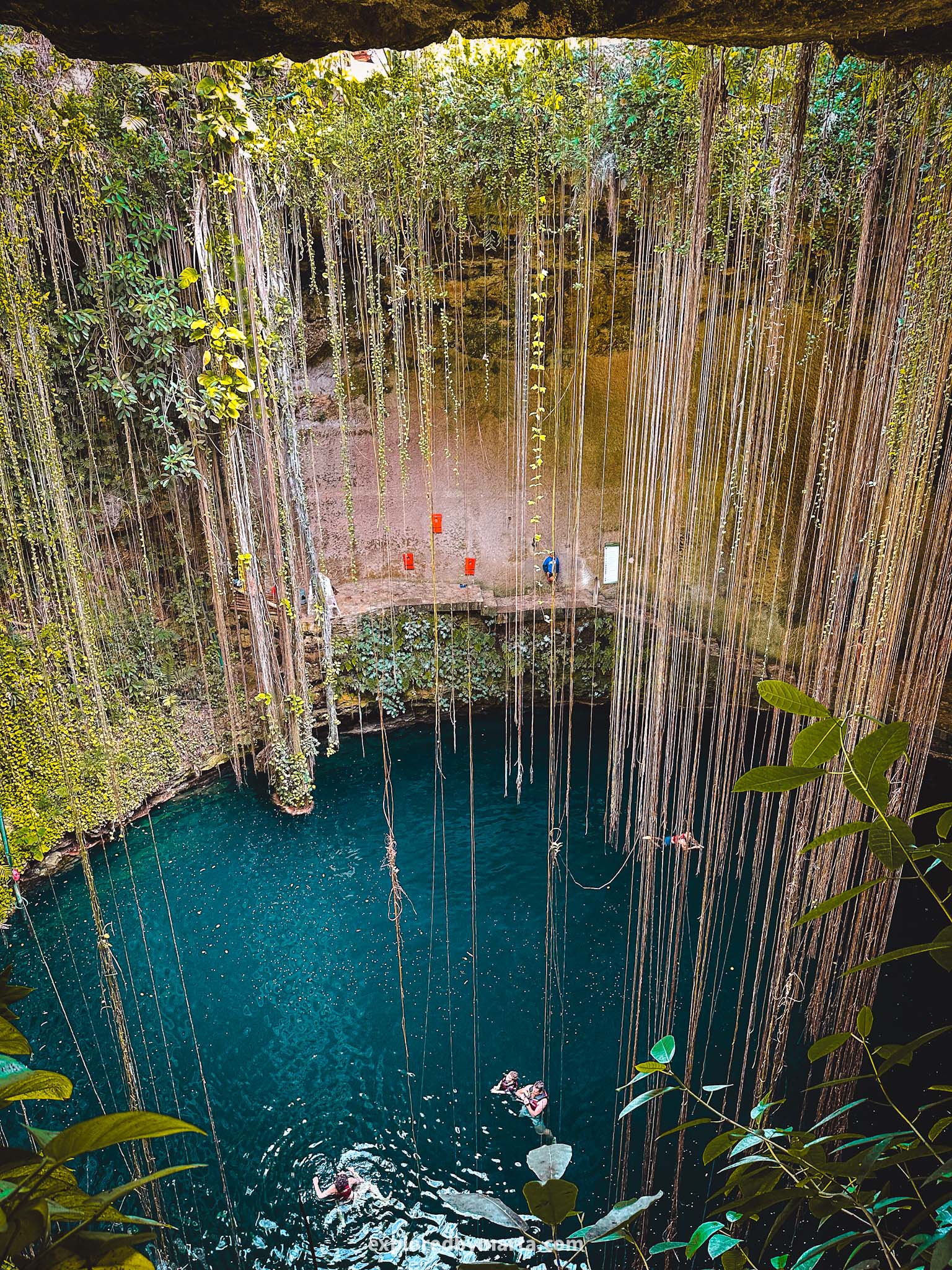
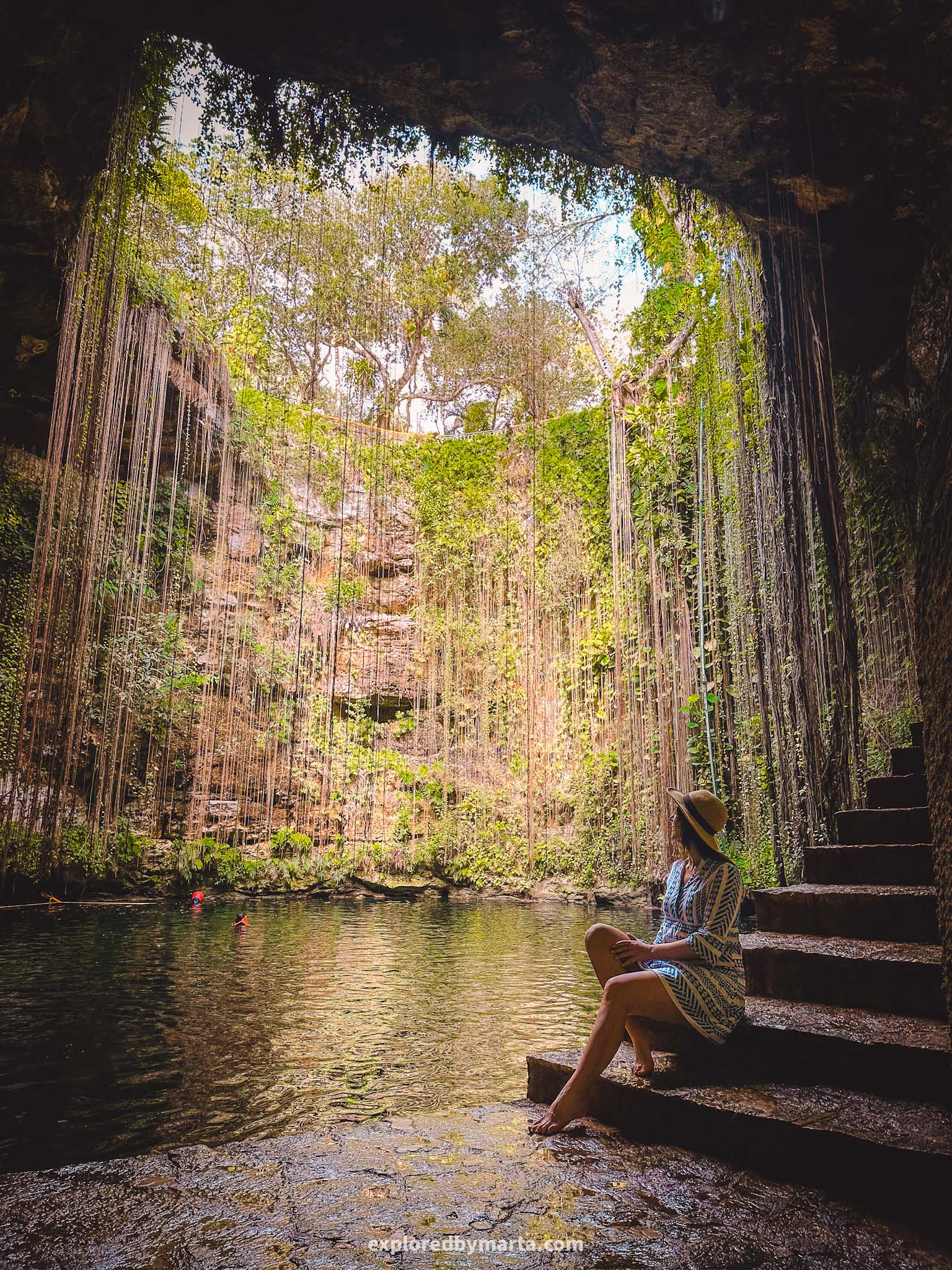
The cenote is located within the territory of a hotel and a restaurant so you can not only go for a swim here but buy a combined ticket that offers a buffet-type catering. That’s why it is a popular place amongst tour buses. Arrive early to avoid them!
Did you know? Ik Kil from Mayan means ‘place of the winds’.
We visited Ik Kil Cenote on the same day we went to Chichén Itzá. The entrance fee to the cenote was 200 pesos per person. At first, you can observe the cenote from above and then descend 90 steps through a tunnel to the water. It was gorgeous!
Location: Cenote Ik-Kil
7. The rainbow-colored city – Valladolid
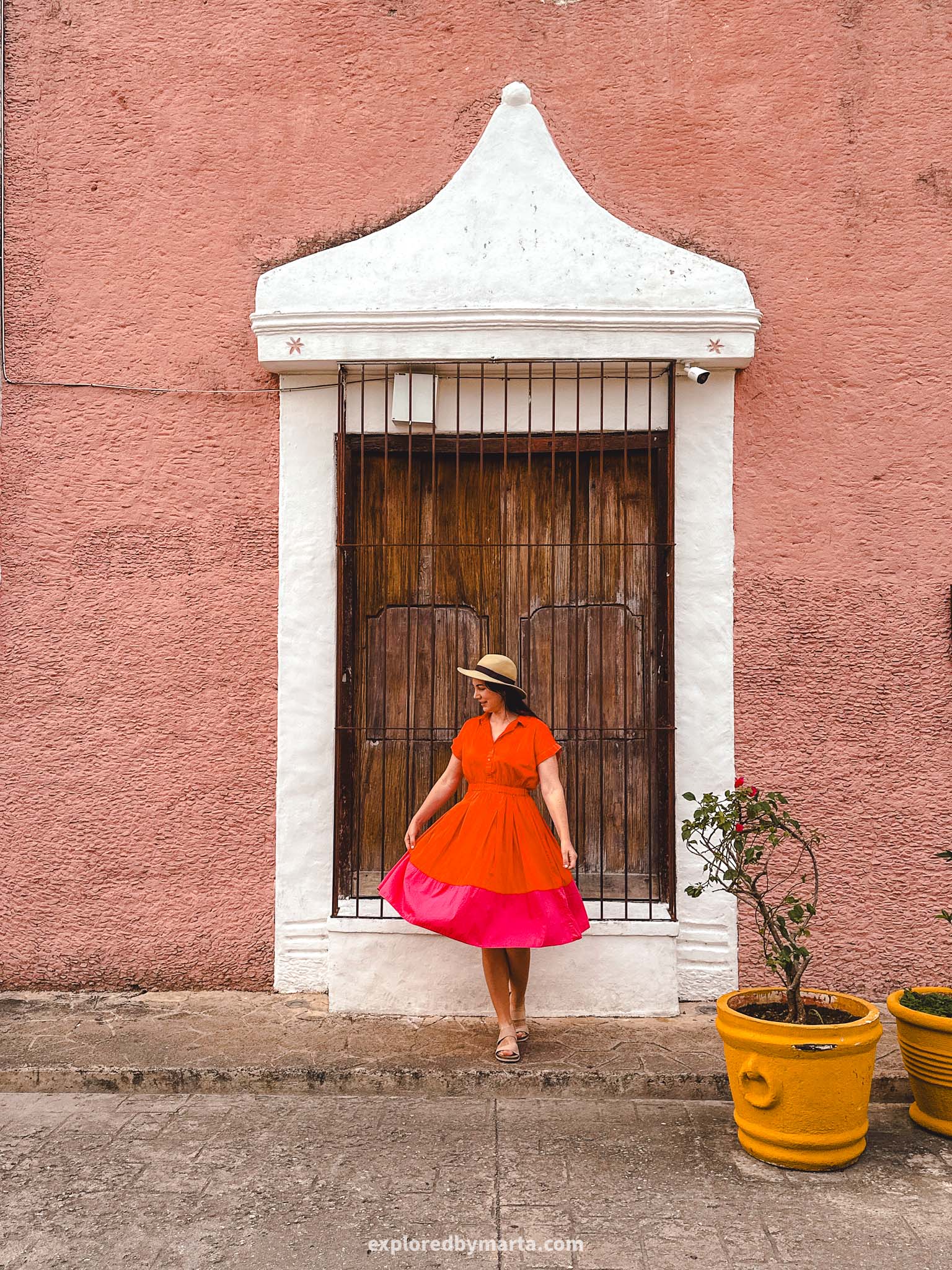
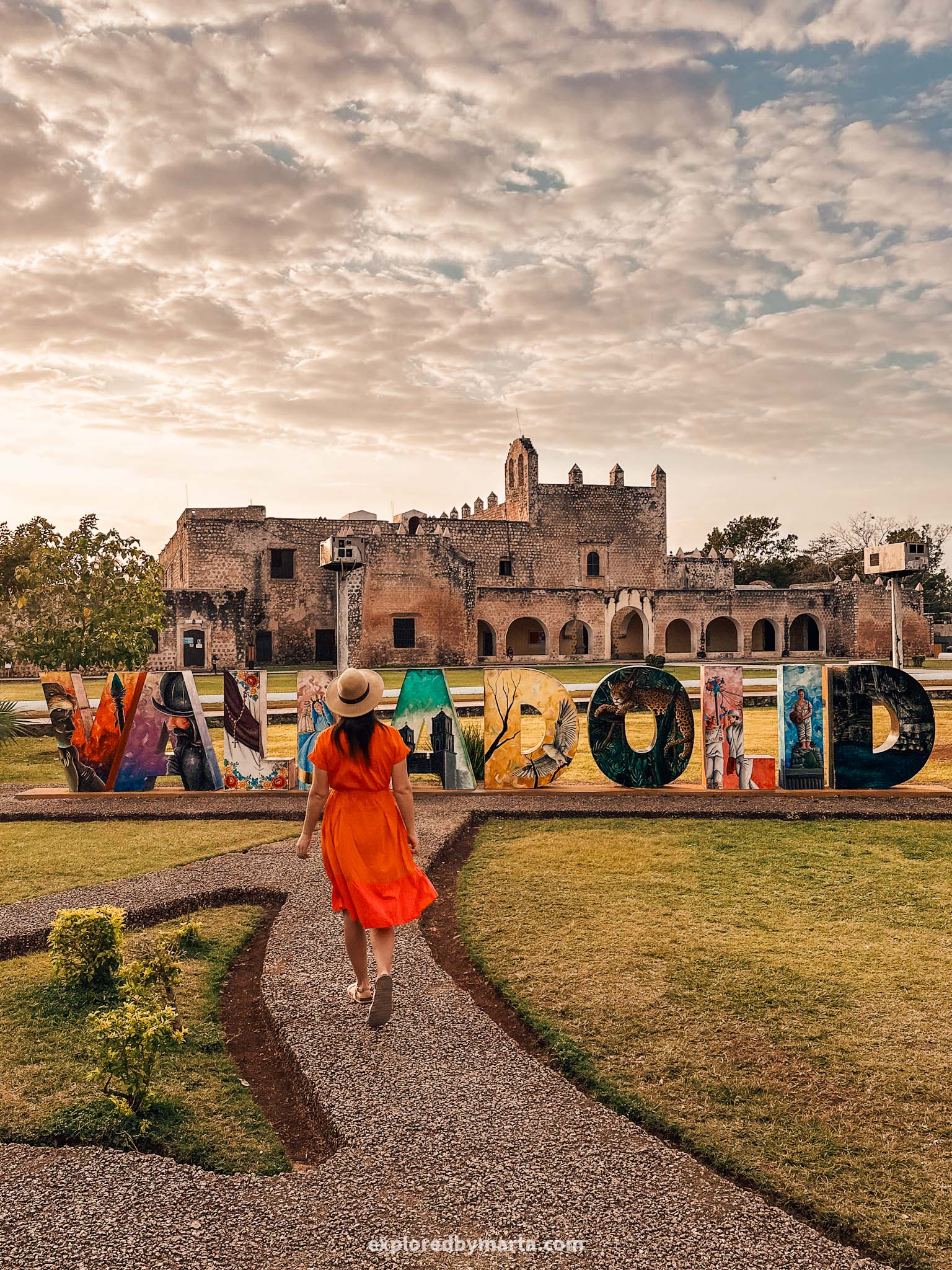
The colonial town of Valladolid is amongst the best places to visit in the Yucatan peninsula known for its well-preserved Spanish colonial architecture, cobblestone streets, and vibrant pastel-colored buildings.
Valladolid was founded and built by the Spanish conquistadors. The town now sits in a place where there once was a Mayan city. Many historical buildings were built using stones from nearby Mayan sites including Chichen Itza.
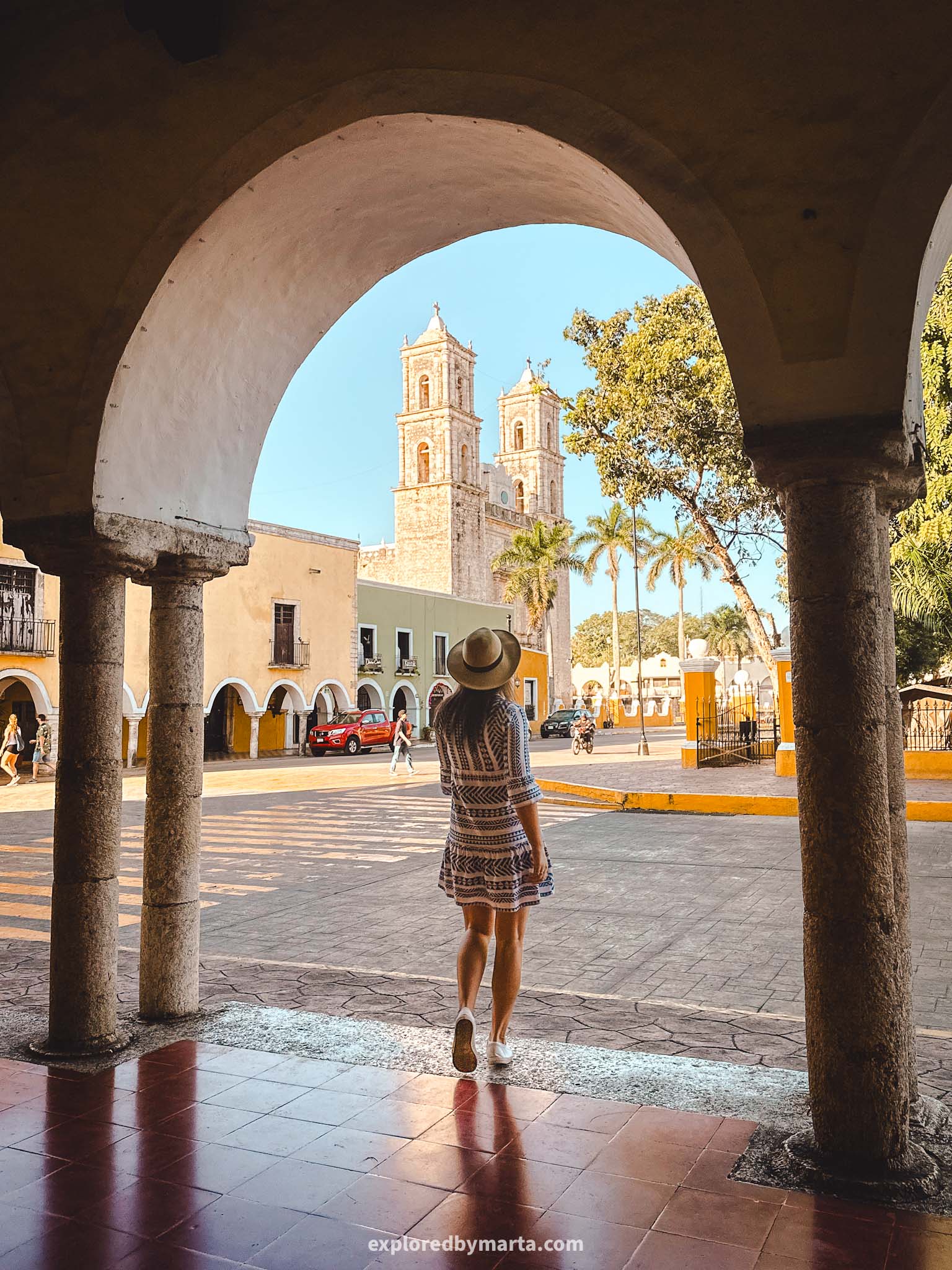
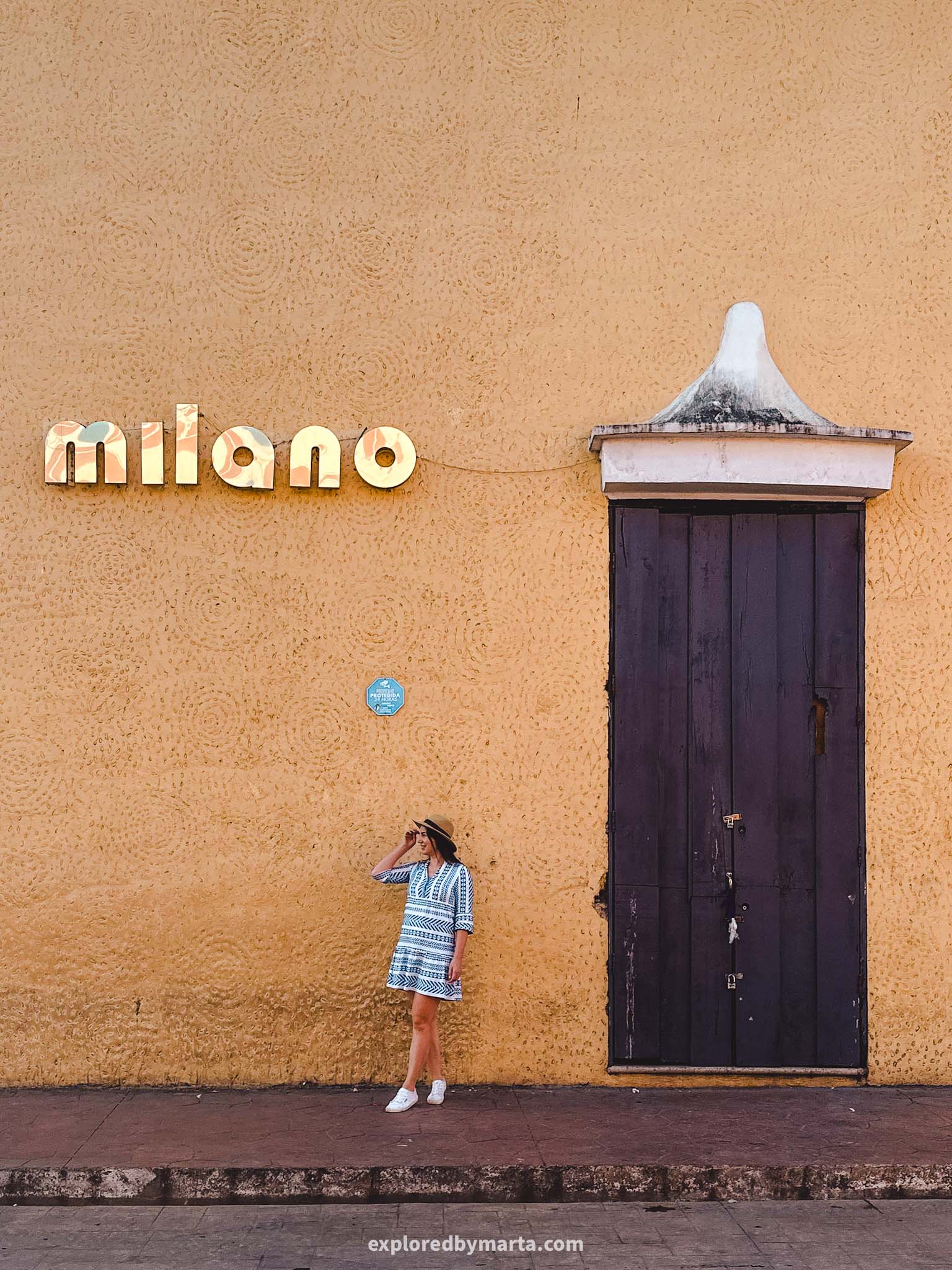
Thanks to its proximity to the famous Chichen Itza ruins, Valladolid has grown from just a stopping point along the way to the world-famous Mayan pyramid to an established tourist destination in the Yucatan Peninsula.
We actually spent three weeks in Valladolid exploring everything this city and its surroundings had to offer. Besides such famous landmarks as Chichen Itza or Ek Balam archaeological sites, there are many other things to do in Valladolid.
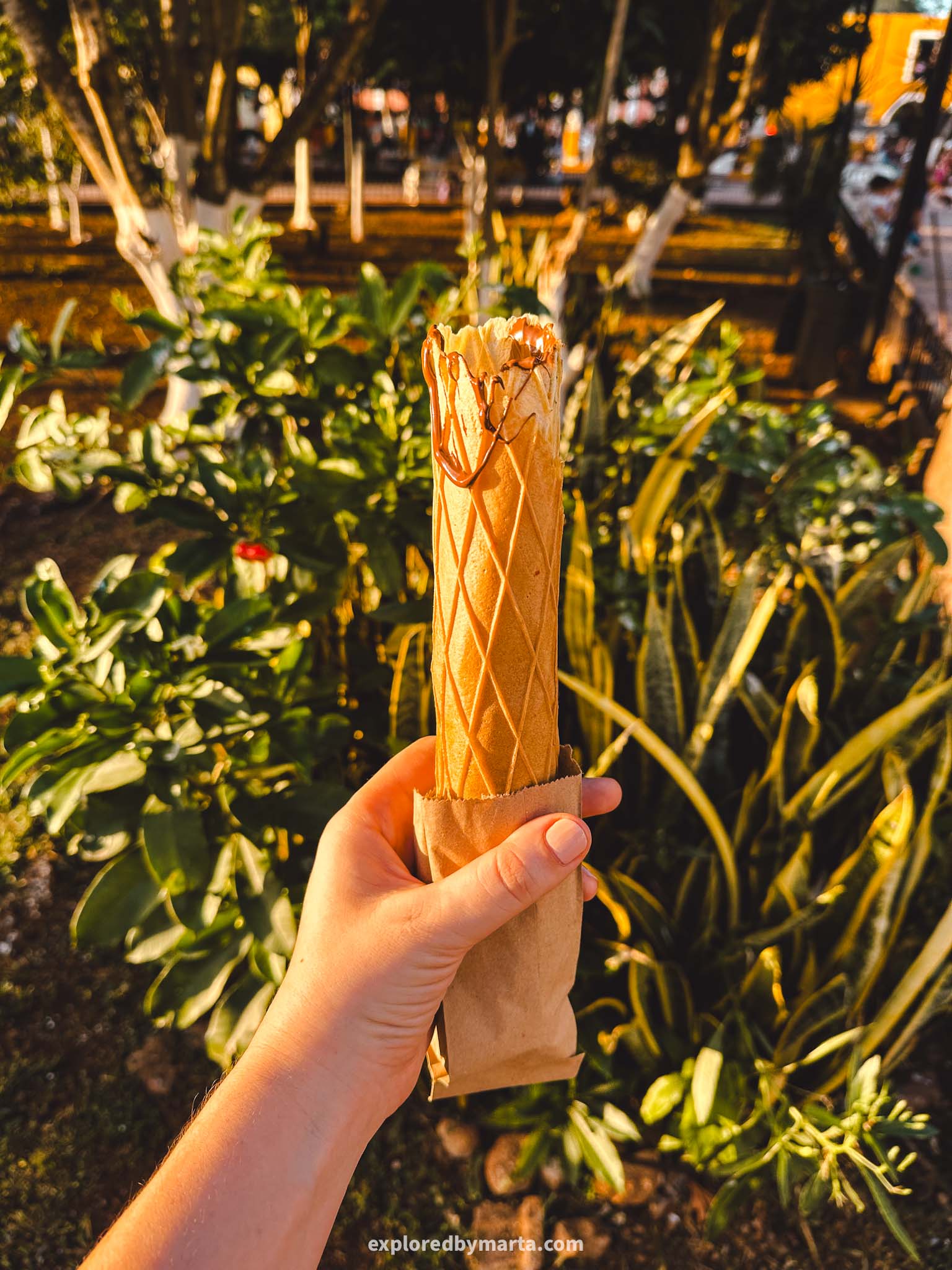
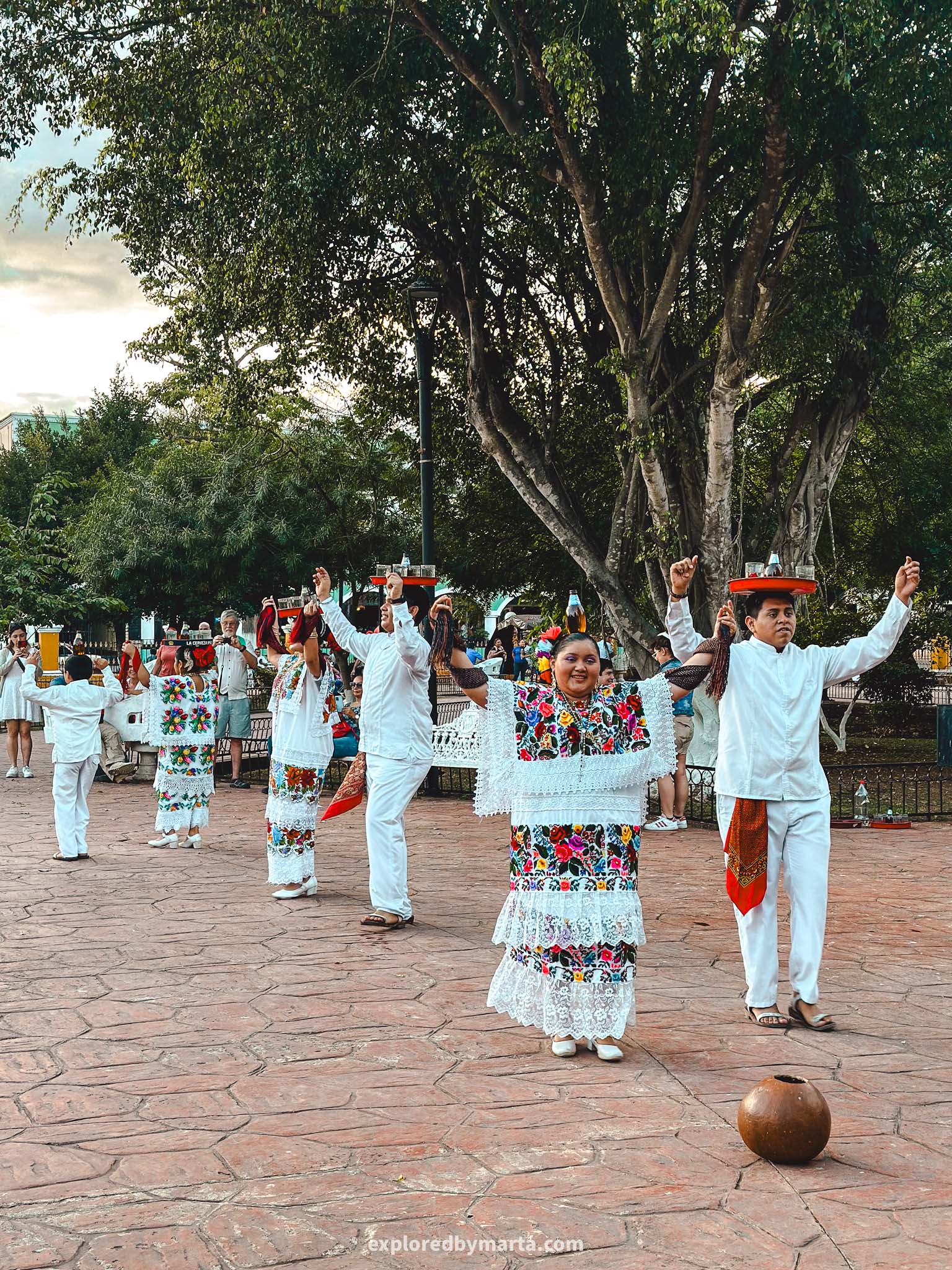
A must-visit place in Valladolid is Parque Principal – we went to the main square numerous times to grab those tasty marquesitas, churros, and gelatos, and watch Mayan dancers performing while juggling dish trays on their heads!
Right next to the main square, there is one building that stands out – Templo de San Servacio or Church of San Servacio. It is a colonial church with two bell towers founded in the 16th century along with the city but it was remodeled in the 18th century.
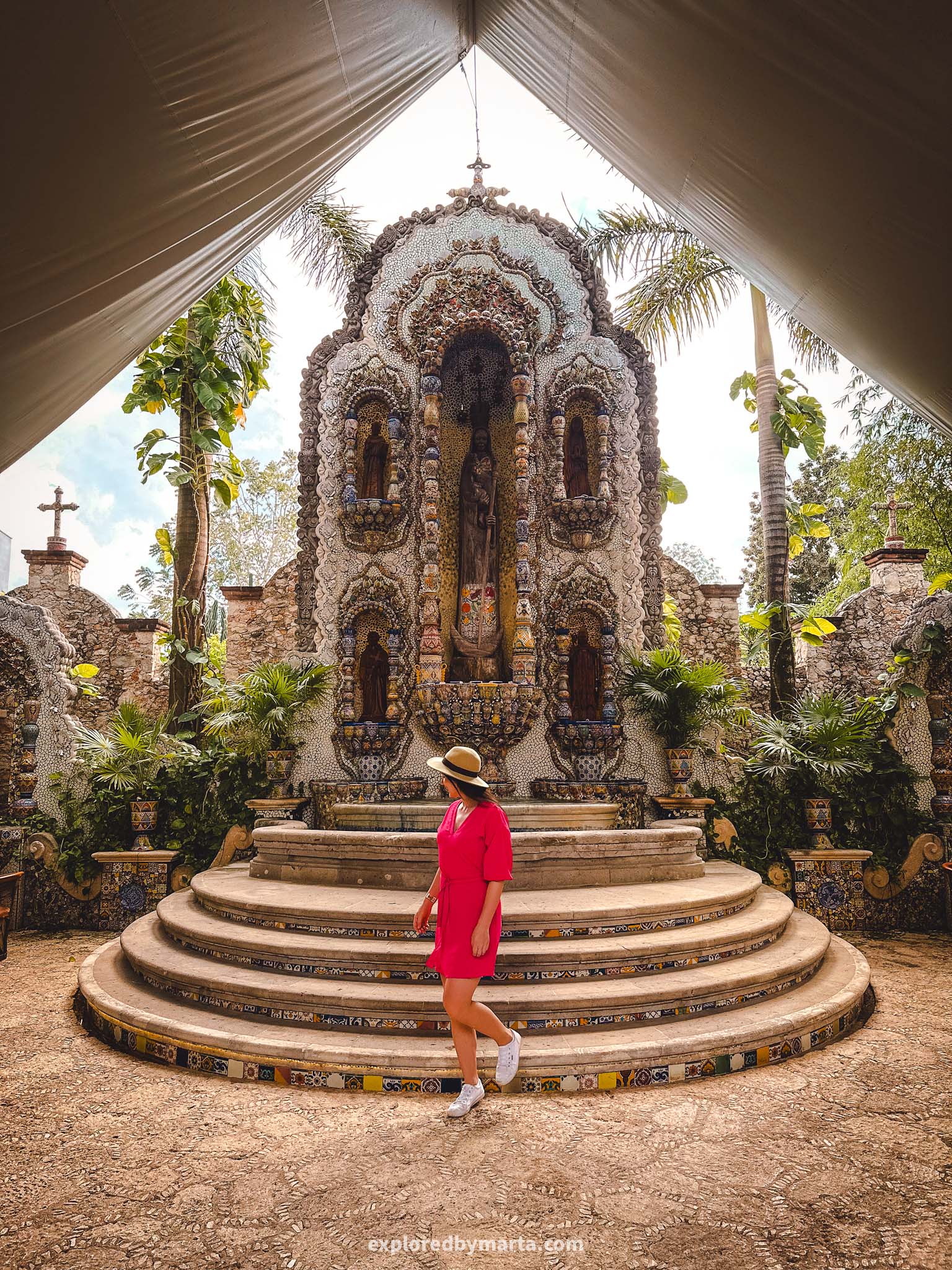
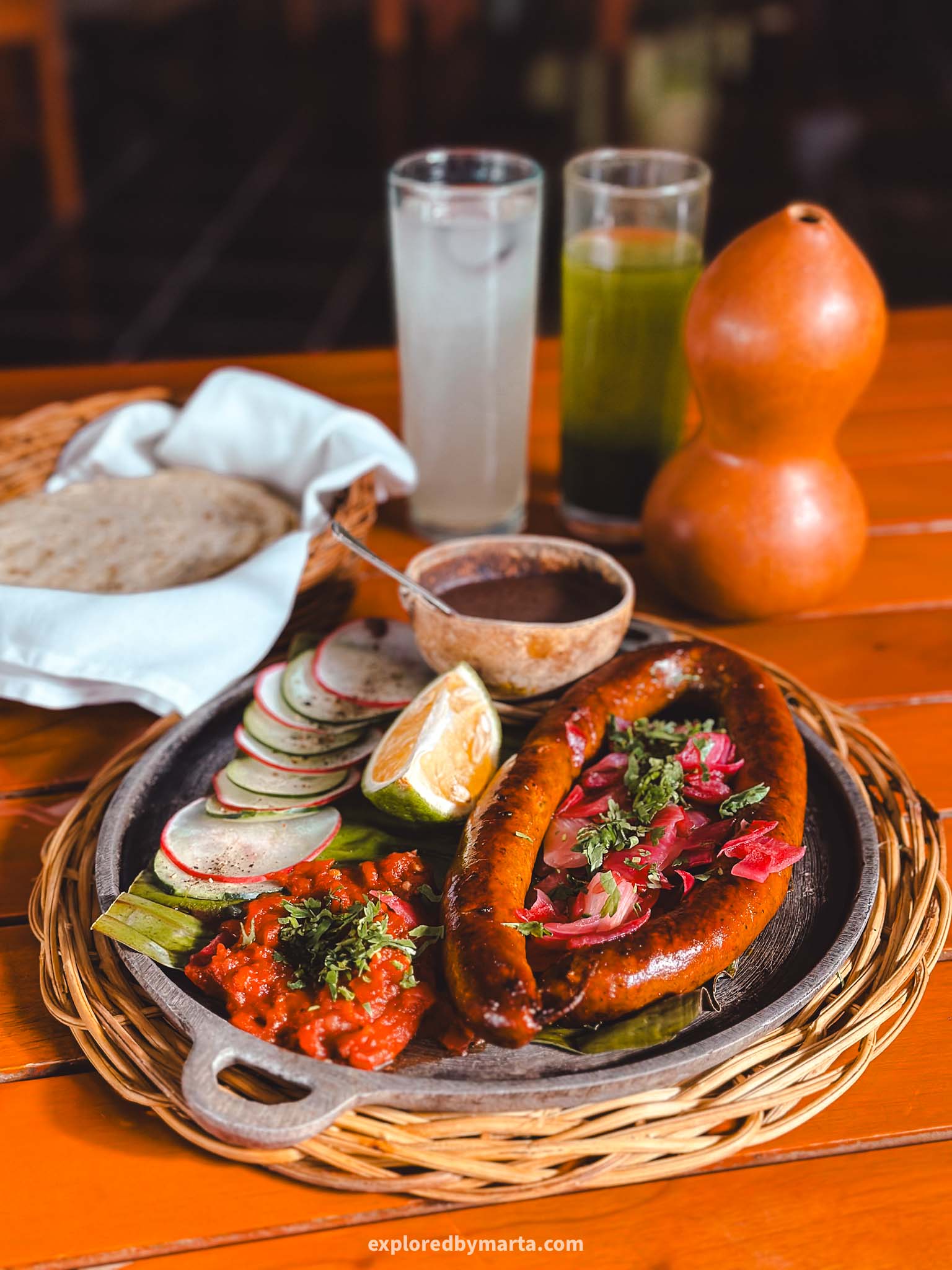
You will also want to walk the colorful Calzada de los Frailes street – one of the most colorful streets and iconic Instagram spots in Valladolid! The street goes from the historic center to another major landmark – the Convent of San Bernardino de Siena.
The convent is one of the oldest and most emblematic buildings in Valladolid, and is definitely worth visiting! It was built and founded in the middle of the 16th century by the Franciscan order who arrived at Yucatan after the Spanish conquest.
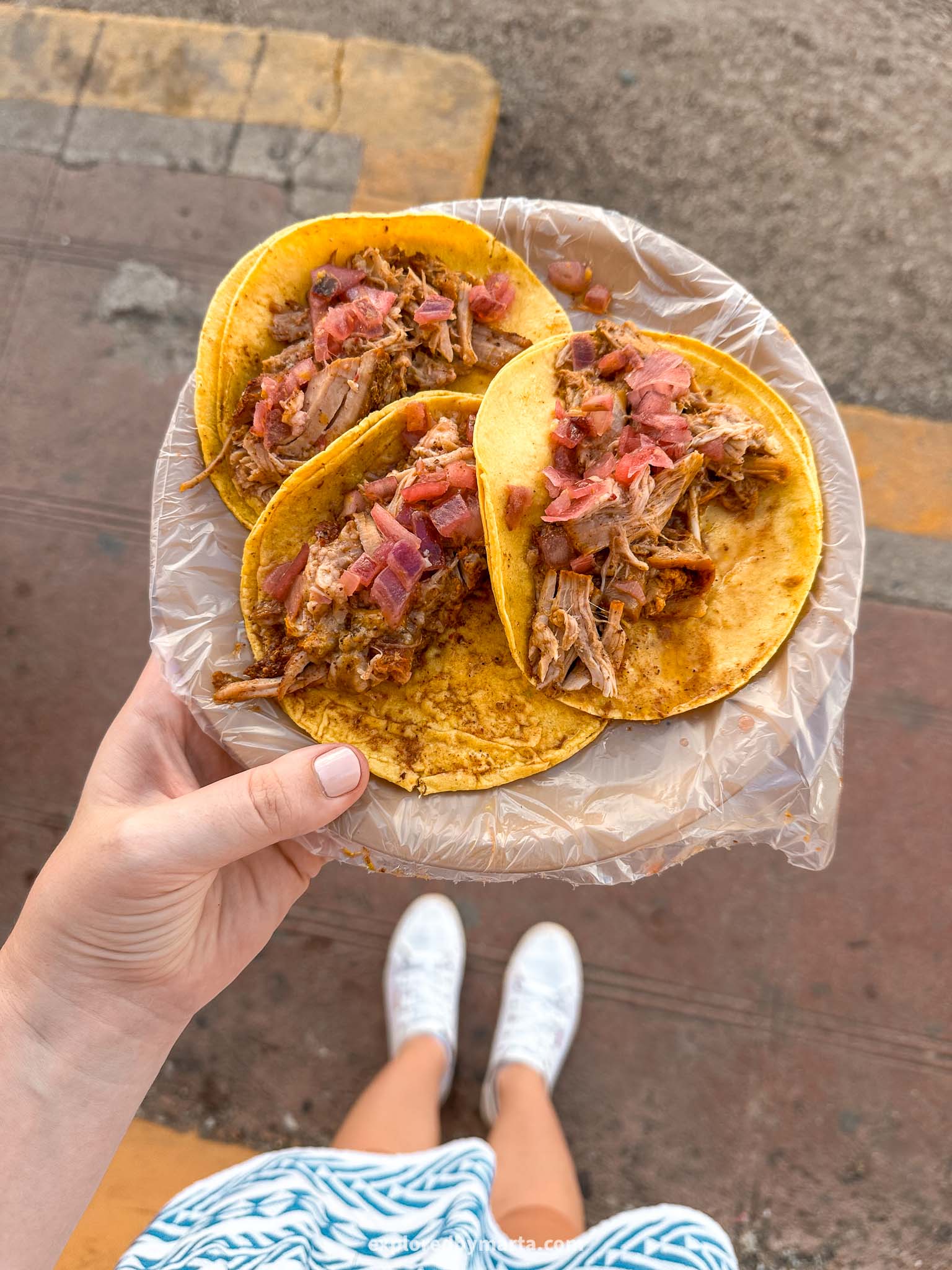
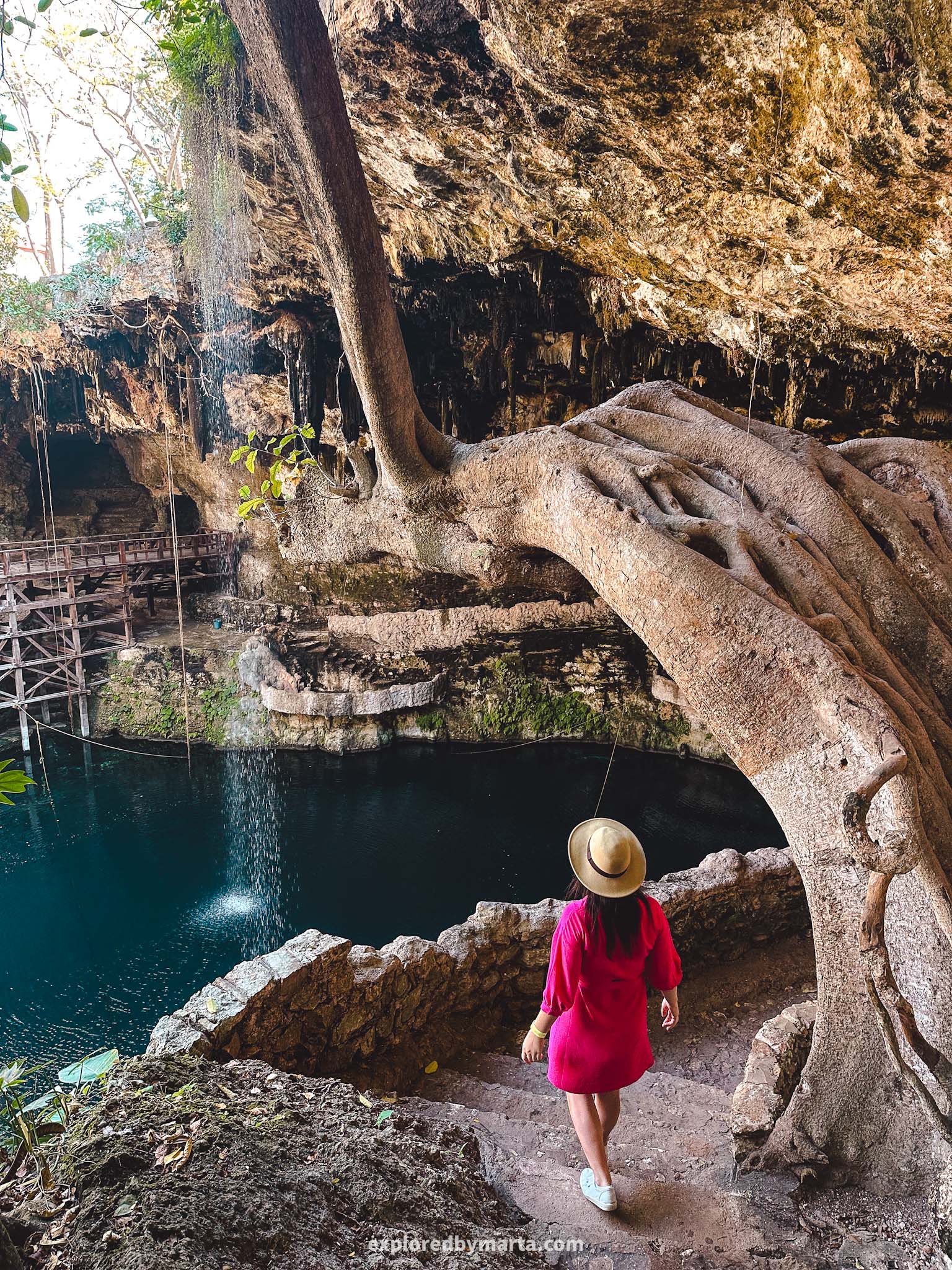
But did you know that there is a cenote right in the heart of Valladolid city? Yep! Cenote Zaci is a gorgeous large cenote located in the very center of Valladolid just a short walk from the main plaza. Like really, just two blocks away! Do check it out!
You will also want to try some tasty food. Trying the local legend – longaniza de Valladolid – is a must. But you might also try some tasty and juicy tacos – I recommend stopping by El Tigrillo street stall or Yakunaj Cocina Mexicana for a nicer meal.
Location: Parque Principal de Valladolid
8. Ek Balam Archaeological Zone
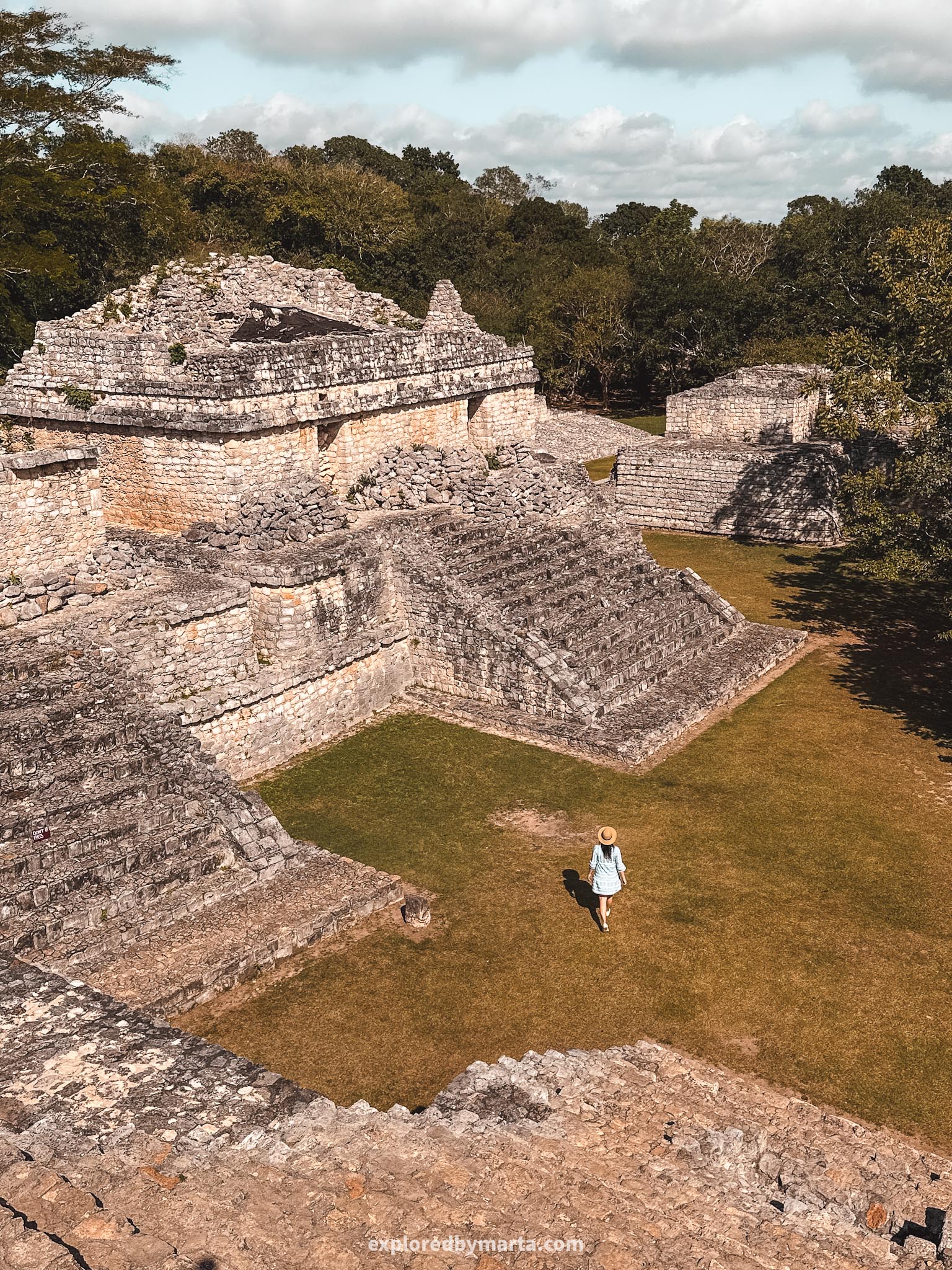
Ek Balam archaeological zone is a place worth visiting just a 30-minute drive from Valladolid. It is one of the most important Mayan sites in Mexico’s Yucatán Peninsula and the best part about it is that you can climb the Mayan ruins and pyramids!
Them allowing us to climb the pyramids kind of offsets the massive entrance fee – we paid 550 pesos each plus 100 pesos for parking. Theoretically, you can pay by card (only entrance fees) but because of the bad network, we ended up paying in cash.
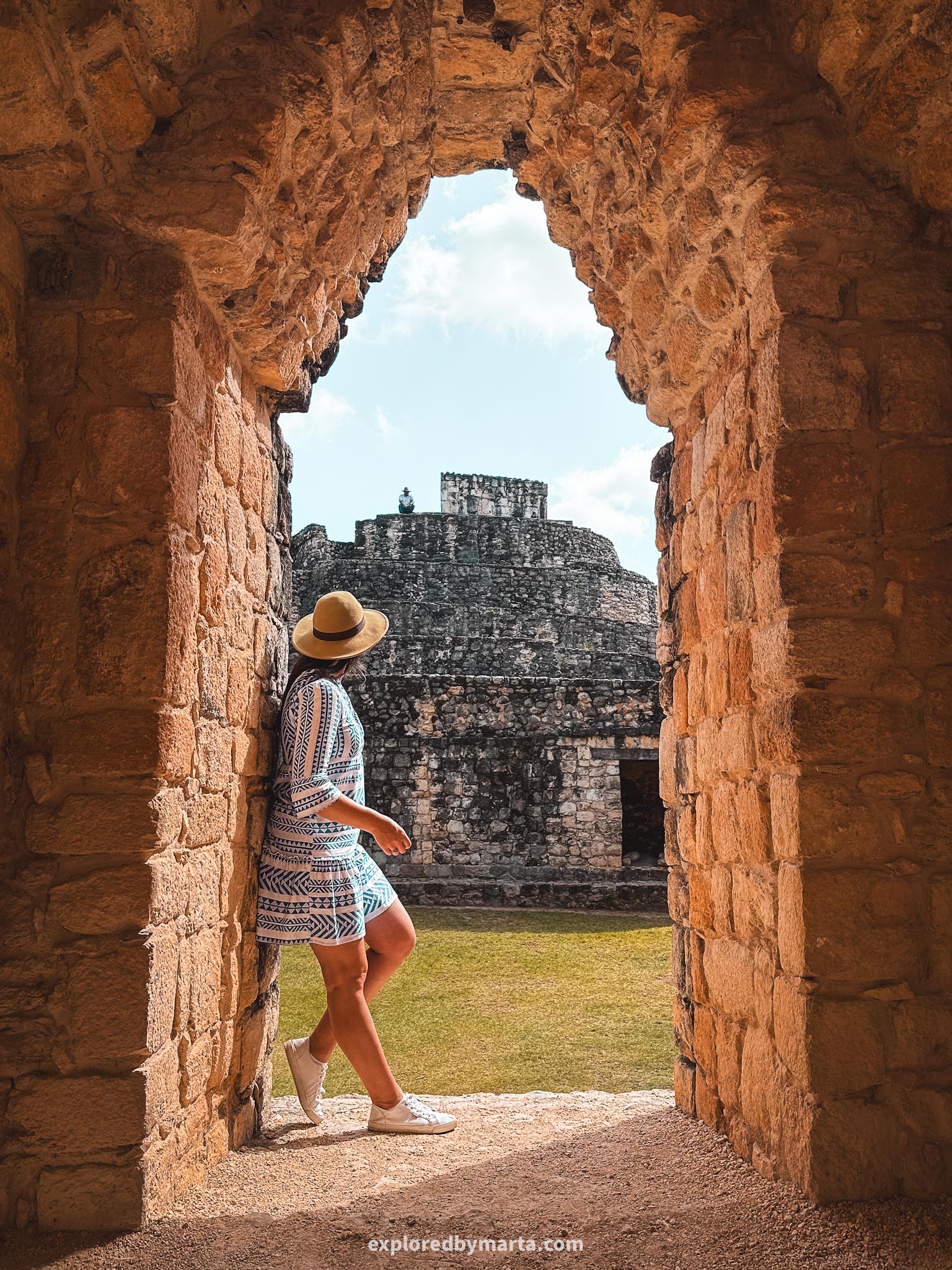
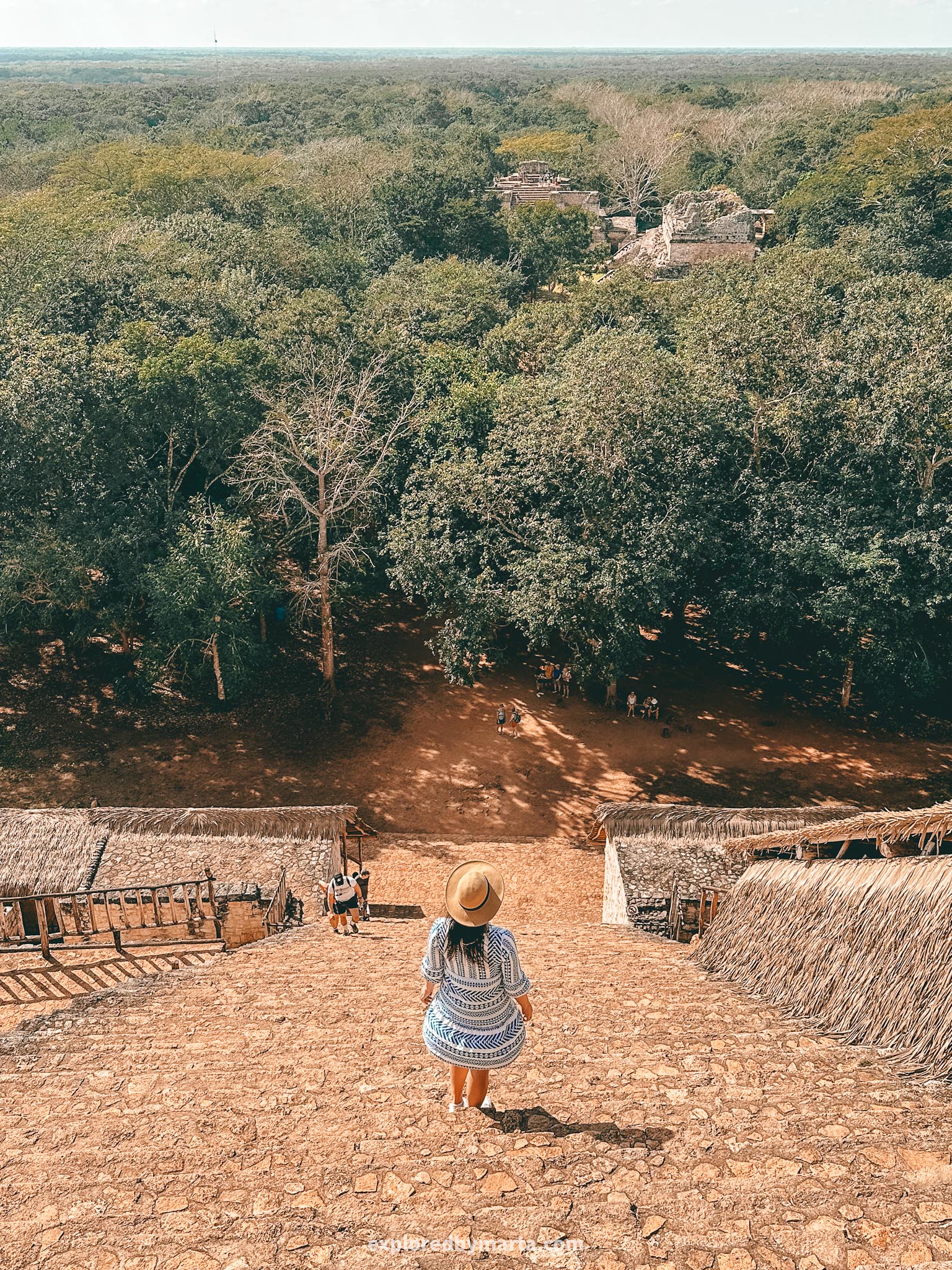
Ek Balam is located in the heart of the Yucatan peninsula making it a convenient destination to visit from anywhere really. The name Ek Balam translates as the black jaguar in the Mayan language. You’ll see many black jaguar souvenirs there!
Ek Balam site features multiple impressive buildings and pyramids. The largest structure in Ek Balam is the Acropolis. It is like a temple pyramid with a staircase in the middle where you can climb up to the top to see incredible views over the jungle.
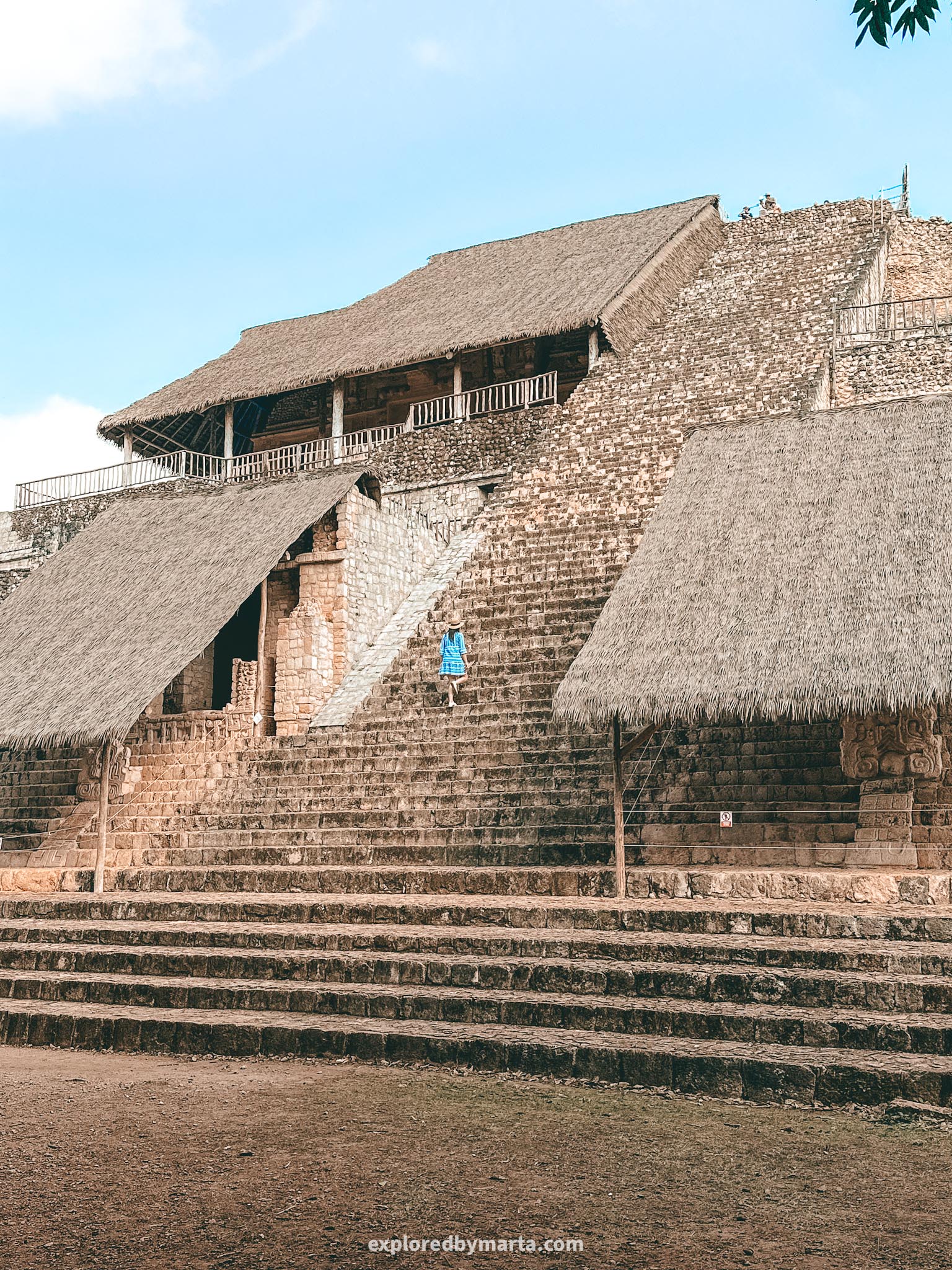
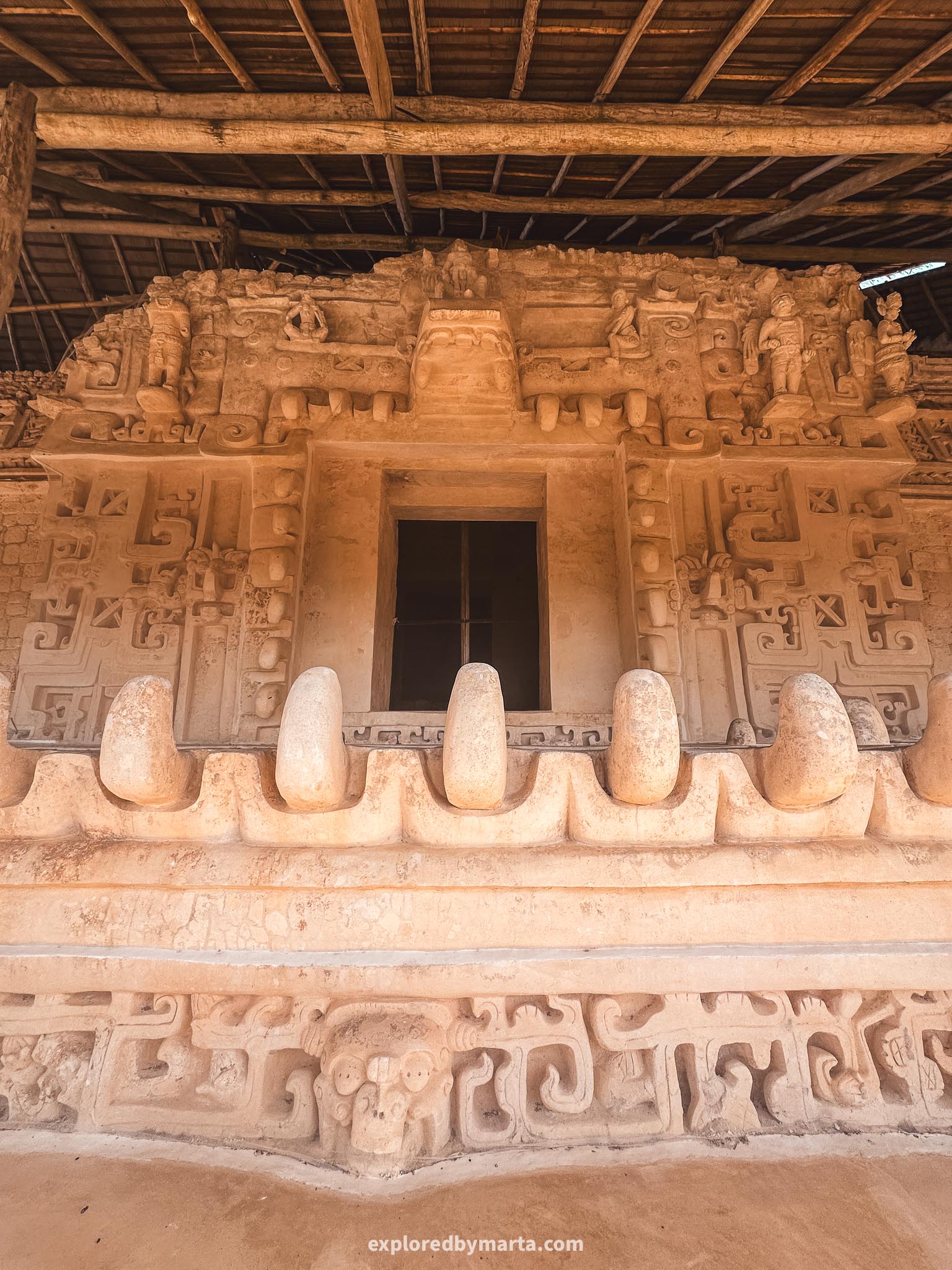
To both sides of the central staircase, you can find entrances to temples decorated with stone carvings and mosaics. They are believed to be burial places for Ek Balam rulers. One of the entrances depicts an open mouth of a jaguar (photo above).
Other notable structures in Ek Balam include the Oval Palace (you can climb it), the Entrance Arch, The Twins, or two lookalike temples, as well as the Ballcourt. Historically, Ek Balam was a booming city during the 8th and 9th centuries.
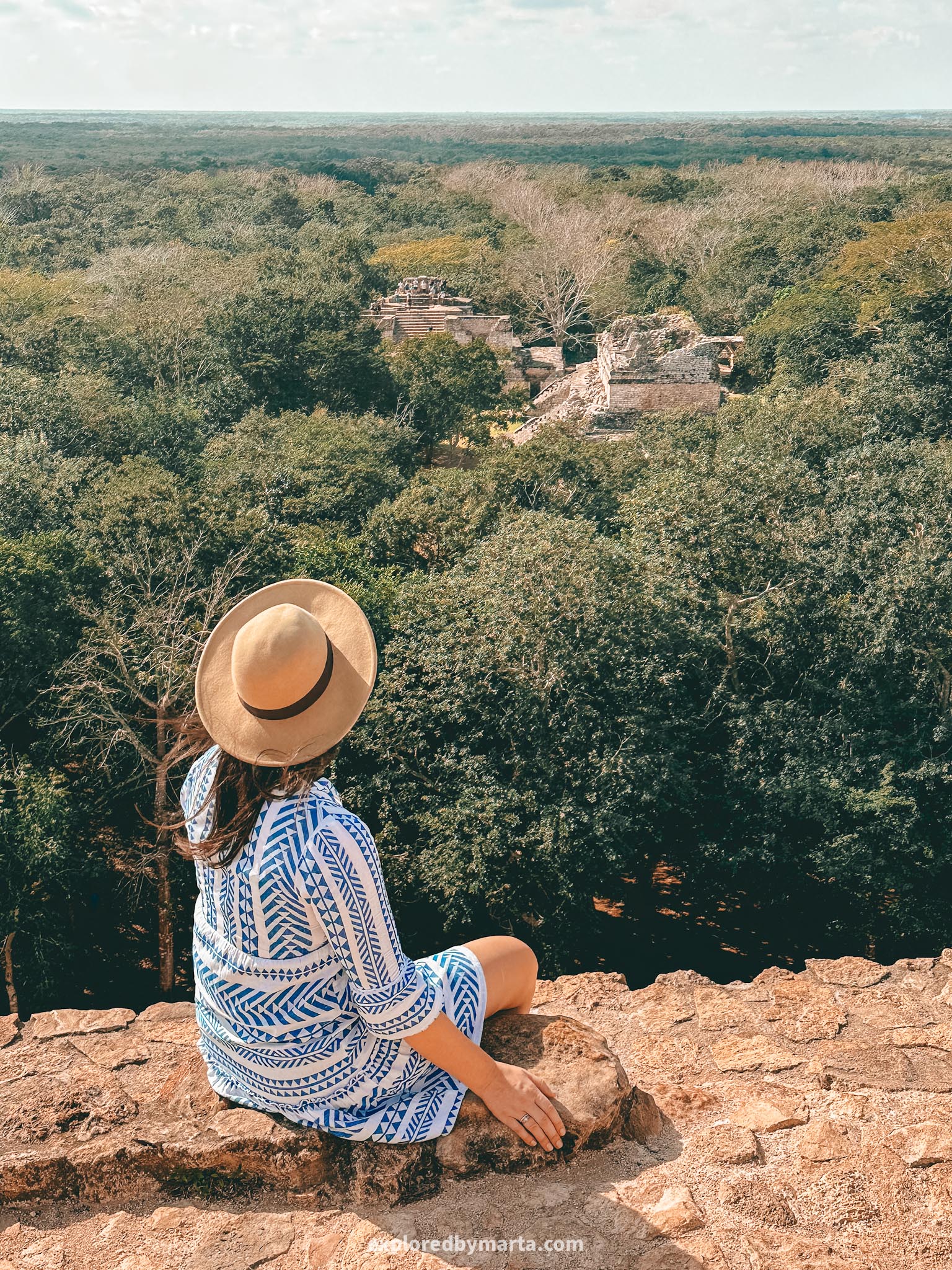
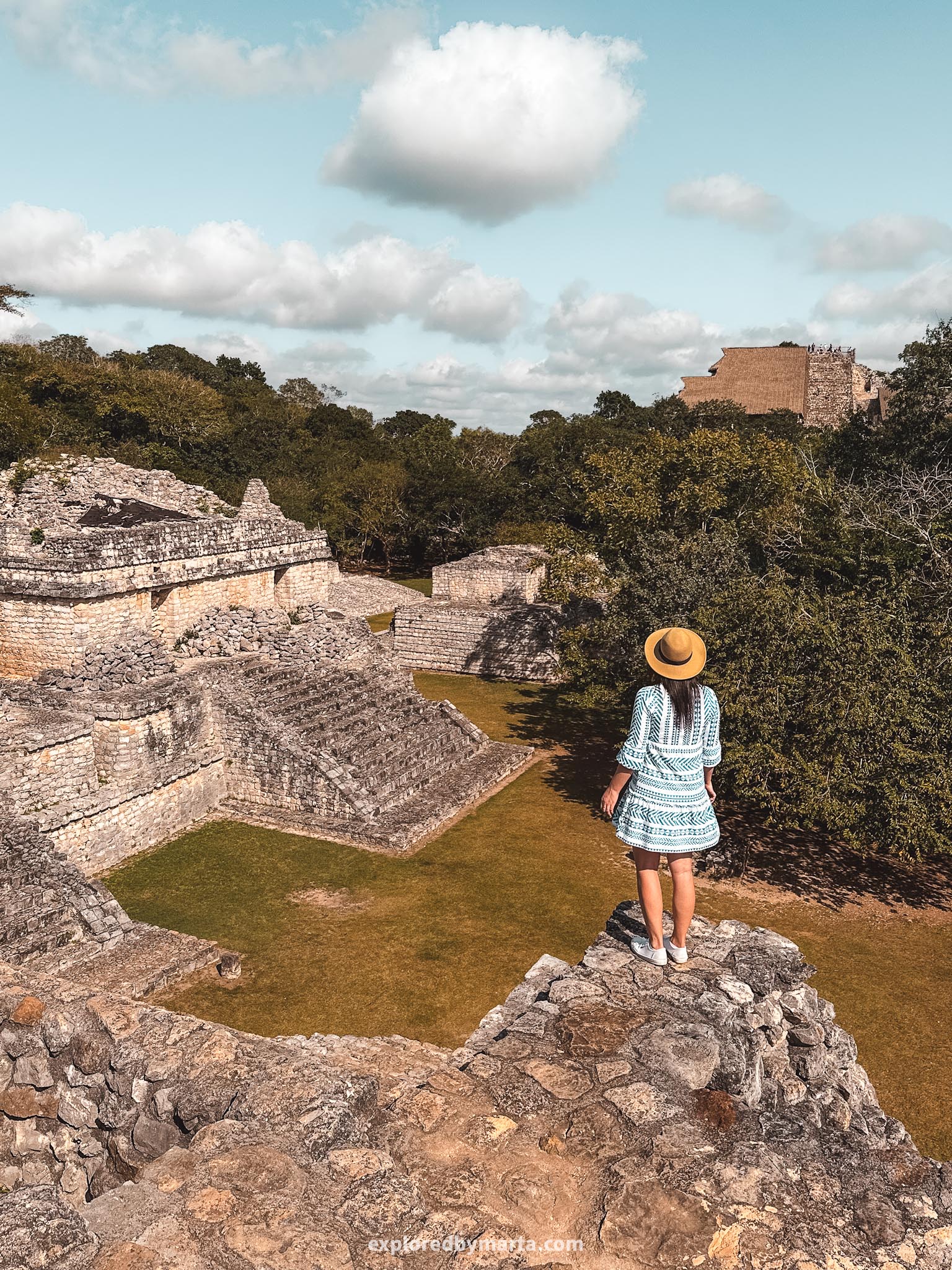
Overall I liked exploring Ek Balam. These weren’t my favorite Mayan ruins mostly because of the inflated entrance fee but I also don’t regret coming here. It is always cool to explore how the Mayan civilization lived before the Spanish found them.
Ek Balam is amongst the last larger Mayan archaeological sites where you are allowed to climb the pyramids. Another larger site where you can climb the pyramids is the Dzibanché archaeological zone located to the South of Bacalar.
Location: Archaeological Zone of Ek Balam
9. Isla Mujeres – the Sunrise of Mexico
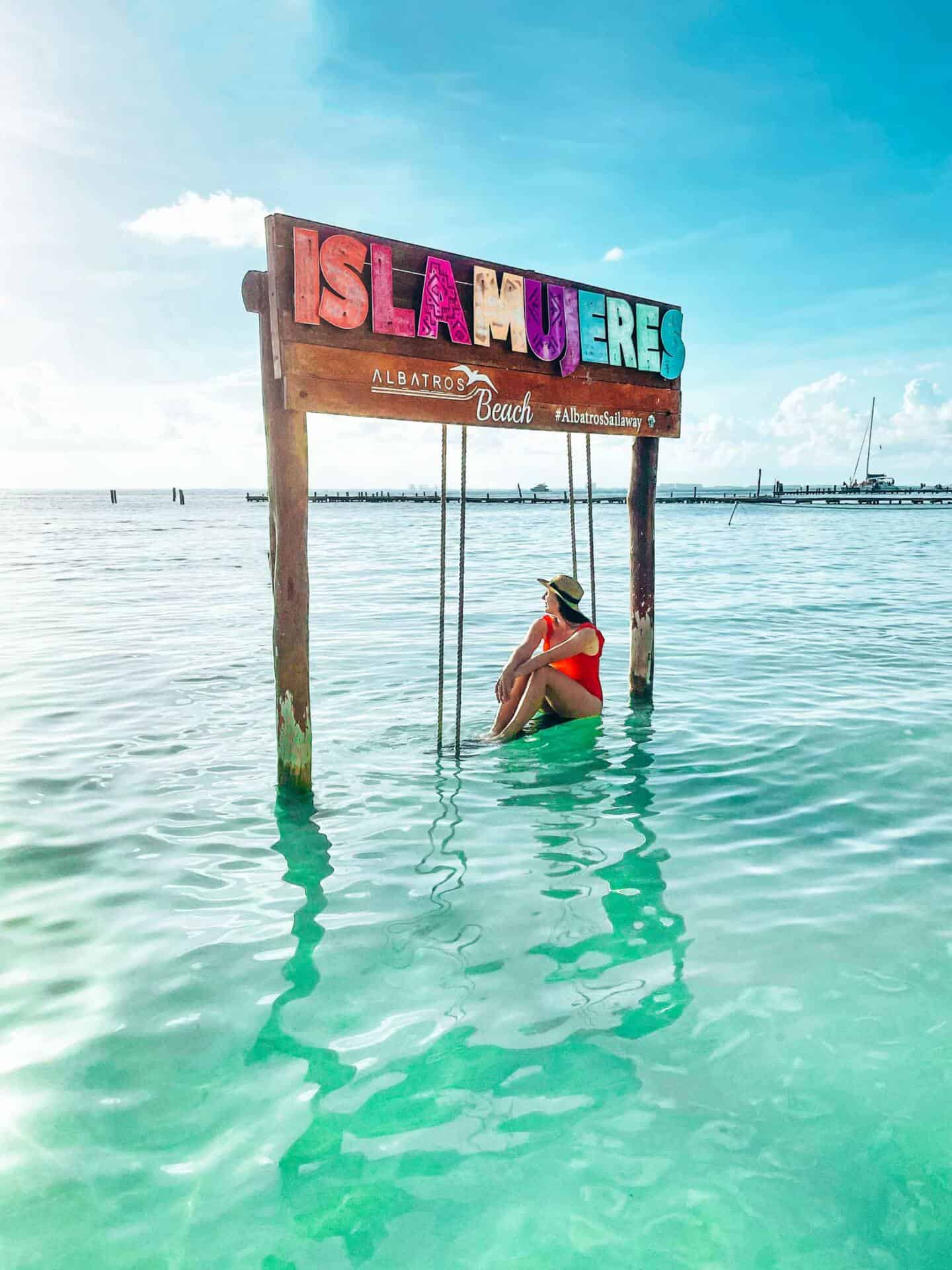
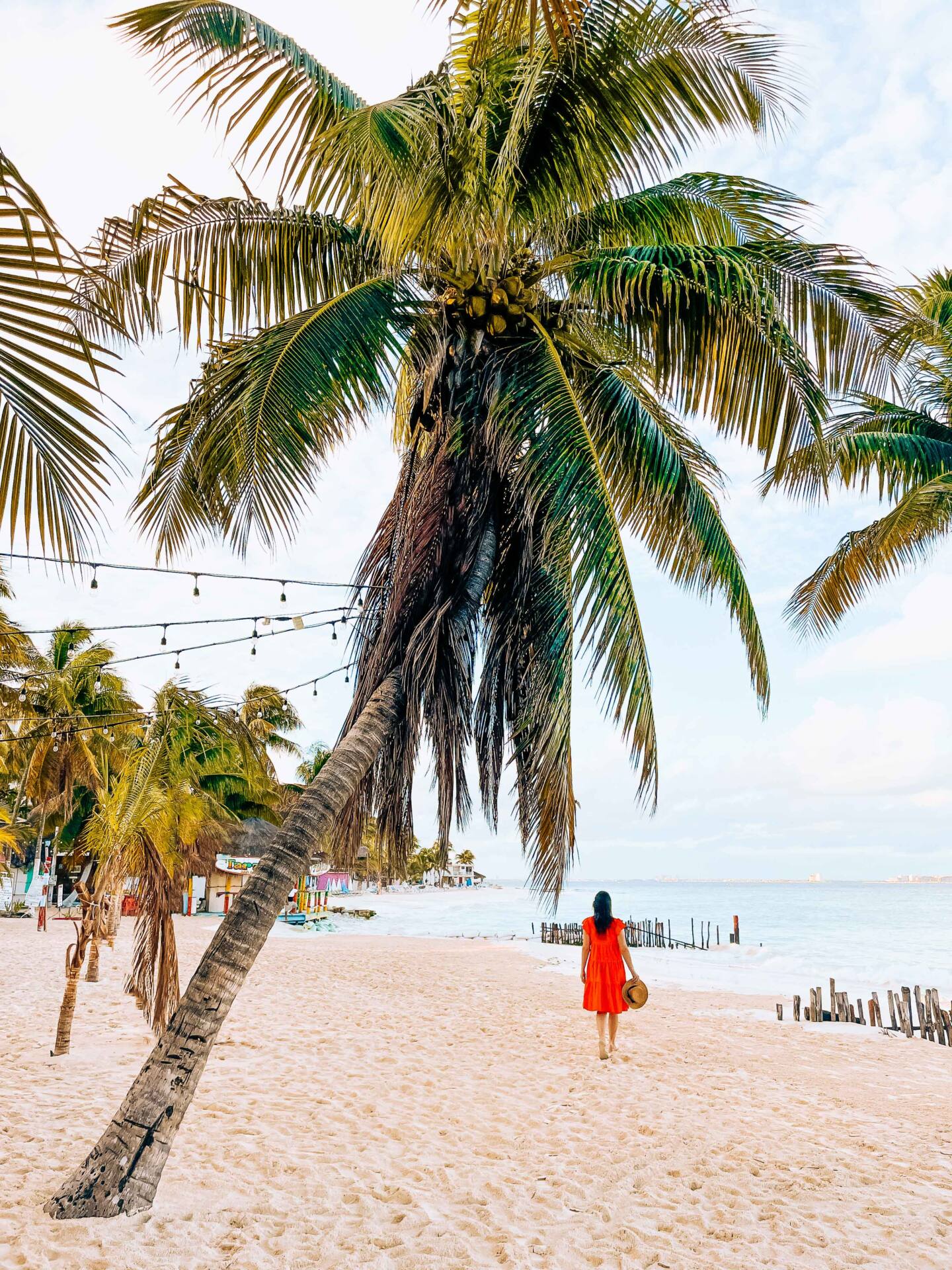
Isla Mujeres is a small island located off the coast of Cancun. It is known for its stunning turquoise waters and white sandy beaches including Playa Norte – one of the most beautiful beaches in Mexico!
It is one of the most popular day trips from Cancun for many travelers!
Isla Mujeres proudly boasts vibrant coral reefs and a unique underwater museum with sculptures so going on a snorkeling tour in Isla Mujeres is one of the most popular things to do. But many people come to simply enjoy its laid-back atmosphere.
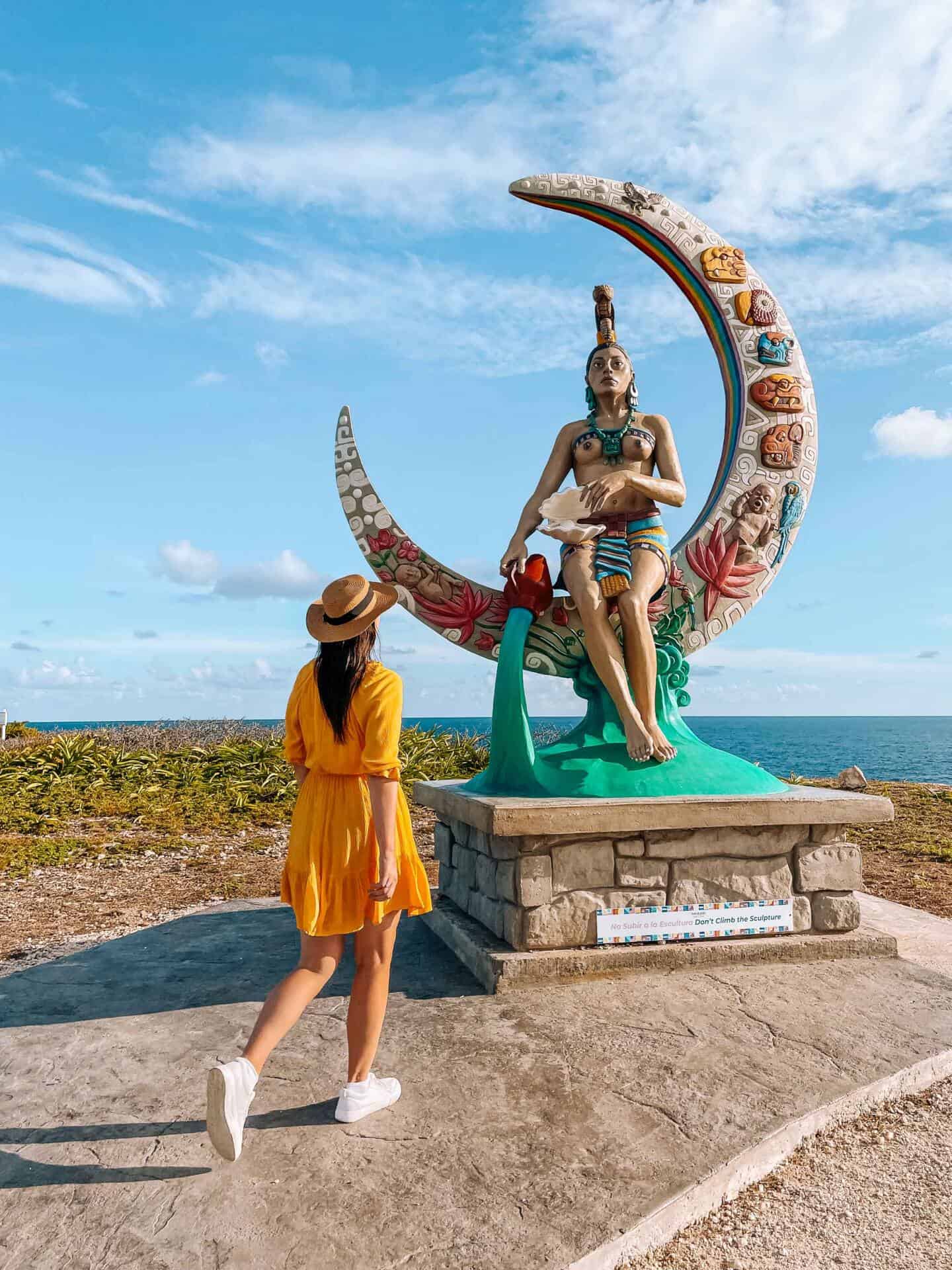
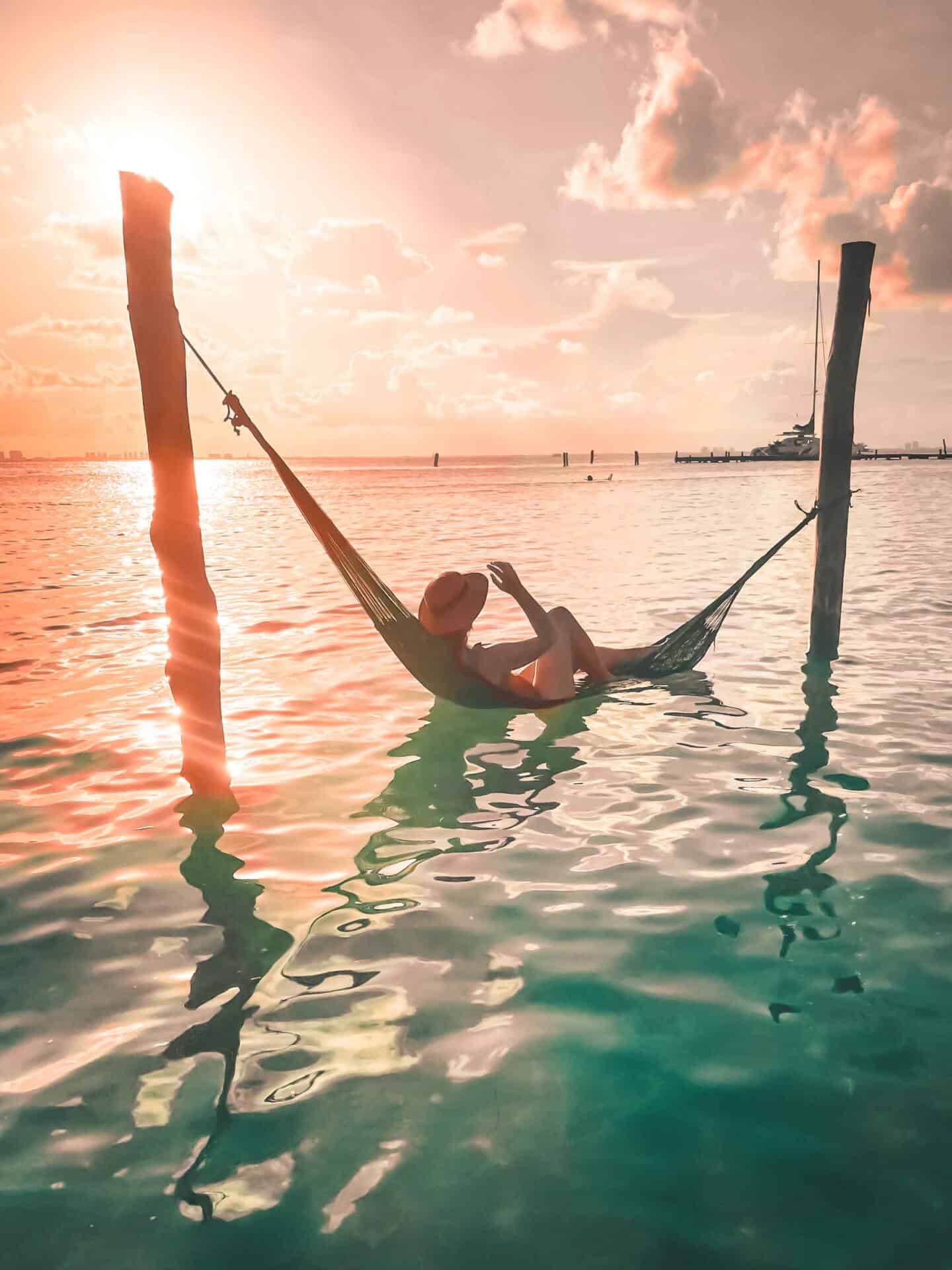
Besides snorkeling, other popular things to do in Isla Mujeres include spending the day at some of those gorgeous beaches, especially Playa Norte, exploring the local food scene, and going on a road trip around the island.
There is a special place at the South end of Isla Mujeres called Punta Sur Sculpture Park where you can wander around ancient Mayan ruins, explore coastal cliffs, and check out sculptures including that of the Mayan Goddess Ixchel.
We actually spent a couple of days in Isla Mujeres and really enjoyed it. If you can, I recommend walking up early for the sunrise. Isla Mujeres is often regarded as the ‘Sunrise of Mexico’ as it is the Easternmost point of the whole country.
Location: Isla Mujeres
10. Pink lakes of Las Coloradas
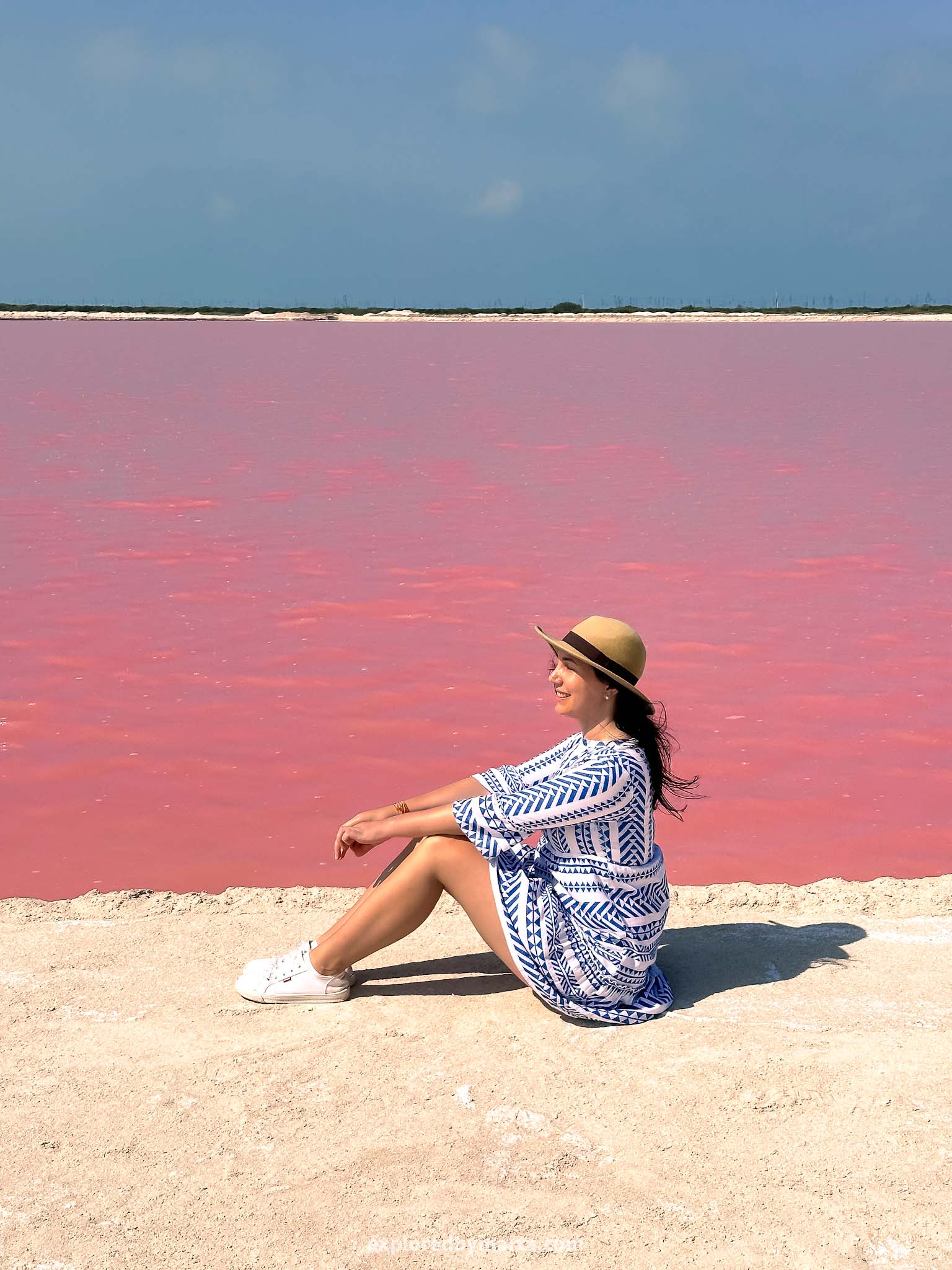
The bright pink salt lakes Las Coloradas is one of the best places to visit in the Yucatán Peninsula! The attractive lakes offer unique photo opportunities as it is not too often that you get to see naturally pink lakes!
When we visited, we somehow managed to arrive here on the perfect day with the best weather conditions (we visited on February 4th). It was sunny, no clouds, and the lake was screaming pink color at us!
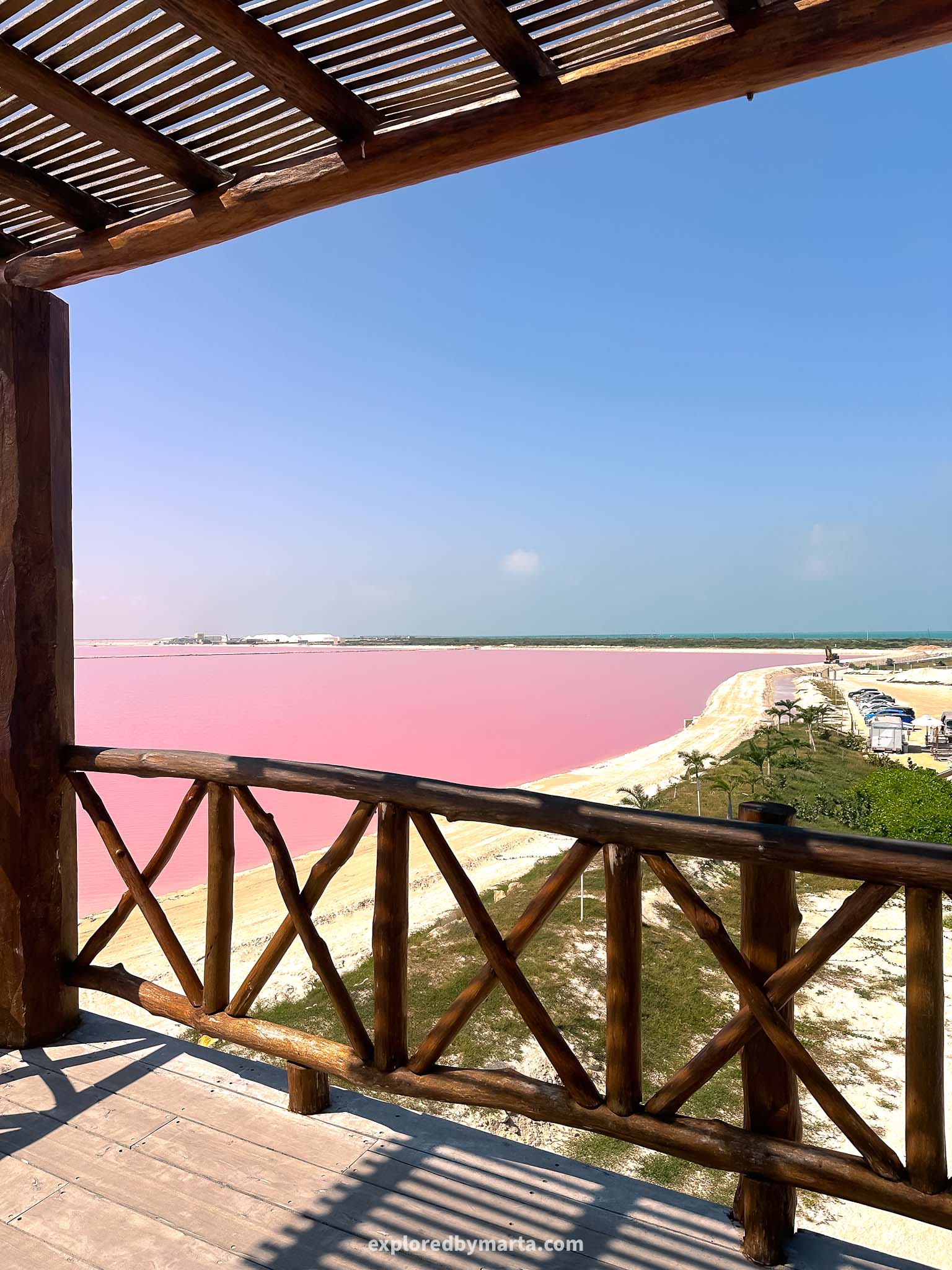
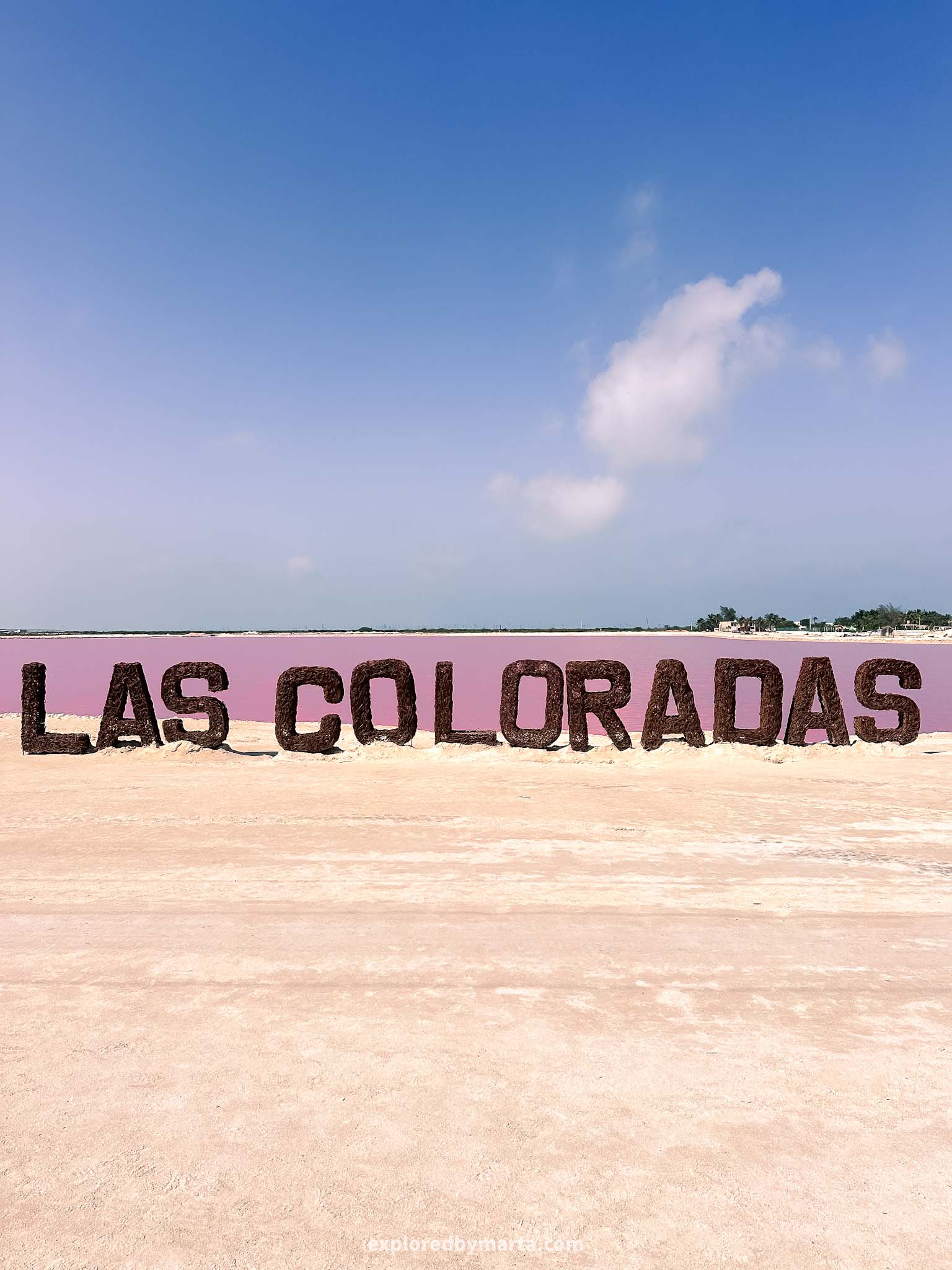
The lakes won’t be pink if there was a storm or a lot of rain over the previous days, you will see a bright pink color only on sunny days (no clouds) and the best angle of the sun will be around midday. And a little bit of wind will make the color pop!
So how to get there? The right place to go is marked on Google Maps as Las Coloradas Parque Turistico. There you will find the ticket office, the observation tower, and the entrance to the pink salt lagoons.
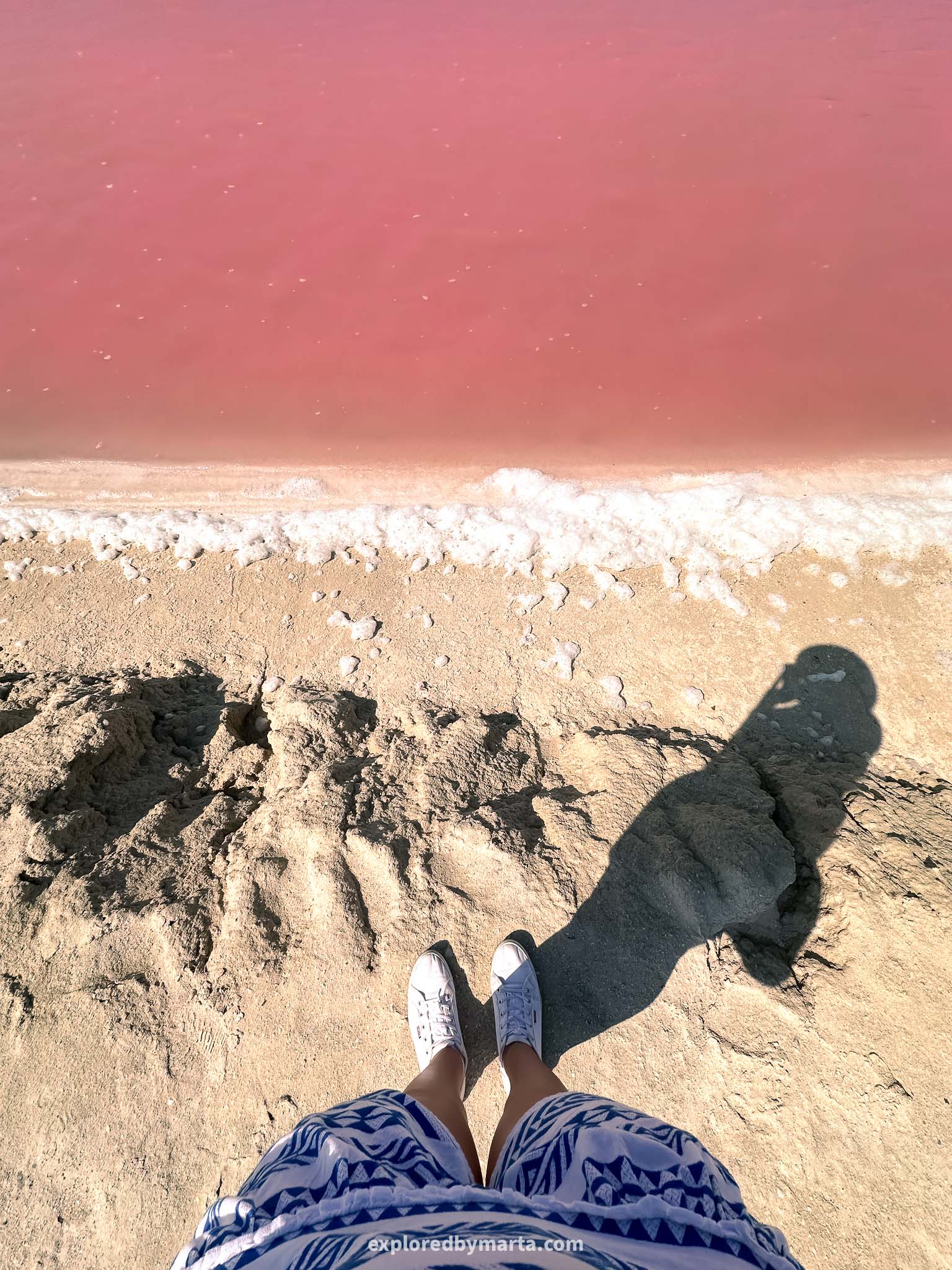
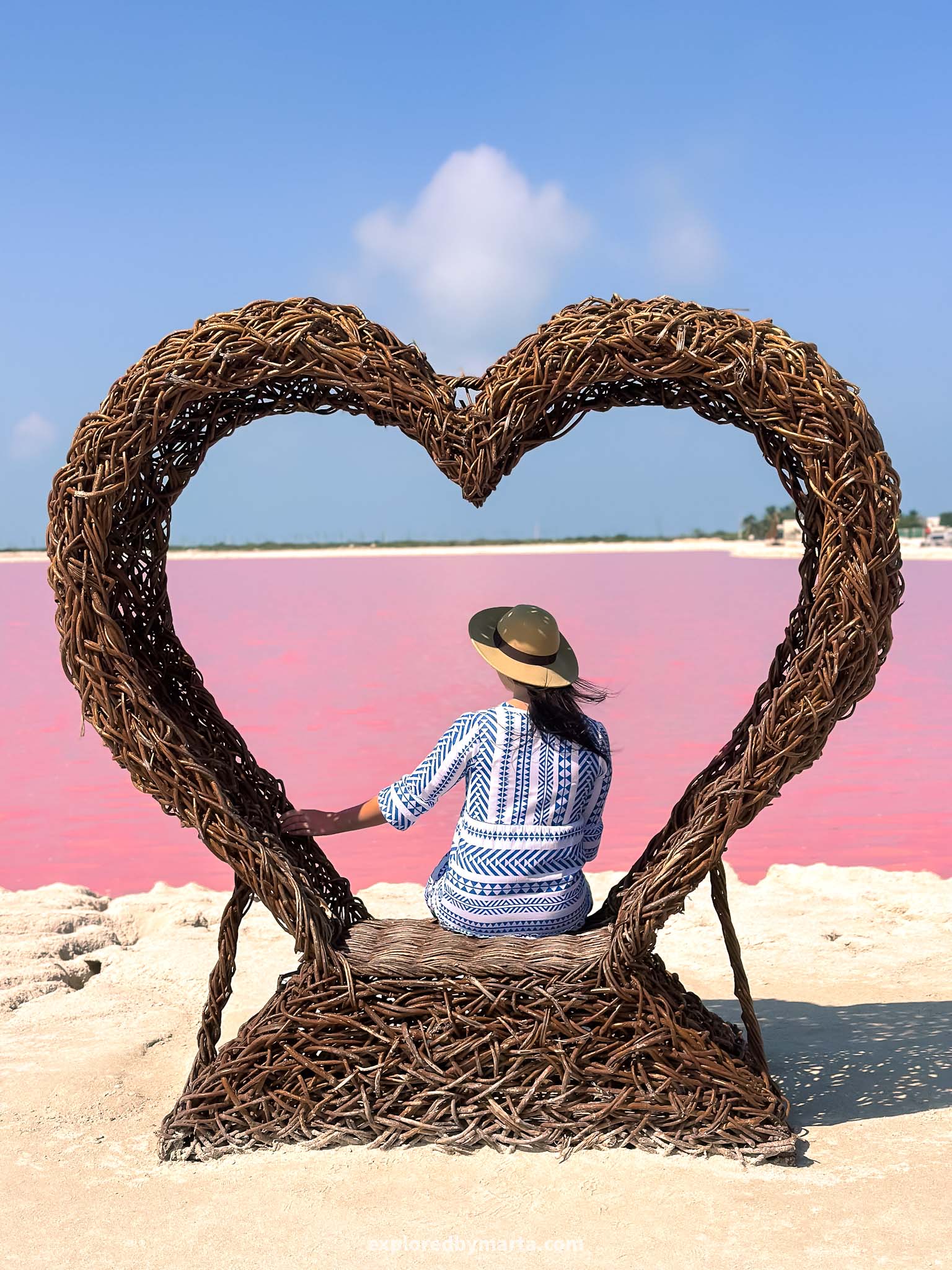
You can choose between a 45-minute walking tour, a bike tour, and a jeep tour. We chose the cheapest option (~350 pesos per person) and went on a walking tour. At first, we climbed the observation tower and then walked along the pink lake.
Take into account that they usually harvest salt here around late July to August, and the pink color is less visible. The guide also told us that after one hurricane, the lake lost its pink color for a whole year, so better make sure it’s worth coming!
You should also know that the lake is not natural. It is a pink pond owned by a large company that produces salt and you can’t see much of it unless you pay for the guided visit. Yes, it is very commercialized but I certainly wasn’t disappointed.
Location: Las Coloradas
11. Cenote Saamal
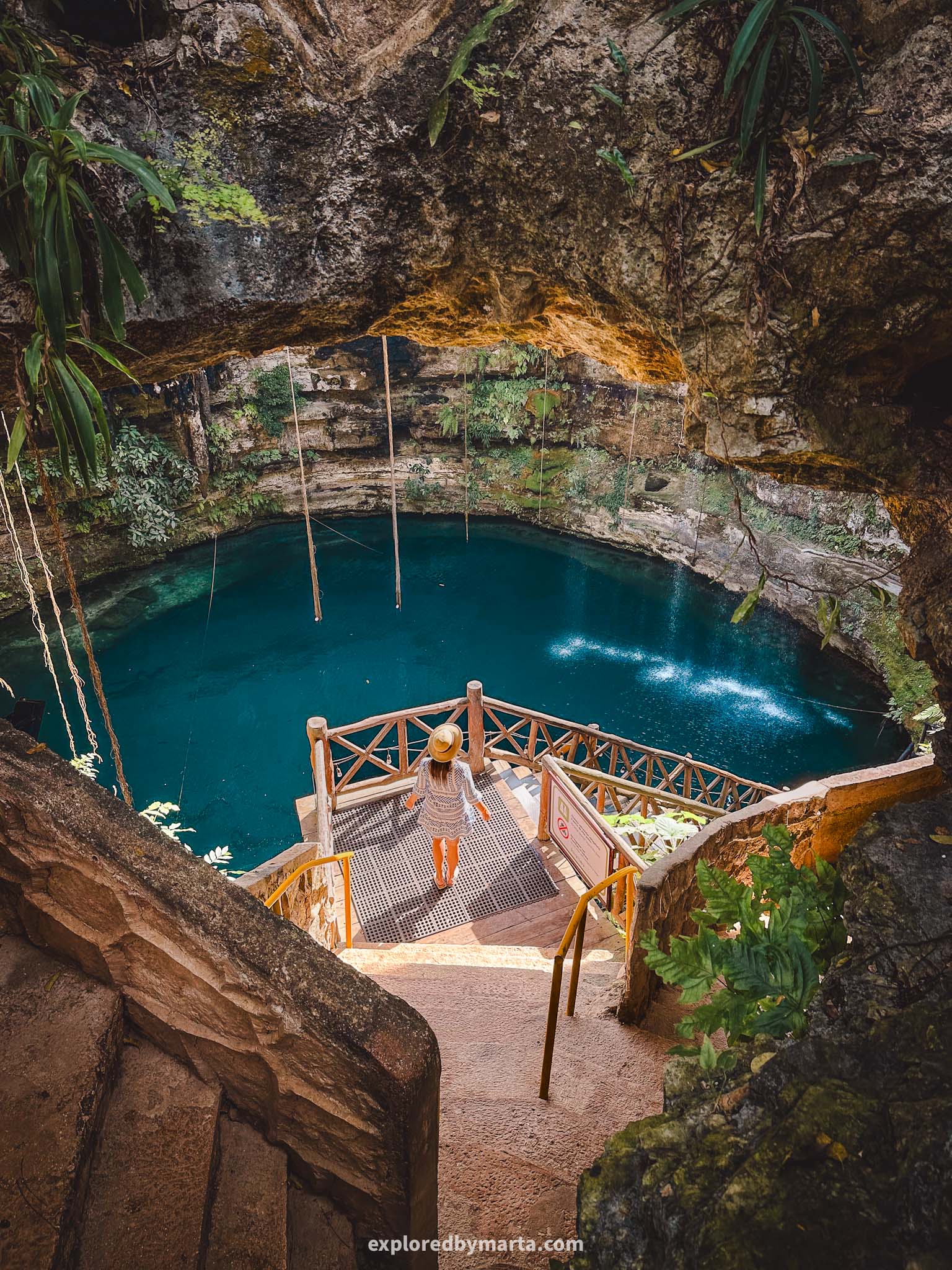
Cenote Samaal is one of those gorgeous semi-open cylindrical cenotes with crystal clear cool water and even a waterfall coming down from the top of the walls. Perfect place for a refreshing dip into the water!
Cenote Samaal is located within the grounds of Hacienda Selva Maya – a building complex of a rural estate that includes souvenir stores, a buffet-type restaurant, tequila tasting, and even a zip line. We paid 200 pesos per person for the entrance.
This cenote is located only 5 kilometers from Valladolid, so it is very easy to get to even if you don’t have a car – you can easily get there by taxi or bicycle. It is without a doubt one of my favorite cenotes we visited near Valladolid!
Location: Cenote Saamal
12. Coba Archaeological Zone
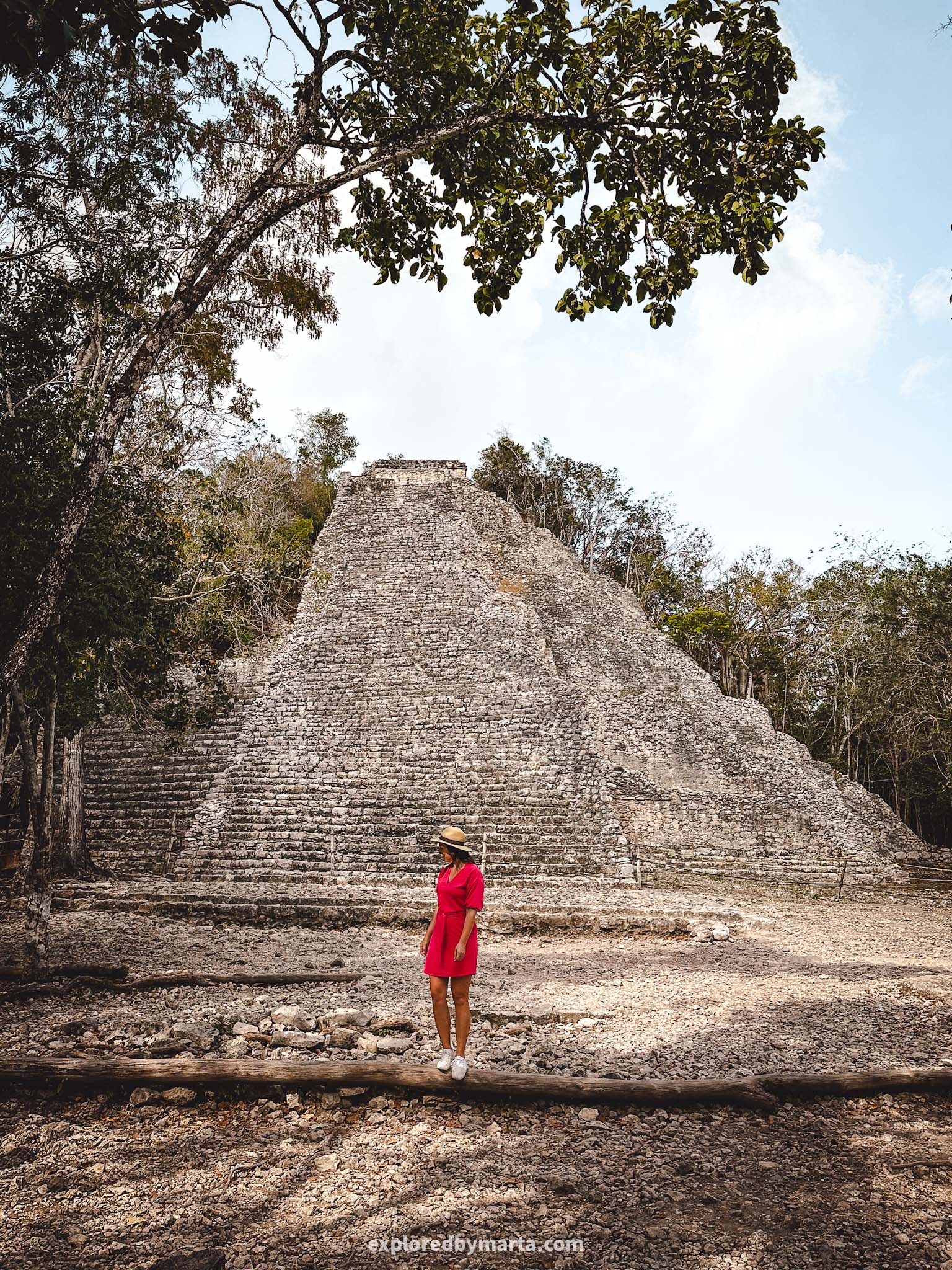
Coba Archaeological Zone near Tulum is one of the largest Mayan sites in the Yucatan peninsula. The ancient jungle city is located just a 45-minute drive from Tulum, making it one of the most popular day trips from Tulum.
Coba ruins were once one of the most important ancient Mayan cities in the area. The archaeological site boasts multiple stone pyramids, temples, and other important structures.
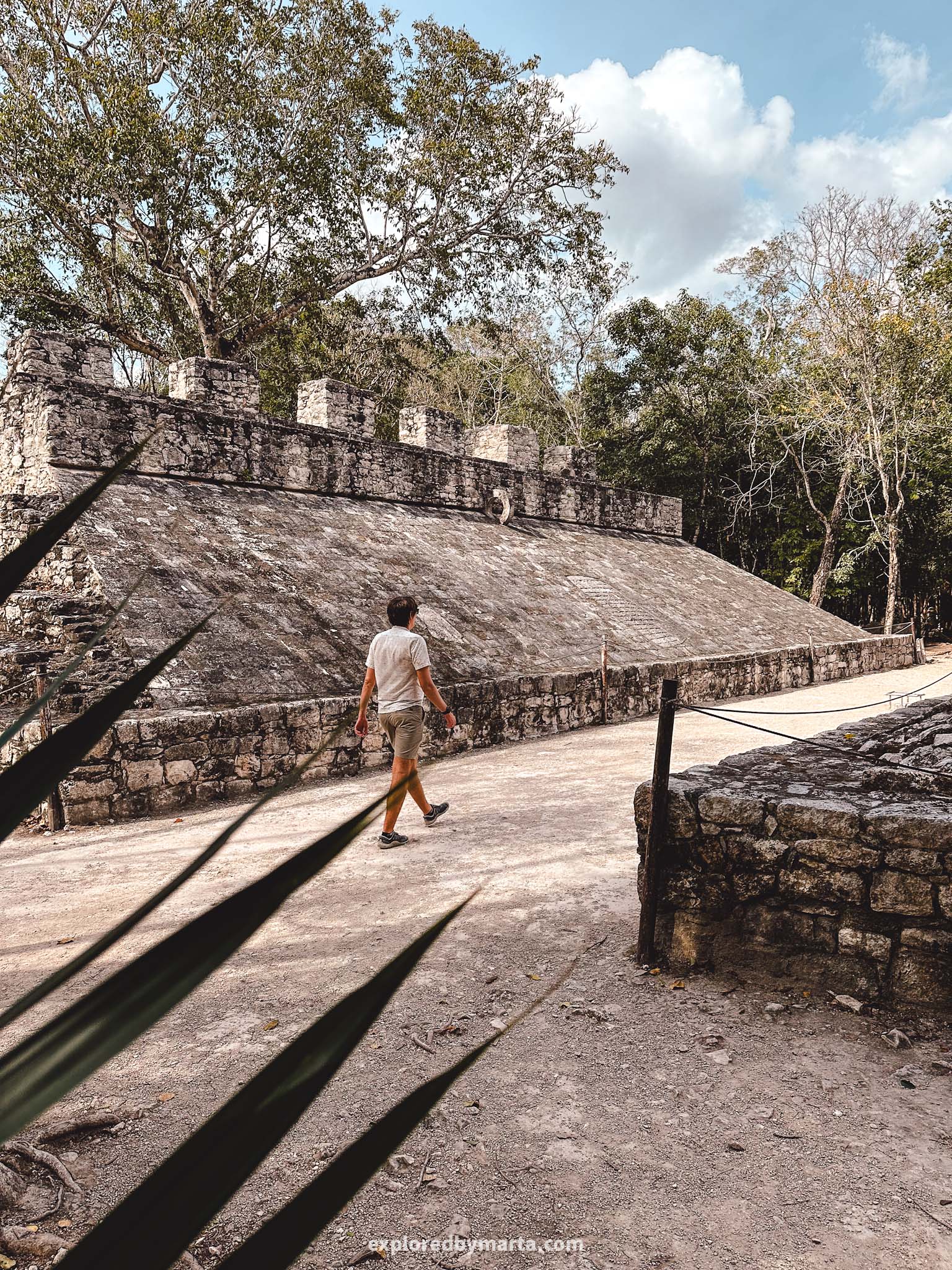
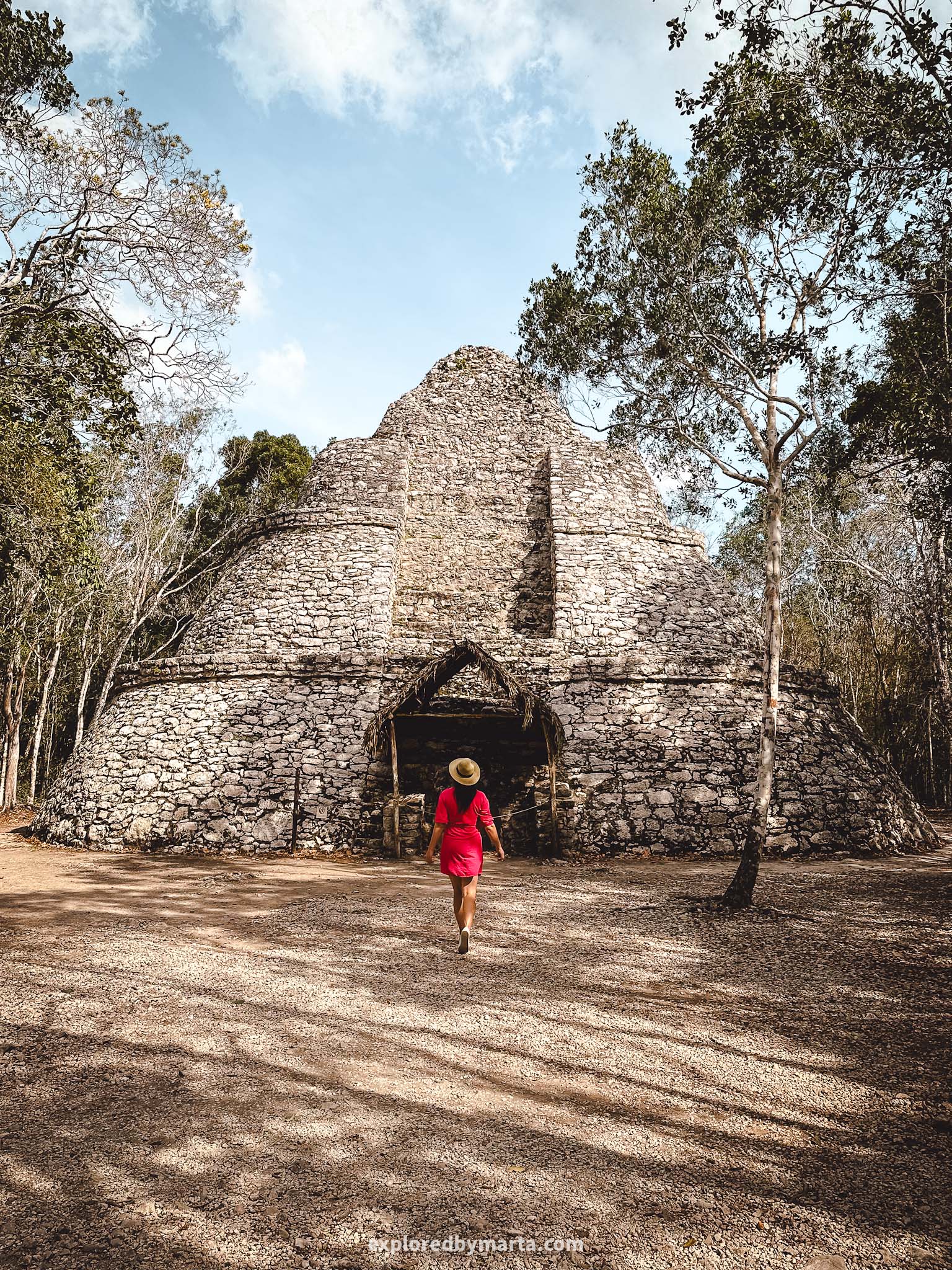
Entrance to the site is paid in different parts – parking and two different entrance fees, so don’t forget to bring some cash with you. All the buildings are pretty much scattered around the jungle so you can rent a bike there (we walked, it was ~5 kilometers).
One of the most impressive buildings is the temple pyramid Nohoch Mul. At 42 meters (137 feet) it is one of the highest Mayan structures in the Yucatán Peninsula. Only Calakmul in the State of Campeche is higher than the Coba pyramid.
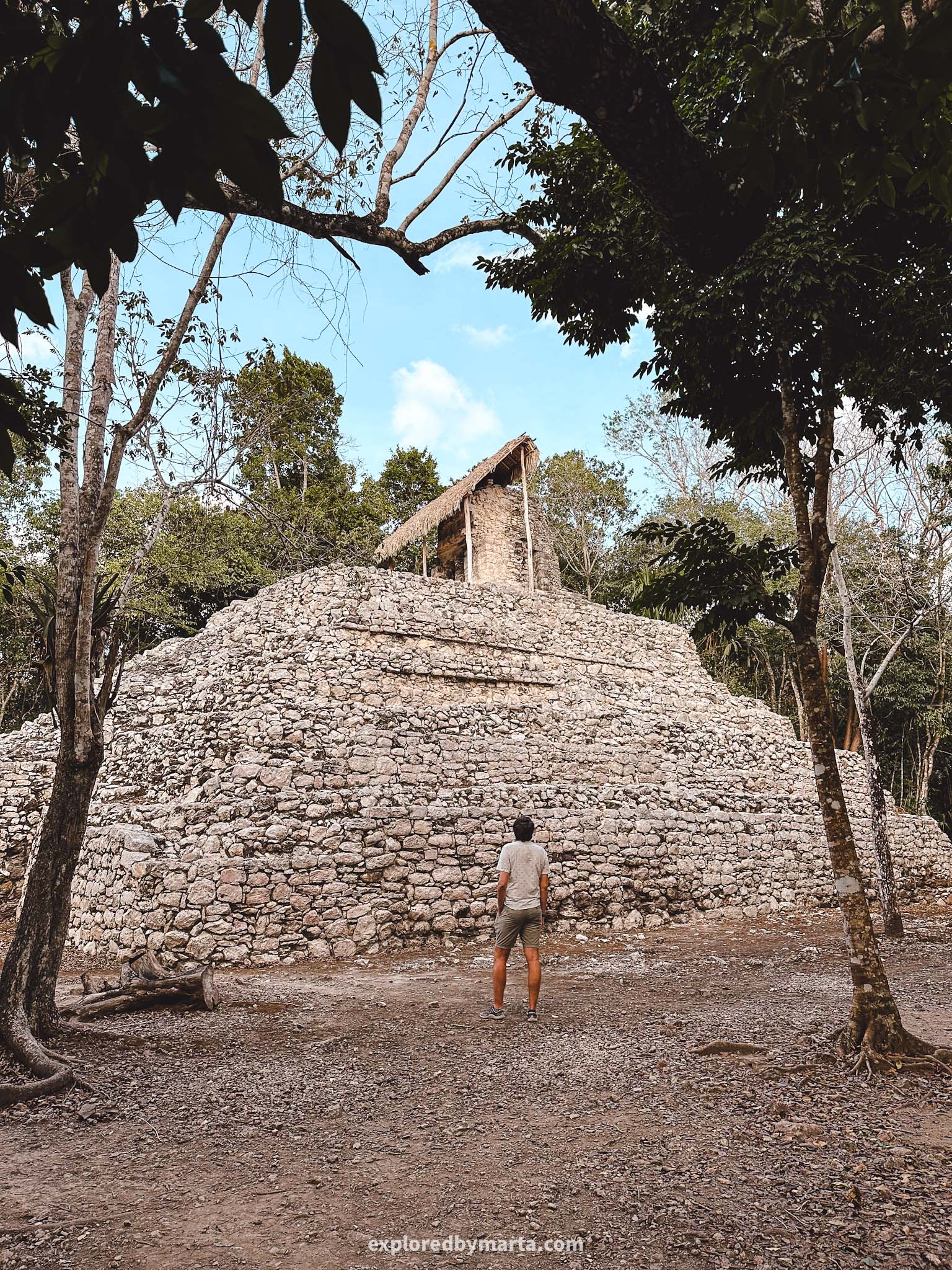
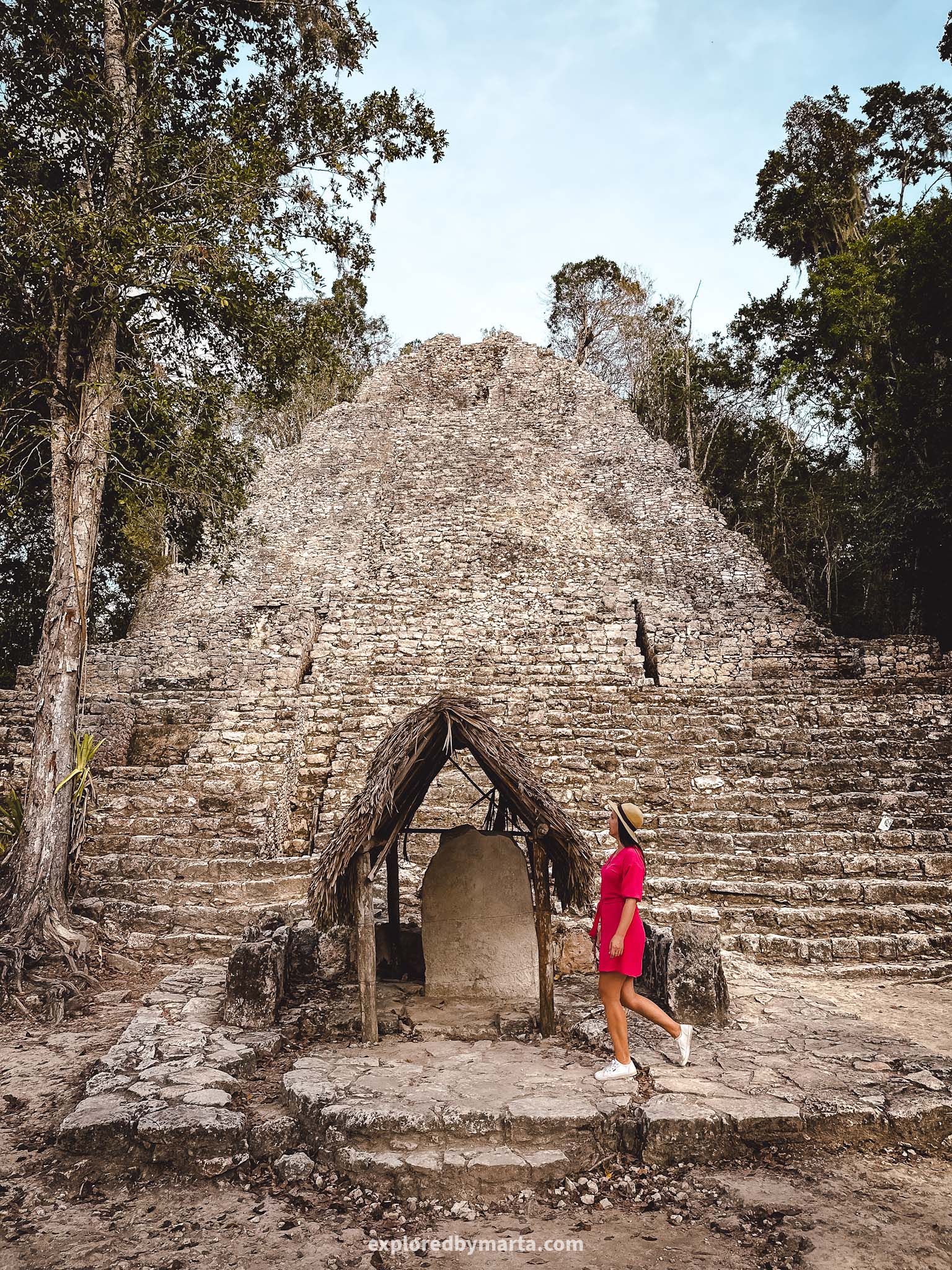
Most of the structures in Coba date back to the 7th-10th centuries. Coba, once was a large center of the Mayan civilization, reaching 50 thousand inhabitants, but was already abandoned by the 16th century during the Spanish conquest.
A couple of years ago it was possible to climb the pyramid in Coba, but not anymore. I wasn’t sad about it tho – it was fun walking the narrow paths through the jungle and finding Mayan ruins along the way!
Location: Coba Archaeological Zone – Parking lot
13. Playa del Carmen

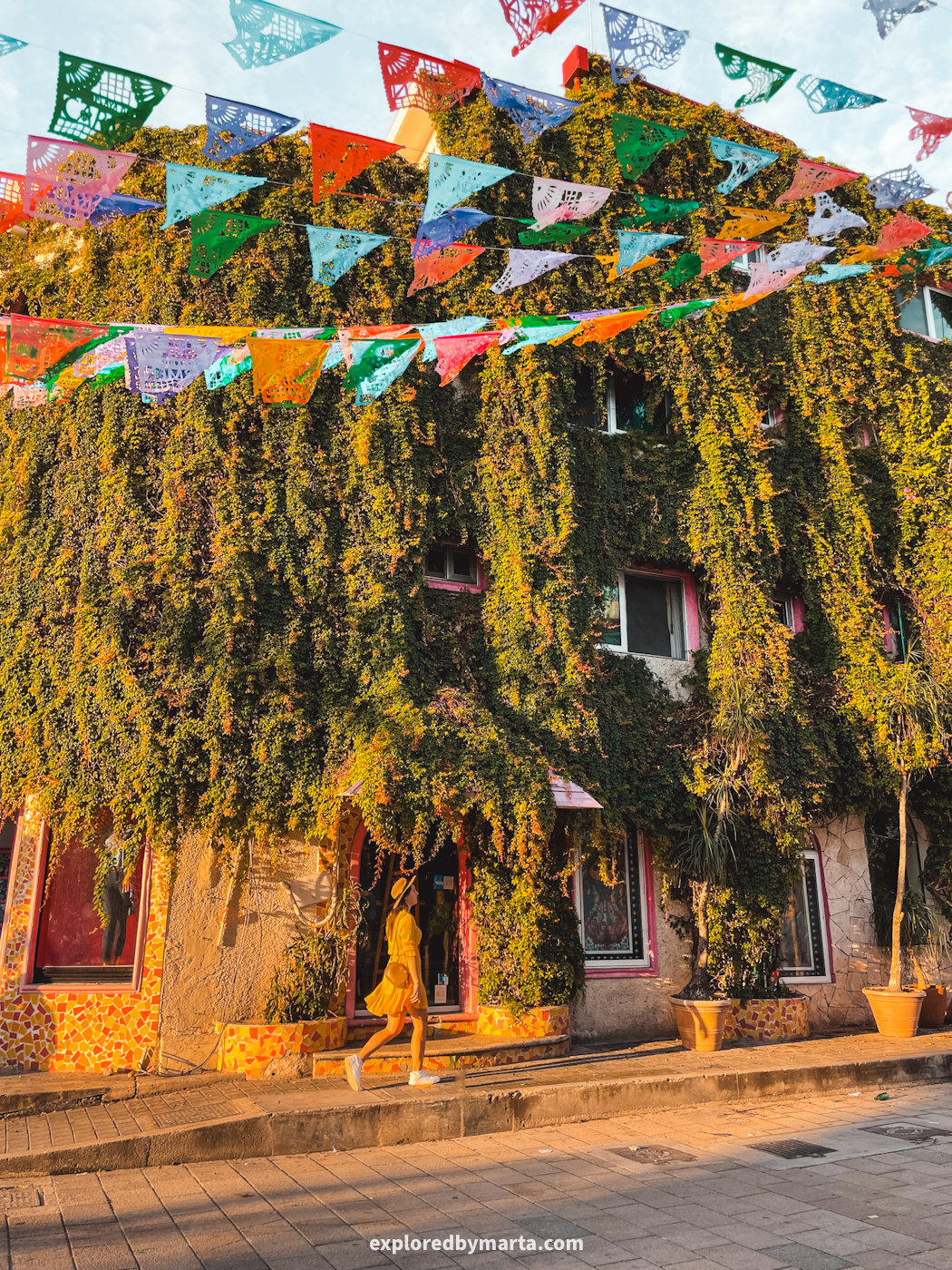
Playa del Carmen is a vibrant coastal city on the Yucatan Peninsula known for its stunning beaches, rich food scene, and lively atmosphere. Situated right between Cancun and Tulum, it attracts all kinds of travelers to its bustling scenes.
Playa del Carmen is home to one of the most famous streets in the Yucatan Peninsula – the Quinta Avenida, or Fifth Avenue. The famous street is lined with an array of shops, restaurants, and bars. During the night it is a busy spectacle like no other!
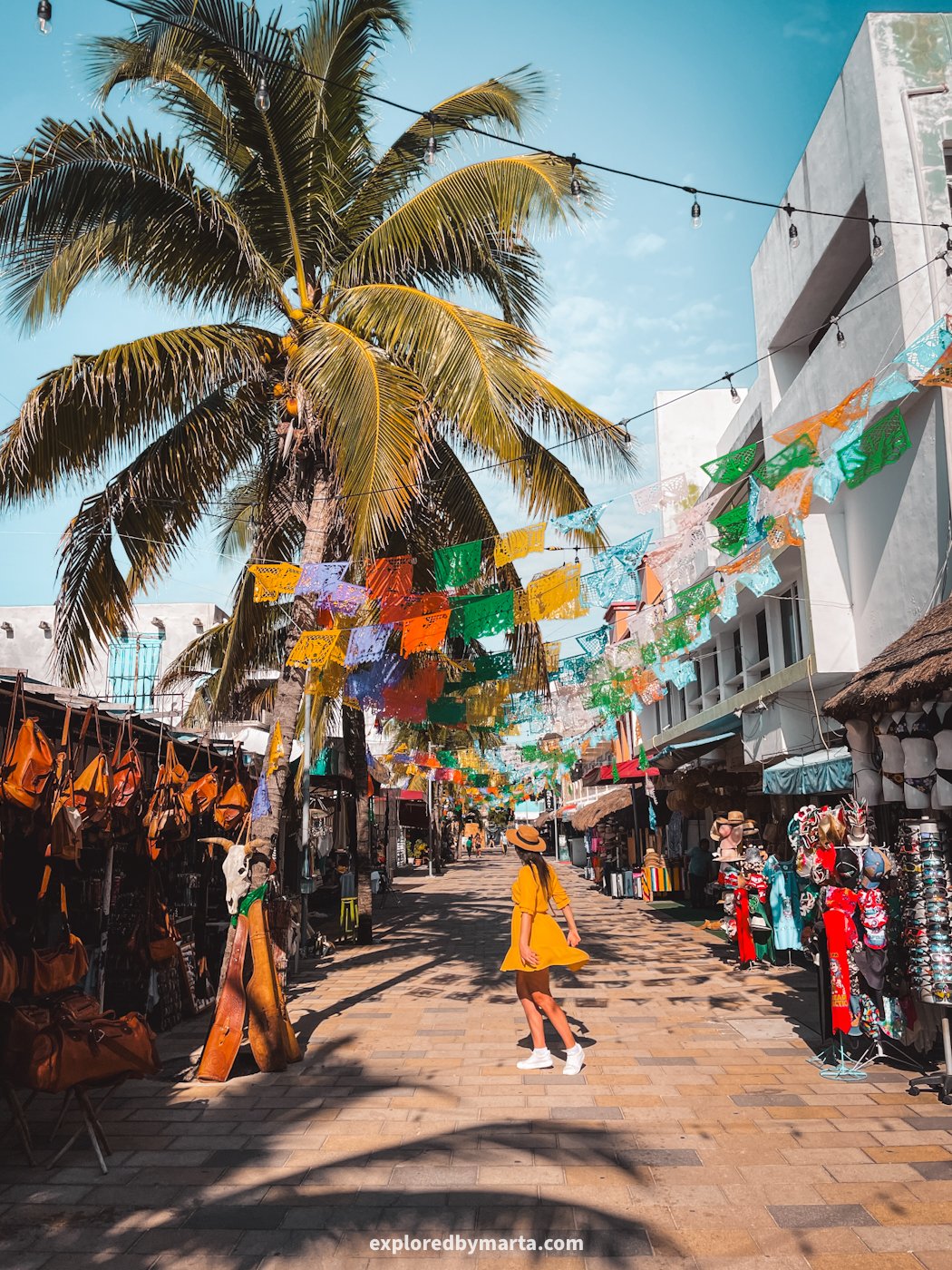

One of the most beautiful places and popular spots to visit in Playa del Carmen is the seaside Parque Los Fundadores – a square right in front of the Caribbean Sea which is a busy meeting place amongst locals and tourists.
The seaside park boasts a massive (50 ft. or 16m high!) arched sculpture – Portal Maya. It is one of the best places to watch the sunrise in Playa del Carmen, so you will find many people here in the early hours waiting for the sun to come up.


The park also features the photo-perfect Playa del Carmen letters. We came here at sunrise and got the sunrays beaming through the holes in the letters and palm trees hanging above! It was a beautiful morning and the first sunrise we ever watched in Mexico!
One of my favorite things to do in Playa del Carmen was hunting down the best tacos, street food, and coffee shops – something that Playa del Carmen has an abundance of! The vibrant town is known for its rich food scene!

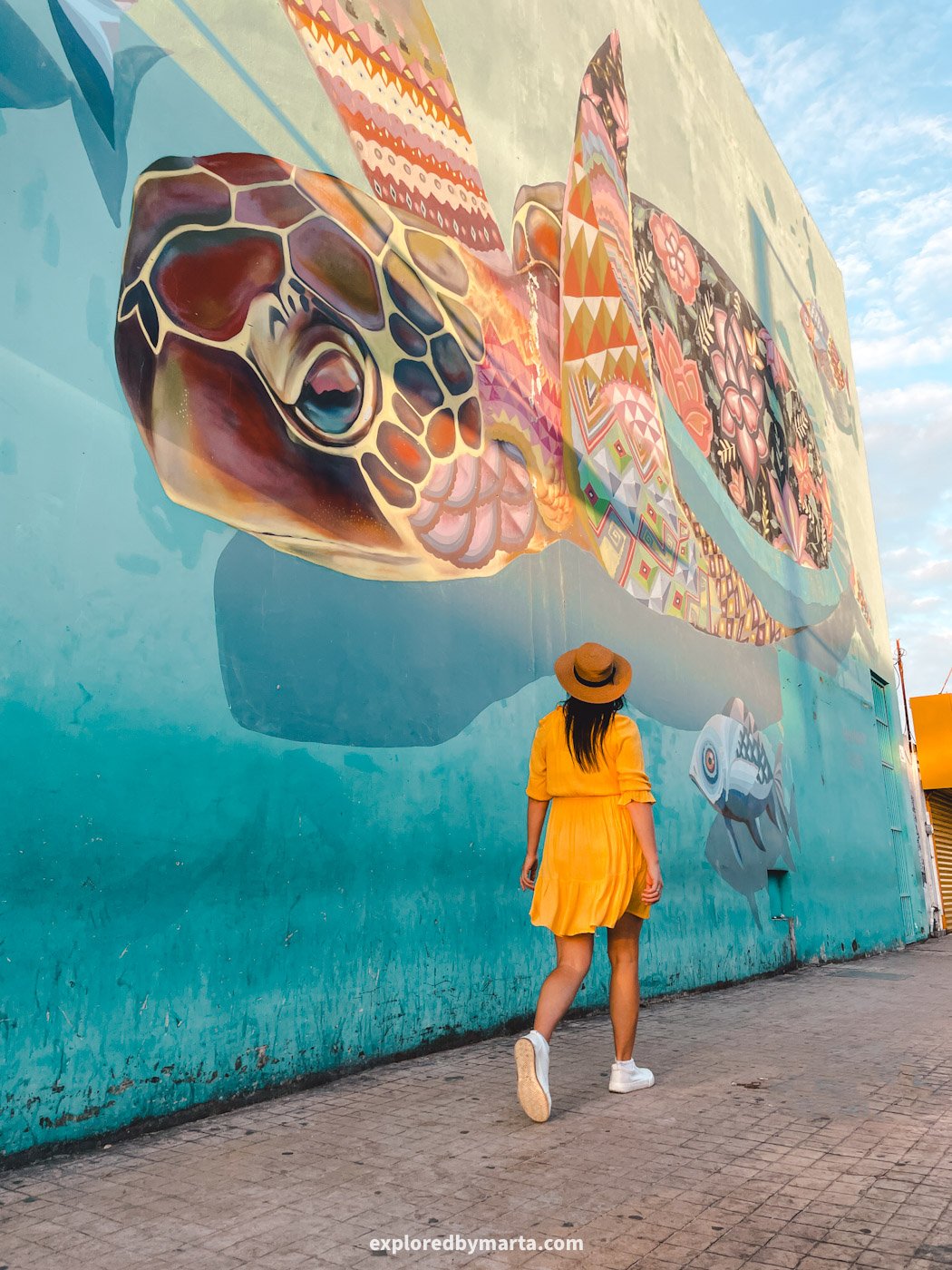
Other places of interest in Playa del Carmen include the unique 3D Museum of Wonders, Alux – the underground restaurant in a cave, Capilla de Nuestra Señora del Carmen, and the colorful street art murals scattered around the downtown.
Playa del Carmen is one of the best places to base yourself in the Yucatan Peninsula – it is a good mix of Cancun and Tulum! If you stay here, don’t forget to go on a coral reef snorkeling tour and day trips to places like Cozumel, Coba, and underground cenotes!
Location: Playa del Carmen
14. Izamal – Mexico’s Yellow City
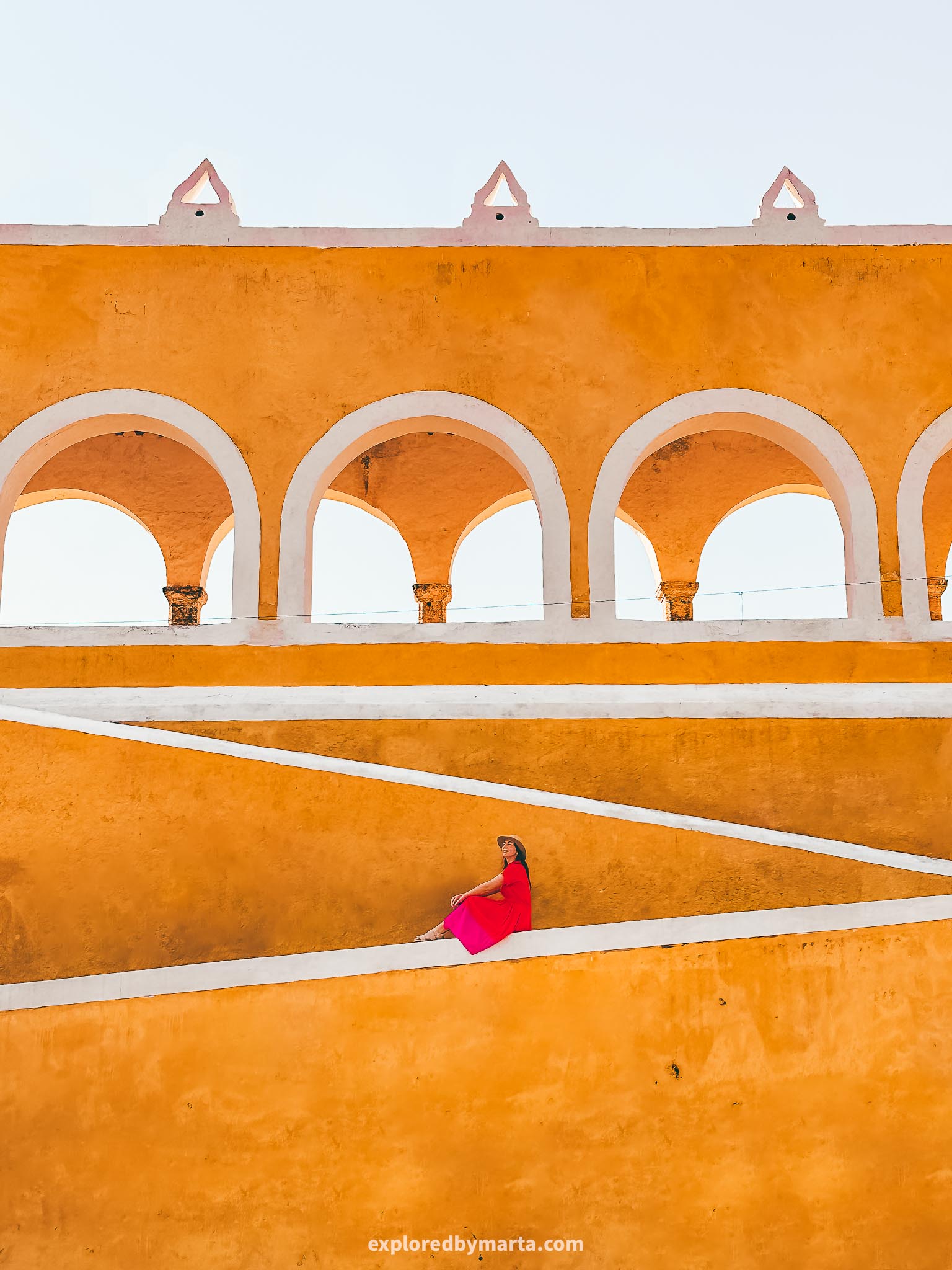
There is no other place like Mexico’s Yellow City – Izamal! Visiting this Pueblo Mágico was one of my favorite memories from our trip and it is also amongst the best places to visit in the Yucatan peninsula, Mexico!
The colonial town attracts visitors with its yellow color as all the buildings in the center of this magical town are painted yellow. We arrived at Izamal in the morning and spent there half a day exploring everything Izamal had to offer.
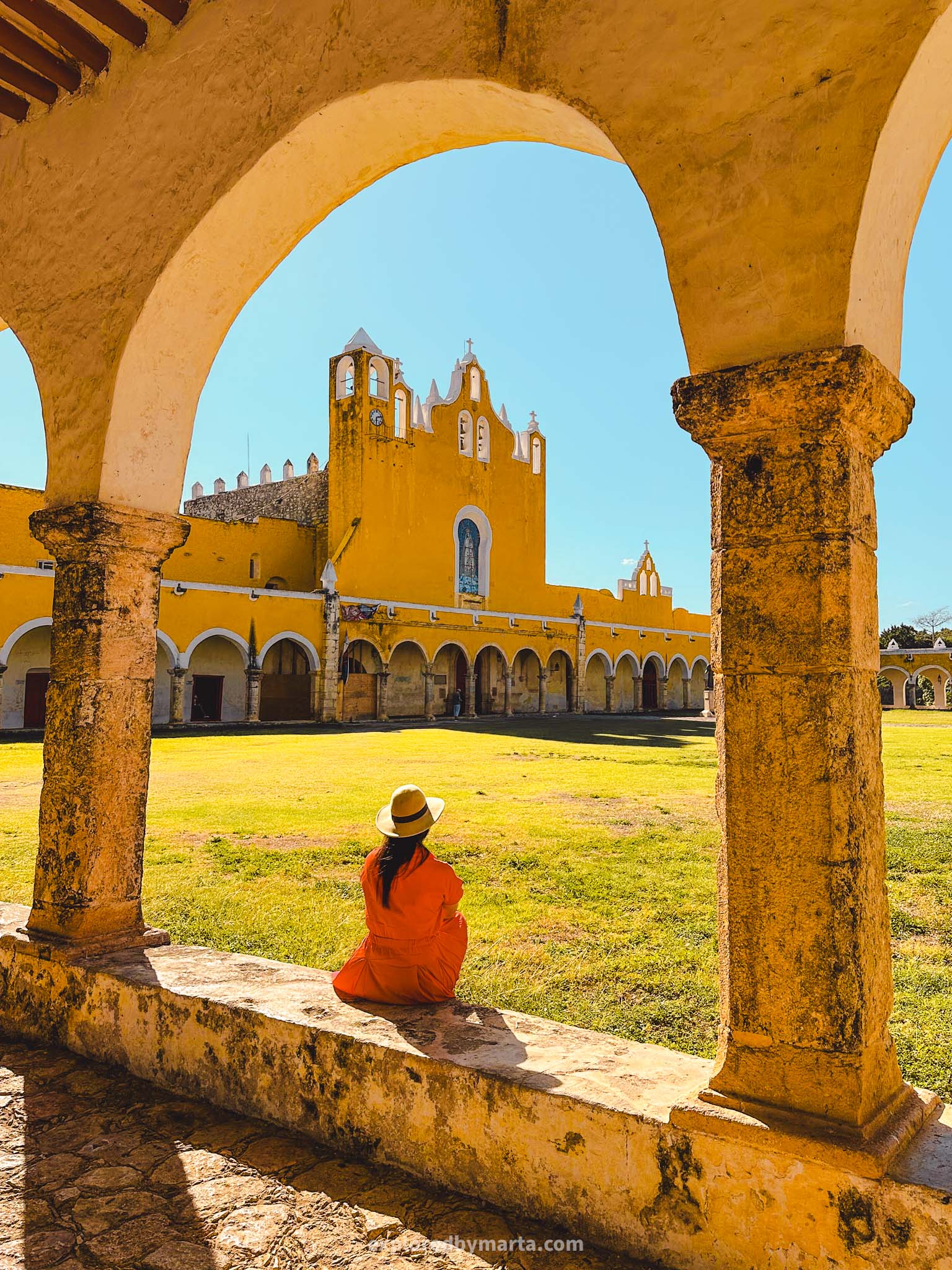
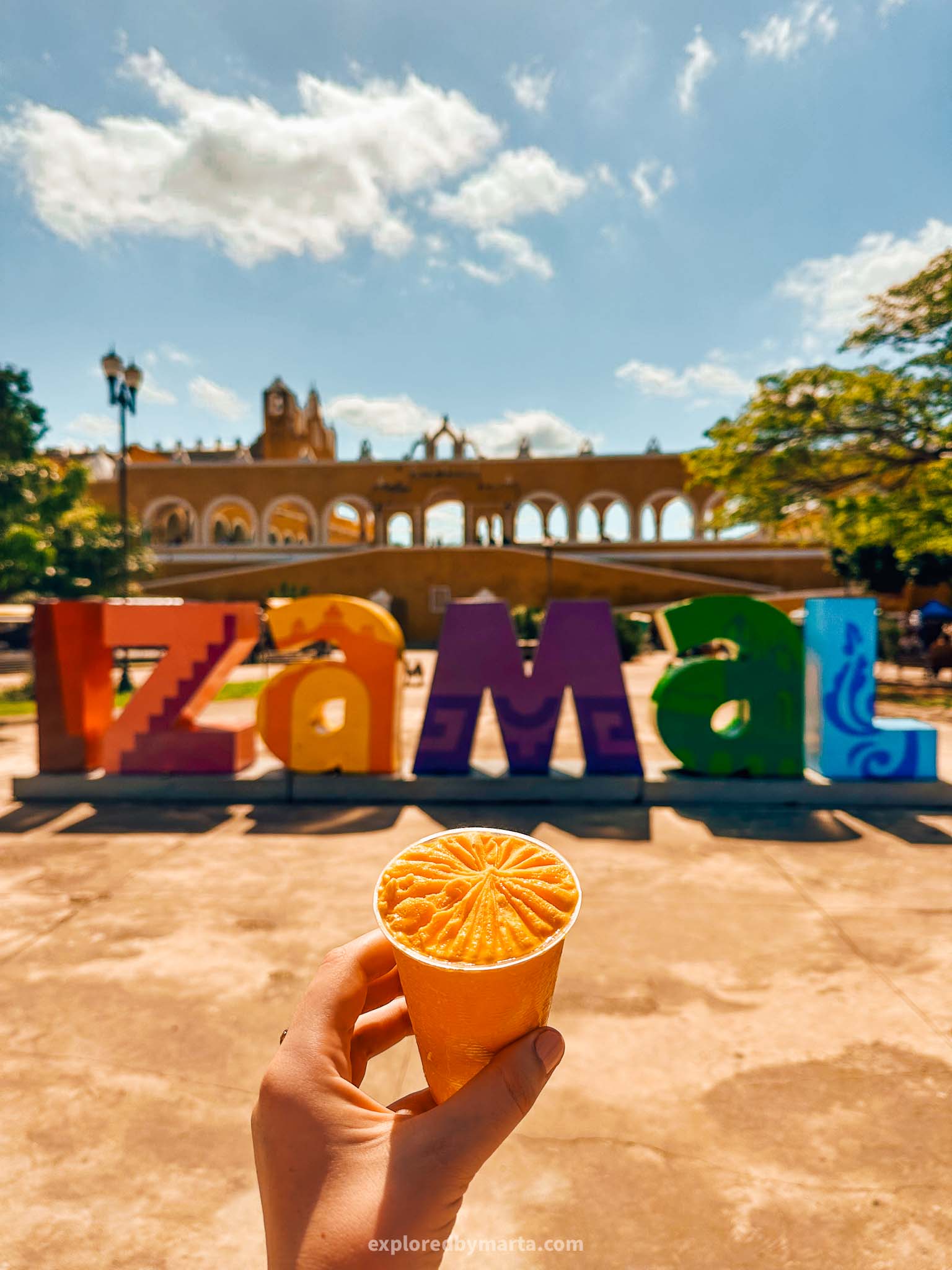
The most famous attraction in Izamal is the Convento de San Antonio sitting atop a hill (there once was an ancient Maya pyramid) in the heart of the town. Next to it, you will find the second-largest atrium in the world surrounded by a beautiful yellow arcade.
You can explore the unique convent and walk around the atrium for free. It does have working hours so check those before coming! The best time to arrive is early morning before the town heats up to scorching degrees.
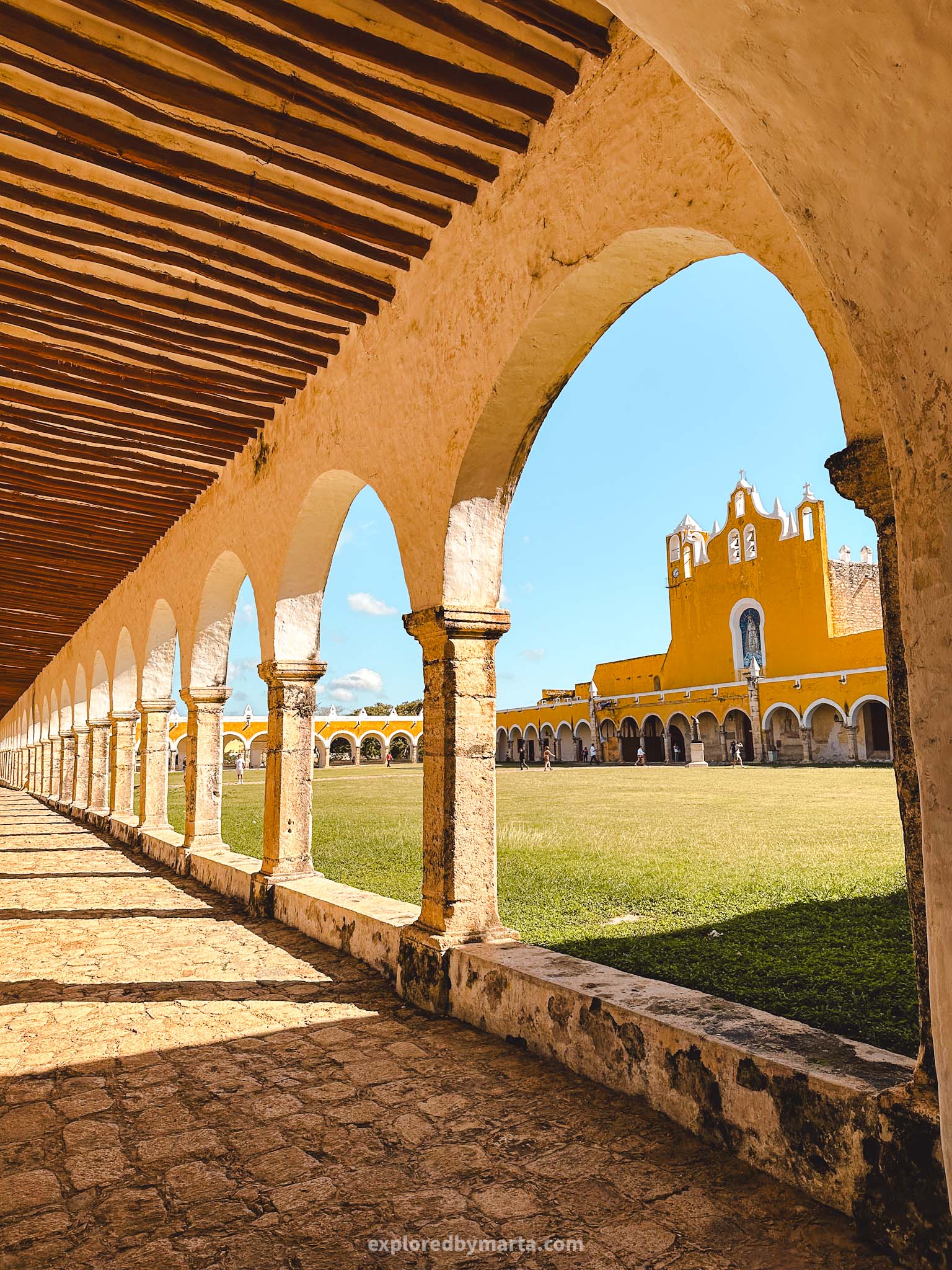
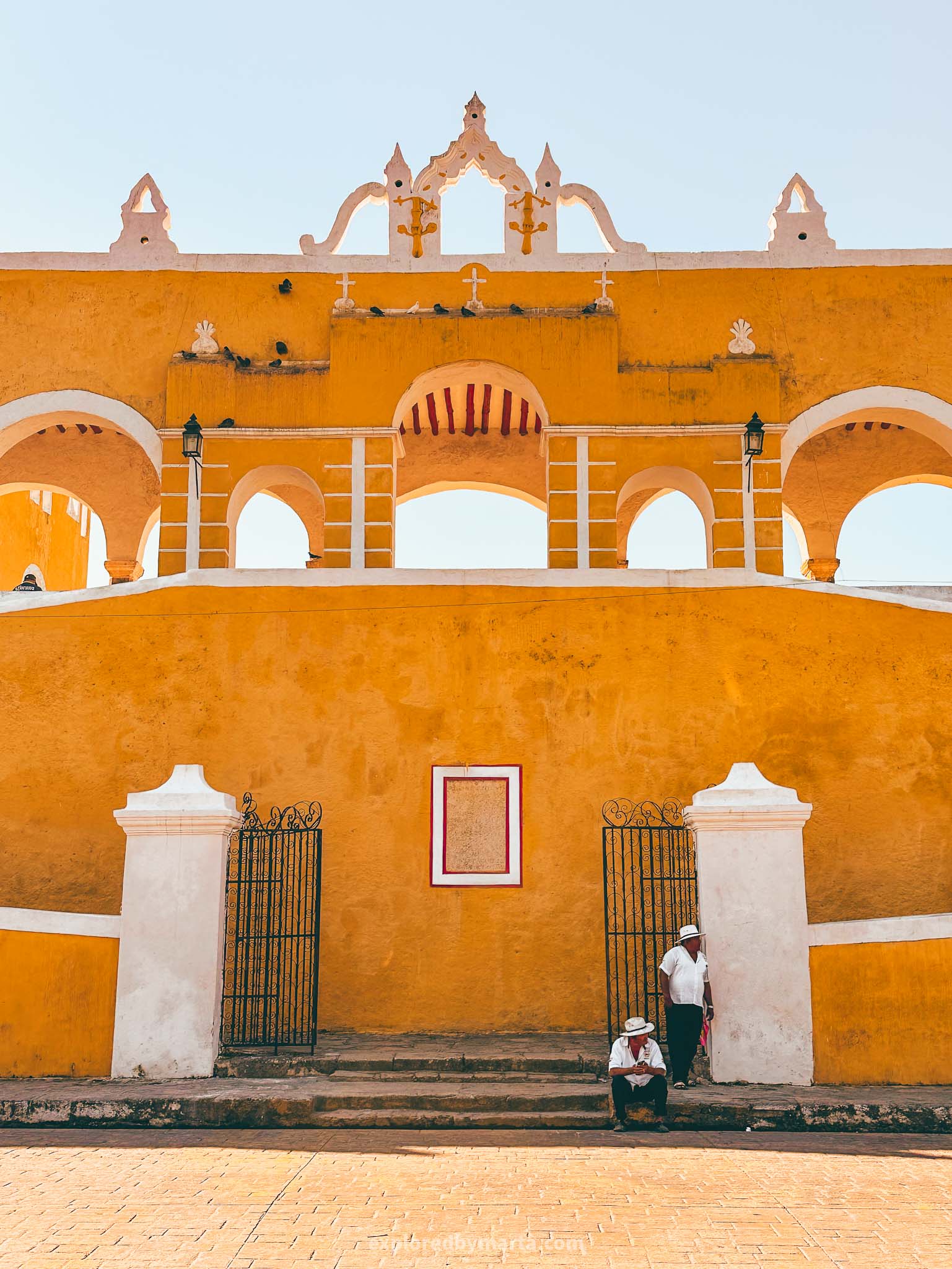
Other must-do things in Izamal include climbing the Mayan pyramids – Kinich Kak Moo and Itzamatul. If you only have time for one, I highly recommend visiting the Kinich Kak Moo pyramid as you can see the whole town of Izamal from the top!
Don’t forget to explore the local market, Mercado Municipal de Izamal, try the yellow corn ice cream, walk around the 5 de Mayo Park, and, for lunch, I suggest trying Mayan dishes at Restaurant Kinich. This place is definitely worth a stop!
Location: Convento de San Antonio in Izamal
15. Cenote Xcanahaltun
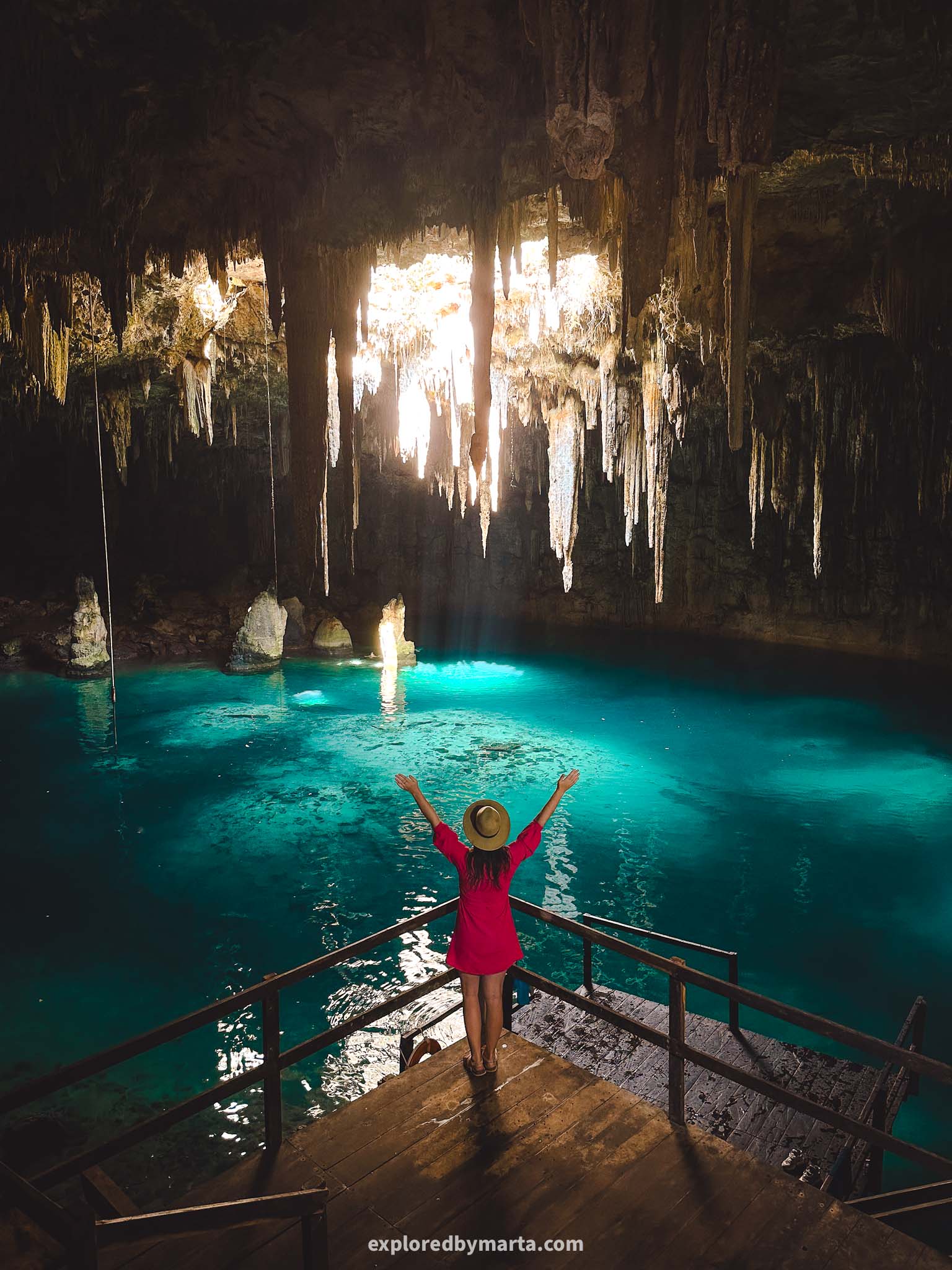
During our three-month stay in the Yucatan Peninsula, we managed to visit more than 30 cenotes in the Yucatan Peninsula and there were only a few that stood out to me the most. One of them was Cenote Xcanahaltun.
At first, I didn’t expect much from Cenote Xcanahaltun as I had already visited many stunning cenotes but as soon as I entered the majestic cave I fell in love and this underground gem immediately became one of my favorite places in Yucatán!
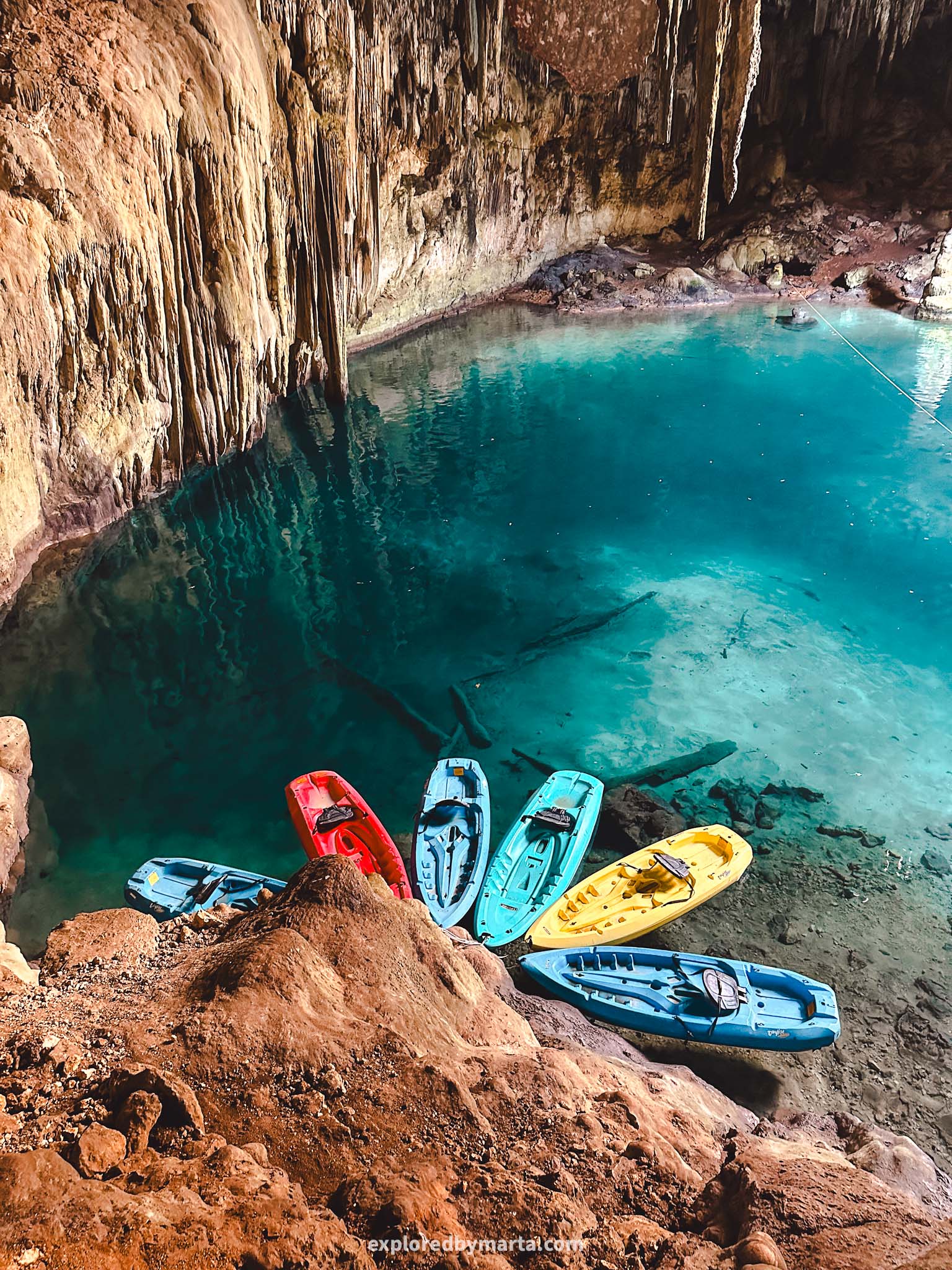
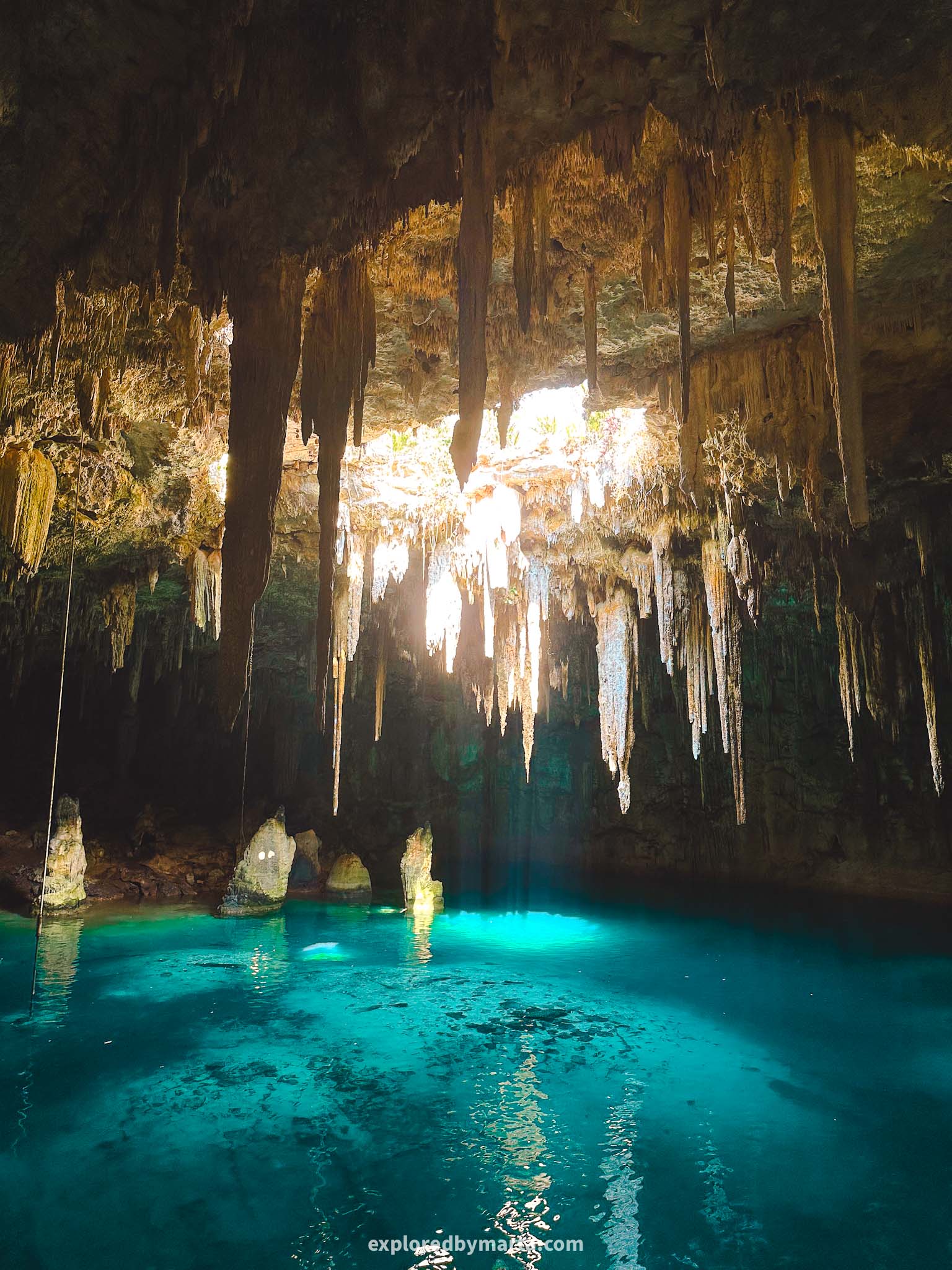
The glorious cathedral-sized cenote is actually like a large underground lake with a small hole in the ceiling that lets natural light inside the cavern. The ceiling is adorned with icicle-type stalactites and looks absolutely spectacular.
You can enter the crystal-clear waters from a wooden platform located on one side of the ‘lake’. The entrance to the cenote was 230 pesos and for an extra 100 pesos we were offered to rent a kayak. I will never forget this incredible place!
Location: Cenote Xcanahaltun
16. Bacalar – home to the Lagoon of Seven Colors
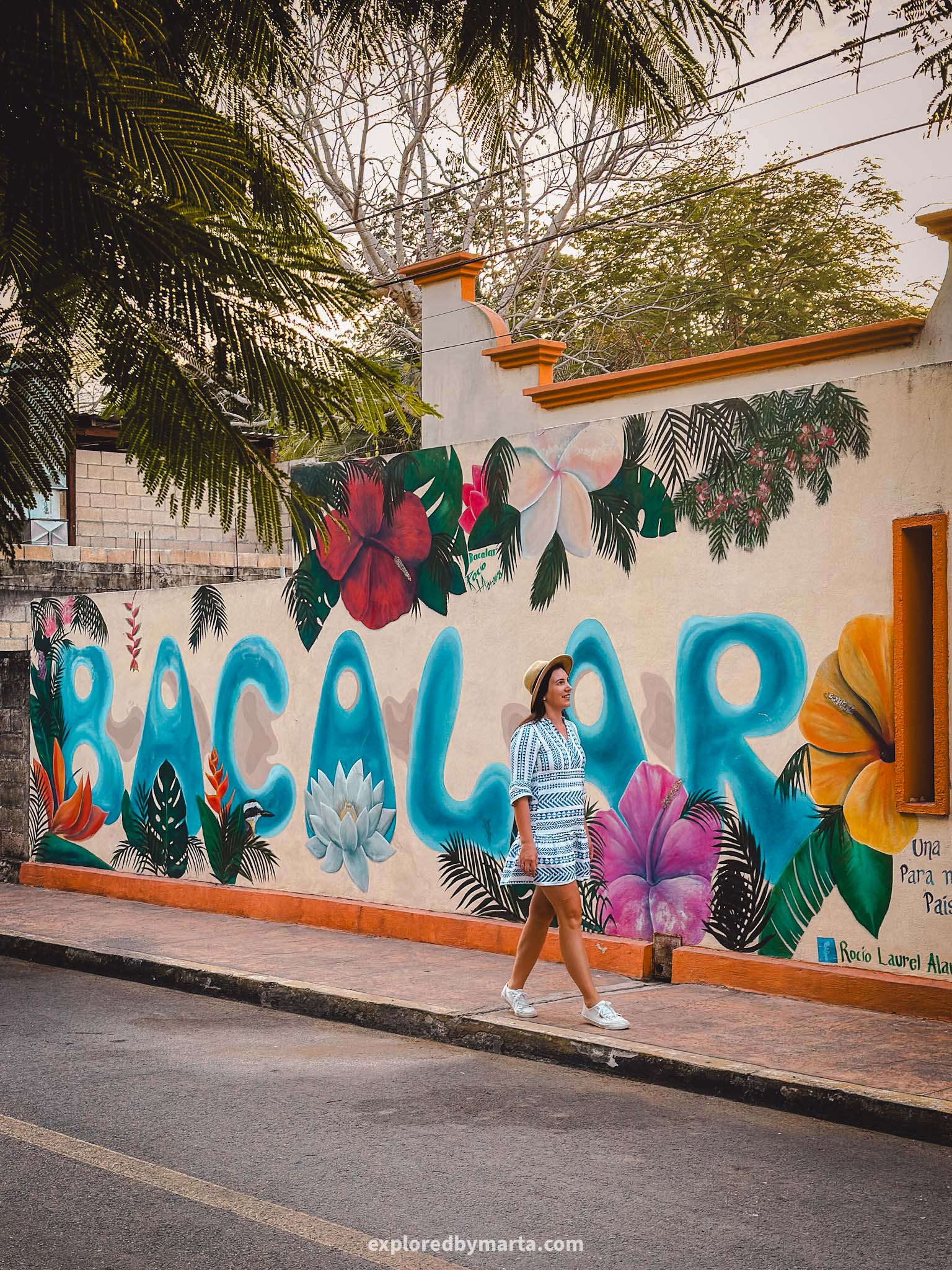
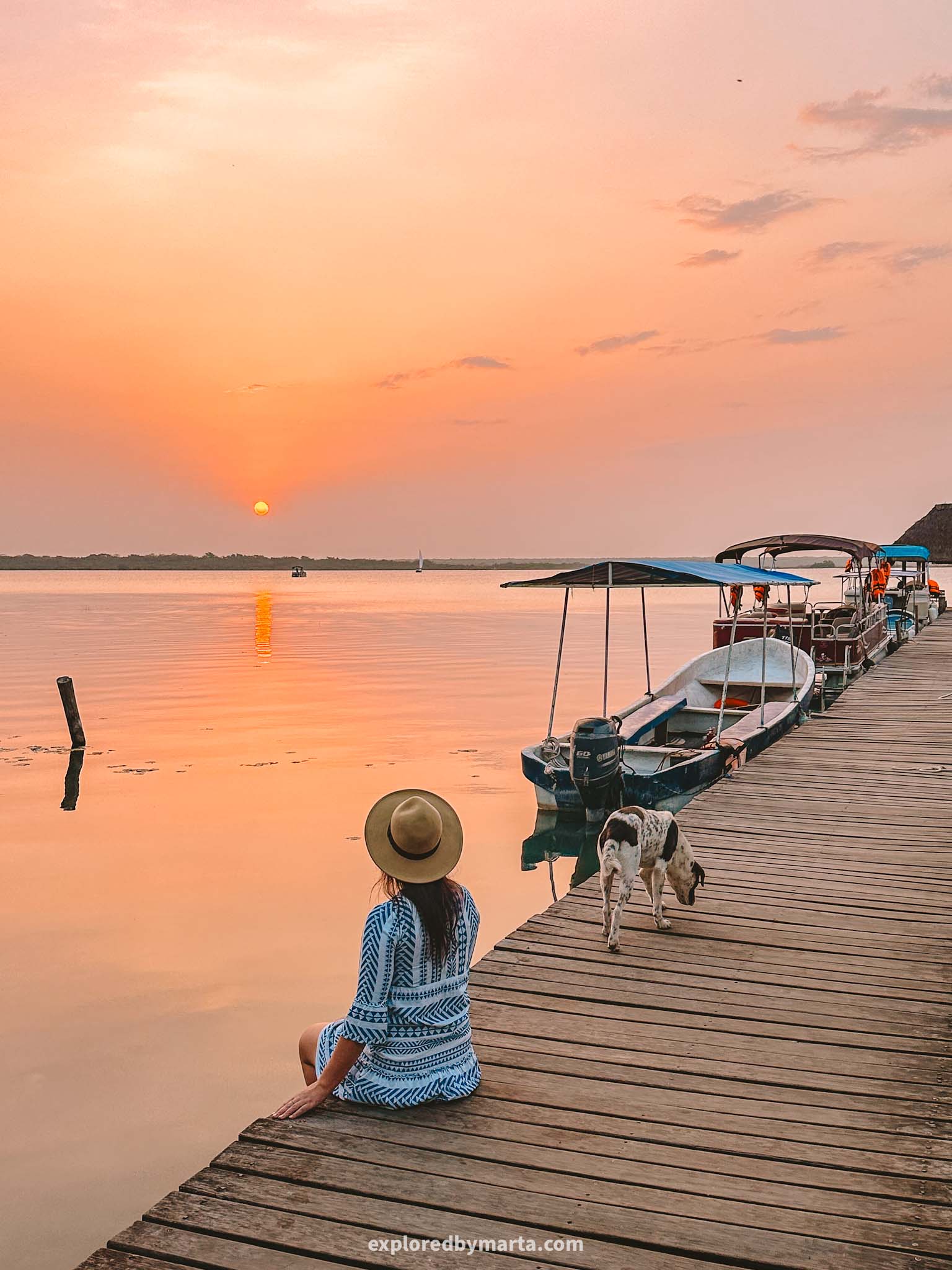
While staying in Tulum we decided to go on a weekend trip to Bacalar and its pride and joy, the Lagoon of Seven Colors! It turned out to be one of my favorite memories from our travels around the Yucatán Peninsula!
The spectacular Lagoon of Seven Colors is often regarded as the Maldives of Mexico thanks to its turquoise crystal-clear shallow waters! It is said that the lagoon boasts seven different shades of blue but I didn’t count!
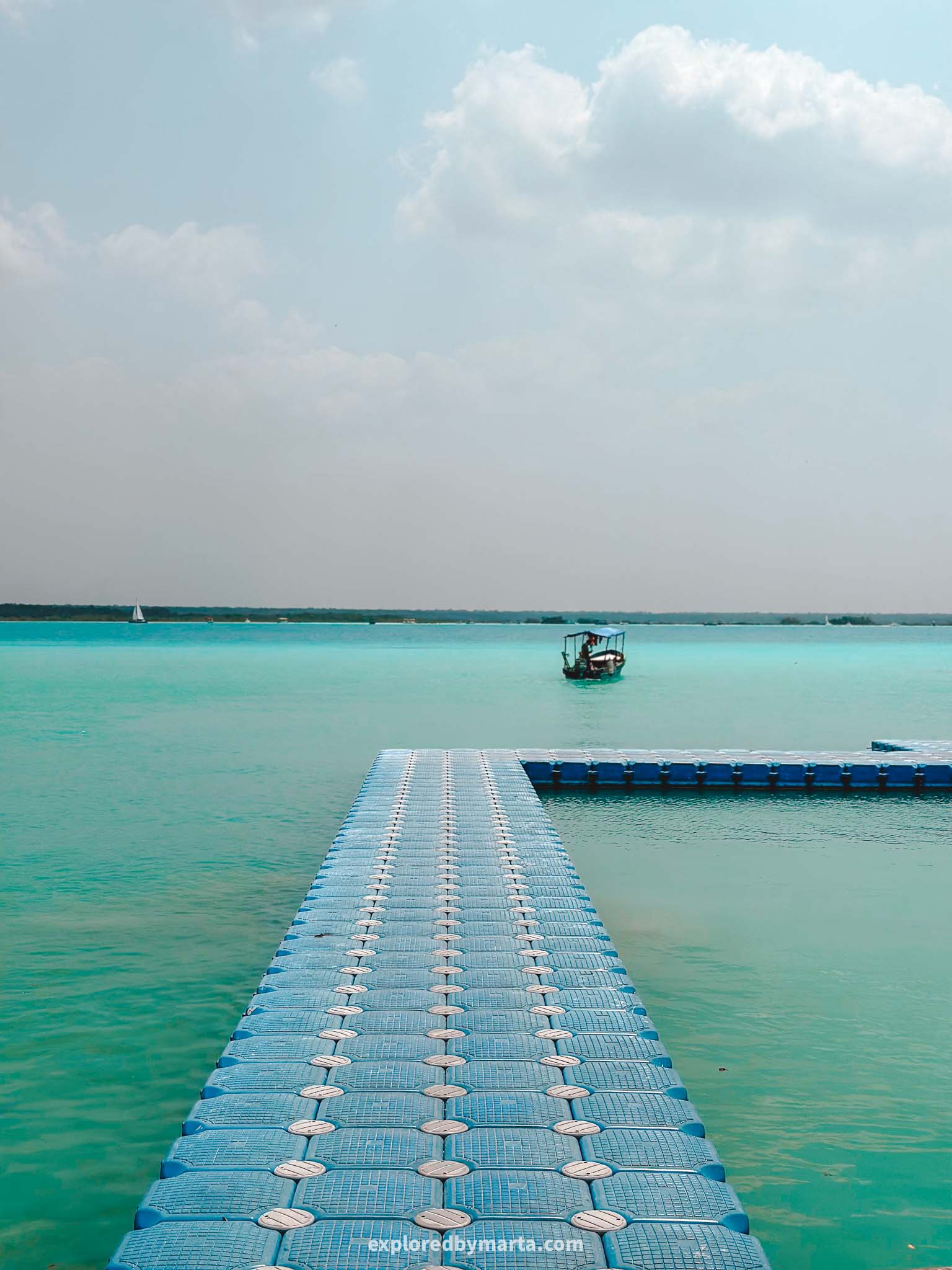
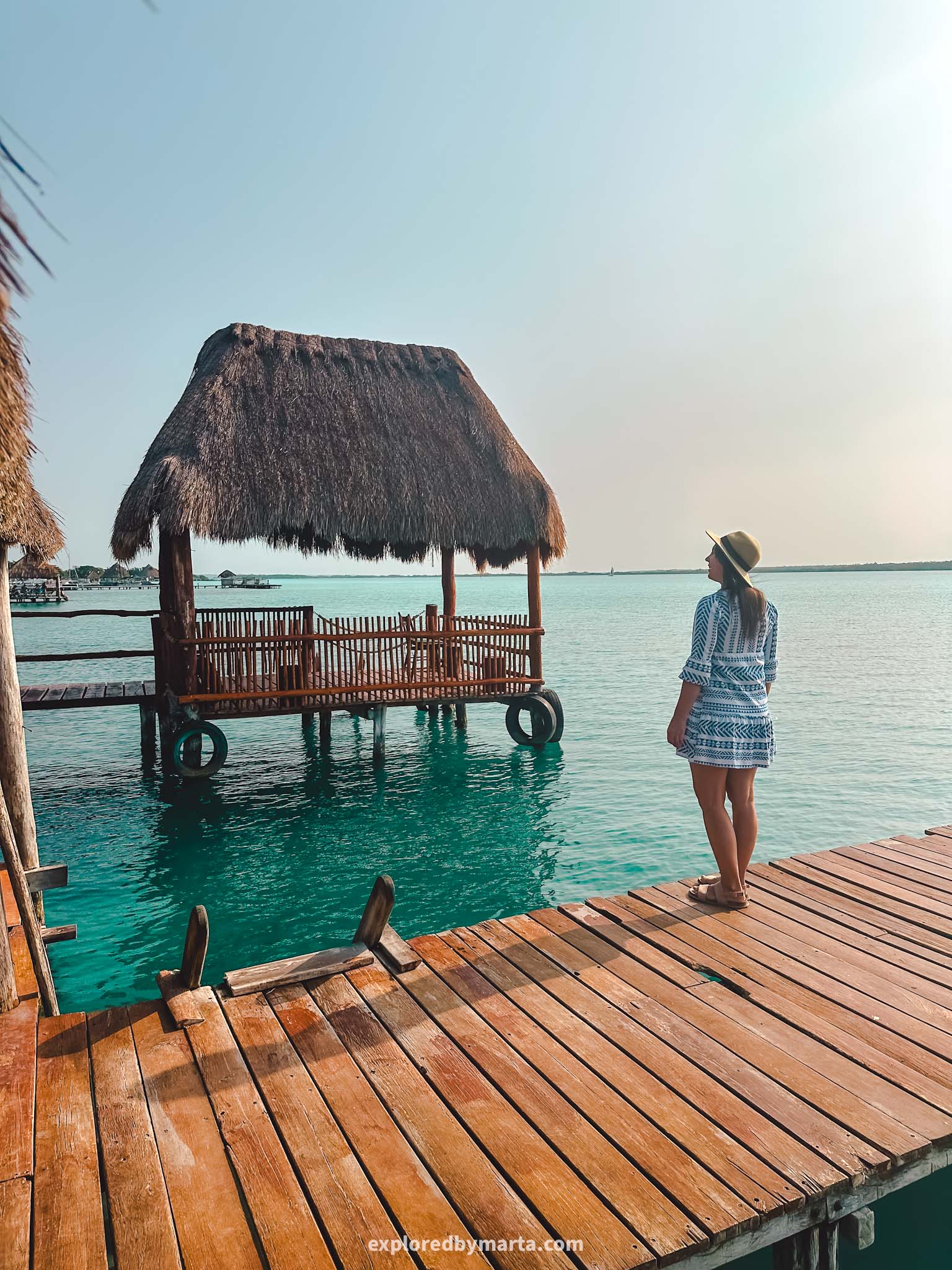
Some of the must-do things to do in Bacalar include a boat trip to the famous Channel of the Pirates, having lunch at a waterfront restaurant (I recommend La Playita), exploring the old fort in downtown and floating down the stream at Los Rapidos.
Los Rapidos is a narrow channel between two lagoons which creates a slow but steady stream of gorgeous turquoise water in the channel. So you walk upstream by a wooden path, jump in and just let the current take you back to where you came from.
And then simply repeat it all again!
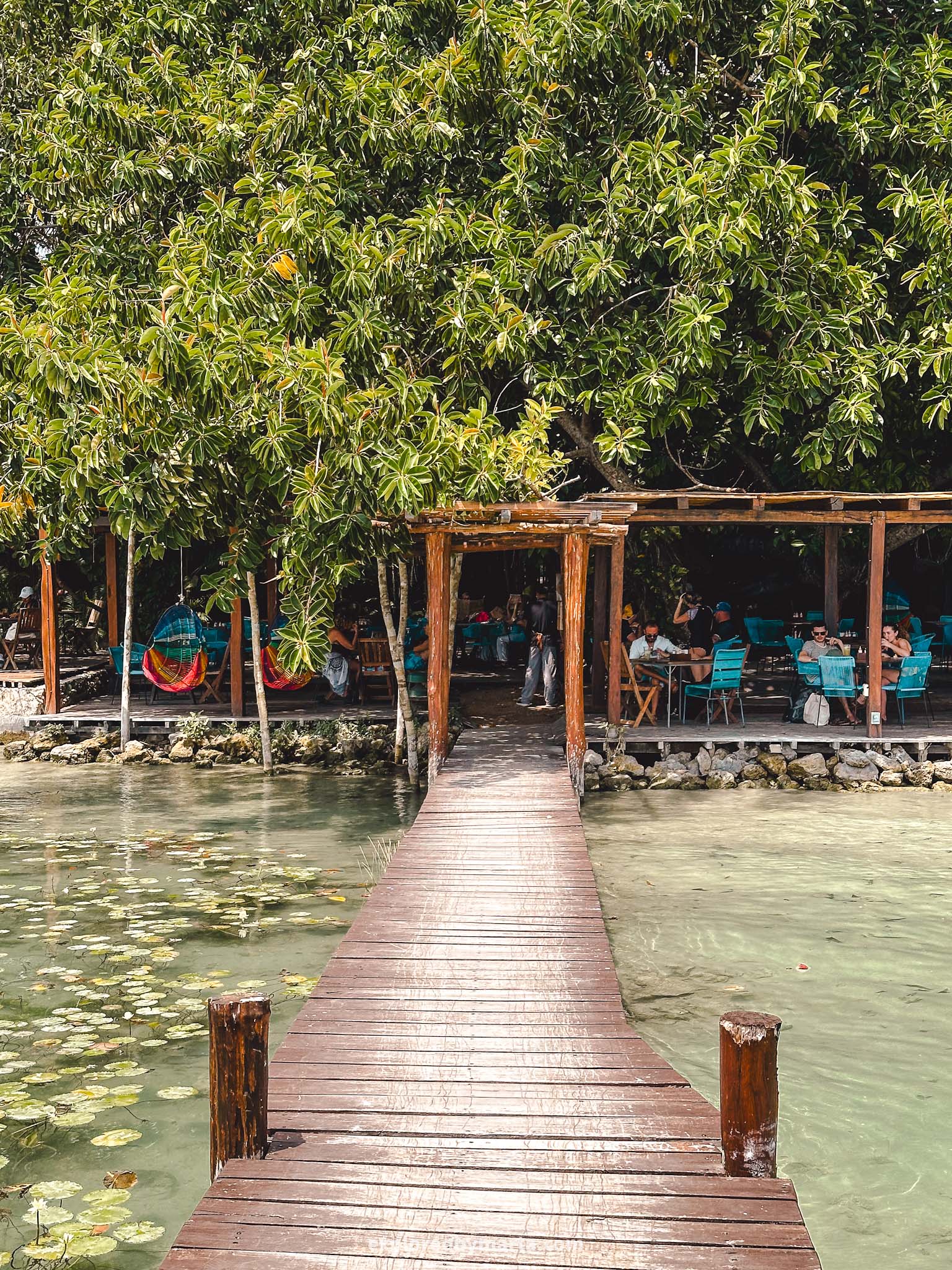
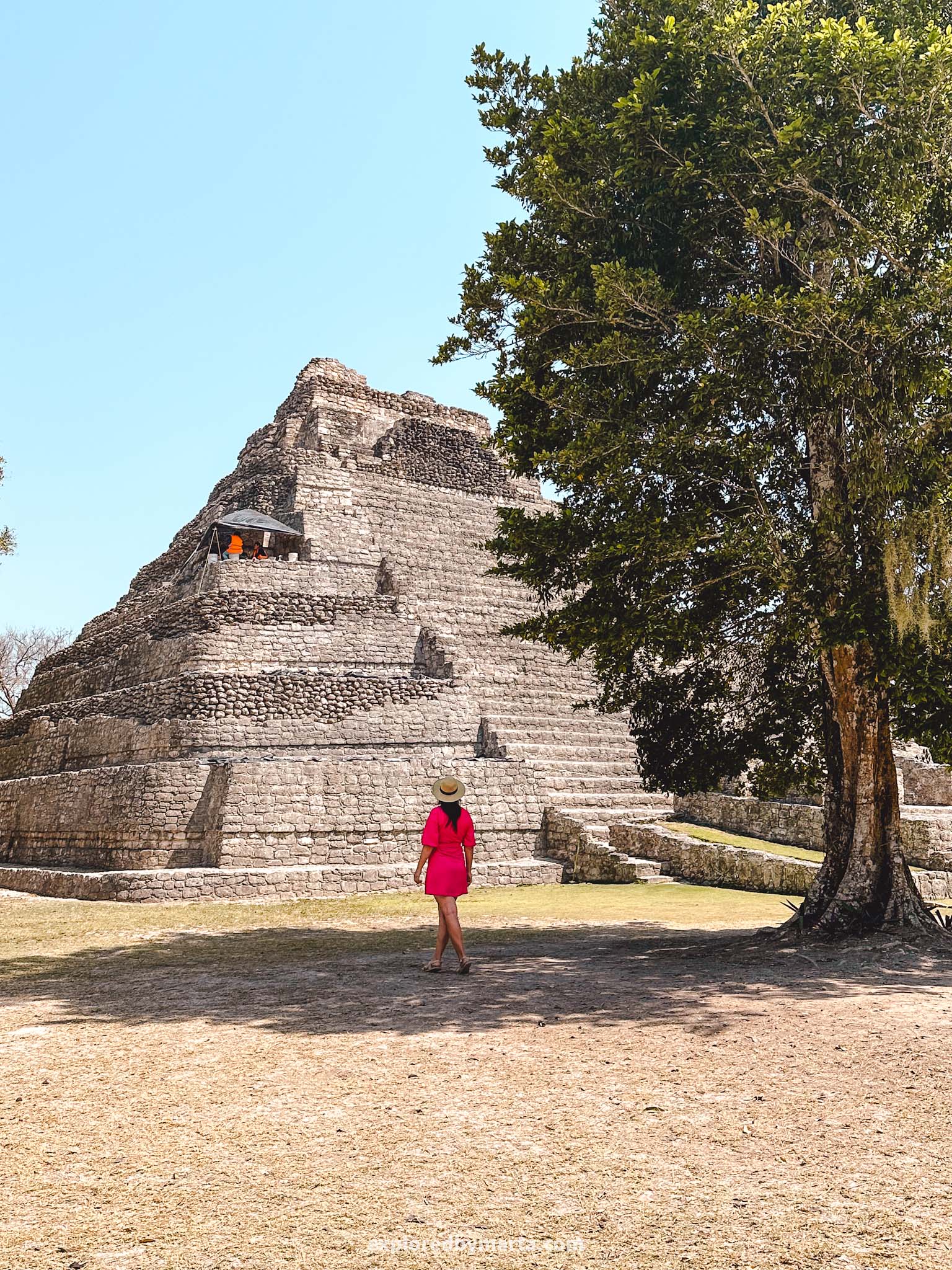
Bacalar is just a short ride away from three incredible Mayan sites – Chacchoben, Dzibanché, and Kohunlich archaeological zones. I liked the three massive pyramids in Chacchoben the most but in Dzibanché you are allowed to climb the pyramids!
After a day full of adventures and swimming I recommend stopping by the central square of Bacalar – Zócalo. It is often full of activities including some dancing, singing, and lots of street food stands. Here I got the best marquesita I have ever eaten!
Location: Lagoon of Seven Colors in Bacalar
17. Muyil Archaeological Zone

Located just a 20-minute drive from Tulum is a wonderful Mayan pyramid and ancient ruins – Muyil Archaeological Zone. It is one of the longest-inhabited ancient Mayan cities in the area, and some artifacts there date back to the 4th century BC.
Muyil ruins stand out with their unique architecture – it has characteristics of an architectural style typical in the Peten region in modern-day Guatemala which signifies close ties with ancient Mayan cities in the South.
The archaeological zone features a group of different structures and temples and a big pyramid deeper into the jungle. It is a unique-looking pyramid and you won’t see a pyramid like this anywhere else in Yucatan. I loved it!
Location: Muyil Archaeological Zone
18. Holbox – the quintessential tropical island

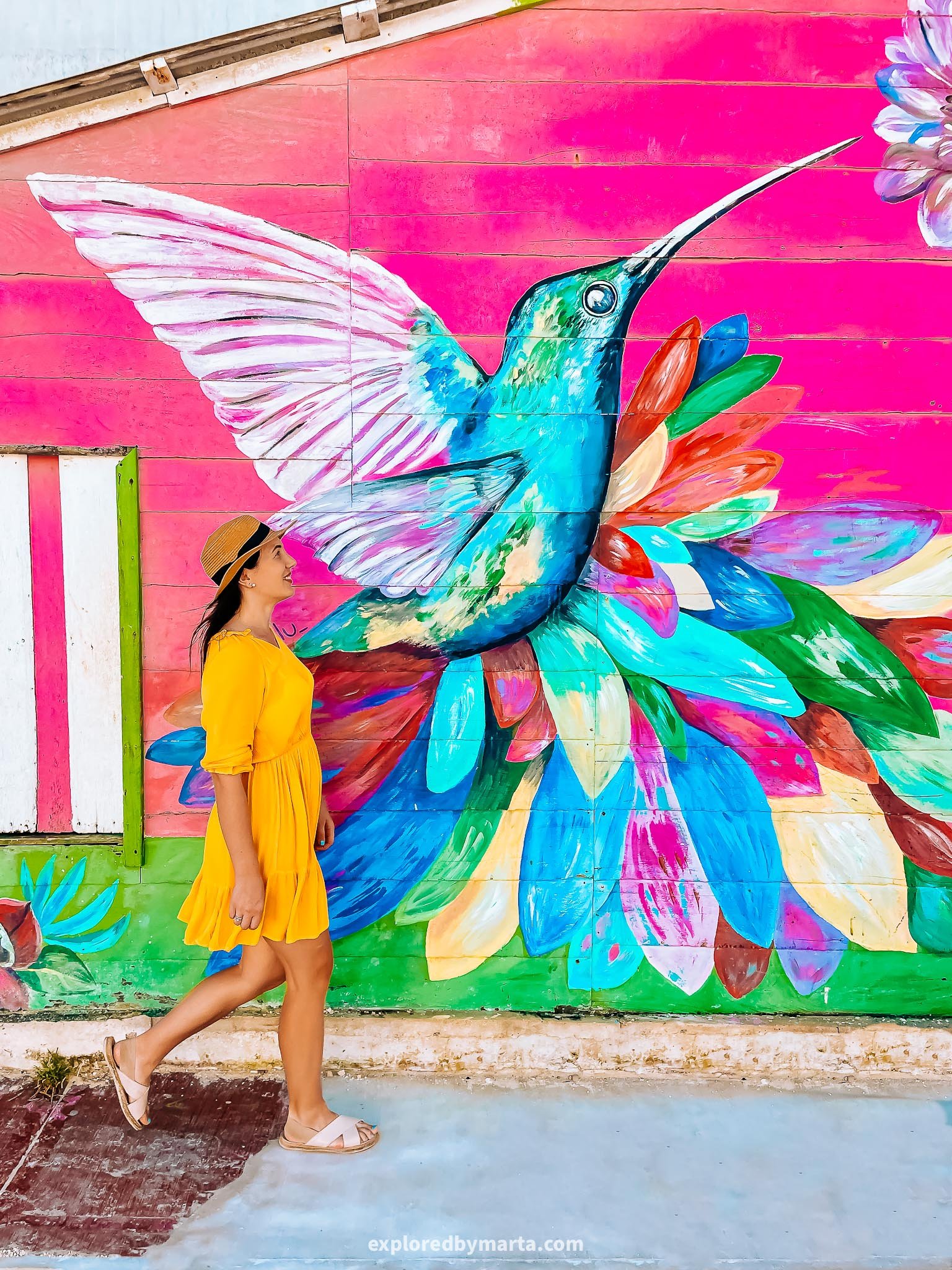
Holbox is the quintessential tropical island with turquoise water and fine white sand where you wander around barefoot and drink coconuts under palm trees! It is the place to be to enjoy that authentic Mexican fishing village life!
We have visited Holbox multiple times because we like it so much! To get there you need to get to the coastal village of Chiquilá and then take a ferry to the island of Holbox. There are two ferry companies departing every 30 to 60 minutes.
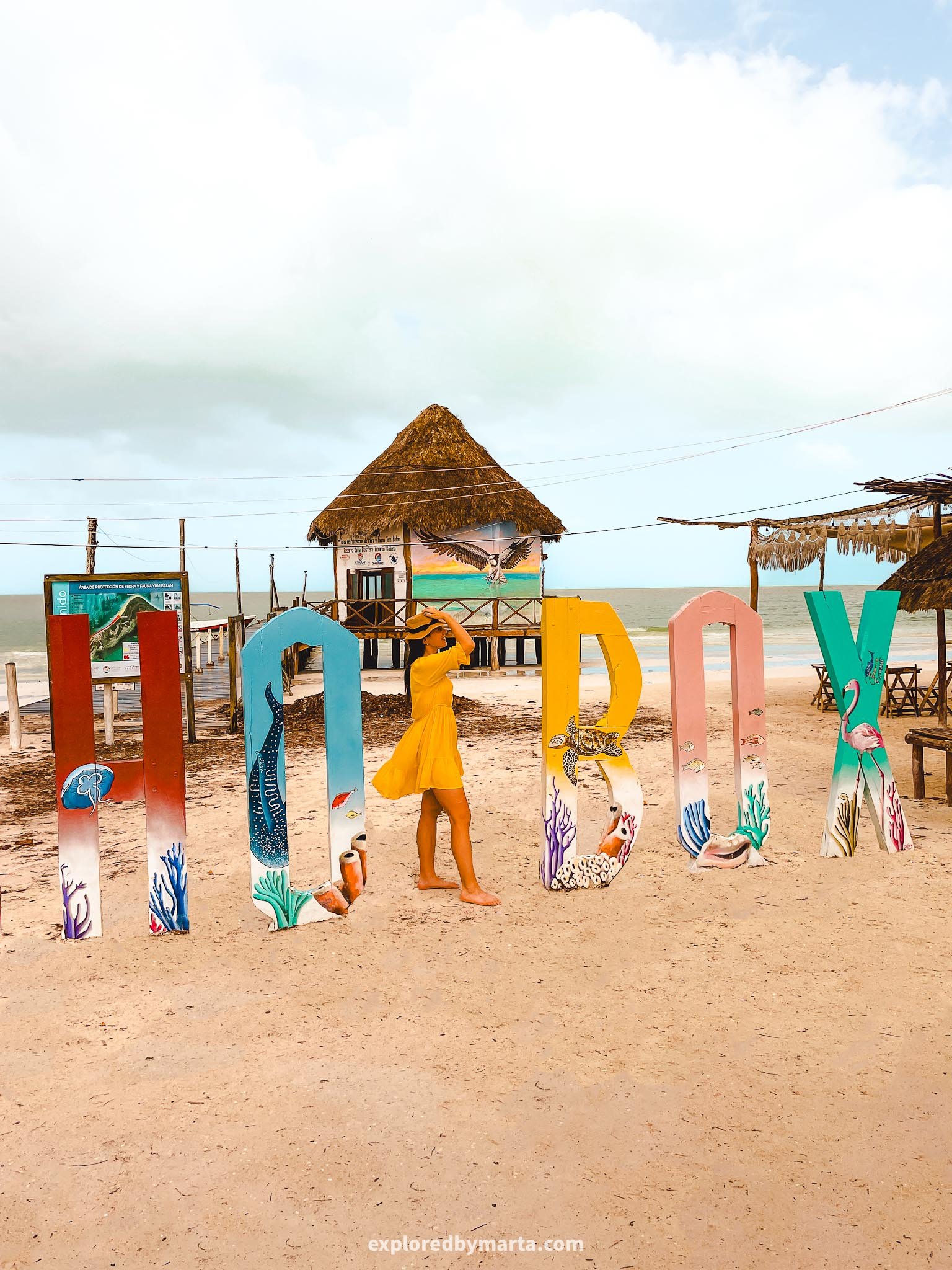
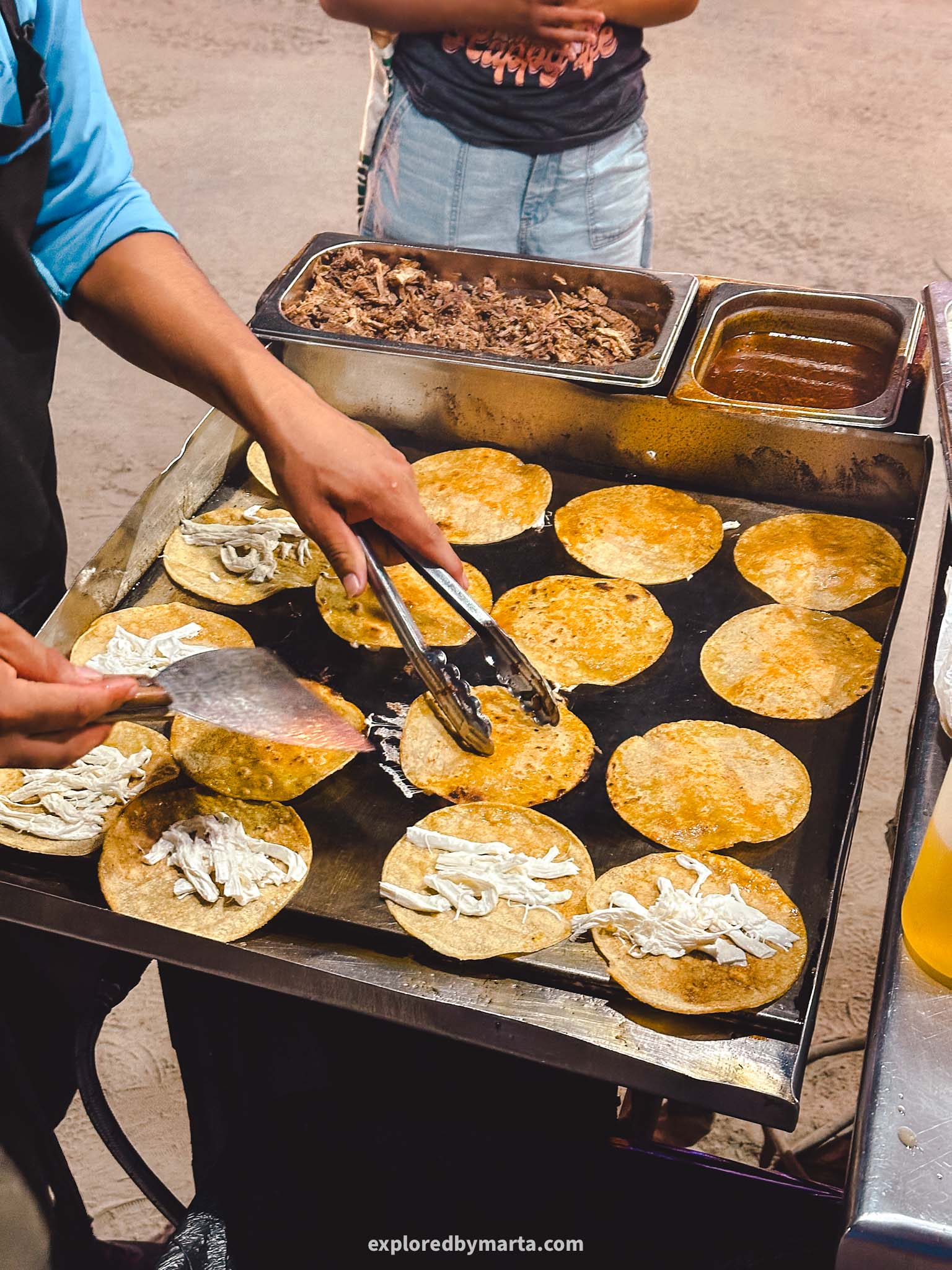
Although we traveled there by our rental car and left it in one of many long-term parking lots in Chiquilá while we stayed on the island, you can very easily get there by one of many minibus taxis or buses.
Holbox is a unique island with unpaved streets, people walking around barefoot, full of golf cart taxis buzzing around, and no cars allowed for tourists. Occasional power outages are a thing here and street-wide water puddles after storms, too.
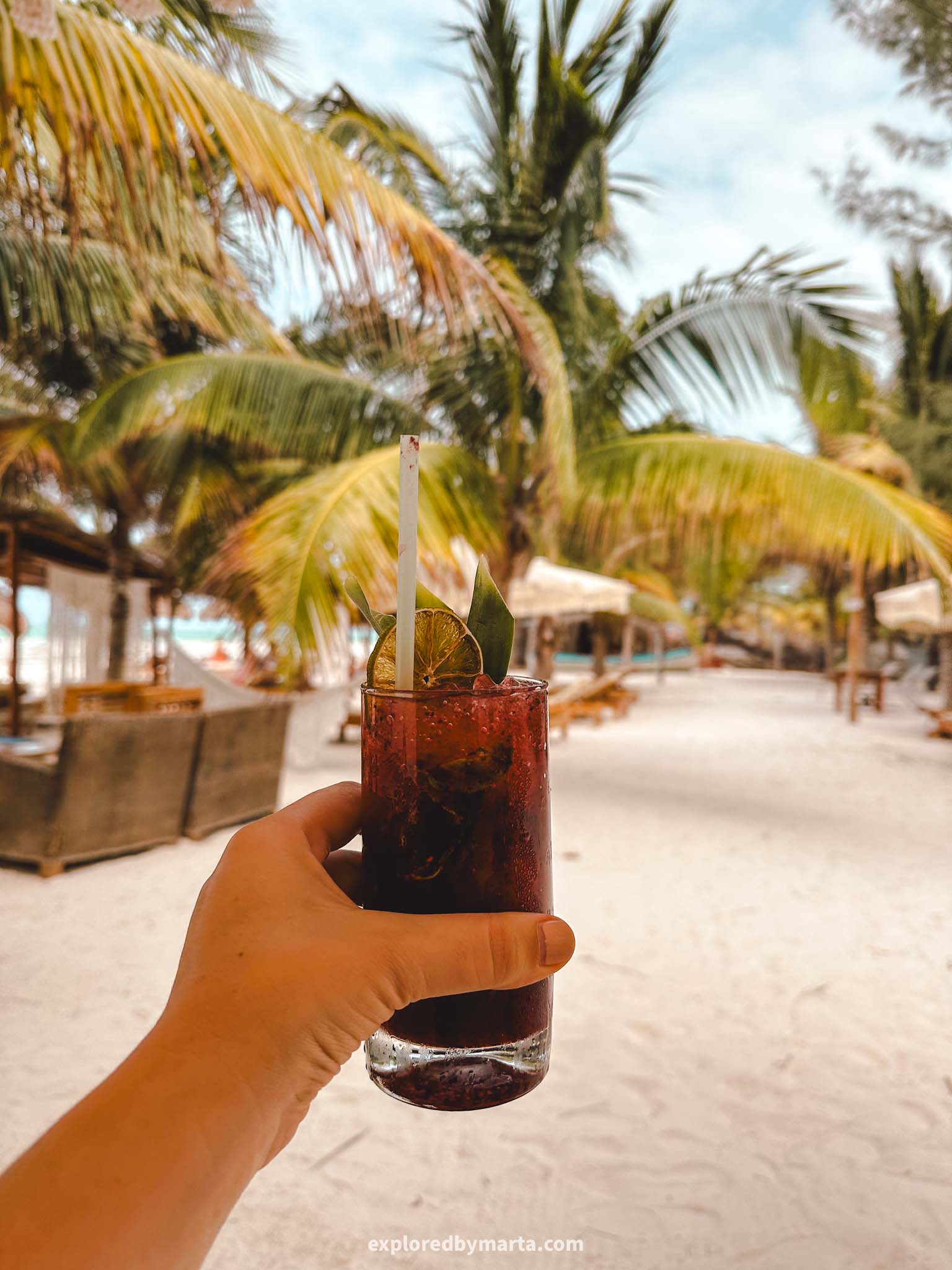
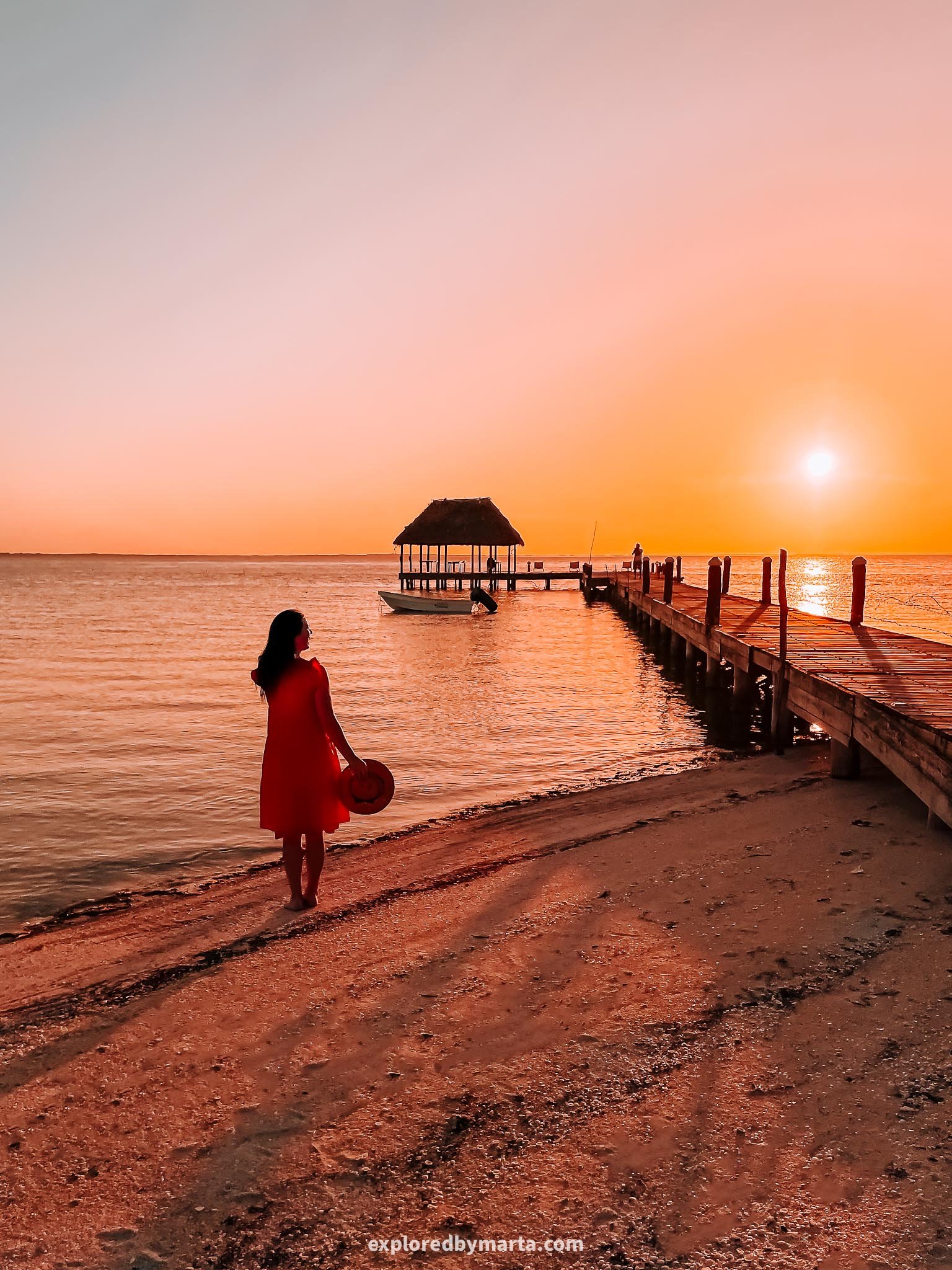
While on the island, explore the hustle-bustle of Holbox Central Park, and don’t forget to go there in the evening to try some Mexican street foods prepared in one of many street food stalls!
Then enjoy the gorgeous Playa Holbox beach with fine white sand and shallow turquoise waters. For beach clubs, I recommend Restaurante La Playa De Ñaña restaurant and beach club.

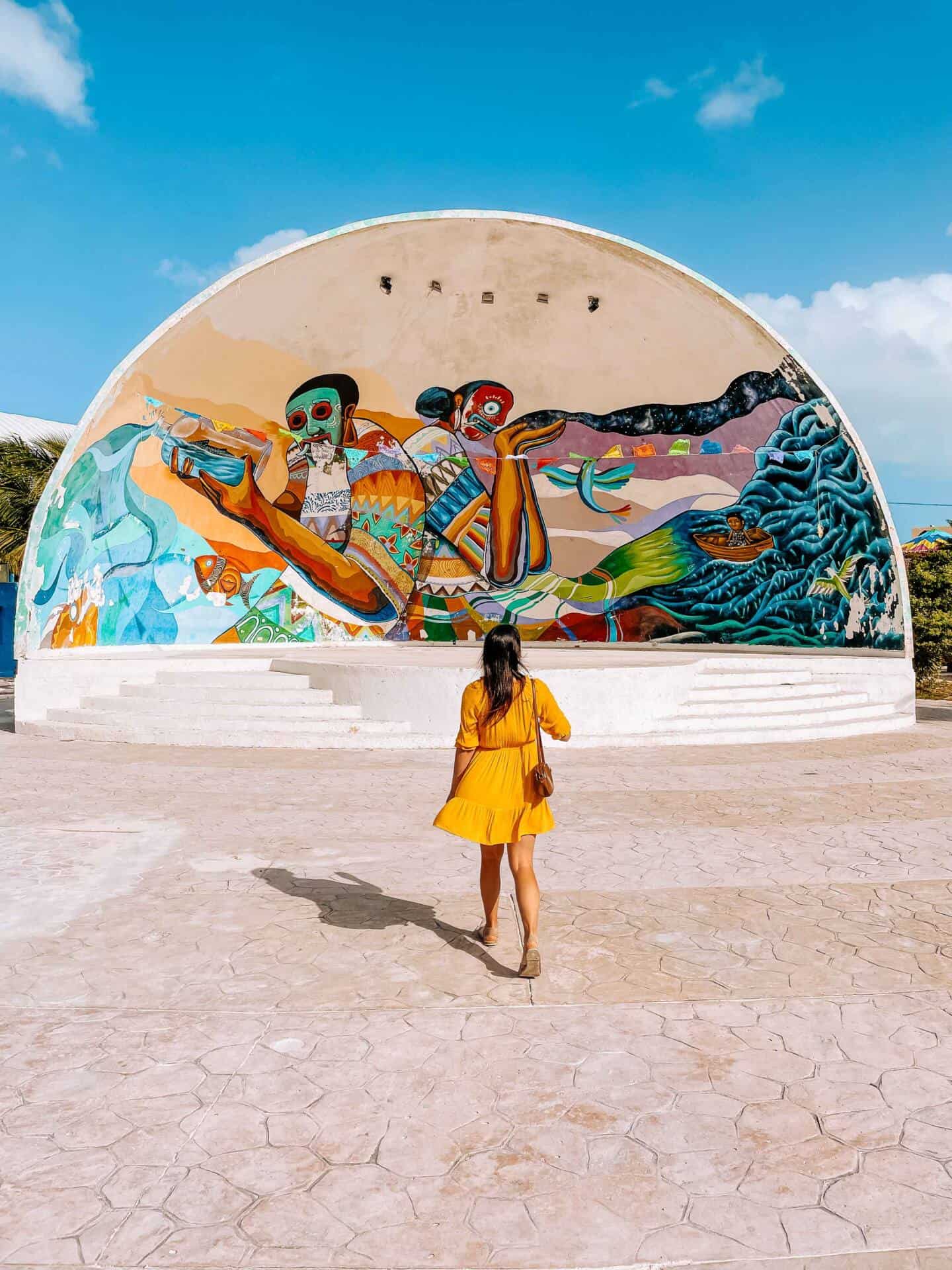
If you stay there the night, consider joining everyone on a sandbank morning walk to Punta Mosquito – a popular activity on the island. Read more about other bucket list things to do in Holbox here!
Another unique experience to do in Holbox is a bioluminescence tour in the evening after dark. It was one of my highlights from Holbox. One of the most-try foods in Holbox is the local legend – lobster pizza, a famous dish on the island.
I also recommend checking out the street of street art in Holbox and watching the sun go by in the Caribbean Sea at Playa Punta Cocos. It was pretty mesmerizing but mosquitoes are a thing here so bring a repellant with you!
Location: Holbox
19. Cenote Atik Tulum

The gorgeous Cenote Atik Tulum is one of the must-see cenotes near Tulum. This place is actually more than a cenote and features a jungle park filled with hidden sculptures, art objects, and photo spots.
Cenote Atik Tulum is amongst the most beautiful cenotes in Yucatan – located only a 15-minute drive from Tulum downtown it is the perfect place to go to spend a day in the jungle swimming in turquoise water.


We visited Cenote Atik Tulum right before closing time so we did not get a chance to swim in the cenote. But it looked wonderful – like an oasis! It is an open cenote surrounded by high walls and a waterfall in one of the corners.
The property also features walls covered with skulls, fountains, a pool with a large bust above it, and many more unique objects for unique photos. If you are looking for a unique and gorgeous cenote near Tulum – look no further! This is it!
Location: Cenote Atik Tulum
20. AZULIK City of Arts
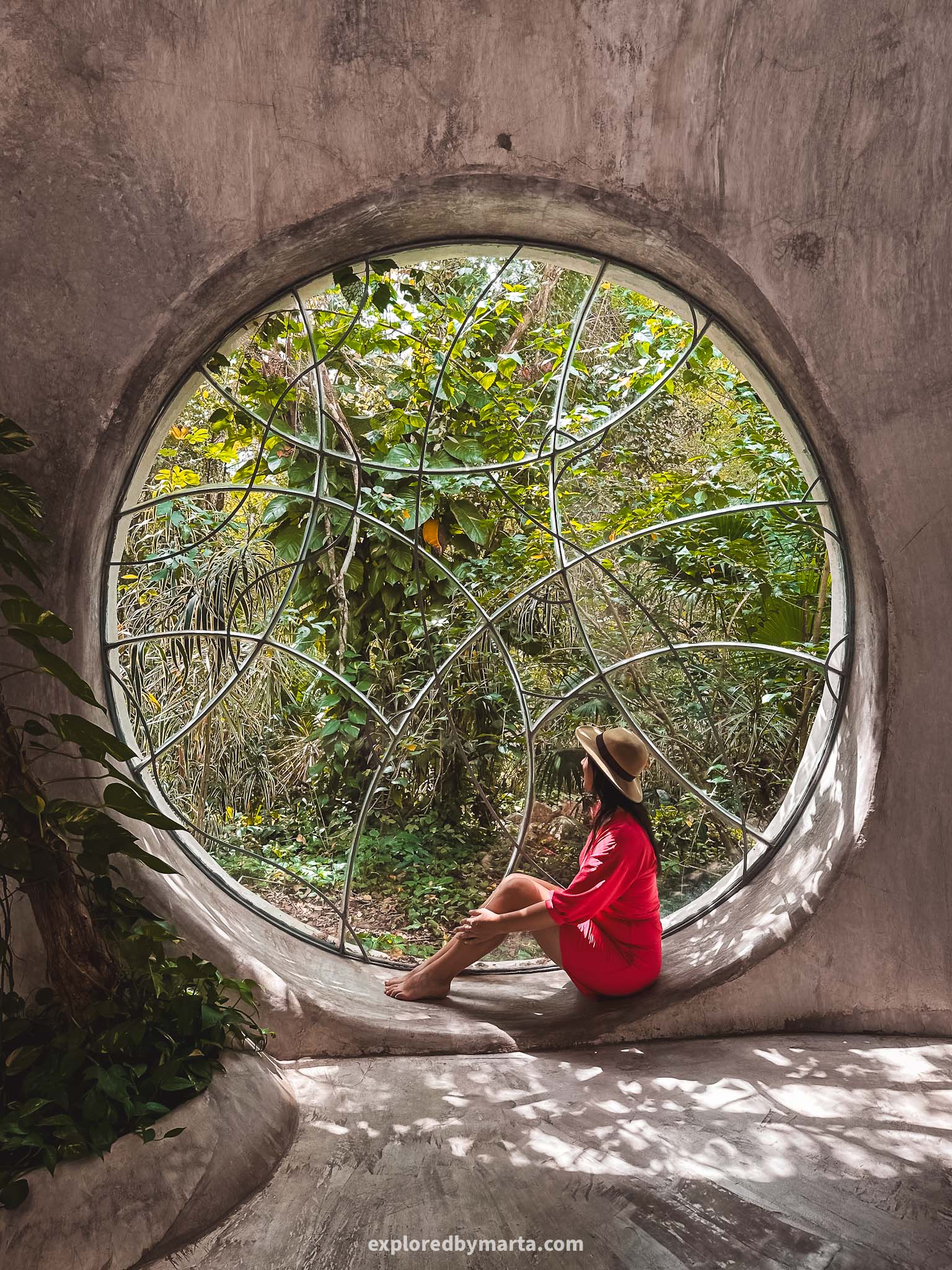
Located in the jungle a 30-minute drive from Tulum, AZULIK City of Arts is an out-of-this-world handmade artisanal creation that takes you on a journey through never-seen-before spaces. In simpler words, it is a contemporary art museum.
When I first entered this place my first thoughts were about the The Lord of The Rings movie where elves lived in those otherworldly places in the trees. It was hard to fathom how they built and how they even came up with all of that!
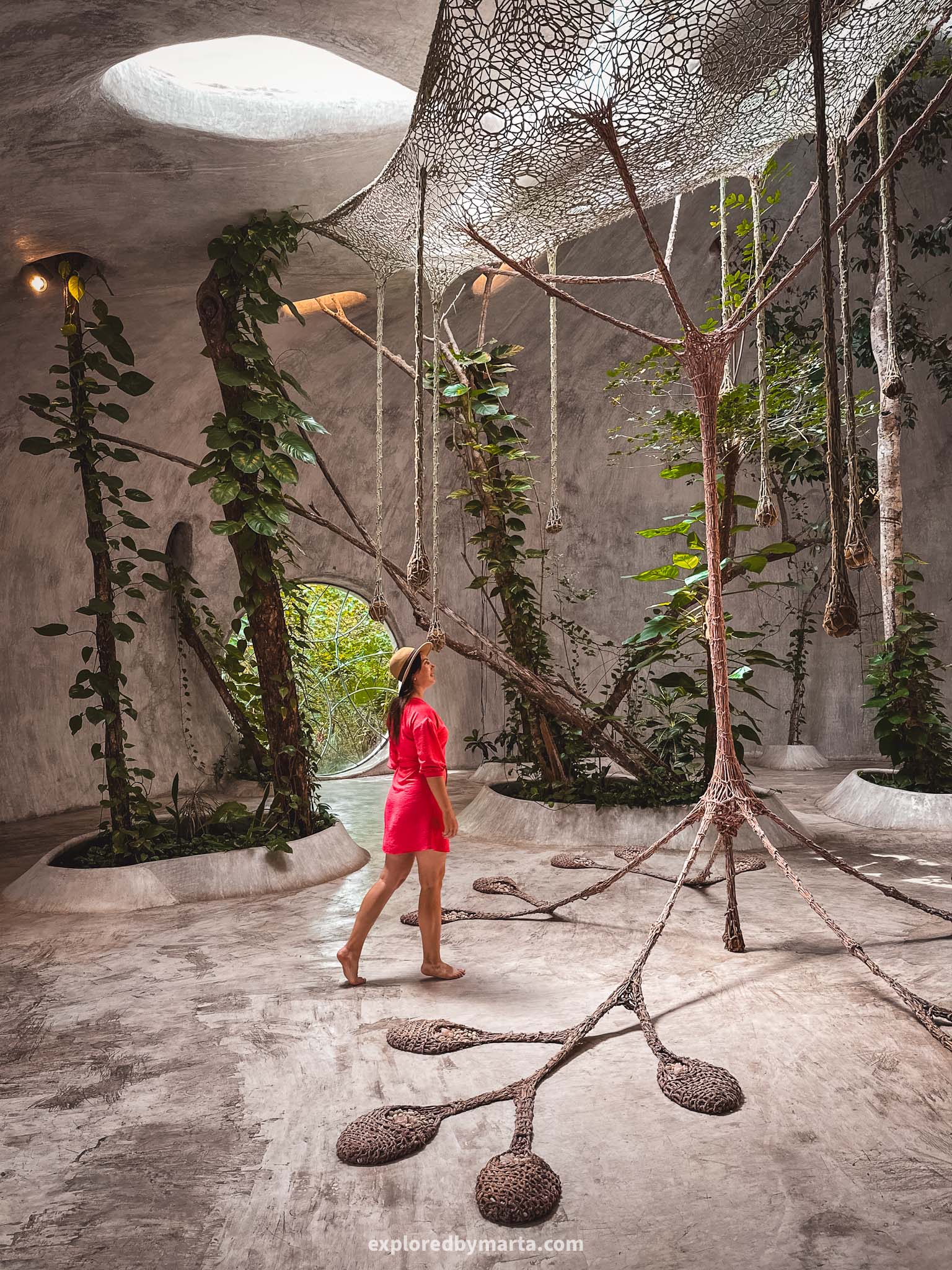
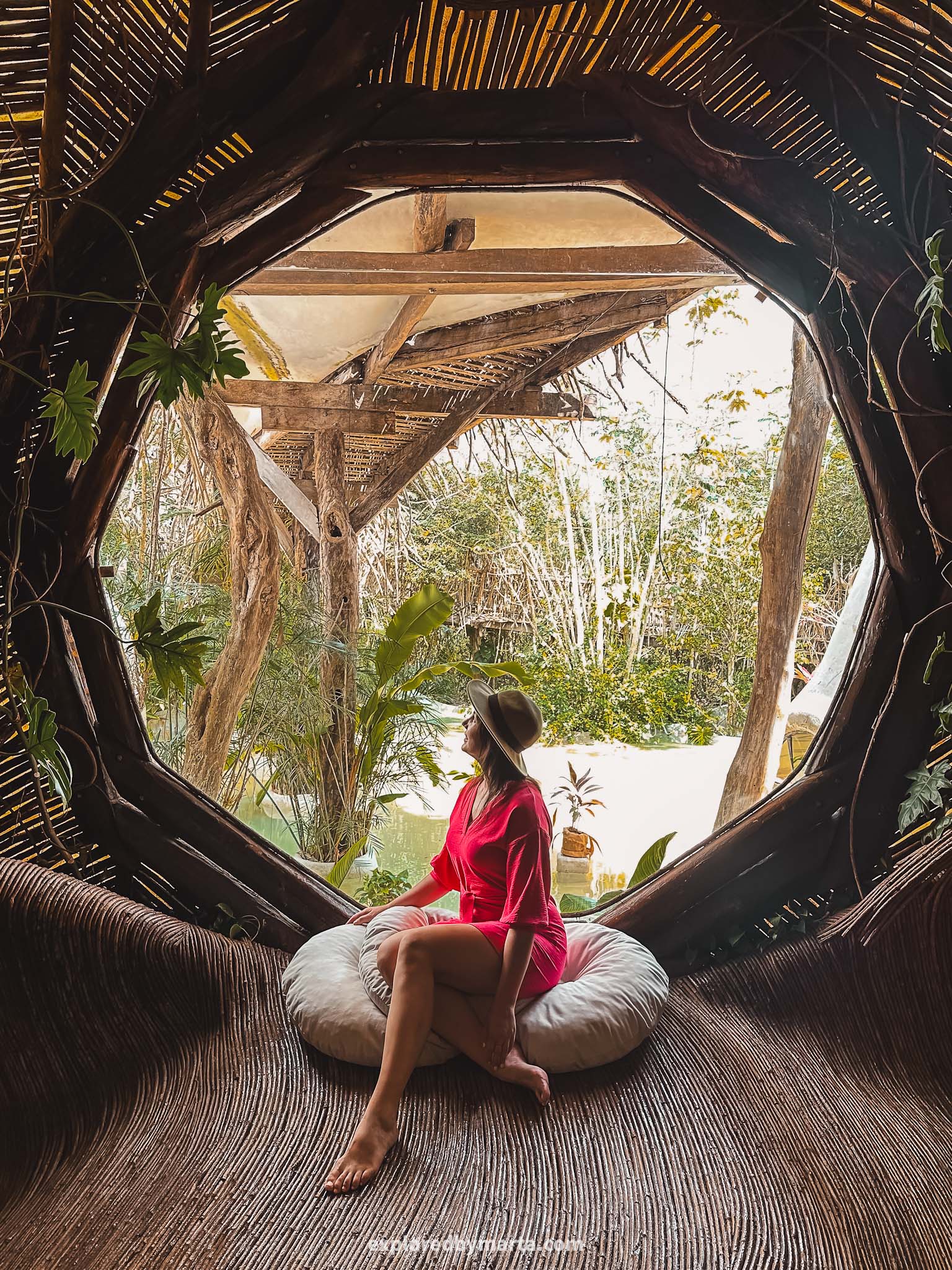
The City of Arts is a massive building all connected in one space – there are wooden pathways built to explore the upper side of the building and then lead you down to the floor. The ground level is connected with other rooms and spaces.
Every room and space features something unique and creative. Once you are done exploring you get your shoes back and can walk outside to explore the surroundings. There is a pool, a restaurant, and more hidden nooks to explore.
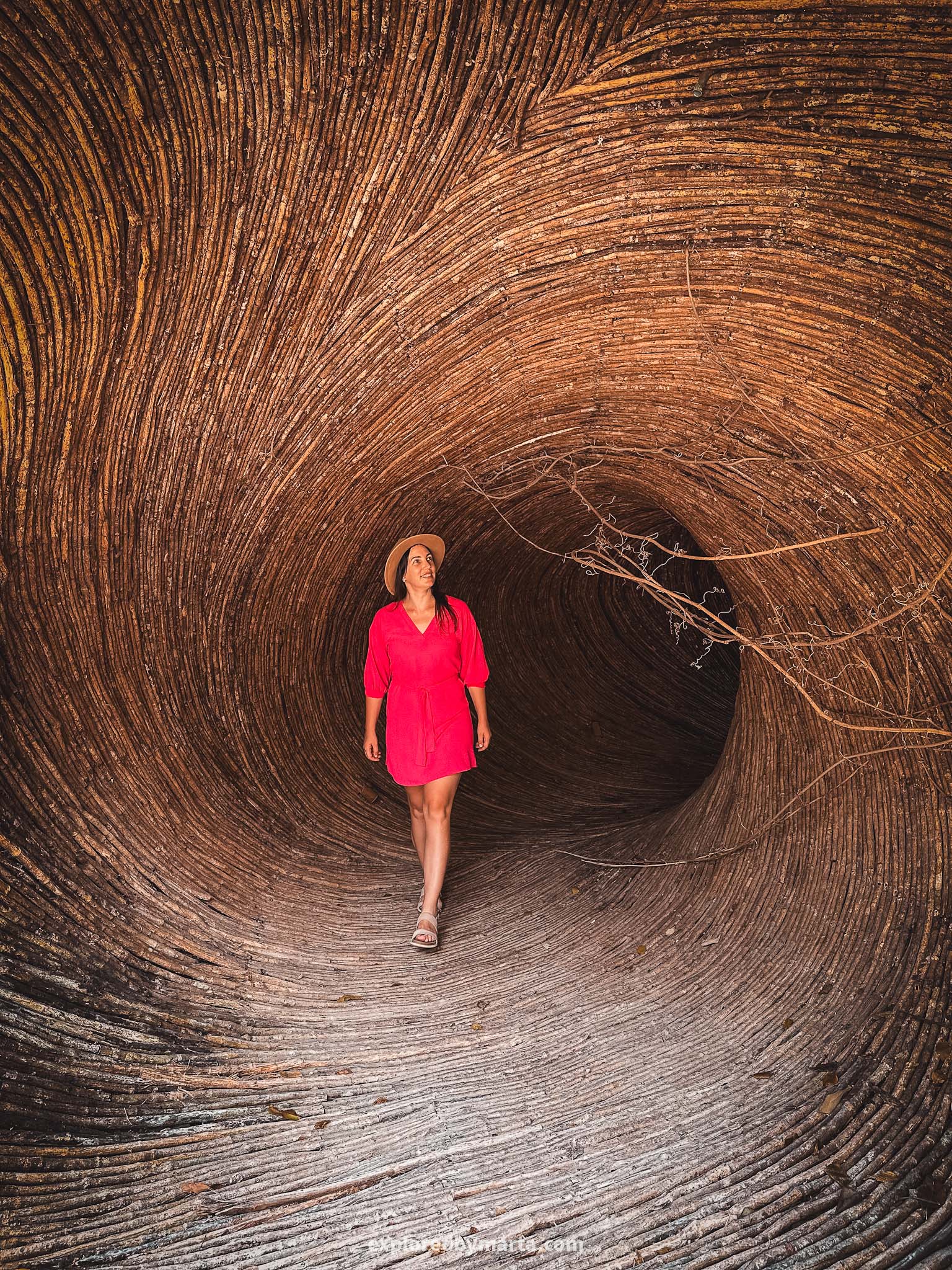
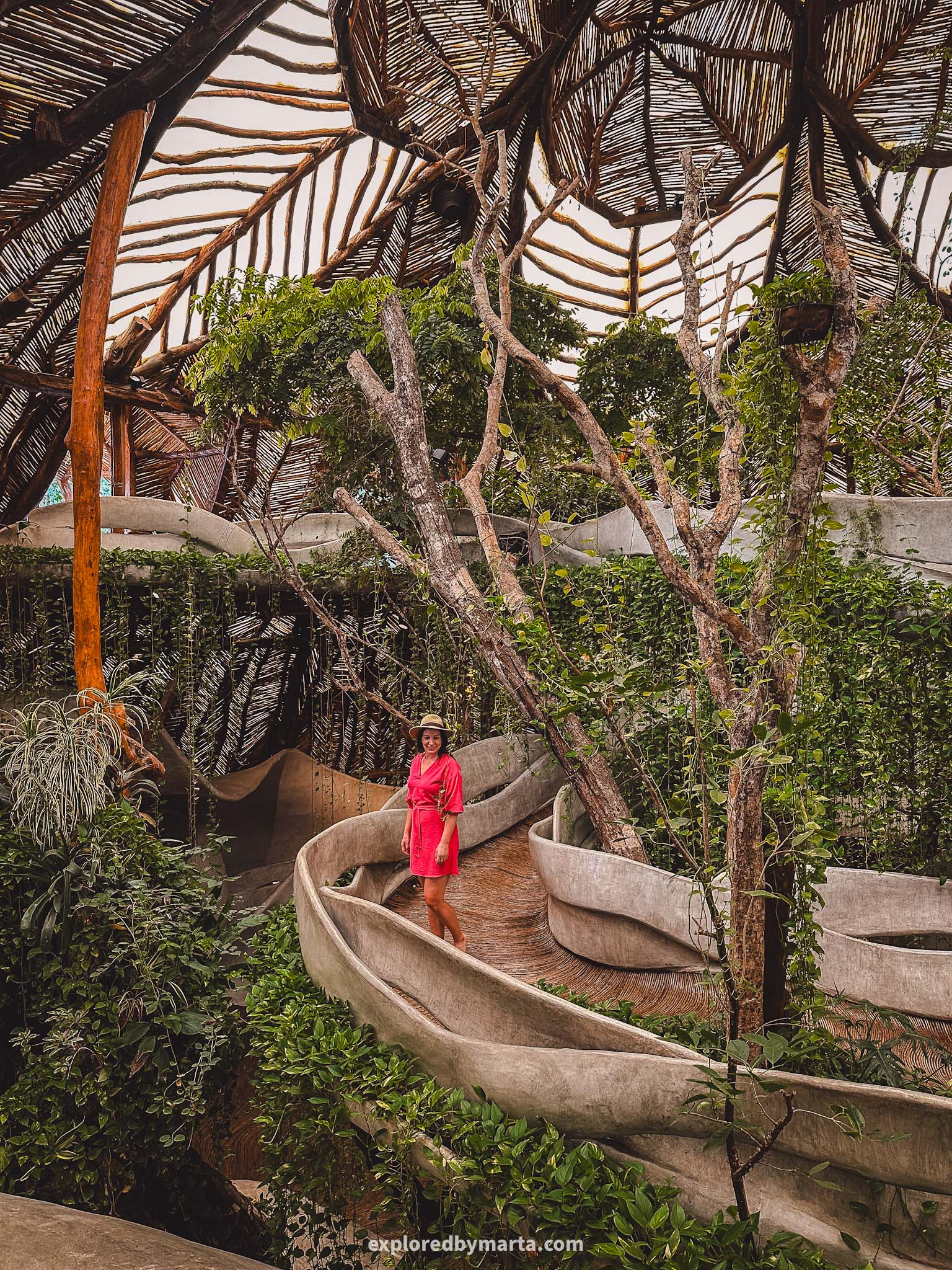
The whole place felt like I was on a different planet. The entrance costs 400 pesos per person and it was worth it. An added bonus are those endless photo-perfect Instagram spots all around the building!
Did you know? There is another museum in the Tulum hotel zone – SFER IK Tulum. From what I gathered from reviews it is a much smaller place for the same price and thus feels not as price-worthy. Check out more about all SFER IK has to offer here!
Location: AZULIK City of Arts
21. Cozumel – the island of the swallows
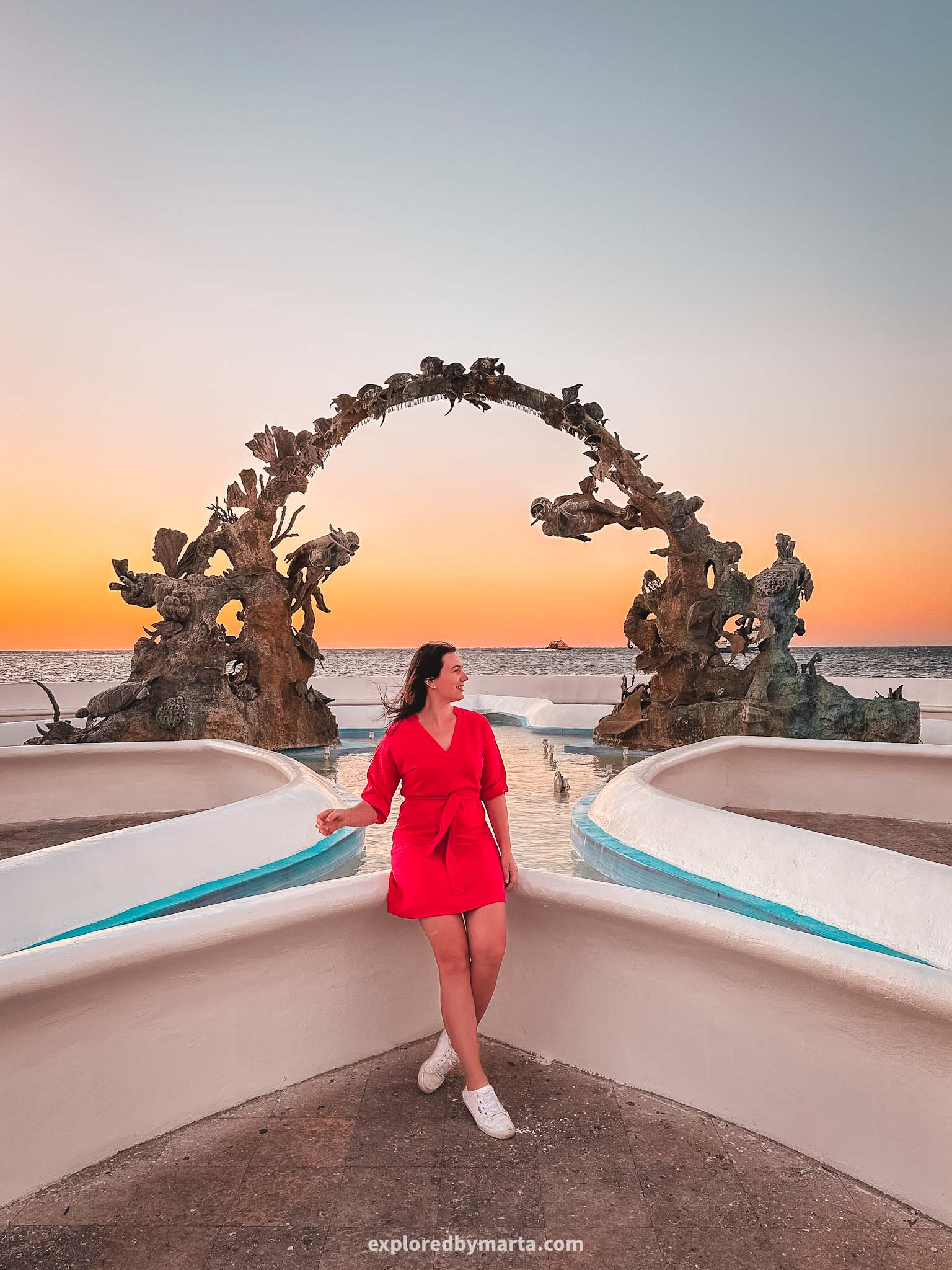

The tropical Caribbean island of Cozumel is Mexico’s third-largest island and is known for its tropical white sand beaches, lush palm trees, wild nature, delicious food, and Mayan ruins hidden deep in the jungle.
Cozumel sits just off the coast of Playa del Carmen so it is a very convenient getaway destination if you have already come to Playa del Carmen! It is a 30-minute ride by ferry.
We actually spent a full week exploring Cozumel and all its famous sights. Some of the top things to do in Cozumel include snorkeling at the Great Mayan Reef, visiting the San Gervasio archaeological zone, and spotting crocodiles in the Punta Sur Eco Park.
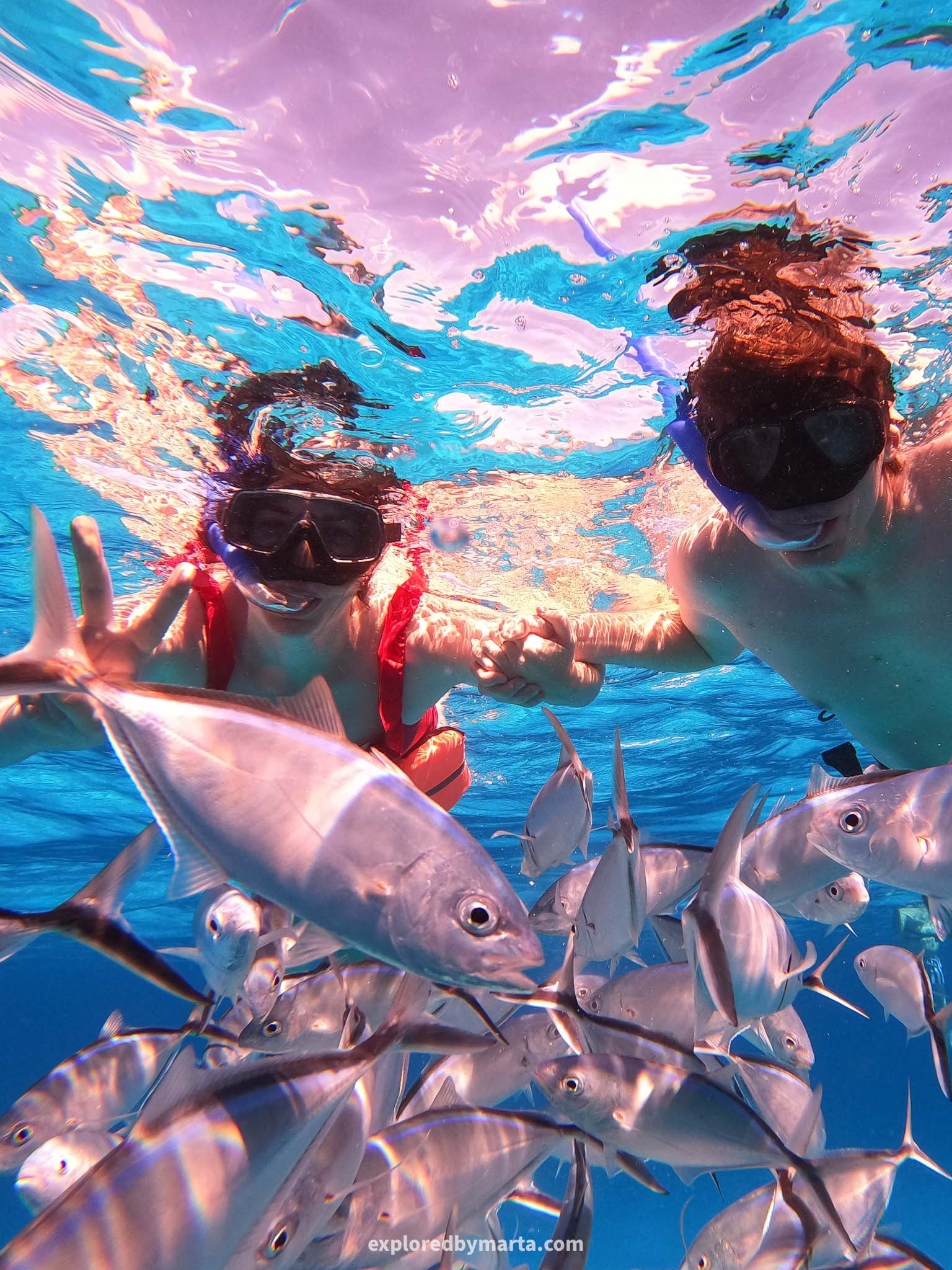
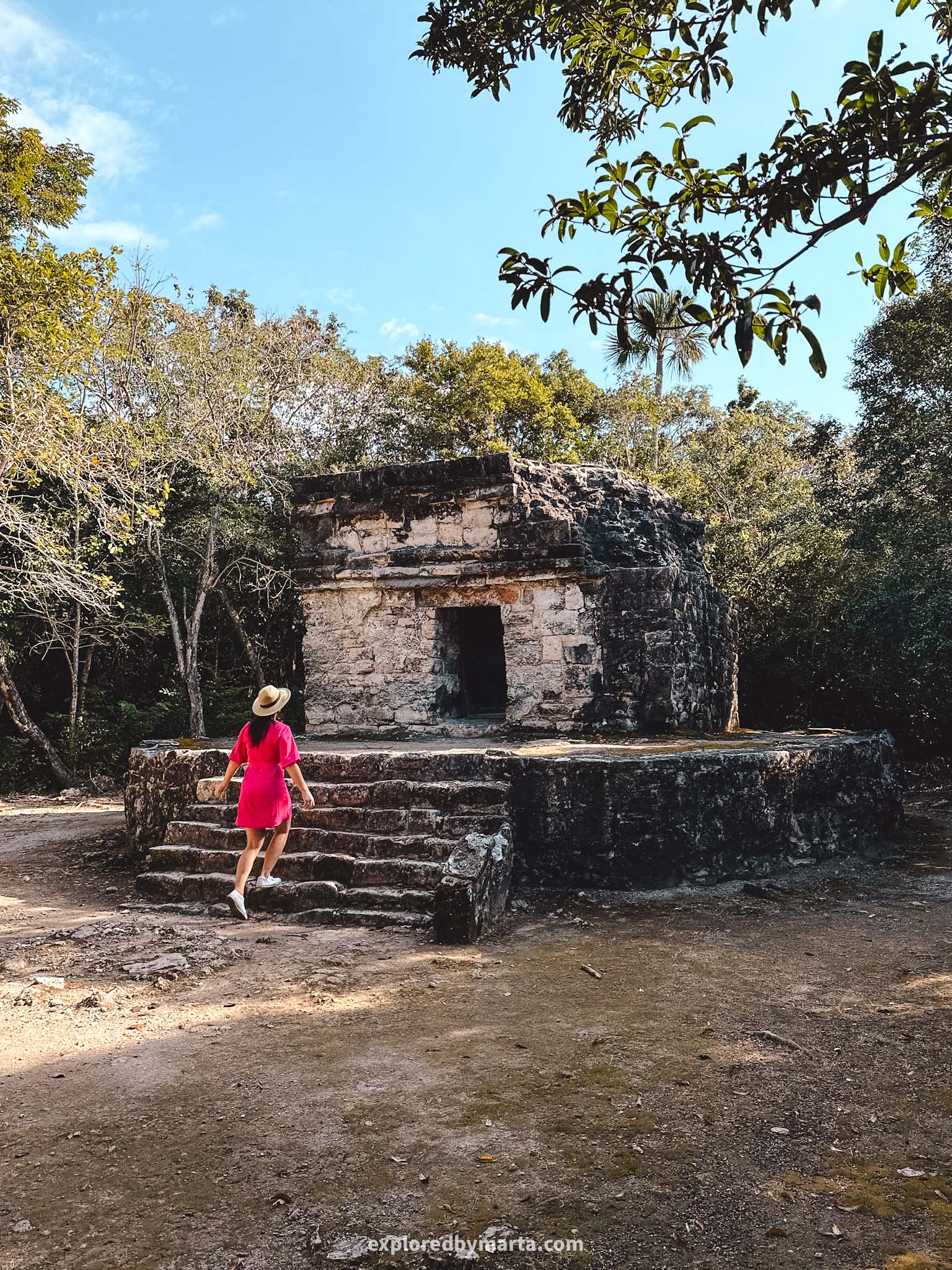
We also spent a lot of time in the capital city – San Miguel de Cozumel where we ate churros and marquesitas in Benito Juarez Park, stopped by the symbol – Cozumel Clock Tower, and watched the sunset at the promenade.
A walk along the Cozumel promenade is a must – along the way you can visit some iconic spots in the city like Coral Reefs Monument, Monumento Al Mestizaje, and Monumento a la Hispanidad.
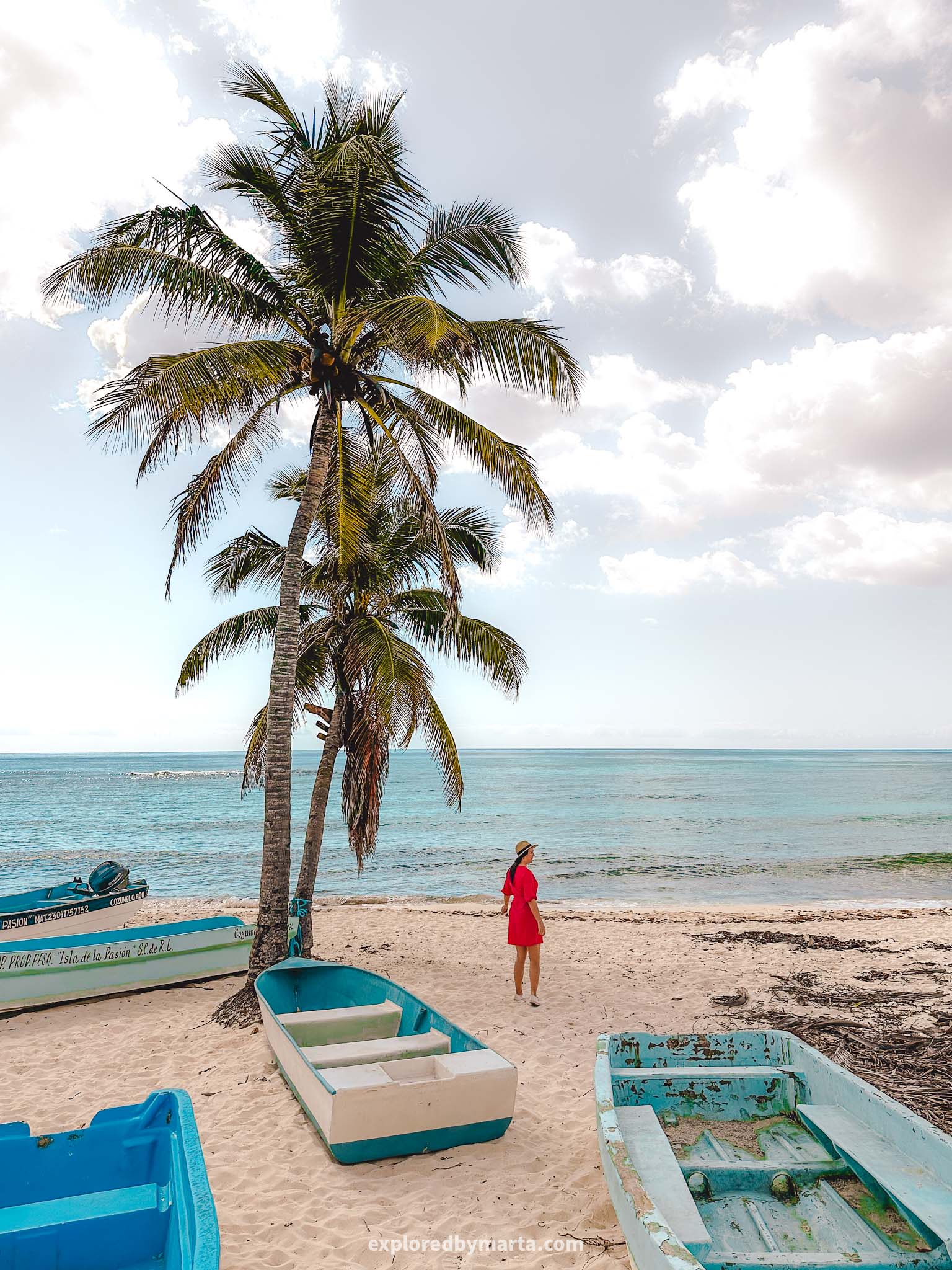
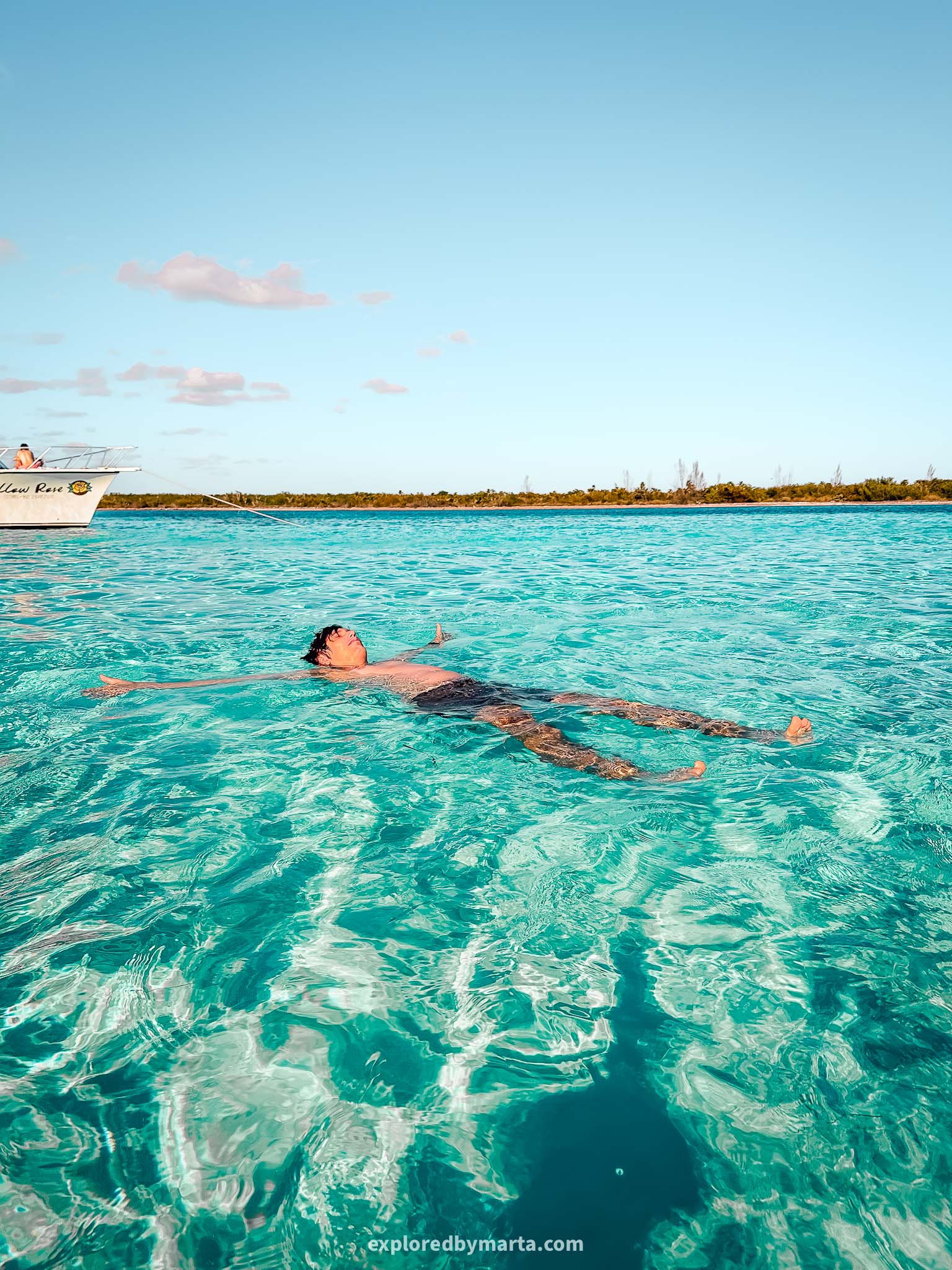
Outside the city, a must-do thing to do is renting a car (or scooter), driving around the island, and stopping by the wild East Coast and at Punta Sur Eco Park. We also did a tour in the Mayan chocolate factory and stopped by the beaches.
For a more relaxed experience, I recommend making a weekend trip here, but also a day will be full of fun if you visit the Mayan ruins, go snorkeling, eat tacos, and watch the sunset from the promenade.
Location: Cozumel
22. Cenote Calavera

Located just a 5-minute drive from Tulum downtown Cenote Calavera is not only one of the closest but also one of the most popular cenotes near Tulum and the whole Yucatan Peninsula.
It got its fame on social media thanks to its unique looks – a big circular hole in the ground with stairs and a swing. Next to the big hole, there are two smaller ones where you can jump through to get inside the water.


Calavera means a skull in Spanish and this cenote supposedly resembles one. The big hole is meant to be the mouth and two smaller ones are supposed to be the eyes. See it for yourself! There might be some truth to it!
Cenote is well maintained – there are all the facilities you might need for a day of water activities including showers, toilets, a bar with drinks, and a resting area with chairs and hammocks.


The biggest downside to this cenote is that it is rather small. There simply isn’t enough space for too many people but it does get crowded during the day. If you want to truly enjoy it then come here in the morning. It might not be worth it afterwards.
Entrance to the cenote was 250 pesos per person which is actually one of the cheapest prices amongst cenotes near Tulum. However, considering the small space for jumping into the water, it seems rather adequate.
Location: Cenote Calavera
23. Iglesia de Uayma
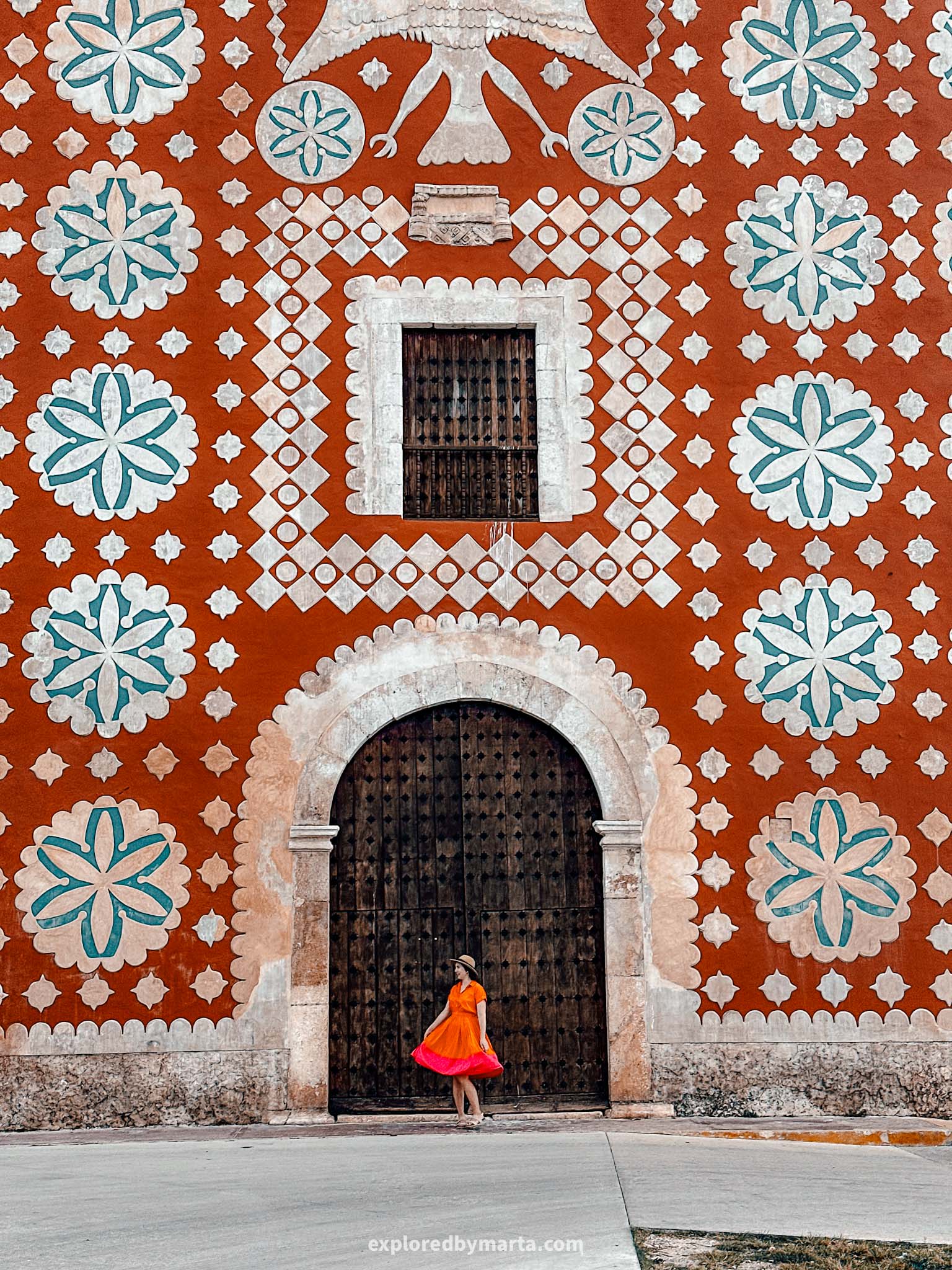
Convento de Santo Domingo in the town of Uayma or, simply, the Church of Uayma is the most beautiful church in the Yucatan Peninsula.
It is located a short drive from Valladolid and would make a perfect spot to stop by on your way to other nearby destinations like Valladolid or Chichén Itzá!
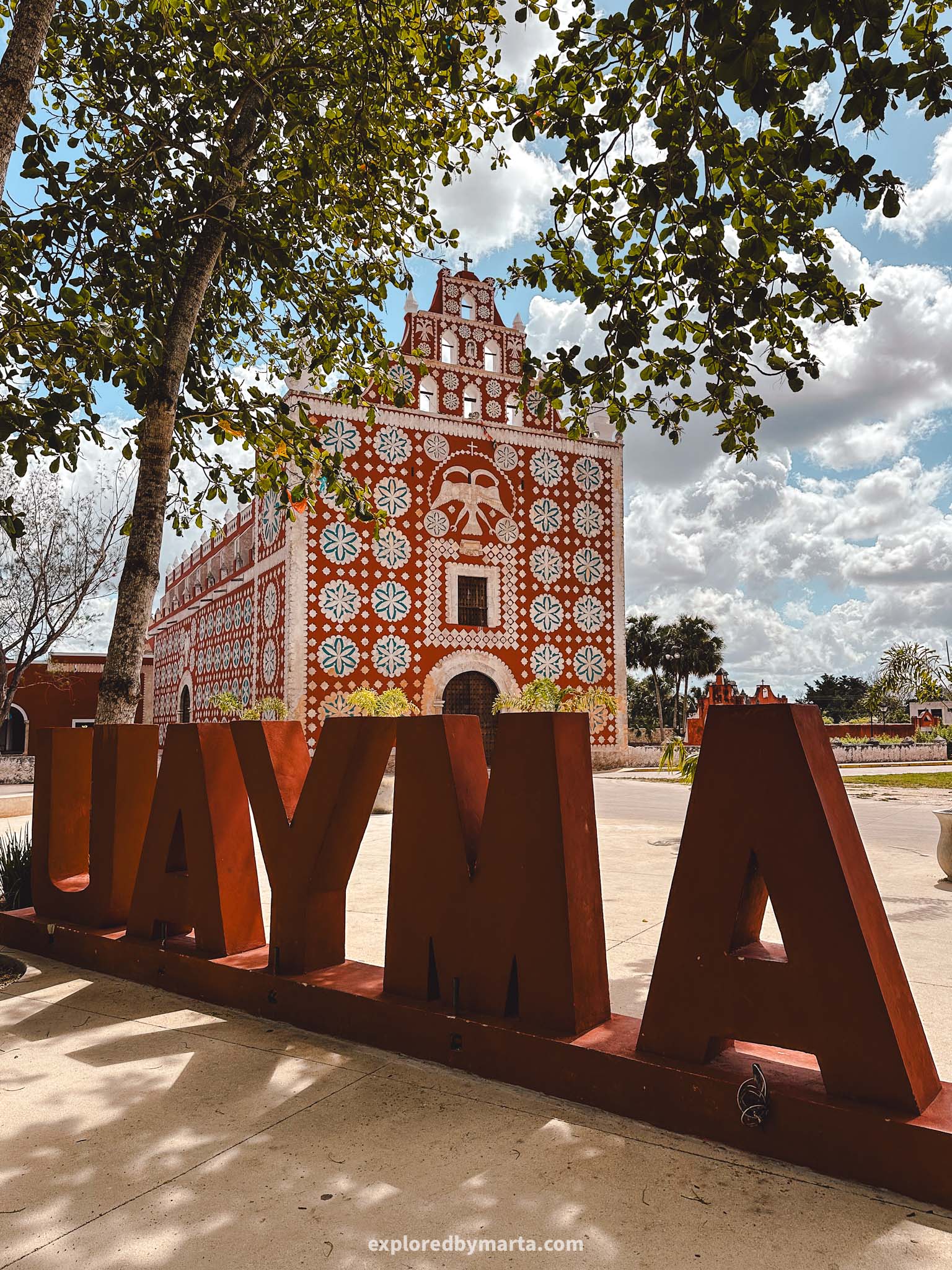
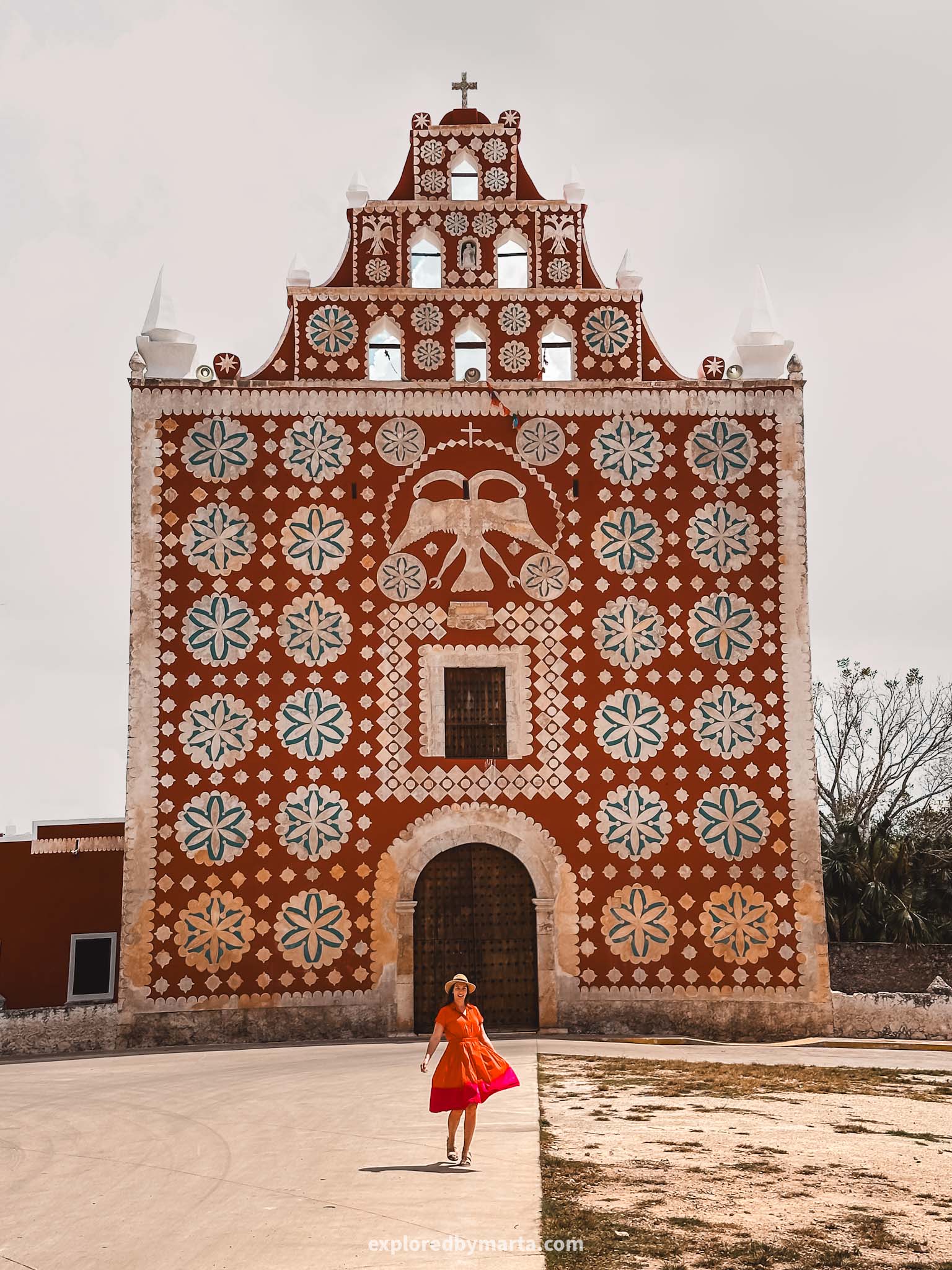
The beautiful photo-perfect Convento de Santo Domingo is a former convent built by the Franciscans in the middle of the 17th century. It was built by using stones from Mayan sites. Yes, including from the nearby Chichén Itzá!
During the second half of the 19th century, the church was burned down during a Mayan rebellion. Only more than 100 years later the roofless church was finally restored and was officially reopened to the public in 2004.
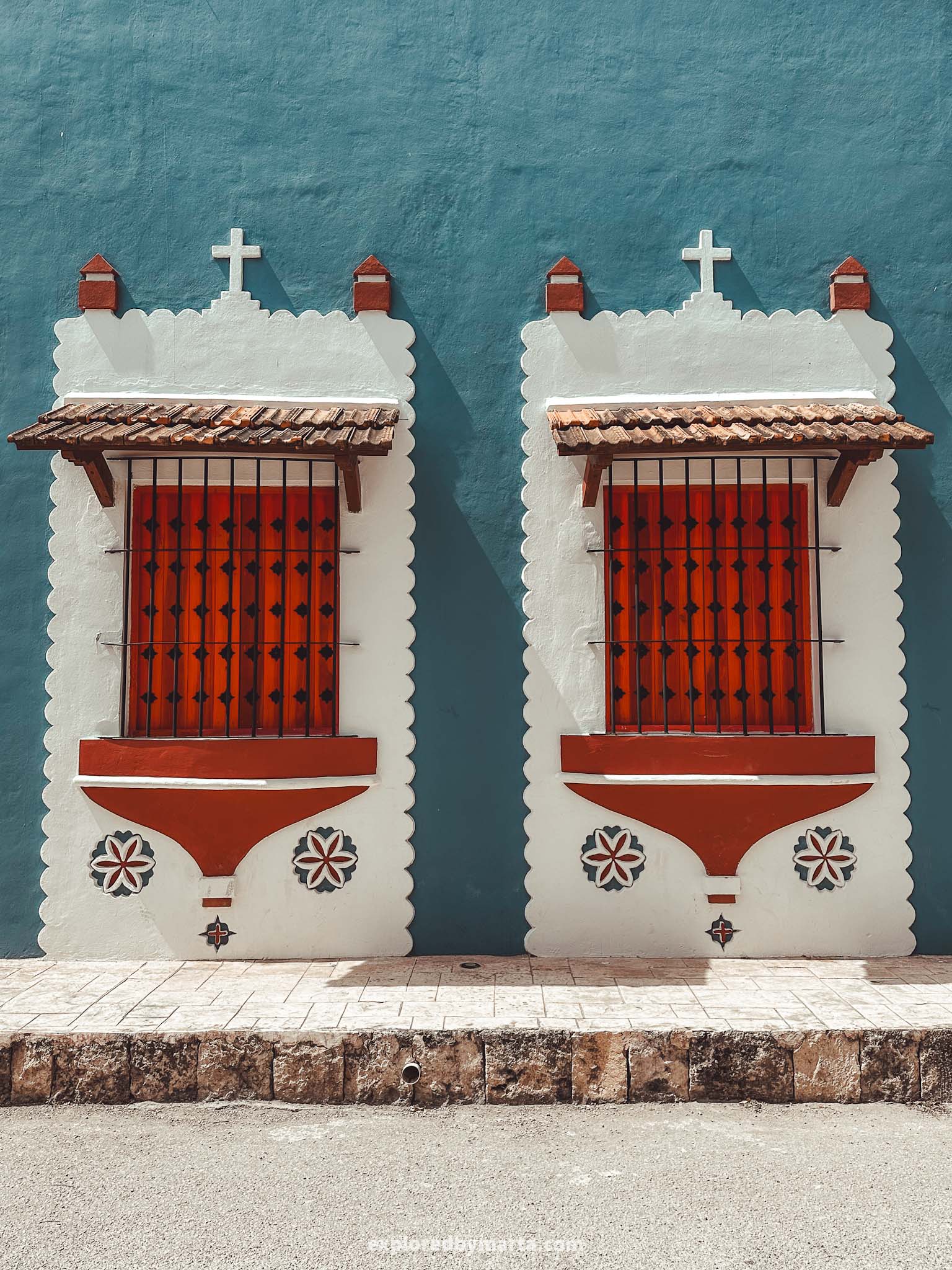
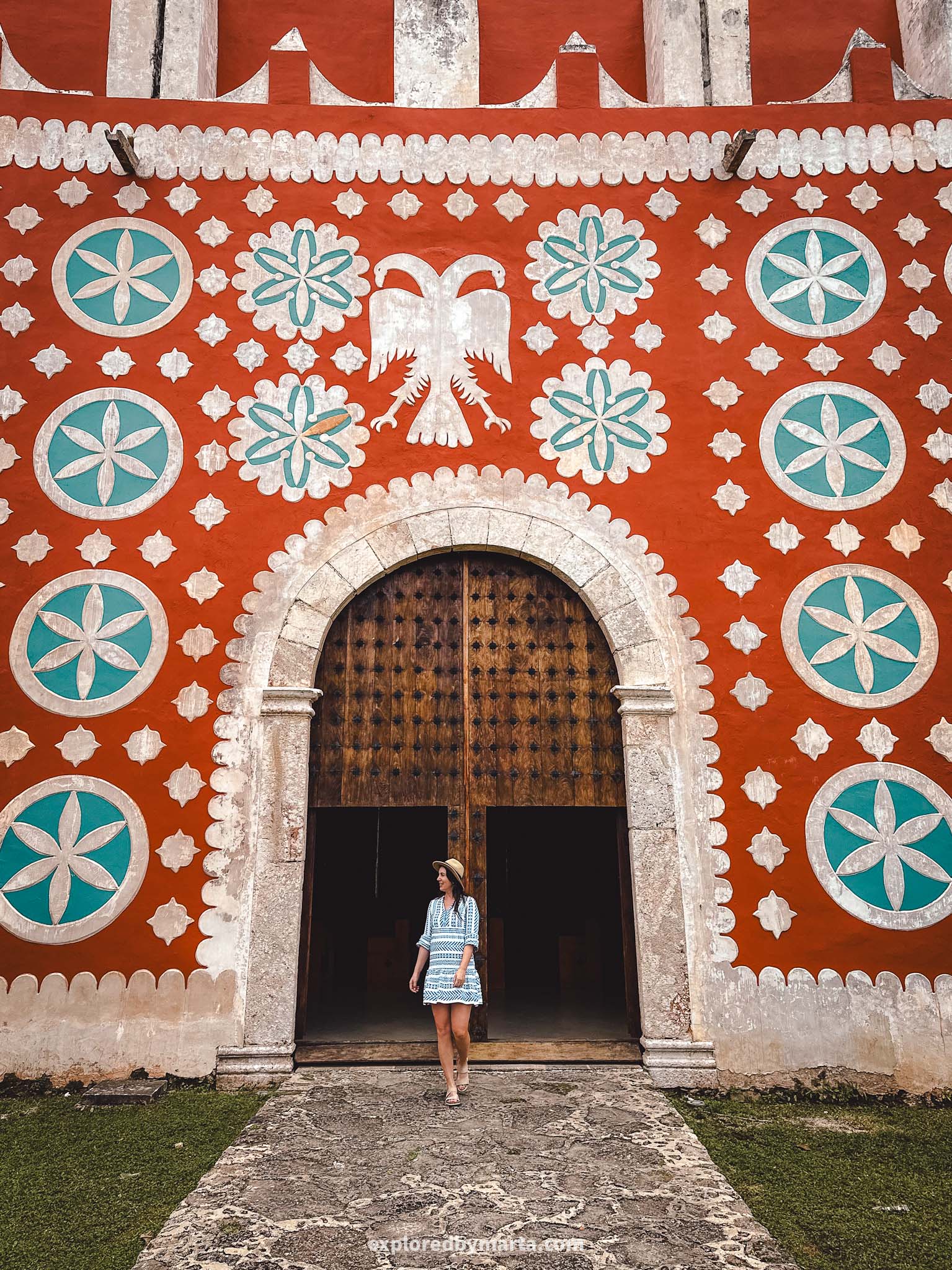
The captivating building stands out with its unusual design – the white roses and stars symbolize the veneration of the Virgin Mary but the red color represents sacrifice and martyrdom. There is also a green color that symbolizes hope.
The front of the Uayma church also depicts a large headless eagle which is a symbol of the Franciscans who built the church. Over the last few years, this church has become a unique landmark in the Yucatán Peninsula thanks to its unique design.
We visited this church on Saturday at 11 AM. It was open so we could enter to see the inside of the church for donations. Overall there isn’t much to see in Uayma so don’t plan to spend the whole day here. We spent about 2 hours here. Worth it!
Location: Iglesia de Uayma
24. Puerto Morelos
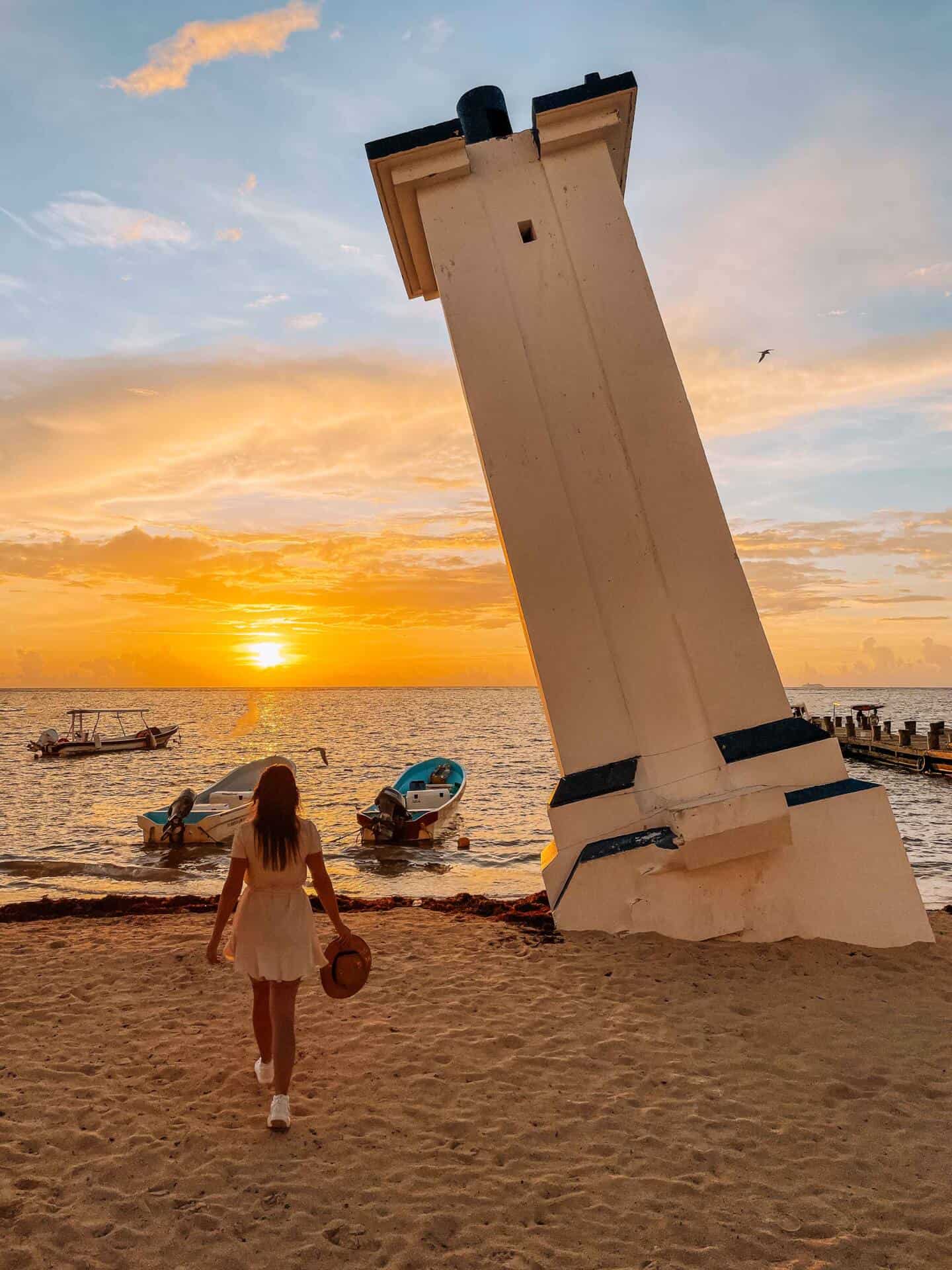
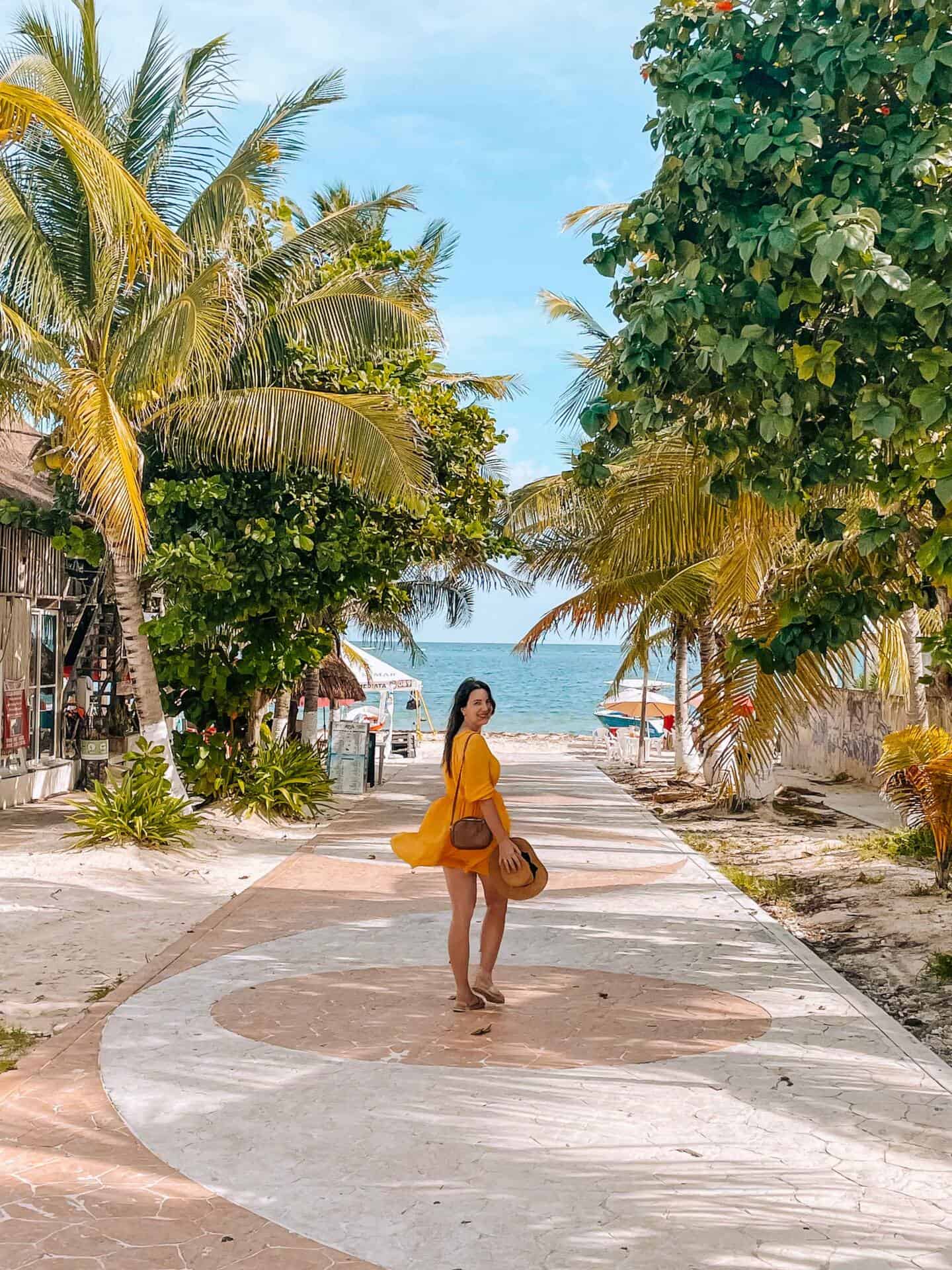
Puerto Morelos is a great destination for those looking to escape the hustle and bustle of Cancun, Tulum, or other famous destinations in the Yucatan Peninsula as this charming fishing village offers a far more relaxed and authentic experience.
One of the biggest reasons to go to Puerto Morelos is that there is a wonderful long white sand beach that is easily accessible from the town center. And not a single hotel is blocking the access to the tranquil tropical beaches.
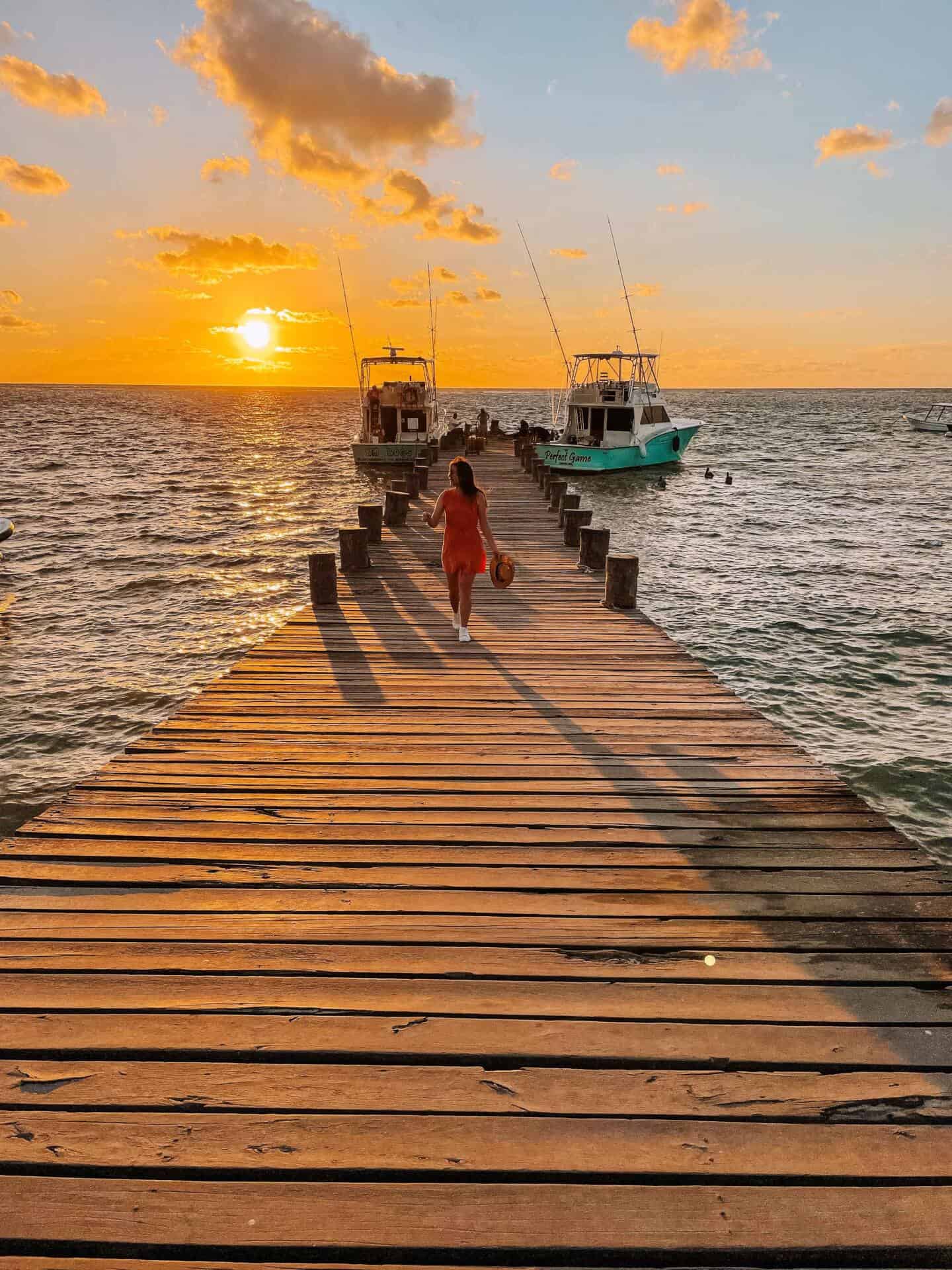
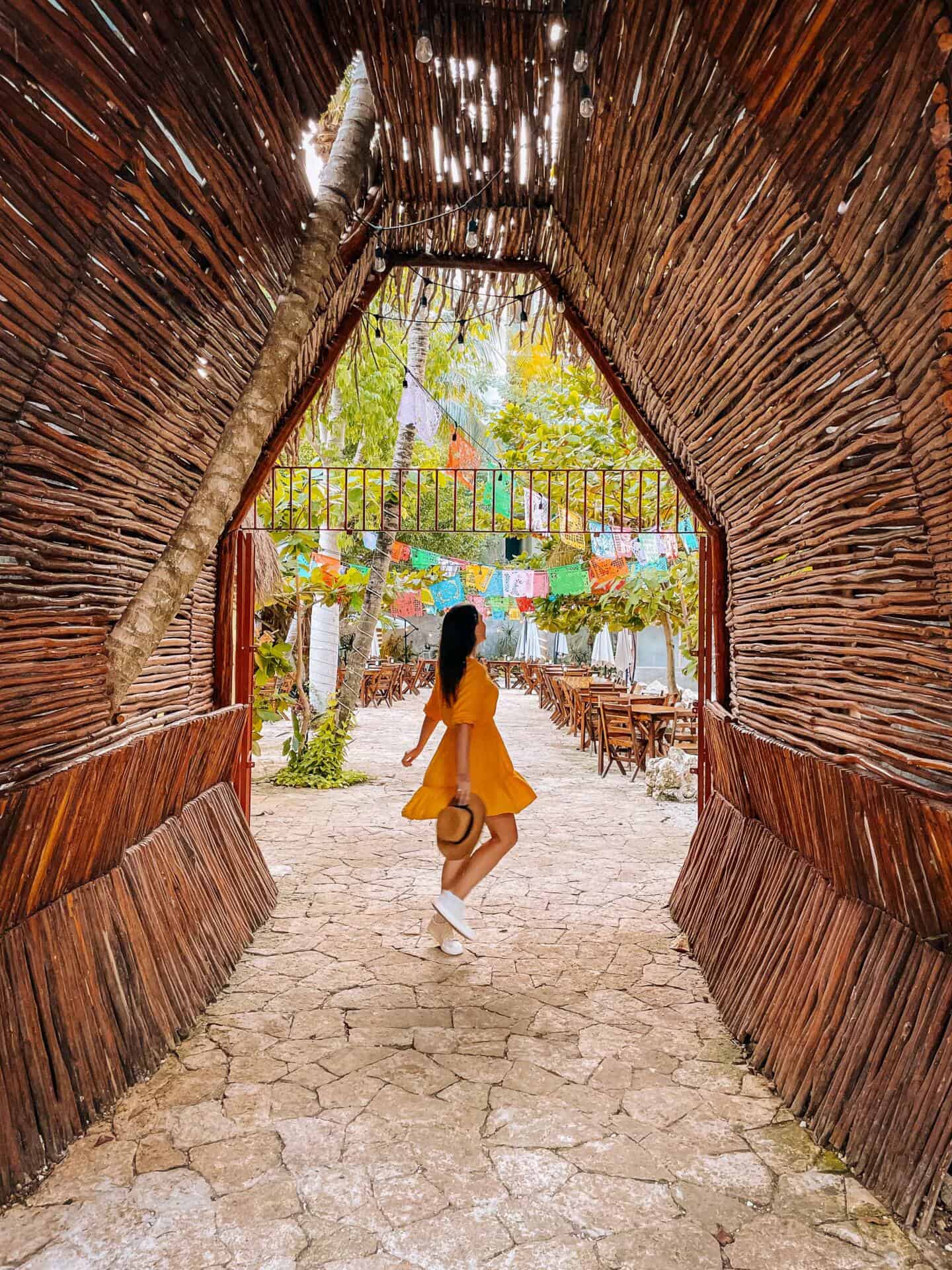
Some of the must-do things to do in Puerto Morelos include visiting the iconic Leaning Lighthouse of Puerto Morelos, checking out the local food scene, enjoying the crowd-free beaches, and a snorkeling trip to the barrier reef.
By the way, Puerto Morelos is home to the National Reef Park, one of the best-preserved stretches of the Mesoamerican Barrier Reef so this is one of the best places for snorkeling or diving activities in the whole Yucatan peninsula.
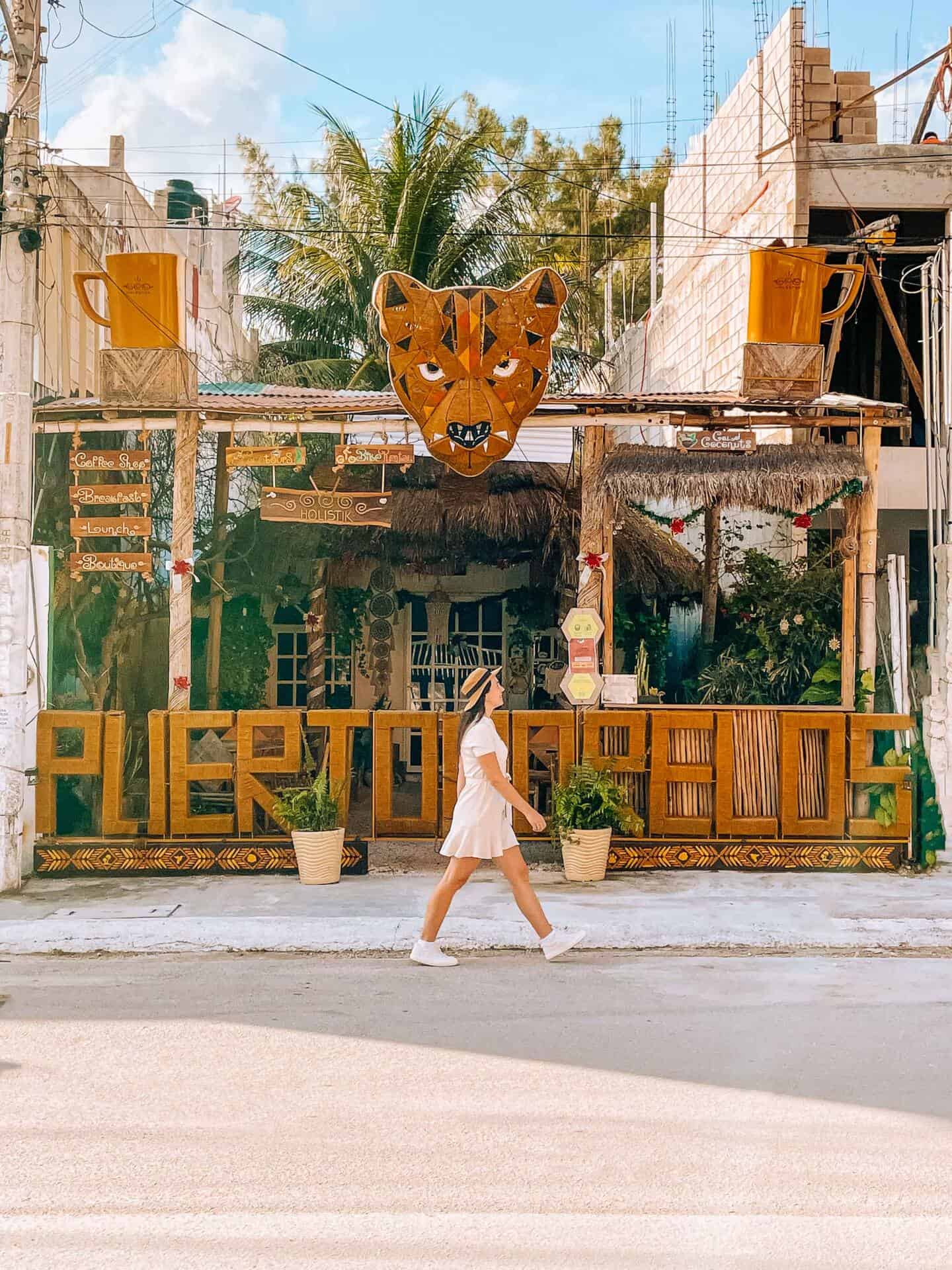
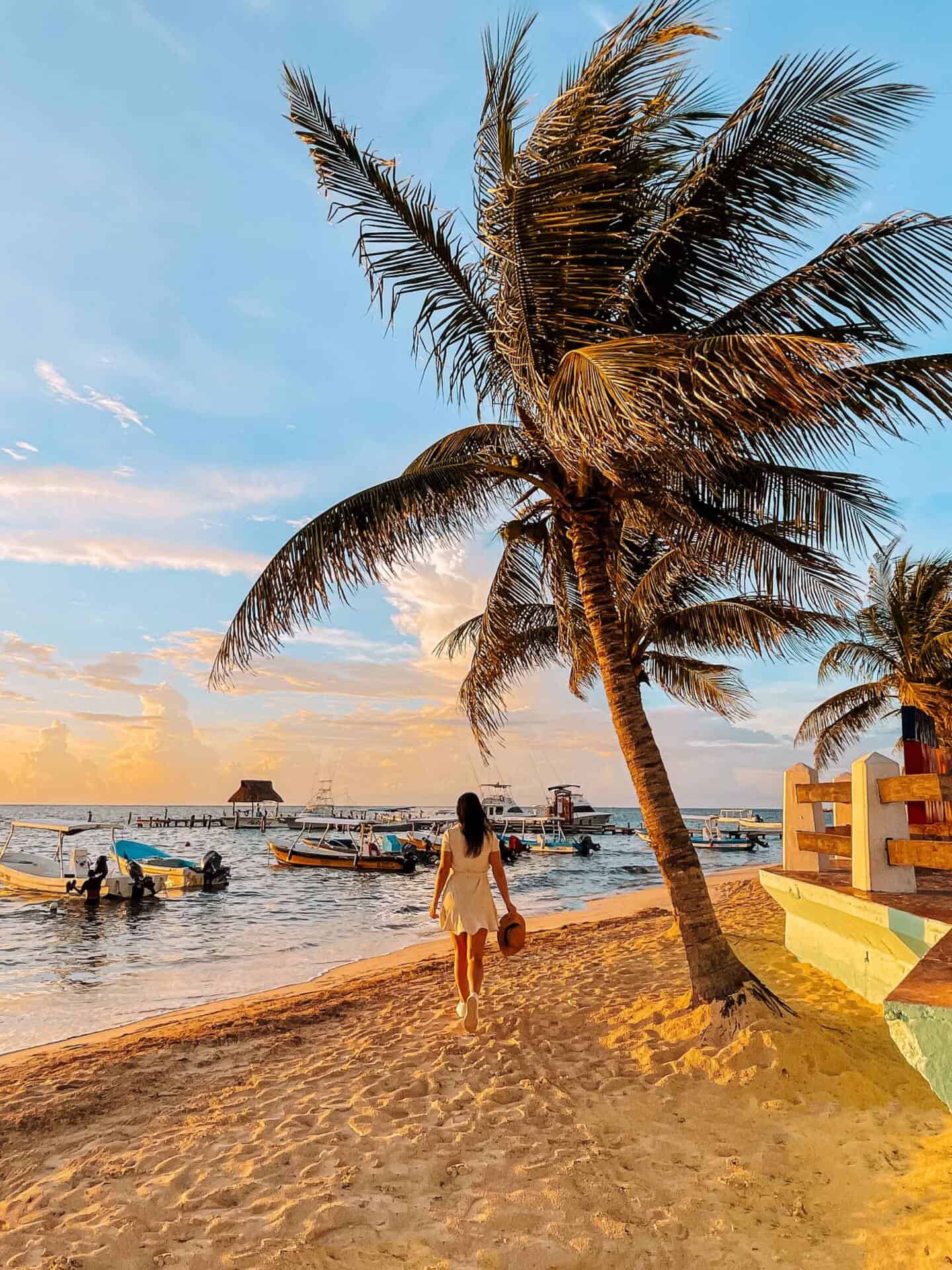
The town’s laid-back atmosphere (it really is a small town still untouched by the tourist crowds), combined with its local restaurants, artisan shops, and cultural attractions, is truly captivating and you instantly want to spend more time there.
We actually spent three whole days in Puerto Morelos. If possible, I recommend waking up early and watching the sunrise next to the iconic Leaning Lighthouse in the center of the town. It was magical!
Location: Puerto Morelos
25. Gran Cenote


Gran Cenote located just a 10-minute drive from the center of Tulum downtown is one of the closest cenotes to Tulum. And over the years it has become one of the most popular cenotes in the Yucatan Peninsula.
The beautiful Gran Cenote boasts gorgeous turquoise water and different swimming areas all connected in one big crystal clear pond. There is one part out in the open, but there are also two cave tunnels that lead to other swimming areas.


Here comes the best part – there are small turtles that live inside the cenote! Part of the cenote is restricted where you are not allowed to swim, because turtles usually live there. But sometimes they wander off and I got to swim together with a turtle!
Another great thing about Gran Cenote is that a life jacket and snorkeling gear are included in the price, which comes in handy if you wish to explore the see-through water. You must shower (and wash your hair!) before swimming.
Also – life vests are mandatory when swimming in the cenote!


Entrance to the cenote was 500 pesos per person. We visited more than 30 cenotes around the Yucatan Peninsula, and this was the most expensive cenote out of all, but this is what you get near Tulum – prices are quite steep.
Is it the most beautiful cenote ever? No. But it is beautiful enough to be worth a visit, especially if you are staying in Tulum and are short on time. But come here in the morning before the crowds!
Location: Gran Cenote
26. Celestún – home to a thousand pink flamingos
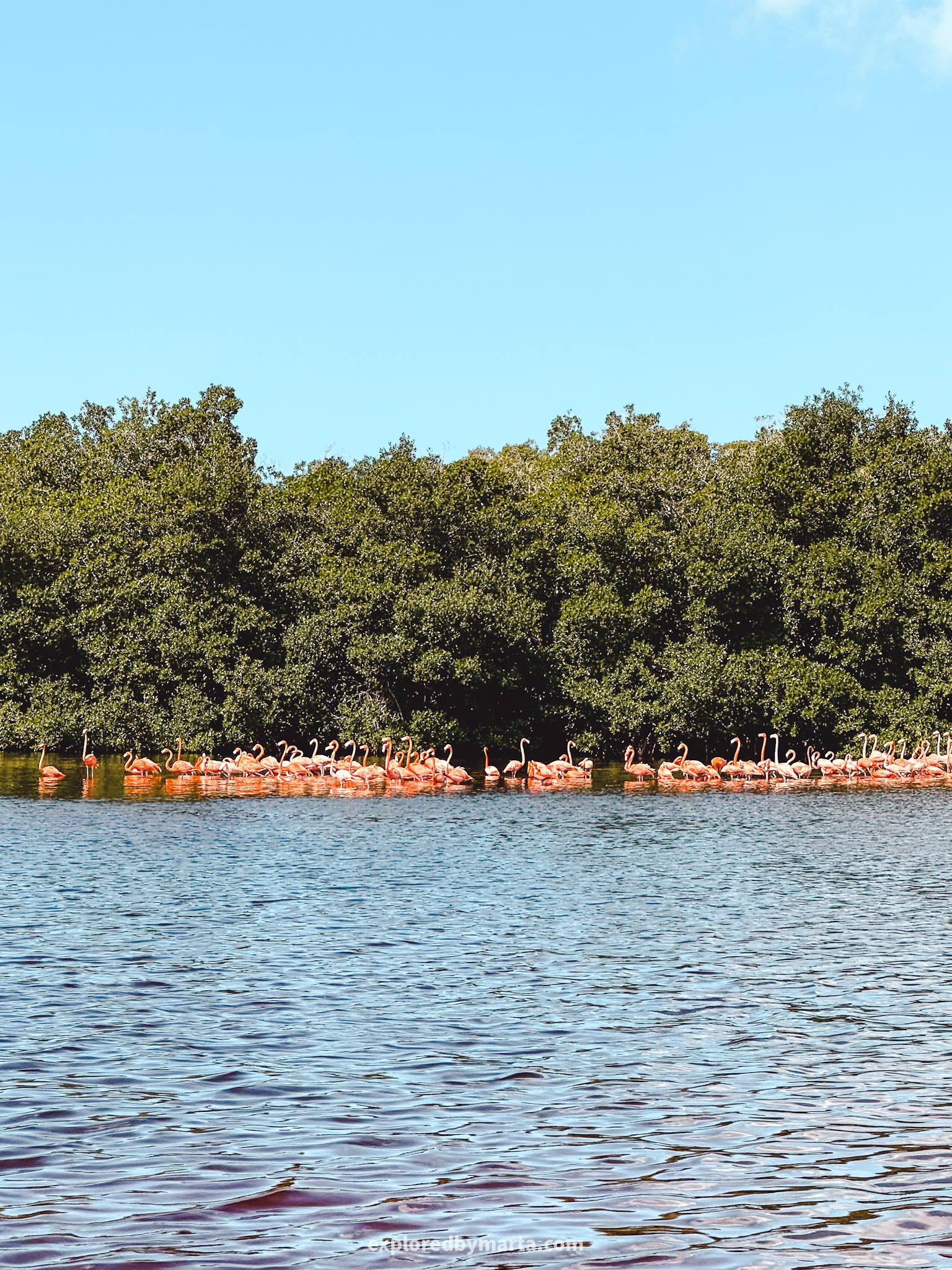
Seeing pink flamingos in the wild is a bucket list thing to do in the Yucatán Peninsula! The main spots to see flamingos in the Yucatán Peninsula are Rio Lagartos and Celestún. We chose to go to Celestún during our three-week stay in Merida.
Flamingos live in the Yucatán Peninsula all year long but the biggest hordes of flamingos you might see from November to February during their mating season. We visited Merida in January so we rented a car and went to Celestún to see them.
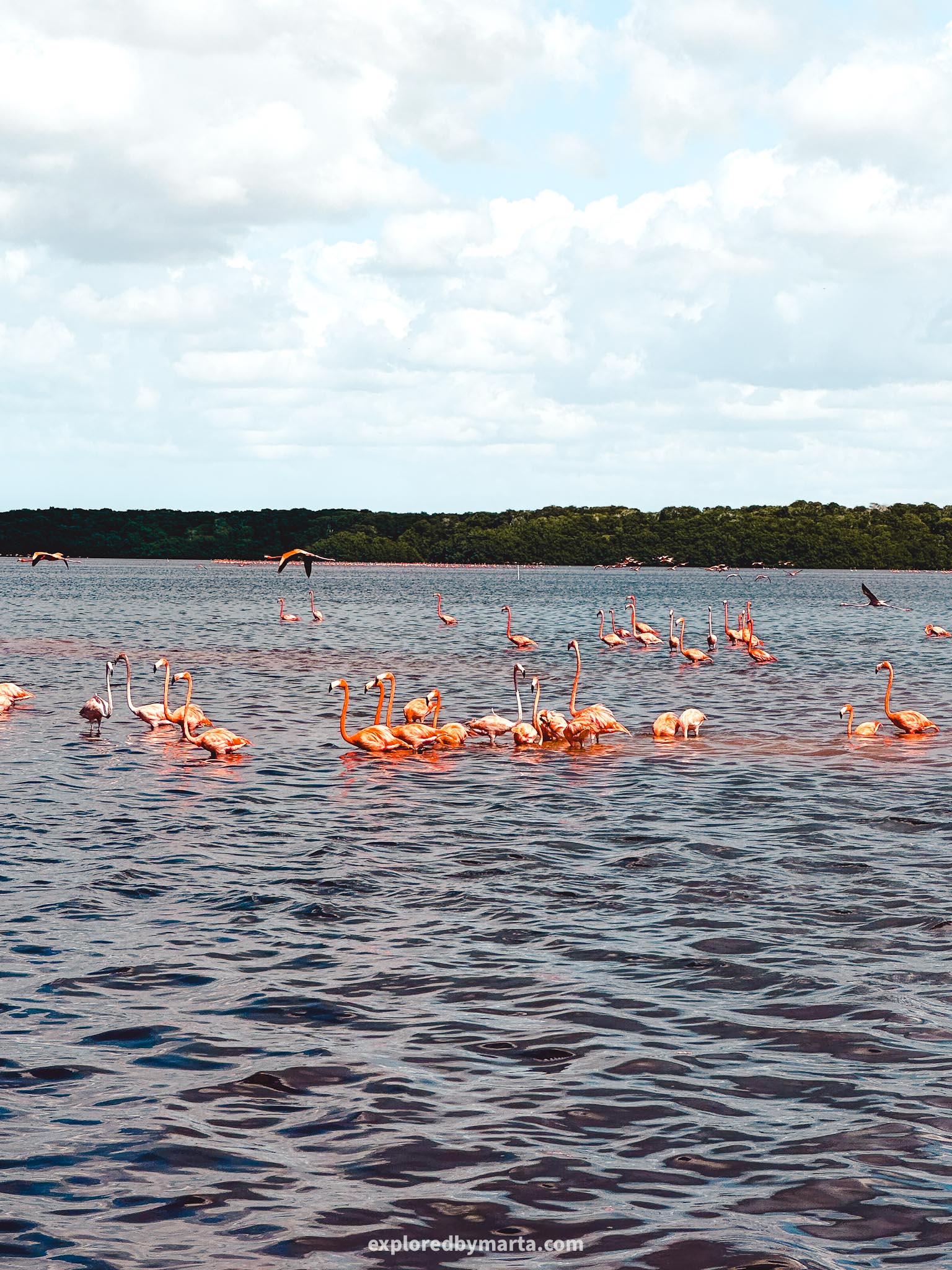
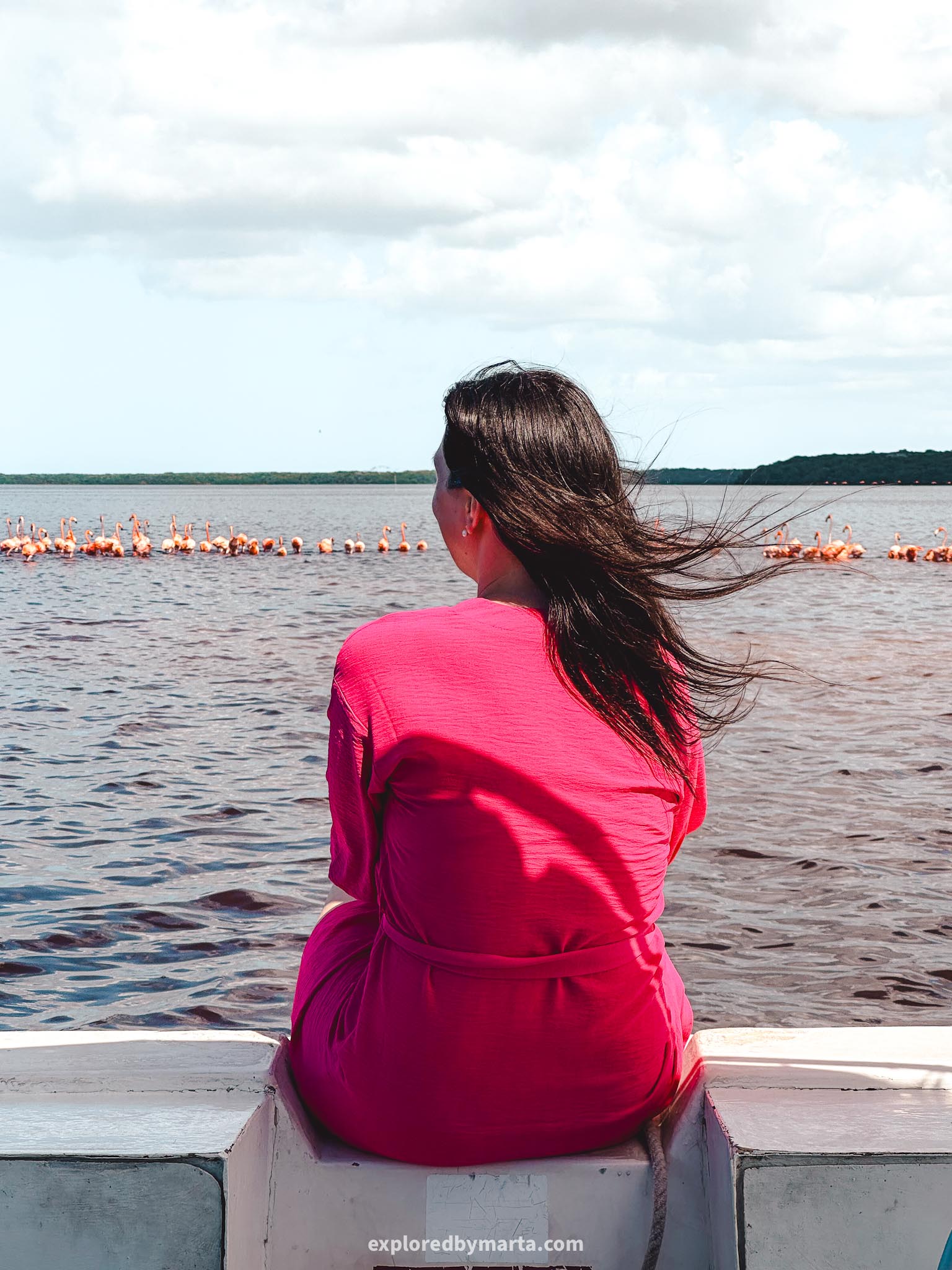
Flamingoes live deep in the Ría Celestun Biosphere Reserve so you need a boat to get to see them. For that, you have to drive to Parador Turístico Celestún boat dock where they offer boat tours to see the flamingos.
When we visited, the cost for a small boat was 3000 pesos (~180 USD) and they allowed up to 6 persons on a boat. We wanted to split the cost so we found other tourists to share a boat but you can also go on your own.
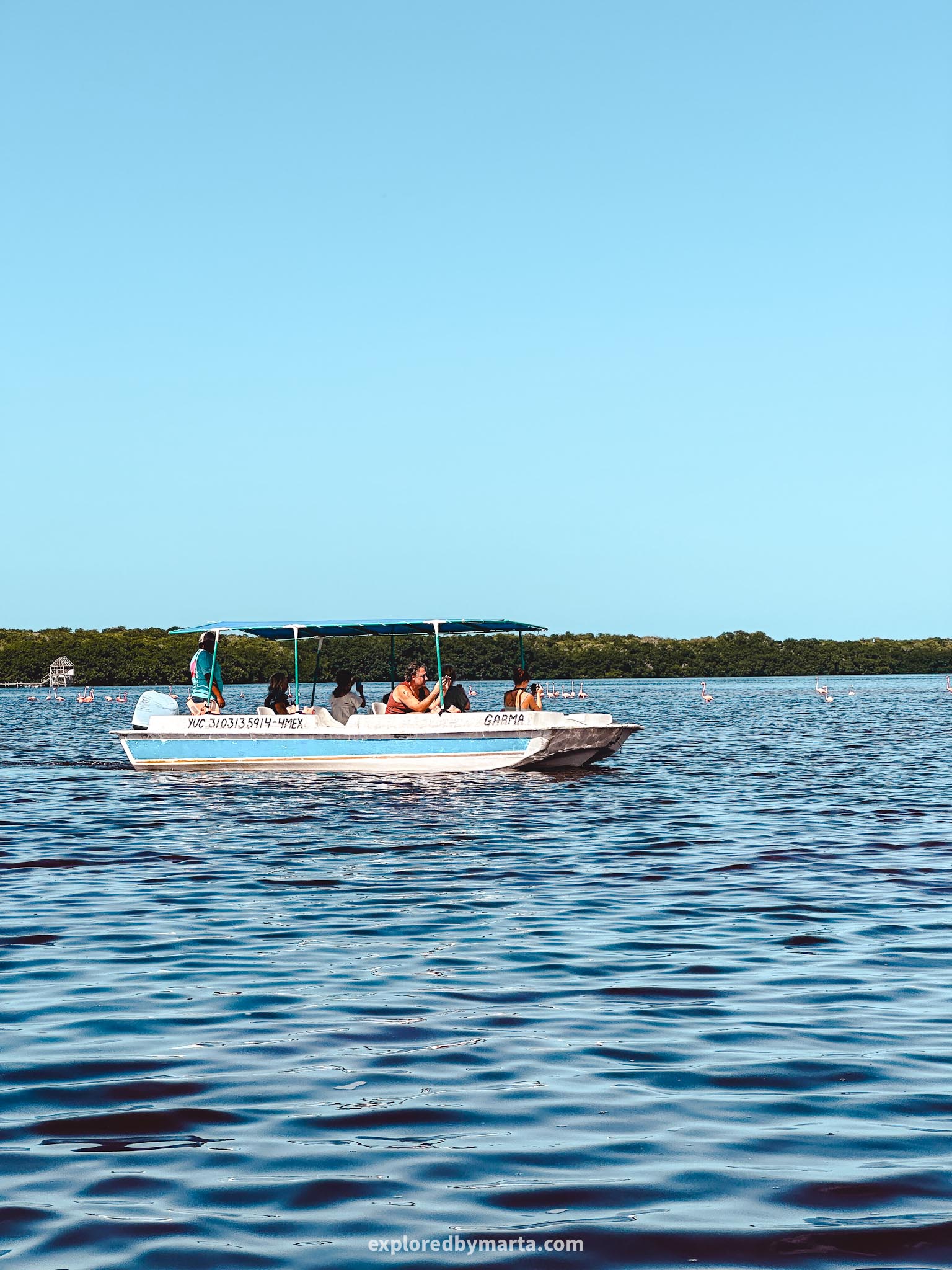
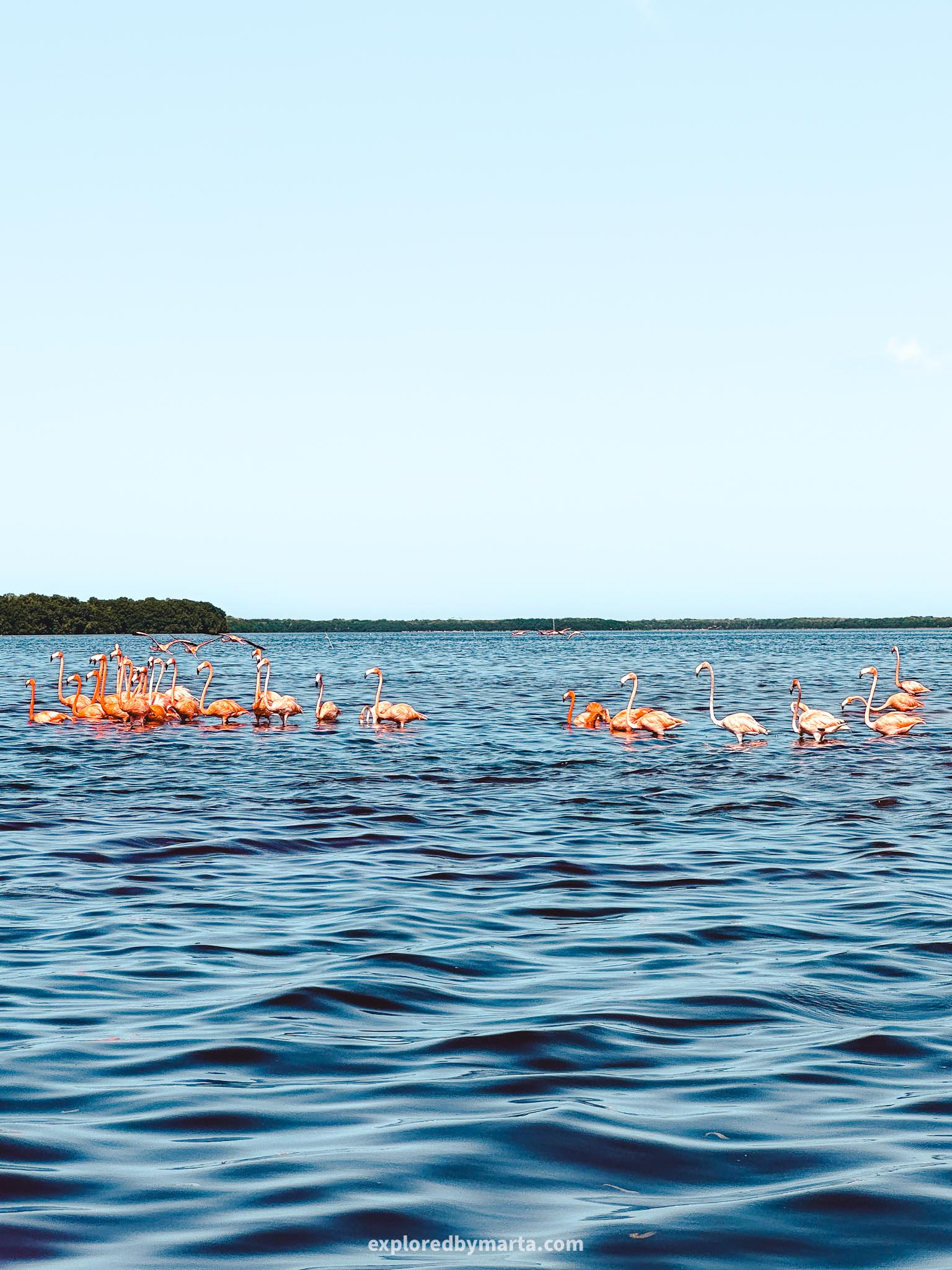
I recommend arriving sometime between 10 AM and 2 PM for the best chances to share a boat with others. We arrived at 12:15 PM and there were quite a few people already so it was easy to find a company. It was cash only!
The boat tour lasts about 1h to 1h 30min. They take you deep into the river and stop the boat near the flamingos. We saw thousands of them! Then they take you through a narrow mangrove tunnel to a beautiful cenote where you can swim.
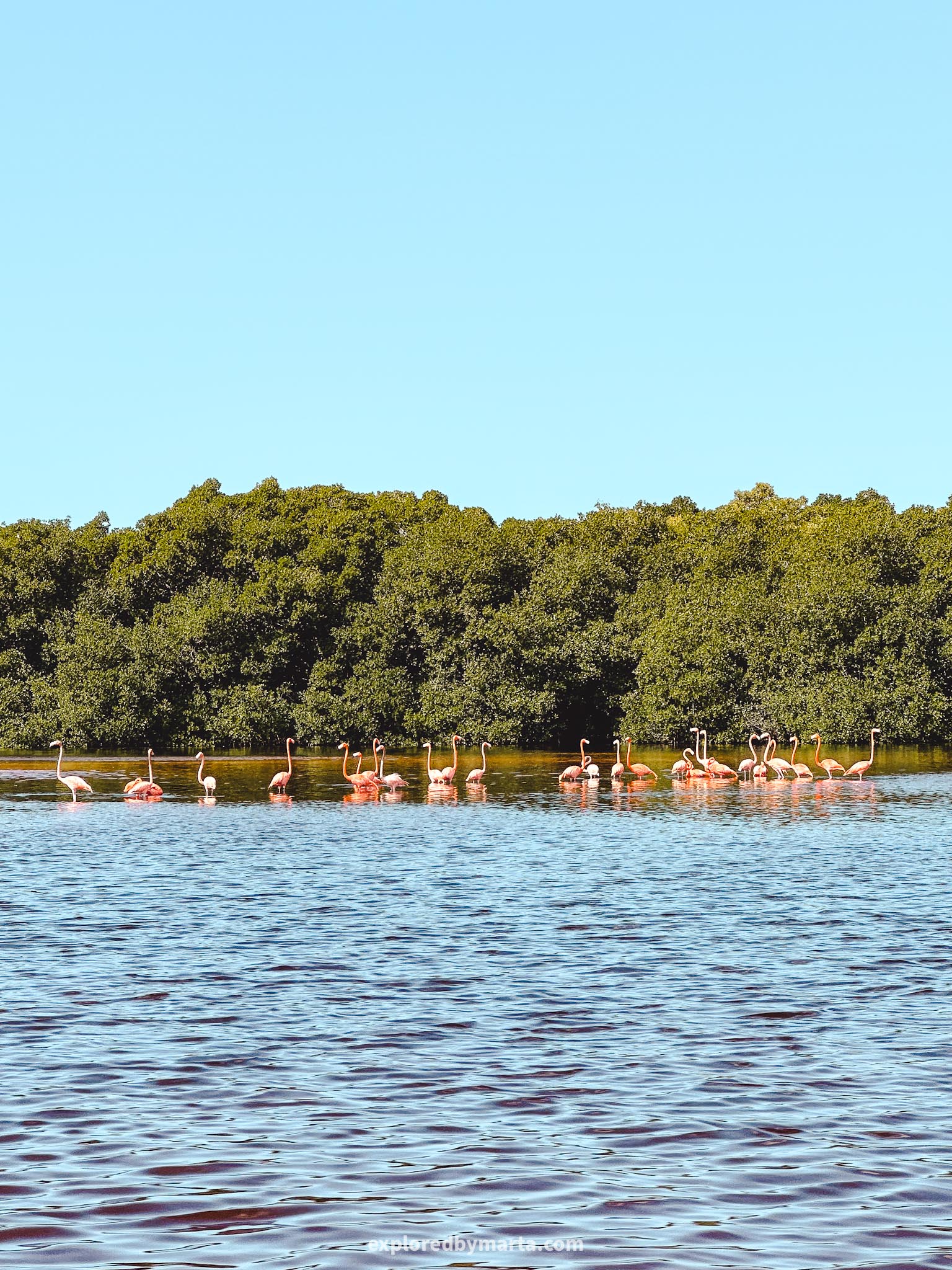
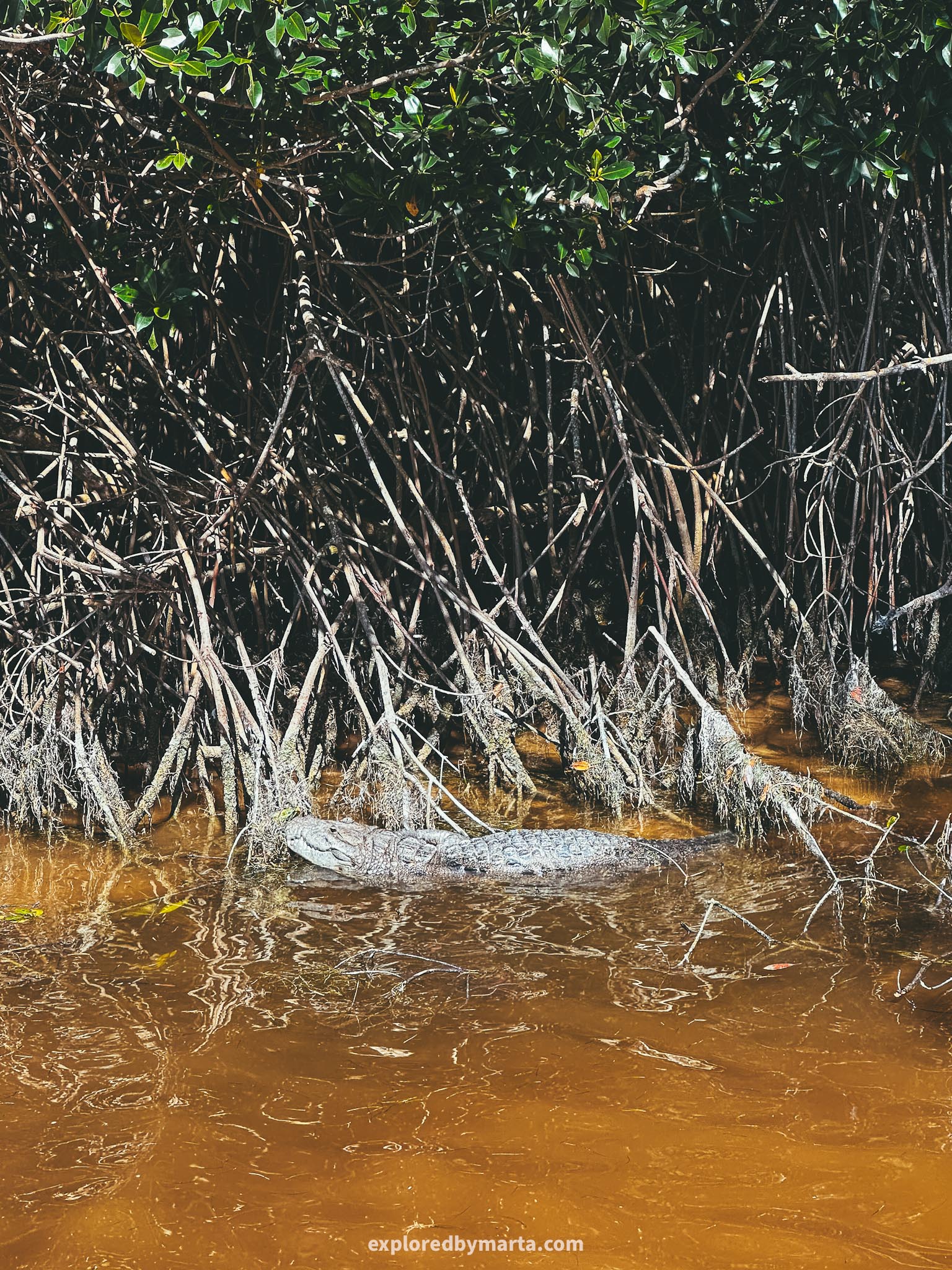
While we were there some of our group went for a swim in the cenote only to find a small crocodile nearby the cenote, haha! Luckily it looked like it already had lunch and wasn’t interested in us at all. This was a fun trip and worth the price!
After the boat trip, we drove to the beach of Celestún – Playa Sur Celestún. It is a gorgeous white-sand beach with blue water. Visiting the pink flamingos in Celestún was one of my favorite Merida day trips!
Location: Parador Turístico Celestún
27. Ring of Cenotes Geohydrological State Reserve
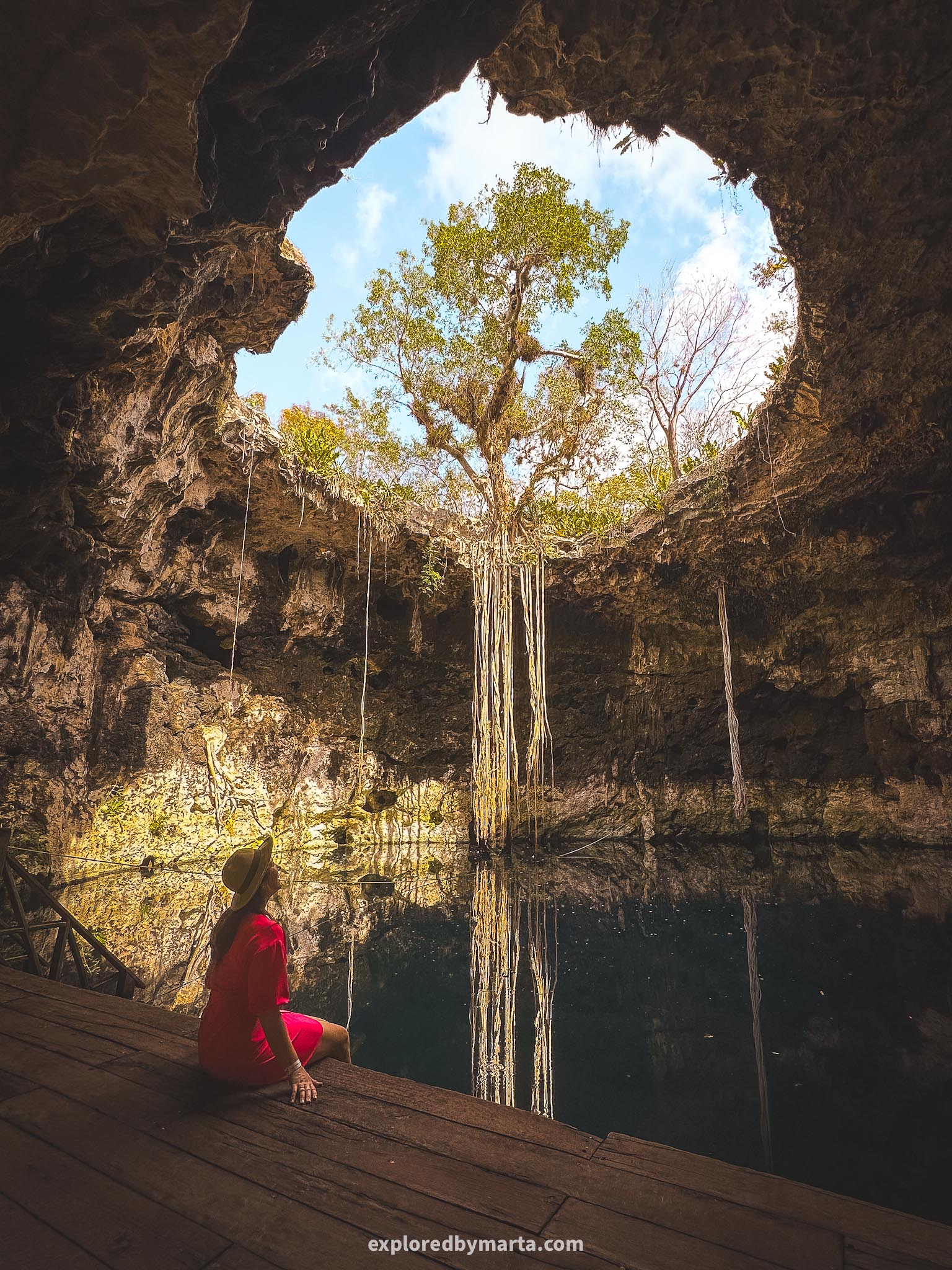
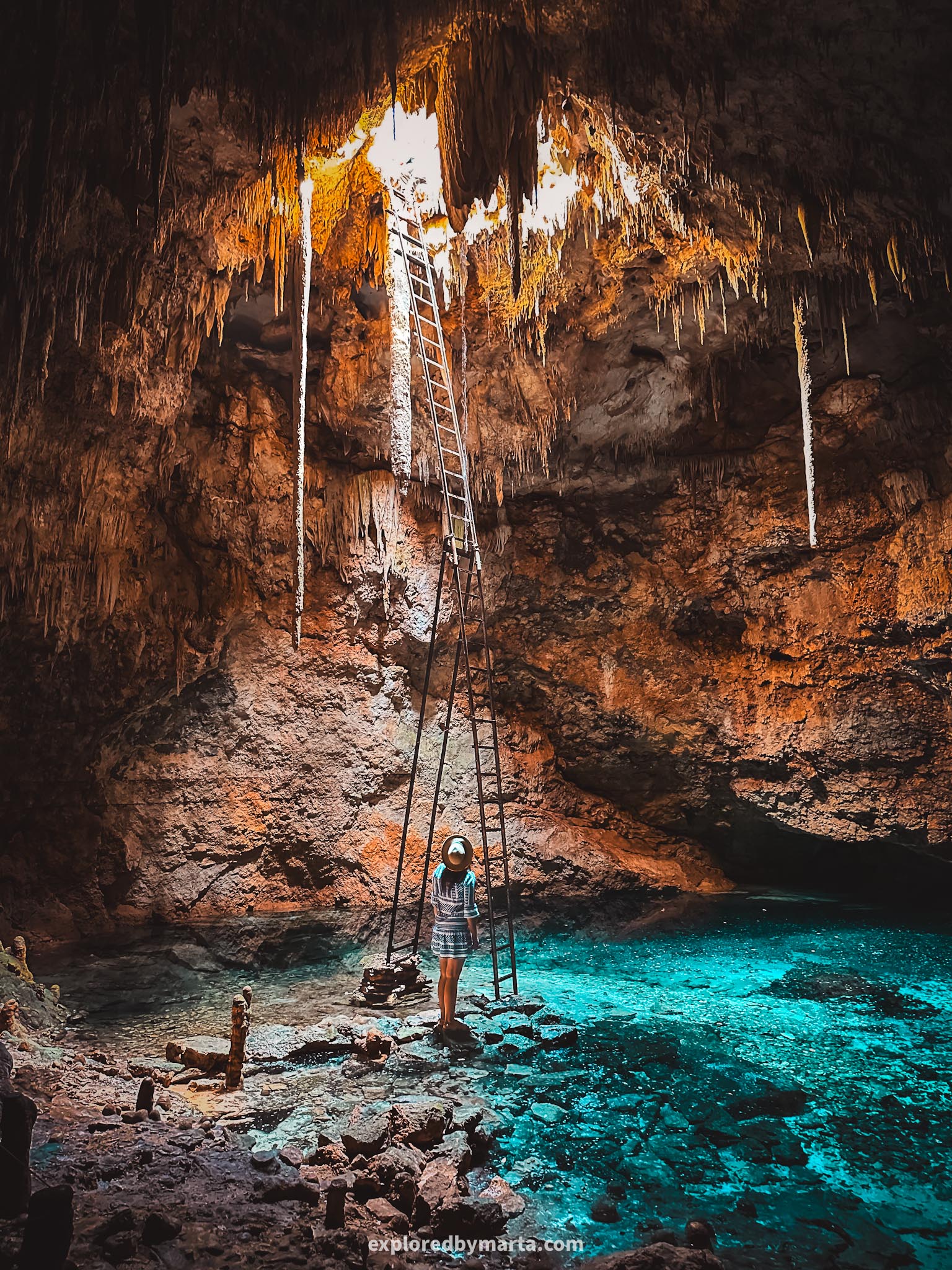
One of my favorite trips was to the Ring of Cenotes Geohydrological State Reserve near Merida to explore the famous cenotes – water-filled natural sinkholes in the ground. The turquoise waters blew my mind!
This unique area features some of the most beautiful cenotes near Merida. Most of them are located around Cuzamá and Homún municipalities just a 1 hour drive from Merida. We had a rental car but you can also go there by bus or colectivo.
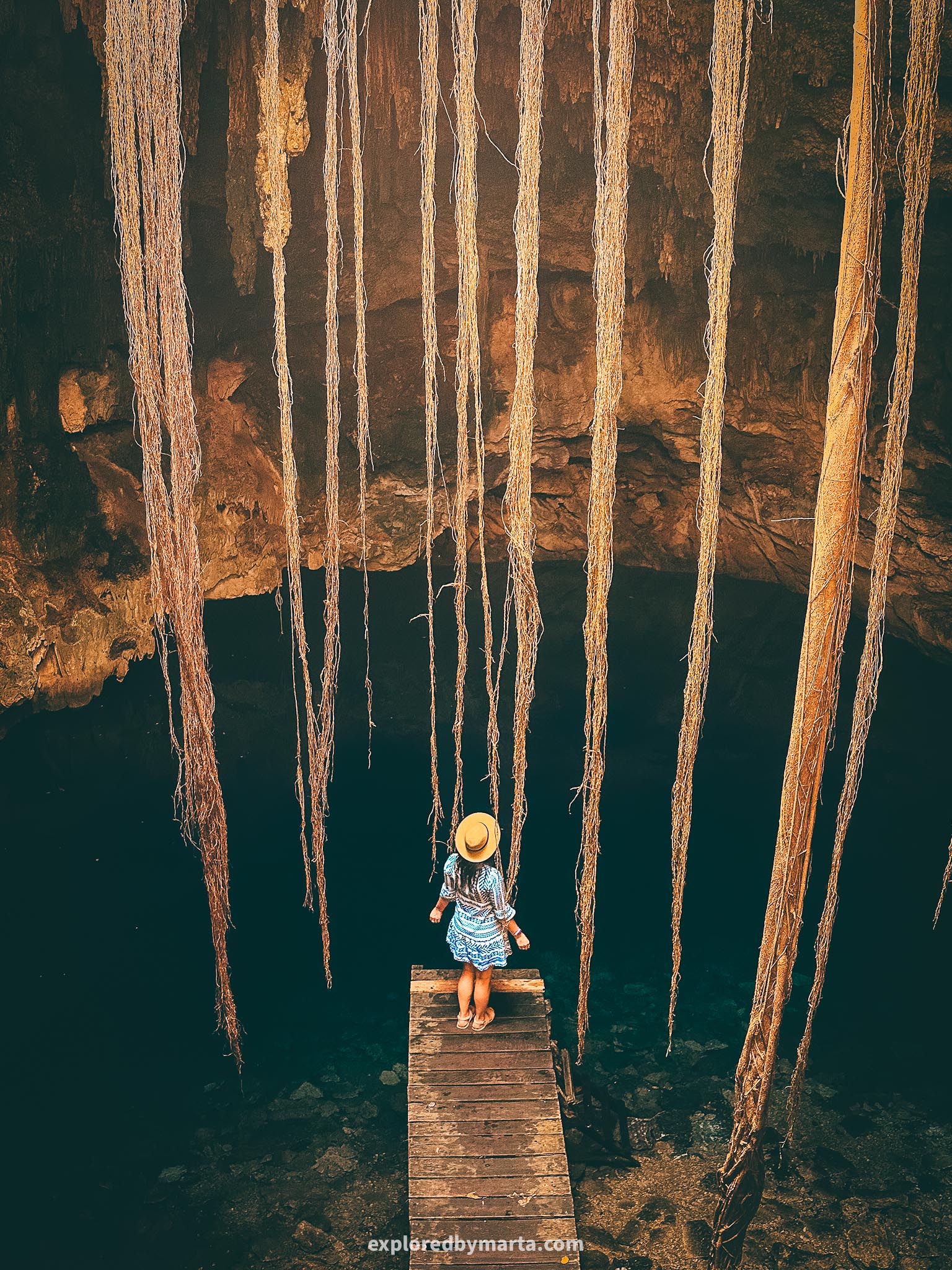
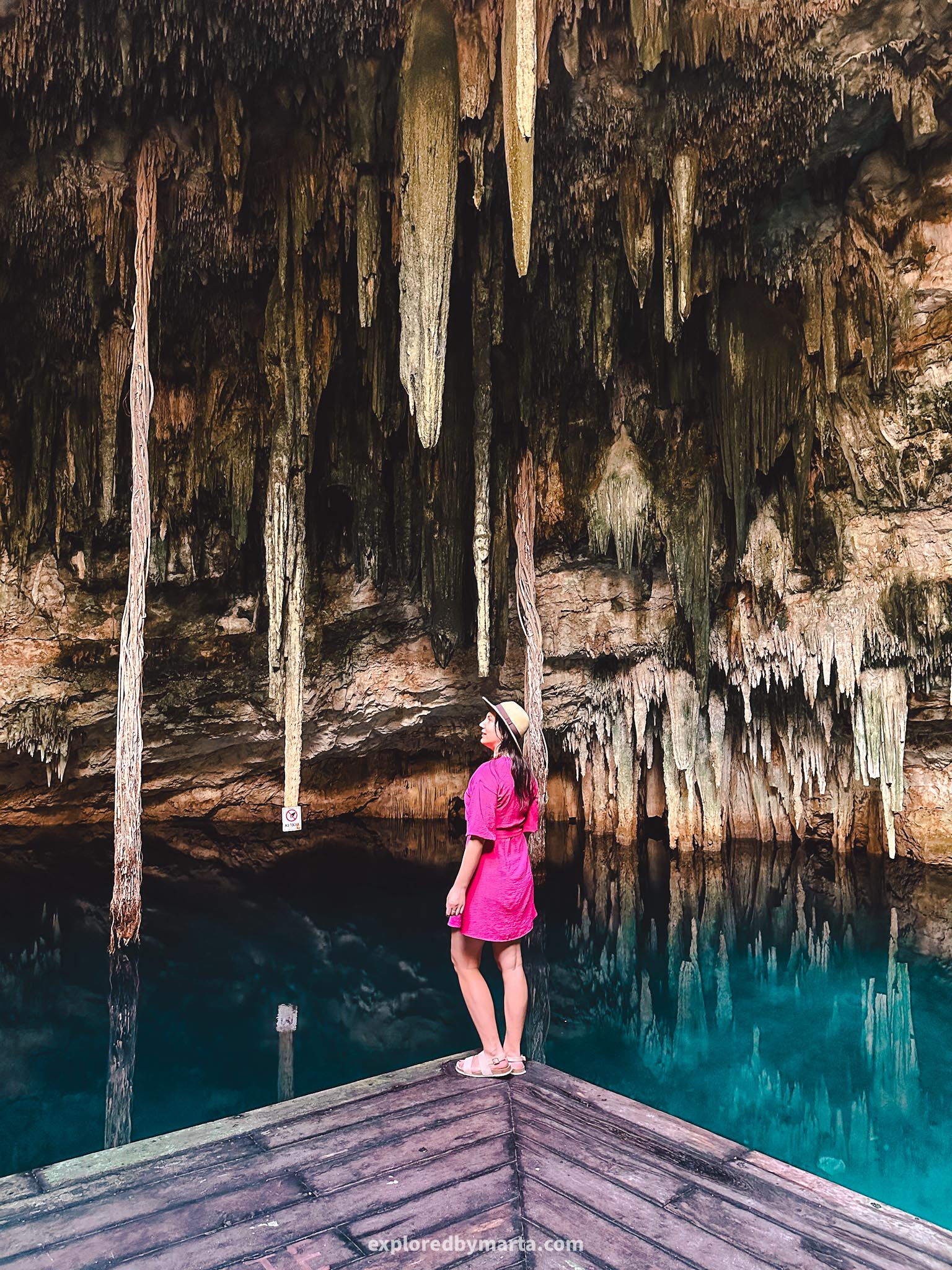
If you go by car then you can freely choose the cenotes you wish to visit. I recommend the three Cuzamá cenotes where you travel into the jungle by a horse-drawn rail cart or the three Santa Barbara Cenotes in Homún. See more cenotes near Merida here!
If you are not sure you want to drive on your own, you can join a guided tour from Homún or Cuzamá (you will see guides everywhere on the streets) and travel to cenotes by a moto taxi with a guide. Oh, and bring cash!
Location: Ring of Cenotes Geohydrological State Reserve
Happy exploring!
Mexico’s Yucatán peninsula is one of the top travel destinations around the world. It offers a balanced mix of tasty food, a tropical climate, Mayan culture, gorgeous beaches, secret cenotes, ancient ruins, and vibrant cities.
We have spent two winters or six months traveling around the Yucatán Peninsula, including the states of Yucatán and Quintana Roo, and exploring all the beautiful places this peninsula had to offer.
From white-sand beaches to dark underground cenotes, and ancient pyramids – there’s just so much to see! I hope you enjoy your time there as much as we did and I hope you get some travel inspiration from this blog post for your travels! Happy exploring!
PIN FOR LATER!
